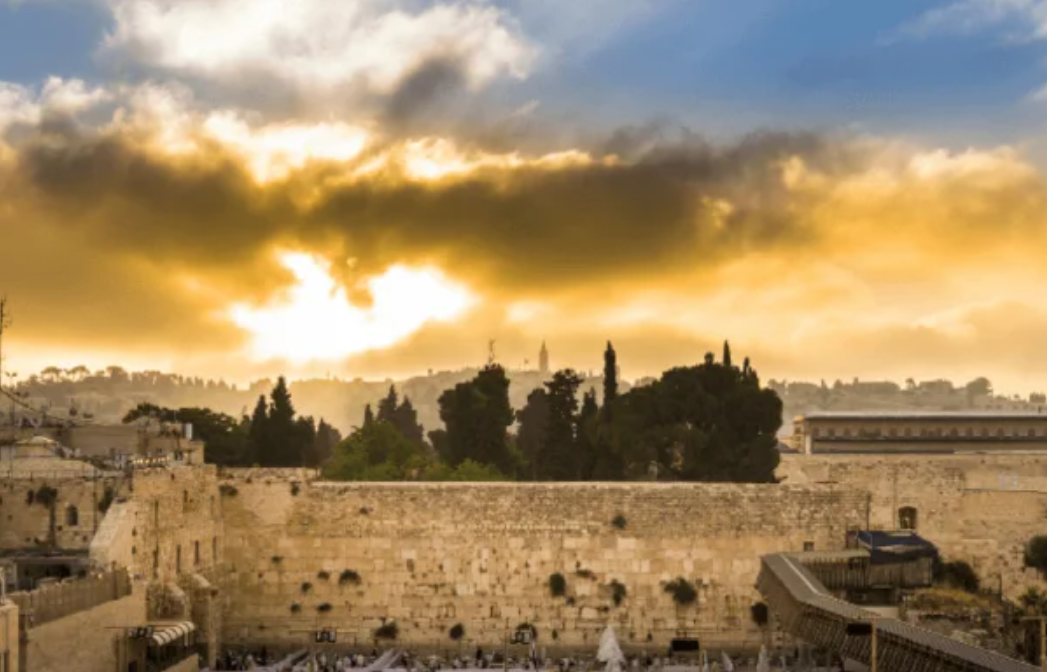
ECHOS FROM SINAI
Appearing as a weekly column in newspapers throughout Rural Georgia
By Rabbi Yonatan Hambourger
April 24, 2025

Partners in the Garden
A garden tells us everything we need to know about what it means to be human. As someone who travels from community to community, I've had the privilege of seeing countless gardens - from makeshift urban rooftop plots to sprawling suburban yards to vast rural homesteads. But it was a conversation with an experienced gardener that opened my eyes to the profound nature of our partnership with the Divine.
"People think gardening is about controlling nature," she told me, gently training a vine along its trellis. "But it's really about partnership. We can't create the seed, can't command it to sprout, can't force it to flower. What we can do is create the conditions for growth." She paused, brushing soil from her well-worn gloves. "We work with what G-d has already set in motion."
This wisdom illuminates one of our tradition's most fundamental teachings: that humans are created in G-d's image. But what does this really mean? Look closely at a garden, and you begin to understand. Like the Master Gardener, we don't create from nothing - we can't. Instead, we're given the extraordinary ability to nurture, shape, and guide what already exists. We can't invent photosynthesis, but we can decide where to plant. We can't manufacture rain, but we can build irrigation systems. We can't design a seed, but we can choose when to sow it.
This is the profound meaning behind G-d's mandate in Genesis to "subdue the earth." According to Rabbi Menachem Mendel Schneerson, of blessed memory, this directive isn't about domination but about sacred partnership. When G-d created humans in His image, He wasn't describing our physical form but our potential role: to be conscious partners in the ongoing work of creation.
Consider how a gardener approaches their plot. They must first observe and understand - where does the sun fall? How does water flow? What does the soil need? Then they make choices: which plants will thrive here? How should they be arranged? When should they be pruned? This is precisely how G-d invites us to engage with His world - not as passive inhabitants, but as active participants in its unfolding.
Yet this partnership also teaches us humility. Every gardener knows that despite their best efforts, some seeds won't sprout, some plants will fail, some seasons will disappoint. We can create optimal conditions, but ultimately, growth remains a divine mystery. This tension - between our power to affect change and our inability to control outcomes - defines our role as beings created in G-d's image.
The garden also teaches us about time and patience. No gardener plants a seed expecting immediate results. They understand that growth happens in stages, that fruit comes in its season, that some of their most important work won't be visible for years. When we partner with G-d in tending His world, we must embrace this same perspective - seeing our role not just in the immediate moment, but as part of an unfolding divine plan.
This understanding transforms how we view our place in creation. We are neither powerless observers nor independent actors, but something far more profound: designated caretakers of G-d's garden. Every choice we make - how we treat our bodies, how we use our resources, how we interact with others - becomes an expression of this sacred partnership.
The next time you pass a well-tended garden, observe how it embodies this divine-human collaboration. Notice how human intention works with natural growth, how boundaries guide but don't constrain, how each plant contributes to a greater whole. This is the model for our role in creation: partners with G-d, empowered to act but humbled by mystery, capable of shaping but not controlling, responsible for nurturing what we've been given.
In this garden of existence, we serve as G-d's designated gardeners, entrusted with tending not just our own plot but contributing to the flourishing of all creation. This is what it truly means to be created in G-d's image - to accept the profound responsibility and privilege of partnership with the Divine, while remembering whose garden this ultimately is.
---
Yonatan Hambourger is a Rabbi and writer dedicated to serving spiritual seekers of all backgrounds on behalf of Chabad of Rural Georgia. You can contact him at y@tasteoftorah.org
April 17, 2025

A Guide to Life’s Battles
There's profound wisdom in knowing not just how to act, but when to choose one response over another. An ancient narrative offers us a fascinating study in strategic decision-making that remains remarkably relevant today.
Most people know the story of the Israelites at the Reed Sea – trapped between the advancing Egyptian army and the impassable waters. In that moment of crisis, God's instruction was clear and perhaps surprising: move forward. The sea split, the people crossed safely, and their former oppressors were defeated without the Israelites lifting a finger in battle.
But what's less commonly discussed is what happened next. After this miraculous deliverance, as the Israelites journeyed toward Mount Sinai to receive the Ten Commandments, they faced another formidable enemy: the kingdom of Amalek. This time, the divine instruction was markedly different. Instead of simply moving forward, Moses was told to mobilize an army and engage in battle.
These two episodes – occurring in quick succession and seemingly contradictory in their prescribed responses – offer a masterclass in strategic wisdom. Why the dramatic difference in approach? The answer lies not in the strength of the opponents, but in their position relative to the Israelites' goal.
Consider the Egyptians: though they were a fearsome force, they were pursuing from behind. Their presence, while threatening, wasn't directly blocking the Israelites' path toward their destination of Mount Sinai. The Egyptian army represented the past literally chasing the present – former masters trying to reclaim their slaves. In this case, the wisdom was clear: don't fight what's behind you. Move forward.
The Amalekites presented a fundamentally different challenge. They stood between the Israelites and their destination, directly impeding their progress toward Mount Sinai. This wasn't about the past trying to reclaim its hold; this was about an obstacle deliberately positioning itself between a people and their future. In this case, moving forward wasn't enough – the obstacle had to be confronted and overcome.
This distinction offers a timeless framework for decision-making. When confronted with challenges, the crucial question becomes: Is this obstacle behind me, trying to pull me back, or is it ahead of me, blocking my path forward?
Consider someone in recovery from addiction. When memories of "good times" or old drinking buddies try to pull them back to their former lifestyle, the answer isn't to argue or justify their sobriety – it's simply to move forward on their chosen path. Like the Egyptians pursuing from behind, these echoes of the past have no power unless you turn back to face them.
But when that same person encounters someone who actively tries to sabotage their recovery – perhaps by deliberately bringing alcohol to family gatherings or mocking their sobriety – that's different. Like the Amalekites, these obstacles stand directly between them and their goal of maintaining sobriety, requiring a firm stand and clear boundaries.
Or think about someone starting a new chapter in life after divorce. When well-meaning friends keep trying to rehash the past relationship or suggest reconciliation, the wisest response is to keep moving forward toward their new life. However, when their ex-spouse attempts to interfere with their parenting time or new relationships, that's an Amalek-like obstacle requiring direct confrontation and perhaps legal intervention.
Consider also a young person building their career. When former classmates or relatives remind them of past failures or doubt their abilities, the best response is to keep moving forward, letting results speak for themselves. But when a supervisor deliberately blocks their advancement or takes credit for their work, that's an obstacle that requires addressing directly with management or human resources.
The ancient narrative teaches us that both responses – moving forward and standing to fight – have their place. The key is discernment. When childhood insecurities, old fears, or past mistakes chase us, trying to drag us back to who we used to be, the answer is to keep moving forward. But when someone or something actively stands between us and the kind of parent, spouse, friend, or person we're striving to become, that might be the time to take a respectful but firm stand.
This wisdom proves invaluable in daily life. A person rebuilding their life after a setback doesn't need to fight every reminder of their past – they need to keep moving forward. But when they encounter people who try to prevent their progress or undermine their recovery, that's when they need to stand firm in their convictions.
The Israelites' journey teaches us that the path to our destinations isn't always a simple matter of either always avoiding conflict or always confronting it. Sometimes wisdom calls us to march ahead, letting the waters of progress close behind us. Other times, it calls us to stand our ground and overcome what stands in our way.
In the end, it's not about choosing one approach for all situations but about clearly seeing the nature of our challenges and choosing our responses wisely. Are we being pulled backward by the gravity of old habits, past relationships, or former versions of ourselves? Keep moving forward. Are we being blocked from progress by active obstacles that stand between us and our better future? That might be the time to take a stand.
That's how we move from where we are to where we're meant to be – knowing when to march forward and when to stand and fight.
---
Yonatan Hambourger is a rabbi and writer dedicated to serving spiritual seekers of all backgrounds on behalf of Chabad of Rural Georgia. Tzali Reicher is a rabbi and writer who supports communities throughout the regional South. You can contact them at y@tasteoftorah.org.
April 10, 2025

Each Morning’s Exodus
In nature, one of the most remarkable transformations occurs when a seed first breaks through its protective shell. That tough exterior, which once sheltered the seed, must split apart for any growth to occur. What initially appears as destruction is actually the beginning of new life.
The Hebrew word for "Egypt" - "Mitzrayim" - carries profound truth within its meaning. Sharing its root with the word for confinement or limitation, it reminds us that the exodus wasn't merely a one-time historical event. When G-d commanded in the Torah that each person must regard themselves as having personally left Egypt every day of their lives, He was revealing a timeless spiritual principle. Our personal "Egypt" manifests as the limitations we face daily - the constraints that, like that ancient slavery, keep us from realizing our divine potential.
This understanding transforms the exodus narrative from ancient history into living wisdom. Just as the children of Israel faced physical bondage in Egypt, we each contend with our own forms of confinement - mental, emotional, and spiritual barriers that feel as real as the brick and mortar of ancient Egyptian pyramids. Like that seed's shell, these self-imposed limitations might feel safe, but they prevent our growth.
Consider the art of pottery, one of humanity's oldest crafts. A lump of clay, when first placed on the wheel, is full of potential but shapeless. The potter must apply pressure - must break through the clay's natural resistance - to create something beautiful and useful. Too little pressure, and the clay remains formless; too much, and it collapses. But with just the right touch, limitation transforms into possibility.
This wisdom appears throughout the natural world. The butterfly must struggle against its cocoon to develop the strength to fly. Precious metals must endure intense heat to be purified. In each case, what appears as constraint or difficulty actually enables transformation.
Our own lives follow this pattern. We develop habits and beliefs that feel protective but actually limit us. We convince ourselves that certain possibilities are beyond our reach, that some doors are closed to us, that our current limitations define our future. These thoughts create our personal Egypt - a narrow place that confines not our bodies, but our spirits.
Ancient Jewish teaching offers profound insight into this universal human experience. It suggests that true freedom isn't just about external circumstances - it's about recognizing our inherent divine connection and unlimited potential. Just as the Red Sea would not part until the Israelites took that first step, our own growth begins only when we challenge our perceived limitations.
This understanding transforms how we view life's challenges. Every obstacle becomes an invitation to break through another shell, to discover another layer of possibility. Like the potter working with clay, the divine force shapes us through these experiences, helping us realize our full potential.
The wisdom of this process reveals itself in countless quiet ways. In gardens where patience and trust yield seasonal rewards. In workshops where craftsmen know that mastery comes only through embracing and then transcending limitations. In classrooms where teachers discover that lesson plans and curricula, far from constraining education, provide the framework through which genuine moments of inspiration flourish.
When we recognize this pattern, daily life becomes rich with meaning. Each challenge presents not a barrier but a doorway. Each limitation offers not a prison but an opportunity for growth. We begin to see ourselves not as finished products struggling against constraints, but as works in progress, constantly being shaped and refined.
This shift in perspective changes everything. The very things that seem to limit us become the means of our growth. Our perceived prisons transform into launching pads for new possibilities. We move from seeing ourselves as victims of circumstance to active participants in our own development.
In this light, freedom takes on new meaning. It's not about absence of constraints but about how we work with them. Like the seed breaking through its shell, like the clay taking shape on the potter's wheel, we grow not by avoiding pressure but by engaging with it purposefully.
The ancient exodus from Egypt thus becomes more than historical event - it becomes a blueprint for personal transformation that each person can apply today. It reminds us that our greatest limitations often protect our greatest potential, waiting to be realized when we find the courage to break through.
---
Yonatan Hambourger is a Rabbi and writer dedicated to serving spiritual seekers of all backgrounds on behalf of Chabad of Rural Georgia. Tzali Reicher is a Rabbi and writer who supports communities throughout the regional South. You can contact them at y@tasteoftorah.org.
April 3, 2025
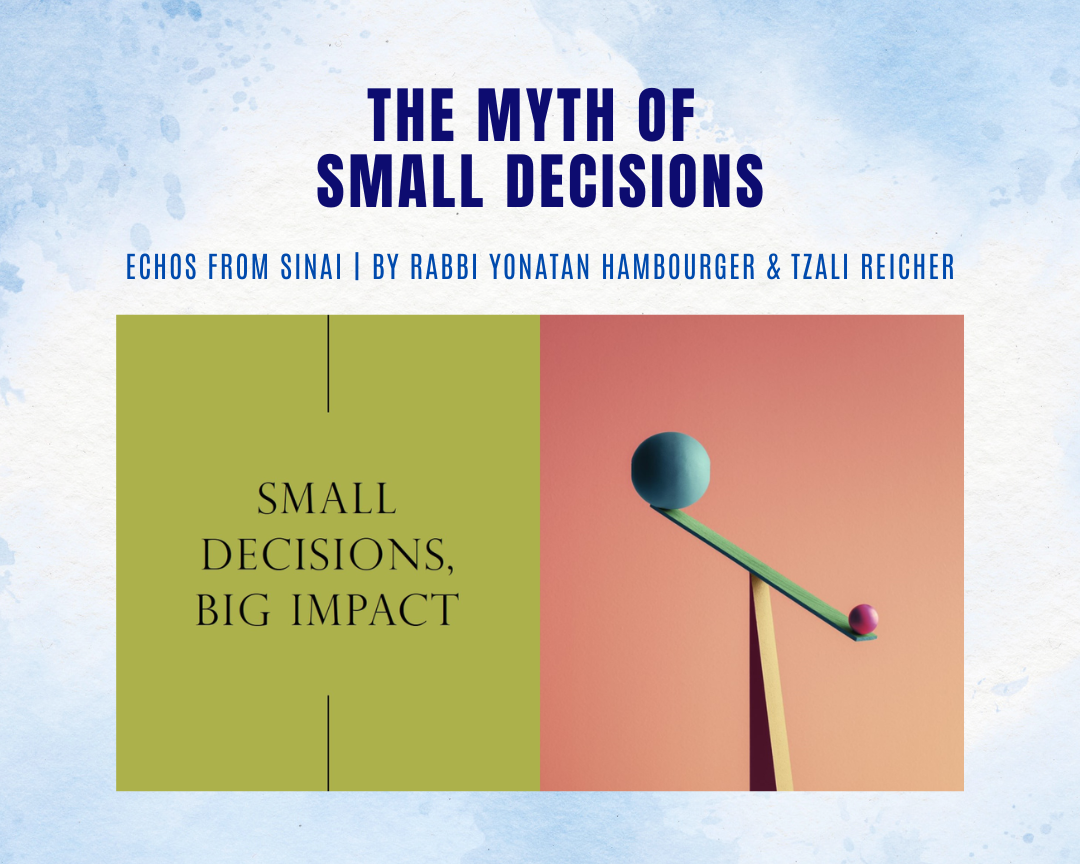
The Myth of Small Decisions
It started as a casual conversation between two old friends at their weekly coffee meetup. Between sips of their preferred brew—one black, one with enough cream to make it barely recognizable as coffee—they stumbled upon a truth that extends far beyond their corner booth at the local diner.
"My wife handles all the little stuff," one friend declared with a self-satisfied smile, "while I focus on the big things." His companion's raised eyebrow prompted elaboration. "She just manages the budget, pays our bills, makes decisions about major purchases, and plans for our retirement," he explained, stirring his coffee with studied nonchalance.
"And what exactly do you do?" his friend inquired, already struggling to suppress a knowing grin.
"Well, I contemplate the really important stuff," came the reply. "Like whether pickleball is actually better for my knees than tennis, if aliens built the pyramids, and whether my neighbor's new bird feeder is attracting too many squirrels to our block."
This exchange, while humorous, mirrors a perspective that many people hold about life's bigger picture. It's remarkably easy to convince ourselves that we're focusing on what truly matters while overlooking the actual foundations that support our daily existence. We often relegate the seemingly mundane details to others—or assume they're beneath notice altogether—while we occupy ourselves with grand philosophical questions or entertaining distractions.
Consider how this plays out in the spiritual realm. Many people of faith maintain a curious disconnect in their worldview: they believe in an omnipotent force capable of orchestrating magnificent events—natural wonders, historic moments, unprecedented coincidences—yet somehow doubt this same force would concern itself with their daily challenges, hopes, and decisions. It's a mindset that separates life into convenient categories: the meaningful versus the mundane, the significant versus the trivial.
This tendency to dismiss life's details shows up everywhere, from spiritual beliefs to business leadership. Consider Richard, a successful business owner who always prided himself on "seeing the big picture" while delegating the details to others. A health scare forced him to pay attention to the small daily choices that ultimately shaped his well-being—what he ate, how much he moved, when he rested. He came to understand that these "minor" decisions were, in fact, the very substance of life itself.
The truth is, life doesn't actually divide neatly into "big stuff" and "little stuff." Each moment connects to the next in an intricate web of cause and effect. The daily choices we make—how we treat others, manage our resources, care for ourselves—create the foundation for everything else. Just ask any financial advisor: it's not the occasional windfall that typically builds wealth, but rather the consistent, thoughtful management of regular income and expenses.
Margaret, who recently celebrated her 50th wedding anniversary, puts it this way: "People always ask about the secret to a long marriage, expecting some grand revelation. But it's not about the big romantic gestures or how you handle major crises. It's about all the small moments—how you speak to each other over breakfast, whether you remember to pick up their favorite snack at the store, if you really listen when they tell you about their day."
This perspective invites us to reconsider what we classify as significant. The Almighty operates not just through dramatic interventions and major events, but through the subtle interplay of countless small interactions and choices. True wisdom lies in recognizing the profound importance of life's seemingly ordinary moments.
For those seeking deeper meaning in their lives, this understanding offers a powerful shift in perspective. Instead of waiting for big moments or dramatic signs, we might find more satisfaction in embracing the sacred nature of daily life—in recognizing that every interaction, every decision, every moment carries weight and meaning.
The next time you're tempted to dismiss something as "just the little stuff," remember the man in the coffee shop. While he pondered life's entertaining diversions, his wife was quietly shaping their future through attention to the very details he'd overlooked. In the end, perhaps there is no little stuff—only building blocks of different sizes, all essential to the structure of our lives.
---
Yonatan Hambourger is a Rabbi and writer dedicated to serving spiritual seekers of all backgrounds on behalf of Chabad of Rural Georgia. Tzali Reicher is a Rabbi and writer who supports communities throughout the regional South. You can contact them at y@tasteoftorah.org.
March 27, 2025

Each Encounter, A Divine Appointment
We all face moments that test our capacity for forgiveness. Sometimes it's small stuff - a friend forgetting your birthday or a coworker taking credit for your work. But what about when the betrayal cuts deeper? When it comes from those who should love you most?
Consider this scenario: You're seventeen, full of dreams and potential. Your siblings, consumed by jealousy, first plot your murder. They settle instead for selling you into slavery in a foreign land. Years pass as you endure hardship after hardship, yet somehow you rise above it all, building a life of remarkable success and influence.
Then fate delivers an unexpected twist. Your family, now struggling to survive, needs your help. They don't recognize you in your position of power, but you see them clearly. The same siblings who once plotted your demise now stand before you, desperate and vulnerable.
Most of us would struggle with what to do next. The urge for revenge would be tempting - after all, they deserve it, right? This is where the wisdom of Joseph, from the Torah, offers a surprisingly modern perspective on handling betrayal and maintaining our moral compass.
After being sold into slavery in Egypt, Joseph had endured false accusations, imprisonment, and years of hardship. Yet through his wisdom and G-d-given abilities, he rose to become second-in-command to Pharaoh himself. When his brothers came to Egypt seeking food during a famine, rather than exact revenge, Joseph's response wasn't what most would expect. Instead of anger or righteous vengeance, he said something remarkable (Genesis 44:5-7), "Do not be upset with yourselves that you sold me here, for G-d sent me ahead of you to provide sustenance for you."
This wasn't just about forgiveness - it revealed a profound understanding of how to live with purpose rather than resentment. Joseph's perspective challenges our natural inclinations toward grudges and retribution. He saw beyond the immediate pain and recognized a larger purpose at work. More importantly, he understood a fundamental truth: every event, no matter how seemingly insignificant or negative, is divinely orchestrated for a greater good.
Think about how this applies in our modern world. A forced early retirement might lead to discovering a new calling. A health setback could inspire you to help others facing similar challenges. Even family estrangements, as painful as they can be, might guide us toward becoming the bridge that helps heal other divided families. And yes, even life's daily frustrations - being stuck in traffic, or waiting in a long checkout line - are opportunities in disguise, moments deliberately placed in our path for a deeper purpose we might not yet understand.
This isn't about dismissing wrongdoing or pretending harm doesn't exist. Joseph's brothers made their choices freely and bore responsibility for their actions. But Joseph's genius lay in understanding that their accountability was between them and G-d. He refused to let their actions define his path forward or corrupt his character with bitterness.
It's worth noting that Joseph's approach wasn't passive or weak. He maintained healthy boundaries and tested his brothers' character before fully reconciling. But he never lost sight of what mattered most - fulfilling his purpose rather than settling scores.
This wisdom speaks to all who ponder life's deeper meaning, from the most steadfast believer to those simply seeking practical guidance for life's challenges. When we stop keeping score of others' wrongs, we free ourselves to focus on what truly matters: brightening the lives of those we meet, finding opportunities to help others grow, and transforming our daily encounters into moments of meaning and purpose.
Every interaction holds within it a spark of the divine - a chance to repair a small corner of creation. That frustrating conversation with a stranger might be your opportunity to practice patience. The person who cuts you off in traffic could be your invitation to respond with grace. Even waiting in line becomes sacred when we view it as a divine appointment, perfectly orchestrated for purposes we may never fully understand.
The path forward unfolds naturally when we embrace this perspective. Each smile we share, each moment of patience we exhibit, each small kindness we extend - these aren't just good deeds, they're brushstrokes in G-d's master plan. Through these seemingly ordinary acts, we fulfill our extraordinary purpose: to illuminate the world, one soul at a time.
---
Yonatan Hambourger is a Rabbi and writer dedicated to serving spiritual seekers of all backgrounds on behalf of Chabad of Rural Georgia. Tzali Reicher is a Rabbi and writer who supports communities throughout the regional South. You can contact them at y@tasteoftorah.org.
March 20, 2025

The Mystery of Continuous Creation
"In the beginning G-d created the heaven and the earth." This familiar verse from Genesis holds a deeper truth that most people miss – one that could transform how we view both the universe and our own potential for change.
Modern physics tells us that the universe had a beginning. But here's something even more remarkable: our universe's existence right now, in this very moment, depends on an ongoing act of creation. G-d isn't just the architect who drew up the plans and walked away – He's actively sustaining every atom of existence, every second of every day.
Think of it like tossing a ball into the air. To someone watching, the ball appears to fly under its own power. But anyone who's played catch knows what happens next – the ball reaches its peak, then falls back to earth as the initial force wears off. Without continuous input of energy, motion stops. The same principle applies to our entire universe on a grand scale.
Farmers understand this idea intuitively. A planted field doesn't maintain itself. Each season's crop requires constant nurturing – water, sunlight, and care. Remove any of these sustaining forces, and the crop fails. The universe works the same way, but on an infinite scale. G-d is continuously creating every aspect of existence anew, every single moment. If this divine sustaining force were to pause even for an instant, the entire universe would simply cease to exist, reverting to absolute nothingness.
This renewal isn't limited to the physical world. Every morning, when we open our eyes, something extraordinary happens. According to Jewish tradition, our souls are returned to us completely renewed, pristine and fresh. The first prayer Jews say upon waking – Modei Ani – acknowledges this profound daily gift: our soul being restored to us with fresh potential, unmarked by yesterday's mistakes or limitations. It's like receiving a brand new computer each morning, with all the processing power intact but none of the accumulated clutter and cached files that slow it down.
This isn't just some abstract philosophical concept. The continuous nature of creation reveals something profound about our own lives. Since G-d creates a brand-new world at every moment, we too have the power to create brand-new realities for ourselves. Each instant offers a clean slate, free from the weight of past mistakes or seemingly unchangeable circumstances.
Think about what this means: your life isn't like a movie playing on autopilot. It's more like a series of photographs, each one a fresh opportunity to compose something new. The limitations you felt a moment ago don't have to constrain what's possible now. The habits that seemed unbreakable yesterday don't have to control your choices today.
This understanding transforms how we view personal change. Too often, people feel trapped by their past decisions, their established patterns, or their perceived limitations. They might think, "This is just who I am" or "It's too late to change." But if G-d is creating the universe anew each moment, then we too can start fresh at any time.
Every morning when you open your eyes, you're not just waking up to the same old world – you're witnessing an entirely new creation. Your past doesn't have to dictate your future. Your struggles from yesterday don't have to define your today. Each moment offers a divine reset button, a chance to begin again.
This isn't about denying the past or ignoring consequences. Rather, it's about recognizing the profound truth that existence itself is being renewed constantly by divine will. And if G-d can create the universe anew each moment, surely we can recreate ourselves, our relationships, and our life paths.
The power to start over isn't just a comforting thought – it's woven into the very fabric of reality. At any given moment, regardless of where you are or what came before, you can have a genuine do-over. G-d is showing us how it's done, one moment of creation at a time.
---
Yonatan Hambourger is a Rabbi and writer dedicated to serving spiritual seekers of all backgrounds on behalf of Chabad of Rural Georgia. Tzali Reicher is a Rabbi and writer who supports communities throughout the regional South. You can contact them at y@tasteoftorah.org.
Click on the button to subscribe and receive an update each week!
March 6, 2025

A Garden of Remembrance Blooms in Blairsville
This past Tuesday morning, as the early March sun valiantly attempted to warm the North Georgia mountains, I had the privilege of joining the Blairsville community at City Park for a moment of profound significance. The dedication of the Children's Daffodil Garden marked more than just the planting of flowers – it represented this mountain town's connection to an enduring promise: "Never Again."
Through the combined efforts of the Union County Rotary Club, the City of Blairsville, and the Daffodil Project, this close-knit community has joined a sacred mission. Each daffodil planted here stands as part of a living memorial, working toward a worldwide goal of 1.5 million flowers – one for each Jewish child murdered by the Nazis during the Holocaust. These golden blooms serve not only as a testament to lives brutally taken, but also as beacons of hope for children facing humanitarian crises around the world today.
As someone who regularly shares thoughts with this community through my newspaper columns, I was deeply honored when asked to speak at the dedication ceremony. Standing before the gathered residents, I shared these words:
"My dear friends,
When I look at a daffodil, I see more than just a flower. Each yellow bloom represents a child – one of the 1.5 million innocent children slaughtered by the Nazis.
The Daffodil Project seeks to plant one flower for each of these children, creating a living memorial that spreads across our world. These flowers, pushing through the dark earth each spring, remind us that even in our darkest moments, hope persists.
I stand before you today not just as a rabbi, but as a fellow human being grappling with one of humanity's most haunting questions: How could anyone look into the eyes of a child and commit such unspeakable acts? How could a concentration camp guard spend his days orchestrating the murder of innocent children, then return home to embrace his own?
The easy answer would be to say that evil people exist in this world. But that answer feels hollow, inadequate. It fails to address the deeper mystery of why G-d allows suffering to exist at all.
When he was fifteen years old and a prisoner in Auschwitz, Eli Wiesel watched as three Jewish scholars put G-d on trial for cruelty and betrayal of the Jewish people. They could find no excuse for G-d, no extenuating circumstances, so they found Him guilty. After the verdict, Wiesel said there was silence, and then they all sat down to evening prayers. The boy himself would survive the Holocaust and go on to win the Nobel Prize in Literature and become known as the conscience of the post-Holocaust world.
In this story lies the key to navigating the pain of seeming injustices and unfairness in our own lives, in the lives of those we care for, and in the world at large--those times that beg the question, 'Why do bad things happen to good people?'
Years later, when asked about his faith, Wiesel said something profound: 'I have not lost faith in God. I have moments of anger and protest. Sometimes I've been closer to Him for that reason.'
We are absolutely permitted to question G-d. Not only are we allowed, we MUST. Abraham modeled this regarding Sodom & Gemorah when he asked G-d, 'Will the judge of the world not act justly?' Moses modeled this as well when he asks G-d, 'Why have you done evil to this people?'
Questioning the existence of suffering isn't a sign of weak faith – it's an expression of our deepest humanity. When we cry out against injustice, when we demand answers to impossible questions, we're following in the footsteps of our greatest prophets and sages.
Think of a tapestry. We are viewing it from behind, and it appears chaotic – loose threads, knots, seemingly random patterns. That's our perspective here on Earth. We see the knots of suffering, the tangled threads of loss. But there's another side to that tapestry, one we can't yet see, where every thread serves a purpose in creating something beautiful. And that constitutes G-d's master plan.
We must cry out even though we will not be satisfied with the answer. We must challenge the existence of evil. Here's what I know with certainty: we aren't meant to be passive observers of suffering. The daffodils we plant aren't just memorials – they're calls to action. Each flower whispers to us: 'What will you do to prevent such darkness from returning?'
You can't fight darkness with a stick. But light one small candle, and darkness retreats. Each of us has the power to be that light. When we encounter hatred, we must respond with love. When we see division, we must build bridges. When we witness suffering, we must extend our hands in help.
For nearly two thousand years, my people walked alone. Through crusades, inquisitions, expulsions, pogroms, persecutions, and ultimately, the Holocaust, we looked around and found few friends, few allies, few voices willing to stand beside us.
But today, as I stand together with you in North Georgia, I am moved to tears by a profound change in history. You – the Christian community – have become more than friends. You have become family. Your unwavering support for the Jewish people and the State of Israel fills me with a gratitude I can barely express in words.
When I see Christians waving 'we stand with Israel' flags, praying for Israel's peace, sending aid to Jewish communities in need, and standing firmly against antisemitism in all its forms, my mind goes to the collective tears of grief cried by previous generations, and how they would weep tears of joy at the sight of their grandchildren living in a world where Christians and Jews walk together and work together to repair our broken world.
To the Christian community of North Georgia, and to Christians everywhere who have opened their hearts to the Jewish people: You have shown us what true friendship means. You have demonstrated that the wounds of history can heal, that ancient divisions can be bridged, and that love can triumph over hatred.
Your embrace of the Jewish people isn't just political support or casual alliance – it's a profound spiritual kinship that touches the very core of who we are. When rockets fall on Israel, you feel our pain. When Jewish communities face threats, you stand guard. When we celebrate our victories, you rejoice with us.
From the depths of my soul, on behalf of the Jewish people: Thank you. Thank you for your love, your support, and your friendship. Thank you for showing the world what it truly means to be your brother's keeper.
As these daffodils return each spring, let them remind us that from the darkest earth, new life can bloom. Let them inspire us to be builders of that better world – one act of kindness, one moment of understanding, one person at a time.
---
Yonatan Hambourger is a Rabbi and writer dedicated to serving spiritual seekers of all backgrounds on behalf of Chabad of Rural Georgia. You can contact him at y@tasteoftorah.org.
February 27, 2025
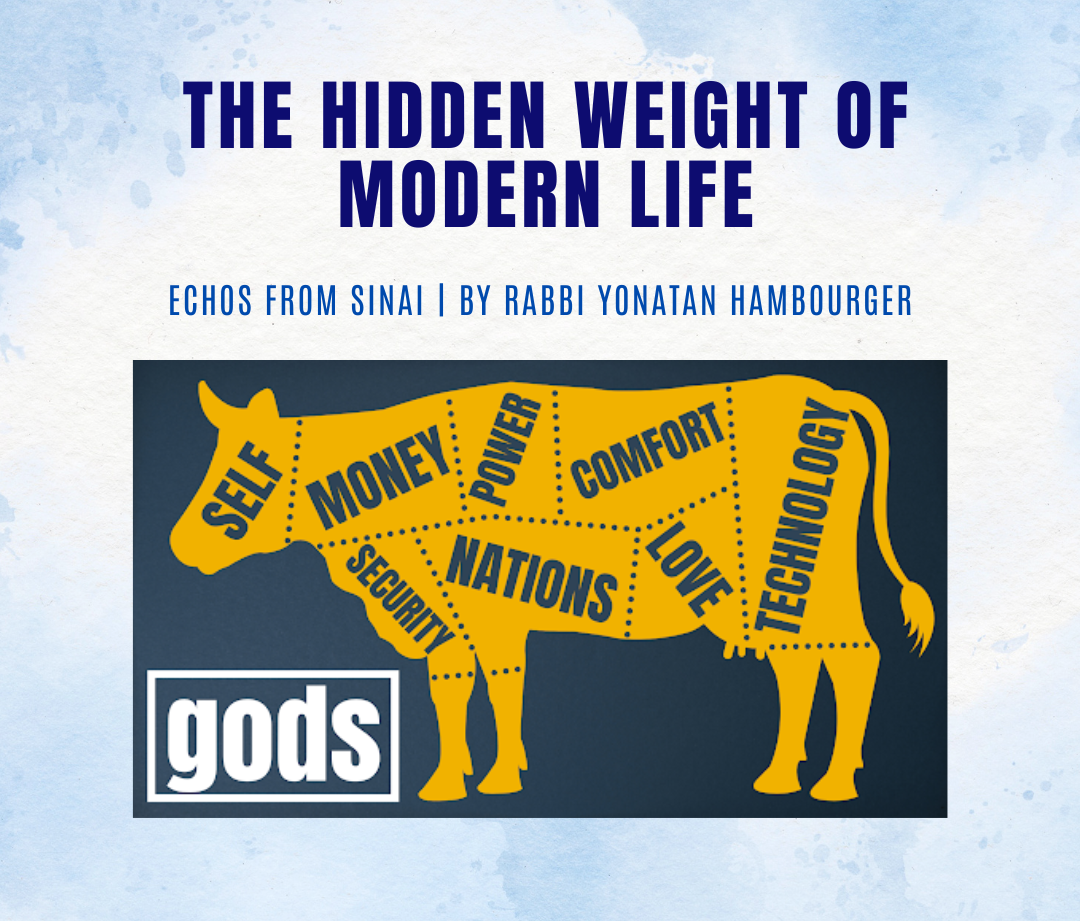
The Hidden Weight of Modern Life
By Yonatan Hambourger and Tzali Reicher
Every morning, Sarah stands in front of her closet, overwhelmed by choices yet feeling she has "nothing to wear." Down the street, Mike checks his phone dozens of times an hour, each notification bringing a brief dopamine rush followed by an empty feeling. At a local diner, Ellen obsesses over every calorie, turning what should be a pleasant meal with friends into an exercise in anxiety.
These aren't extraordinary people with extraordinary problems. They're our neighbors, our colleagues, our friends – regular folks struggling with the subtle yet powerful forces that turn everyday life into a source of constant stress.
We see it in the parent who works overtime to buy their children the latest sneakers, not because the old ones are worn out, but because peer pressure has turned basic items into status symbols. We see it in the retiree who sits alone in their apartment, scrolling endlessly through social media instead of joining the community center activities down the street – not because they can't afford it (it's free), but because they've become more comfortable with virtual connections than real ones.
Even the simplest activities have become complicated by modern pressures. A family dinner becomes a photo opportunity before anyone can take a bite. A walk in the park is interrupted by constant checks for work emails. A child's school performance becomes a referendum on their entire future. These aren't luxuries we're talking about – these are basic elements of daily life that have somehow become sources of anxiety and competition.
The ancient wisdom of the Torah speaks directly to this modern condition. In one particularly relevant teaching derived from the Book of Numbers (Chapter 33:52), Moses instructs the people about entering their Promised Land, warning them to destroy all remnants of idol worship, even the most subtle forms left by previous inhabitants. The Hebrew word for idolatry translates to "foreign servitude" – a concept that takes on new meaning in our current age. Today, this servitude shows up not as idols of clay but in our obsessive relationships with social media, our endless pursuit of approval, and our attachment to artificial standards of success.
Life's choices generally fall into three categories: things that uplift us, things that harm us, and the vast middle ground of neutral activities that could go either way. It's this middle ground where most of us live our daily lives, and where we have the greatest opportunity for transformation.
A load of laundry becomes meaningful when done with gratitude for having clothes and the means to clean them. A bus ride to work becomes an opportunity for a kind word with a stranger. Even standing in line at the grocery store can become a moment of patience and human connection rather than frustration.
This isn't about adding more to already full plates or spending money people don't have. It's about changing how we approach what we already do. The parent rushing through bedtime stories can turn off their phone and make it a moment of real connection. An elderly person watching TV alone can invite a neighbor to share their favorite shows. The office worker eating lunch at their desk can step outside and share their break time with colleagues.
Something remarkable happens when we learn to shift our focus from constant acquisition and comparison to appreciation and connection. The internal conflicts that drain so many people – physically, mentally, and emotionally – begin to fade. What emerges is a kind of peace that doesn't depend on what we own or achieve but on how we choose to live each moment.
This isn't about dramatic lifestyle changes or grand gestures. It's about small shifts in how we approach our daily lives. It's about recognizing that true satisfaction doesn't come from serving the modern idols of status, appearance, or social media metrics but from living with purpose and connection, no matter how humble our circumstances might be.
---
Yonatan Hambourger is a rabbi and writer dedicated to serving spiritual seekers of all backgrounds on behalf of Chabad of Rural Georgia. Tzali Reicher is a rabbi and writer who supports communities throughout the regional South. You can contact them at y@tasteoftorah.org.
February 20, 2025

The Battle Within Ourselves
We all know that feeling. You're standing in front of the fridge at midnight, knowing you shouldn't have that slice of cheesecake. Your rational mind says no, but something more primitive – that gut instinct – is already reaching for the plate. It's that eternal wrestling match between our higher and lower selves, a struggle as old as humanity itself.
This internal conflict shows up everywhere in our lives. Maybe it's the urge to gossip about a coworker even though we know it's wrong, or the temptation to cut corners on our taxes when we think no one's looking. We might even recognize it in those moments when we choose to binge-watch TV instead of calling our grandchildren or volunteering at the local food bank.
The truth is, we're all walking around with two distinct forces inside us. One pulls us toward immediate gratification – that voice saying, "treat yourself" or "take the easy way out." The other pushes us toward our better nature, toward doing what's right even when it's harder. It's like having both a rebellious teenager and a wise elder living in our heads, constantly competing for attention.
This duality is beautifully illustrated in the Book of Genesis, Chapter 25:19-28:9, which tells the story of twins Jacob and Esau. From the beginning, while fighting within their mother Rebecca’s womb, these brothers couldn't have been more different. Esau emerged first – a hunter driven by impulse and immediate desires, often letting anger and unhealthy urges dictate his actions. Jacob, in contrast, emerged holding his brother's heel, embodying the need for guidance and restraint. This gesture symbolizes the imperative for our inner Jacob to steer our inner Esau. Remarkably, the Torah states that "the older shall serve the younger" – a divine decree that our primal instincts, though they emerge first, must ultimately submit to our higher nature.
Think of it like this: Esau is like that impulse to check Facebook instead of finishing our work, while Jacob represents our conscience reminding us about looming deadlines. Or imagine Esau as that voice urging us to spend our retirement savings on a flashy new car, while Jacob whispers about responsible financial planning.
The fascinating thing about this story isn't just the contrast between the brothers – it's what their relationship teaches us about managing our own internal conflicts. Just as Jacob's hand grasped Esau's heel, suggesting guidance rather than destruction, we're not meant to completely suppress our basic desires. Instead, we're supposed to channel them into something meaningful.
Remember those old commercials about a devil on one shoulder and an angel on the other? While entertaining, they missed the point. Our more primitive side isn't inherently evil – it's actually essential for survival and success. That same drive that might lead us to overindulge at dinner also gives us the energy to play with our grandchildren or the motivation to start a new business in our retirement years.
The key is learning to let our higher self, guide our more basic instincts, much like an experienced rider guides a powerful horse. That horse's strength isn't the problem; it's all about who's holding the reins. Just as the Torah ordained that Esau would serve Jacob, our inner "adult" must take charge of our inner "animal," directing its considerable power toward G-dly purposes. This might mean channeling one’s competitive drive into charitable fundraising or transforming a quick temper into passionate advocacy for justice.
In today's world, this struggle takes on new dimensions. Social media feeds our impulse for instant gratification. Online shopping makes it easier than ever to spend impulsively. Streaming services tempt us away from more meaningful activities. Yet these same technologies, when guided by our better judgment, can help us stay connected with family, learn Scripture, or contribute to worthy causes.
The wisdom of the Torah suggests that transformation doesn't come through harsh self-denial or brutal inner conflict. Instead, it happens naturally, like turning on a light in a dark room. When we focus on filling our lives with positive actions – whether it's volunteering at the local library, mentoring younger colleagues, or simply being present for our families – the destructive impulses naturally fade into the background.
This doesn't mean we'll never face internal struggles. Even in our golden years, we're still growing, still learning to balance our various impulses and inclinations. But understanding this dynamic can help us approach these challenges with wisdom rather than frustration. Every time we choose patience over anger, generosity over selfishness, or long-term satisfaction over momentary pleasure, we're not just winning a battle – we're gradually transforming ourselves.
The next time you find yourself in front of that midnight cheesecake, remember it's not about denying your desires completely. It's about letting your wisdom guide your choices. Maybe that means having a smaller slice or saving it for tomorrow when you can truly savor it. After all, the goal isn't to silence our Esau-like impulses, but to let our inner Jacob guide them toward something better.
---
Yonatan Hambourger is a Rabbi and writer dedicated to serving spiritual seekers of all backgrounds on behalf of Chabad of Rural Georgia. Tzali Reicher is a Rabbi and writer who supports communities throughout the regional South. You can contact them at y@tasteoftorah.org.
February 13, 2025

Making Music with What We Have Left
Last month, I watched a story go viral about Sarah Hughes, a 72-year-old former accountant who took up watercolor painting despite advancing arthritis. Her hands shake constantly, but the landscapes she creates are stunning – not despite her tremors, but somehow because of them. Her unsteady strokes add an ethereal quality to her water scenes, a natural movement that perfectly trained artists spend years trying to replicate.
It reminded me of a story that's stuck with me for decades, one that feels especially relevant as many of us navigate our golden years. Back in 1995, Itzhak Perlman – the violin virtuoso who contracted polio as a child – was performing at Lincoln Center. Those who were there that night witnessed something extraordinary.
Perlman had just settled into his chair, positioning his violin after his characteristic slow entrance with crutches and braces. A few bars into the piece, a string on his violin snapped with an audible pop. The audience held their breath, expecting him to struggle back up and leave the stage for repairs. Instead, Perlman closed his eyes, nodded to the conductor, and did the impossible – he played the entire concerto on three strings.
Anyone who knows anything about violins will tell you this shouldn't work. A violin needs all four strings, just like we think we need all our faculties intact to live a full life. But Perlman created music more powerful, more moving than anyone had heard before. When he finished, he simply said, "Sometimes it is the artist's task to find out how much music you can still make with what you have left."
This wisdom echoes an ancient teaching from the Torah about Moses, who's often remembered as the greatest prophet in Jewish history. What's less discussed is that Moses had a speech impediment. The man chosen to be God's spokesperson, to stand before Pharaoh and lead an entire people, struggled with clear speech. As the Lubavitcher Rebbe often pointed out, this wasn't a divine oversight – it was precisely because of this limitation that Moses was chosen.
The Rebbe, Menachem M. Schneerson, the most influential Rabbi of the modern era, explained that when we face our limitations head-on, we tap into something deeper than our natural abilities. We access a reservoir of strength we didn't know we had. In fact, the Rebbe taught that our perceived weaknesses often become the very source of our greatest accomplishments – not by overcoming them, but by working through them. Consider Diana Nyad, who at age 64 became the first person to swim from Cuba to Florida without a shark cage. She didn't succeed despite her age – her decades of experience and wisdom helped her accomplish what younger athletes couldn't. Her limitation became her strength, just as the Rebbe described.
We're part of the first generation to regularly live into our 80s and 90s. But longevity isn't just about surviving—it's about thriving with whatever hand we're dealt. Take Barbara Beskind, who became a designer for IDEO at age 89. Her perspective on aging didn't just inform her work—it transformed it. She designed products that younger designers, with all their technical expertise, had never even conceived.
The real magic happens when we stop viewing these adaptations as compromises and start seeing them as opportunities for reinvention. Like Perlman on that stage, we're not just making do – we're creating something new, something that could only emerge from our particular circumstances.
This isn't about putting on a brave face or denying the very real challenges of aging. It's about recognizing that our limitations don't define us – our response to them does. Whenever we figure out a new way to do something we love, we compose our own symphony with whatever strings remain.
As I read about these inspiring individuals, I'm reminded that creativity, contribution, and joy have no expiration date. We're all artists in our own way, tasked with discovering how much music we can make with what we have left. From what I've seen, these later-life compositions often turn out to be our most beautiful work.
The concert hall of life doesn't demand perfection. It asks only that we play on, that we keep making our unique music. Sometimes, the most moving performances come from those who've learned to play with whatever strings they have left.
---
Yonatan Hambourger is a Rabbi and writer dedicated to serving spiritual seekers of all backgrounds on behalf of Chabad of Rural Georgia. Tzali Reicher is a Rabbi and writer who supports communities throughout the regional South. You can contact them at y@tasteoftorah.org.
February 6, 2025

The Unexpected Power of a Single Good Deed
By Yonatan Hambourger and Tzali Reicher
Have you ever wondered why some people seem to coast through life on what feels like stored-up good karma? Maybe it's that neighbor who always gets "lucky breaks" but also happens to be the first person to help when someone's car doesn't start. Or perhaps it's your aunt who seems blessed with endless good fortune yet never fails to volunteer at the local food bank.
I've been thinking about this lately, watching how small acts of kindness seem to echo through time, creating ripples we can't possibly predict. Take my friend Jack, for instance. Twenty years ago, he stopped to help a stranded motorist on I-95 during a snowstorm. He didn't think much of it at the time – just jumped her car battery and went on his way. Fast forward fifteen years and that same woman turned out to be on the hiring committee when Jack's daughter interviewed for her dream job. The woman remembered him instantly.
These kinds of coincidences happen more often than we might think, weaving through our lives in ways that often go unnoticed until we take a step back to observe the patterns. Sometimes, the most unexpected acts of kindness – even those done without pure intentions – can have the most profound and lasting effects.
But perhaps one of the most fascinating examples of how a single act can reverberate through generations comes from an ancient tale that has survived millennia. It's the story of Og, a figure from the Hebrew scriptures whose one good deed – despite ignoble motives – earned him an unusual place in history.
Picture this: Moses, one of history's most fearless leaders, had faced down mighty armies and powerful rulers without so much as a tremor of doubt. Yet when it came to confronting Og, the king of Bashan, something extraordinary happened – for the first time, Moses felt fear. The source of this unprecedented anxiety? A single act of kindness performed generations before.
Years earlier, Og had informed Abraham that his nephew Lot had been kidnapped. This tip-off allowed Abraham to mount a successful rescue mission. But here's the twist – Og's motives were far from pure. He had actually hoped Abraham would die in the rescue attempt, leaving Abraham's wife available for Og to pursue. What's remarkable is that Abraham, though fully aware of Og's devious intentions, still considered it a favor and remained genuinely grateful for the information that helped save his nephew's life.
This simple act of delivering information, despite its self-serving motivation, carried such weight that when Moses later faced Og in battle, he worried that Abraham's gratitude and this long-ago favor might somehow protect his adversary. It took divine reassurance to convince Moses to proceed with the battle, which he then won decisively.
Think about that for a moment. One action, even one performed with mixed motives, held such power that it concerned a leader who had already faced down emperors and armies. It's like finding out that helping someone with their groceries thirty years ago somehow earned you a lifetime of protection – even if you only did it because you were trying to impress your date.
This concept resonates particularly well with those of us who've been around long enough to see how life has a way of bringing things full circle. Remember when we used to dismiss our parents' advice about "what goes around comes around"? Well, after several decades of living, we've probably all had enough experiences to make us think twice about those old sayings.
Consider the business world, where we've all witnessed how a single act of integrity or kindness can unexpectedly pay dividends years later. Maybe it's the entry-level employee you mentored two decades ago who's now become a key industry contact. Or perhaps it's the client whose small account you treated with respect when others wouldn't give them the time of day – the same client whose business has since grown exponentially.
The beauty of kindness is that it doesn't require grand gestures or perfect motivation. Sometimes, the smallest actions – holding the door for someone struggling with packages, letting someone merge in heavy traffic, or simply offering a genuine compliment – can set in motion a chain of events we couldn't possibly predict.
As we navigate our increasingly complex world, this ancient wisdom is profoundly comforting. It suggests that our actions, however small they might seem, carry weight and meaning beyond their immediate impact. In an age when we're often overwhelmed by global issues that feel beyond our control, it's reassuring to know that simple acts of kindness still have the power to shape our world and protect us in ways we might never anticipate.
So, the next time you have the opportunity to help someone – even if you're not feeling particularly altruistic at the moment – remember Og's story. That simple gesture might create ripples that will travel further and last longer than you could ever imagine. After all, if a self-serving act from thousands of years ago could carry such weight, imagine the potential impact of genuine kindness freely given.
----
Yonatan Hambourger is a rabbi and writer dedicated to serving spiritual seekers of all backgrounds on behalf of Chabad of Rural Georgia. Tzali Reicher is a rabbi and writer who supports communities throughout the regional South. You can contact them at y@tasteoftorah.org.
February 6, 2025

The Unexpected Power of a Single Good Deed
By Yonatan Hambourger and Tzali Reicher
Have you ever wondered why some people seem to coast through life on what feels like stored-up good karma? Maybe it's that neighbor who always gets "lucky breaks" but also happens to be the first person to help when someone's car doesn't start. Or perhaps it's your aunt who seems blessed with endless good fortune yet never fails to volunteer at the local food bank.
I've been thinking about this lately, watching how small acts of kindness seem to echo through time, creating ripples we can't possibly predict. Take my friend Jack, for instance. Twenty years ago, he stopped to help a stranded motorist on I-95 during a snowstorm. He didn't think much of it at the time – just jumped her car battery and went on his way. Fast forward fifteen years and that same woman turned out to be on the hiring committee when Jack's daughter interviewed for her dream job. The woman remembered him instantly.
These kinds of coincidences happen more often than we might think, weaving through our lives in ways that often go unnoticed until we take a step back to observe the patterns. Sometimes, the most unexpected acts of kindness – even those done without pure intentions – can have the most profound and lasting effects.
But perhaps one of the most fascinating examples of how a single act can reverberate through generations comes from an ancient tale that has survived millennia. It's the story of Og, a figure from the Hebrew scriptures whose one good deed – despite ignoble motives – earned him an unusual place in history.
Picture this: Moses, one of history's most fearless leaders, had faced down mighty armies and powerful rulers without so much as a tremor of doubt. Yet when it came to confronting Og, the king of Bashan, something extraordinary happened – for the first time, Moses felt fear. The source of this unprecedented anxiety? A single act of kindness performed generations before.
Years earlier, Og had informed Abraham that his nephew Lot had been kidnapped. This tip-off allowed Abraham to mount a successful rescue mission. But here's the twist – Og's motives were far from pure. He had actually hoped Abraham would die in the rescue attempt, leaving Abraham's wife available for Og to pursue. What's remarkable is that Abraham, though fully aware of Og's devious intentions, still considered it a favor and remained genuinely grateful for the information that helped save his nephew's life.
This simple act of delivering information, despite its self-serving motivation, carried such weight that when Moses later faced Og in battle, he worried that Abraham's gratitude and this long-ago favor might somehow protect his adversary. It took divine reassurance to convince Moses to proceed with the battle, which he then won decisively.
Think about that for a moment. One action, even one performed with mixed motives, held such power that it concerned a leader who had already faced down emperors and armies. It's like finding out that helping someone with their groceries thirty years ago somehow earned you a lifetime of protection – even if you only did it because you were trying to impress your date.
This concept resonates particularly well with those of us who've been around long enough to see how life has a way of bringing things full circle. Remember when we used to dismiss our parents' advice about "what goes around comes around"? Well, after several decades of living, we've probably all had enough experiences to make us think twice about those old sayings.
Consider the business world, where we've all witnessed how a single act of integrity or kindness can unexpectedly pay dividends years later. Maybe it's the entry-level employee you mentored two decades ago who's now become a key industry contact. Or perhaps it's the client whose small account you treated with respect when others wouldn't give them the time of day – the same client whose business has since grown exponentially.
The beauty of kindness is that it doesn't require grand gestures or perfect motivation. Sometimes, the smallest actions – holding the door for someone struggling with packages, letting someone merge in heavy traffic, or simply offering a genuine compliment – can set in motion a chain of events we couldn't possibly predict.
As we navigate our increasingly complex world, this ancient wisdom is profoundly comforting. It suggests that our actions, however small they might seem, carry weight and meaning beyond their immediate impact. In an age when we're often overwhelmed by global issues that feel beyond our control, it's reassuring to know that simple acts of kindness still have the power to shape our world and protect us in ways we might never anticipate.
So, the next time you have the opportunity to help someone – even if you're not feeling particularly altruistic at the moment – remember Og's story. That simple gesture might create ripples that will travel further and last longer than you could ever imagine. After all, if a self-serving act from thousands of years ago could carry such weight, imagine the potential impact of genuine kindness freely given.
Yonatan Hambourger is a rabbi and writer dedicated to serving spiritual seekers of all backgrounds on behalf of Chabad of Rural Georgia. Tzali Reicher is a rabbi and writer who supports communities throughout the regional South. You can contact them at y@tasteoftorah.org.
January 30, 2025
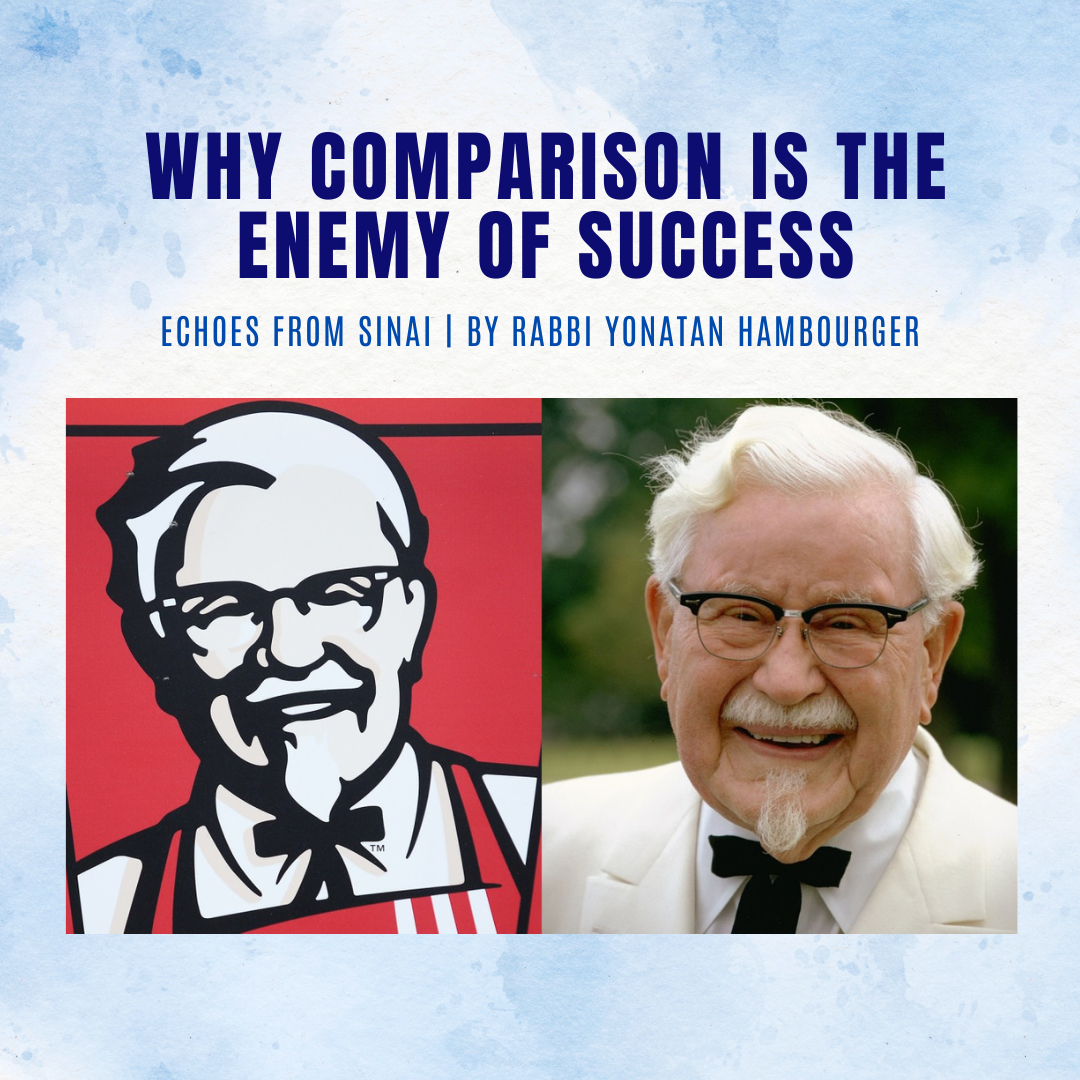
Why Comparison Is the Enemy of Success
By Yonatan Hambourger and Tzali Reicher
We are obsessed with the "if only" game.
If only I had started saving earlier for retirement. If only I had chosen a different career path. If only I had bought that house in the suburbs back in the '70s. It's amazing how much time we spend imagining alternate versions of ourselves, convinced that these hypothetical choices would somehow unlock the success we're chasing.
I see this mindset everywhere. At community gatherings, people humble-brag about their pension plans while others wish they had made similar choices. On Facebook, where grandchildren share their achievements, comments overflow with people lamenting their own life paths. It's as if we've collectively decided that decisions made decades ago predetermine success.
But here's what fascinates me: some of the most successful people I know didn't follow the traditional path. Take Betty, a friend who started a thriving antique restoration business at 55 despite having no formal training. Or Frank, who became a celebrated local restaurateur after taking a risk and leaving his accounting job of thirty years. They succeeded not because they had perfect cards, but because they learned to play their hands skillfully.
This phenomenon calls to mind the ancient wisdom found in the story from the seventh chapter of the Book of Numbers. When the Israelites built the holy Tabernacle in the desert –where G-d communicated directly with Aaron and his descendants, filled with Divine and extravagant artifacts – their tribal leaders donated exactly six wagons to transport everything—just six. No extras, no backup plans. Modern scholars have determined that these wagons were filled to absolute capacity, leaving no room for even a matchstick more.
At first glance, this seems like terrible planning. Wouldn't you want some wiggle room? A backup wagon in case something breaks down? But there's a profound lesson here: what looks like scarcity to us might actually be perfectly sufficient for our purpose.
In modern terms, we often assume we need every new gadget, another workshop, or a younger person's energy to succeed. We're constantly adding more wagons, convinced that we're somehow underequipped for life's journey. But what if we already have exactly what we need?
Look at Harland Sanders, who started Kentucky Fried Chicken at age 65 with just his Social Security check and a chicken recipe. Or Laura Ingalls Wilder, who published her first "Little House" book at age 65. These aren't stories about people with abundant resources; they're stories about people who maximized what they had.
The key isn't wishing for different circumstances – it's mastering the ones you've got. Instead of lamenting what you lack, try this exercise: list everything you do have. Include the obvious stuff like your life experience or skills, but don't forget the less tangible assets. Maybe you're exceptionally patient because of raising children. Perhaps you have a unique perspective because of living through significant historical changes. These aren't consolation prizes; they're your competitive advantages.
I recently talked to a retiree who initially felt disadvantaged because she didn't have computer programming skills like younger entrepreneurs. However, she realized her forty years of experience in customer service gave her insights into people's needs that her more tech-savvy competitors missed. She turned what felt like a limitation into the foundation of her successful senior care consulting business.
The truth is that we each possess a unique combination of traits, experiences, and capabilities that no one else possesses. The challenge isn't to become someone else—it's to become the fullest version of ourselves. Success doesn't come from having the best cards; it comes from playing your cards best.
So, stop the next time you catch yourself playing the "if only" game. Instead of imagining what you could do with someone else's hand, ask yourself if you're making the most of your own. Are you fully utilizing your decades of experience and wisdom? Are you spending more time wishing for youth's energy or maximizing the patience and perspective that come with age?
Because here's the thing: your "limitations" might actually be pointing you toward your purpose. What looks like a disadvantage today could become your signature strength tomorrow. The only way to find out is to stop comparing your cards to everyone else's and start playing your hand like you mean to win.
---
Yonatan Hambourger is a rabbi and writer dedicated to serving spiritual seekers of all backgrounds on behalf of Chabad of Rural Georgia. Tzali Reicher is a rabbi and writer who supports communities throughout the regional South. You can contact them at y@tasteoftorah.org.
January 23, 2025

The Sacred Art of Mindful Eating
By Yonatan Hambourger and Tzali Reicher
In today’s fast-paced world, where instant gratification reigns supreme, taking a step back to rethink how we approach the most basic activities—like eating—can feel downright revolutionary. The ancient Jewish practice of kosher eating offers a profound way to engage with food and life, one that transcends religious observance. It’s about living mindfully, connecting deeply with the world, and transforming everyday moments into opportunities for meaning.
At its heart, kosher—derived from the Hebrew word meaning “fit” or “proper”—is more than a set of dietary rules. It’s a philosophy that considers the relationship between people and what they consume. The Torah outlines guidelines for kosher eating, such as which animals are permissible, how they must be prepared, and the separation of meat and dairy. While these laws serve a religious purpose, their underlying principles resonate far beyond faith. They offer a perspective on food as more than mere sustenance—it becomes a reflection of values and intentions.
This message of thoughtful consumption can inspire anyone. In essence, kosher eating asks us to pause and consider not just what we eat but how and why. This concept isn’t unique to Judaism. Across traditions, food often serves as a vehicle for deeper meaning. For example, Lent in Christianity encourages fasting and reflection, emphasizing that what we consume or choose not to consume shapes our character and values.
A powerful story from Jewish tradition highlights the depth of this approach. Rabbi Schneur Zalman of Liadi, a mystic and scholar, was once asked by a butcher if a particular cow was kosher. The rabbi meticulously studied the matter, consulting texts and taking great care in his answer. The butcher, embarrassed by the effort he had caused, offered to discard the meat. The rabbi’s response was surprising: “I’m not doing this for you; I’m doing it for the cow.”
This story illustrates a profound idea: consumption isn’t just about the consumer. In Jewish thought, everything in the world, including food, has a divine spark. When we engage with what we consume thoughtfully, we elevate it, turning the mundane into something sacred. For those outside the Jewish faith, this might echo the Christian concept of stewardship—caring for what we’ve been given with purpose and gratitude. It’s a reminder that even the smallest choices, like what we eat, can honor something greater.
These age-old principles have never been more relevant. In a world grappling with selfishness and consumerism, eating more mindfully offers a framework to align our choices with our values. Imagine sitting down to a meal and asking yourself:
- Am I eating in a way that shows gratitude for the health and body G-d has blessed me with, or am I just shoving food in for the dopamine hit?
- Does this choice contribute to something greater than my immediate desire?
- What positive action will I do with the energy the food has fueled in me?
These questions challenge us to think beyond ourselves and consider the broader impact of our actions. They also invite us to slow down, savor the present moment, and appreciate the journey our food has taken to reach us.
While kosher eating provides a meaningful entry point, mindful consumption can extend to all aspects of life. In a society often driven by consumerism and the relentless pursuit of “more,” embracing mindfulness can feel like a countercultural act. Kosher principles teach us that every decision, no matter how small, has significance. Whether it’s the food we eat, the resources we use, or the time we spend, living with intention transforms the mundane into the meaningful.
This shift in perspective also brings a sense of gratitude. Seeing food as a gift rather than a given helps cultivate an attitude of appreciation. Similarly, viewing life’s daily tasks as opportunities for purpose encourages us to find joy and fulfillment in even the simplest activities.
What if we approached every meal as an opportunity to connect—not just with the food on our plate but with the people around us and the world itself? A mindful meal could become a moment of reflection, a chance to honor the work, resources, and lives involved in its creation. We create space for gratitude, awareness, and connection by slowing down and eating with intention.
This approach isn’t about perfection, adhering to strict rules, or reinventing your lifestyle overnight. Instead, it’s about progress—choosing one moment, one meal, and one act at a time to live more purposefully.
By embracing these ancient ideas in a modern context, we can align our choices with our values, honor the world around us, and find purpose in the everyday. Living mindfully starts with what’s on your plate, but its impact can ripple into every corner of your existence, transforming the ordinary into something truly extraordinary.
-
Yonatan Hambourger is a rabbi and writer dedicated to serving spiritual seekers of all backgrounds on behalf of Chabad of Rural Georgia. Tzali Reicher is a rabbi and writer who supports communities throughout the regional South. You can contact them at y@tasteoftorah.org.
January 16, 2025

Charity Isn’t About Them-It’s About You
By Yonatan Hambourger and Tzali Reicher
Why does giving feel so good?
It’s one of those universal truths we all experience: the joy of giving often outweighs the joy of receiving. There’s a very human moment of pride that everyone feels when we see how we’ve helped someone, whether it's a spouse recognizing your efforts around the house or the gratitude expressed by someone in need, even when they receive just a dollar. In fact, the legendary Jewish scholar Maimonides taught that the highest level of charity is to give anonymously, allowing the giver to forgo the ego boost they receive from being recognized and thanked for their assistance.
Whether it’s assisting a friend in need, contributing to charity, or volunteering, the act of giving fills us with a sense of purpose and connection. But why is this? Why does giving matter so much—not just to the receiver but to the giver?
It’s tempting to view charity and kindness as one-way streets. Someone requires help; you step in to provide it. It certainly sounds simple enough, but if you look a little deeper, you’ll find that the giver often walks away with something far more profound than the recipient. This dynamic lies at the core of a well-known teaching in the Talmud: “More than the calf needs to nurse, the cow needs to suckle.”
This phrase isn’t just about animals—it’s about us. It reminds us that giving is not a burden; it’s a necessity. The cow doesn’t feed the calf out of obligation but from a deeper desire to nurture. Similarly, we are inclined to feel fulfilled when we give to others.
Consider the world around us. According to the U.N., we produce enough food to feed everyone on the planet, yet over 800 million people go hungry every day. It’s not a problem of scarcity—it’s a problem of distribution. You might wonder, why doesn’t G-d bypass the middleman and ensure everyone has enough to eat? After all, if He can create the world, He can surely organize a more efficient system.
This leads us to a captivating lesson in the book of Exodus, where G-d instructs the Israelites to present Him with an offering. The verse says, “Take for me an offering…from every person whose heart inspires him to generosity.”
Why does the Torah say, “Take for Me”? Shouldn’t it say, “Give to Me”? Isn’t that the essence of charity about giving, not taking?
The wording here is intentional and conveys a profound message: when we give, we’re not just giving—we’re also receiving. G-d doesn’t need our charity; He’s giving us the opportunity to be part of something bigger. The act of giving refines us and adds meaning and purpose to our lives.
In a sense, we are G-d’s middlemen. We’re here to make the world a kinder, more compassionate place. Think of it like being part of a massive distribution network. The “products” we’re distributing aren’t just material goods like food or money—they’re also love, empathy, and connection. By stepping into this role, we become active participants in the betterment of the world.
It’s not just about meeting physical needs, either. Sure, a hungry person needs food, and a lonely person needs companionship. But on a deeper level, what we all crave—giver and receiver alike—is meaning. When we give, we tap into that need. It’s not just about the recipient’s gratitude but about fulfilling a purpose beyond ourselves.
That warm glow we feel after being charitable isn’t just the satisfaction of helping—it’s the realization that you’ve made a difference in someone’s life. You’ve gained something intangible yet incredibly valuable in giving: a sense of purpose.
Conversely, think about how many opportunities we miss when we don’t give. Every unopened email from a charity, every ignored chance to help a neighbor, is a missed opportunity—not just for them but us. We lose out on the chance to be part of something greater, to connect with others, and to fulfill our higher calling as humans.
G-d could have set up a perfect system where everyone’s needs are met without our involvement. But that’s not the point of creation. The world isn’t just a place to live. It’s a place to grow, connect, and improve through our actions. Giving is how we do that, and it’s how we transform the world into a kinder, more compassionate place.
There are plenty of opportunities to practice this principle, even those not financially related. While writing a check is undoubtedly important, giving also happens in everyday moments. It’s helping a co-worker with a challenging project, listening to a friend going through a rough time, or simply smiling at a stranger on the street. These acts of kindness ripple outward, creating a chain reaction of goodness that touches more lives than we can imagine.
By doing our part—whether big or small—we’re not just helping others; we’re helping ourselves. We’re fulfilling the Talmudic truth that giving is a need, not a chore. We’re stepping into our role as G-d’s middlemen, distributing not only money but love, compassion, and meaning.
Ultimately, every act of giving brings us closer to a world of peace, kindness, and prosperity for all. And that’s a vision worth working toward—one small act of generosity at a time.
-
Yonatan Hambourger is a Rabbi and writer dedicated to serving spiritual seekers of all backgrounds on behalf of Chabad of Rural Georgia. Tzali Reicher is a Rabbi and writer who supports communities throughout the regional South. You can contact them at y@tasteoftorah.org.
January 9, 2025

Tackling Our Goals for 2025
By Yonatan Hambourger and Tzali Reicher
As we enter 2025, a year full of potential and the promise of new beginnings, the world appears ready for transformation. A new administration is assuming power, the global stage is buzzing with fresh ambitions, and each of us possesses the ability to seize this moment. The beginning of a new year offers a chance to set bold goals and cultivate positivity, strength, ambition, and courage—essential qualities that drive us toward success and fulfillment.
It can be overwhelming and intimidating. However, let’s not shy away from challenges. Doubt, fear, and uncertainty naturally accompany ambition. They remind us of our humanity but should never define us. This balance between fear and faith has resonated throughout history, perhaps most poignantly in the story of the Children of Israel on the brink of entering the Promised Land.
They had just witnessed the miraculous event of receiving the Torah at Mount Sinai, standing directly in the presence of the Divine. Poised at the edge of their ultimate destination, they were reassured that G-d would fight their battles and grant them victory. The future appeared bright, with the promise within reach.
Yet, fear took root. Acting on their own initiative, they sent scouts into the Land of Israel. These scouts returned with a report so devastating that it drained the courage from the people. They claimed the land was unconquerable. Their words were filled with despair: “We are unable to go up against the people, for they are stronger than we are… we appeared like grasshoppers in our eyes, and that’s how we appeared in their eyes.”
Despite all they had seen and experienced, the Israelites succumbed to a collective case of low self-esteem. Their fear overshadowed their faith, and their hesitation led to profound consequences. God decreed that their entry into the Promised Land would be delayed by 39 years, ensuring that a new generation—unburdened by their parents' “slave mentality”—would inherit the land.
This delay was not just punishment but a necessary transformation. Faith, courage, and resilience needed time to take root within the people. Without these qualities, they could not fulfill their destiny.
Yet, as soon as the decree was issued, the Israelites experienced a dramatic change of heart. Fear transformed into determination. The very people who had been terrified moments earlier suddenly implored God to allow them to enter the Promised Land. They were ready to move forward, fearless, filled with the courage they had sorely lacked.
What sparked this turnaround? How could a people burdened by doubt one moment discover such determination the next?
The answer lies in awakening their inherent faith. Fear, no matter how overwhelming, is often temporary. It clouds our judgment and obscures the truth, but it cannot erase the courage that resides within us. For the Israelites, recognizing the consequences of their fear helped to reawaken their faith. They remembered who they were: a people chosen for greatness, under divine protection.
This story resonates deeply as we look ahead to the year before us. Fear and doubt will visit us all, especially as we embark on new ventures, face challenges, or strive for goals that feel just out of reach. However, these emotions are not our enemies; they present opportunities to tap into the faith and courage that already lie within us.
Overcoming fear begins with acknowledging it. The Israelites were not condemned for feeling afraid; fear is a natural response to the unknown. The problem arose when they allowed fear to control their actions and overshadow their faith. In our lives, we can make a different choice. When fear whispers that we are “grasshoppers” in a world of giants, we must remind ourselves of the truth: we are stronger, braver, and more capable than we realize.
Faith doesn’t mean the absence of fear; it means acting in spite of it. It involves trusting in the vision of who we can become and taking steps toward that vision even when the path feels uncertain. Like the Israelites, we may stumble, but we can always rise again. Even in the face of doubt, the courage to move forward turns potential into reality.
So, as we welcome 2025, let us embrace its challenges and opportunities with positivity and Let ambition guide our actions and courage steady our hearts with strength. The lessons of the past remind us that greatness is not achieved without struggle, but they also remind us that the seed of triumph lies within every struggle.
Be strong and of good courage. This year is yours to conquer.
-
Yonatan Hambourger is a Rabbi and writer dedicated to serving spiritual seekers of all backgrounds on behalf of Chabad of Rural Georgia. Tzali Reicher is a Rabbi and writer who supports communities throughout the regional South. You can contact them at y@tasteoftorah.org.
January 1, 2025
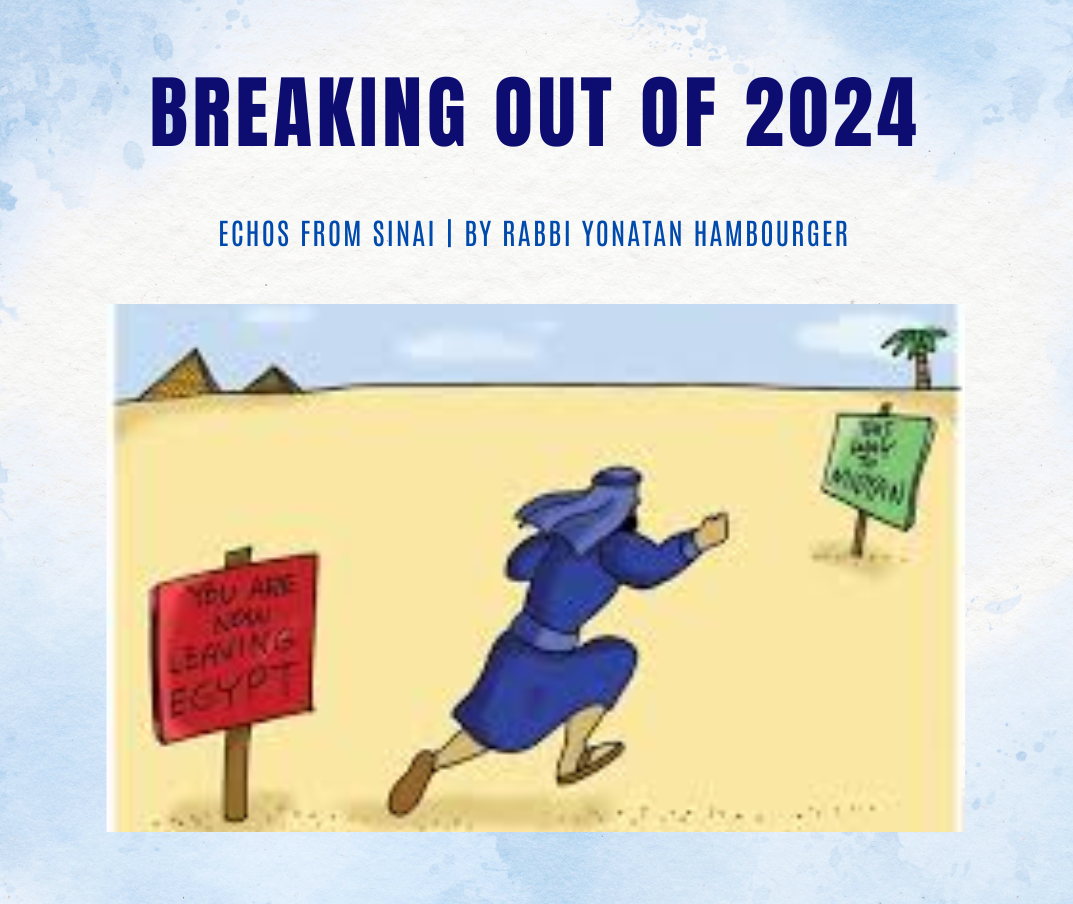
Breaking Out Of 2024
By Yonatan Hambourger and Tzali Reicher
As 2024 draws to a close, it’s a natural time to reflect. Did you achieve the goals you set for yourself at the beginning of the year? Did you make progress in your career, grow your family, or meet someone special? Or, on the other hand, did the year pass by without reaching the milestones you’d hoped for?
Whether you’re celebrating success or feeling the sting of missed opportunities, one thing is certain: the temptation to settle for less. Life’s distractions and disappointments can easily lead us into stagnation, where we feel stuck emotionally, spiritually, or intellectually. We might feel like we’ve reached a peak, or we may feel as though we’re caught in a loop, unable to move forward. But whether we’re celebrating success or feeling defeated, the real danger is the same: complacency.
Jewish sages refer to the trap of stagnation as being stuck in our "personal Egypt." The word "Mitzrayim," the Hebrew name for Egypt, means "constraint" or "narrow passage." Egypt, in this context, isn’t just a place—it represents the limitations that confine us, holding us back from reaching our full potential. Just as the Israelites were trapped in Egypt for centuries, we too, can become trapped by our own habits, fears, and comfort zones. We might fall into the mindset of “this is good enough,” forgetting that life’s greatest fulfillment comes from pushing past those boundaries. Like the ancient Israelites, we risk being held back by self-imposed limitations, settling into a life that doesn’t allow for true growth.
The journey of the Children of Israel offers a powerful lesson on how to break free from stagnation.
In the Torah, the journey is described in the book of Numbers: “These are the journeys of the children of Israel, going out of the land of Egypt” (Numbers 33:1). The use of the word “journeys” is significant. Why, the sages ask, is it written in the plural? After all, the Israelites departed from Egypt only once. The journey began when they crossed the Red Sea, and it would be complete when they entered the Promised Land. So why refer to it as “journeys”?
The sages explain that this reflects a deeper truth: the process of leaving Egypt is not a one-time event but an ongoing journey. It wasn’t just about physically leaving Egypt—it was about shedding the mindset and limitations that Egypt represents. Each of the 42 stops where the Children of Israel encamped in the desert on their way to the promised land was an opportunity for them to evolve, face new challenges, and grow. Every stop wasn’t just about moving geographically but about becoming better people, step by step.
Jewish mysticism further elaborates on this idea, saying that ‘leaving Egypt’ is a personal, continuous journey for all of us. Egypt isn’t just a physical place—it’s a state of mind, a limitation that holds us back. Just as the Israelites had to leave behind the mindset of slavery and move toward freedom, we must continually strive to leave behind the narrow passages of our personal limitations. Whether those limits are fears, bad habits, compulsions, or complacency, the process of growth requires constant movement away from those confines.
This idea is echoed in the teachings of the Talmud, which says, “When we have one hundred, we want two hundred.” While this may sound like a lesson in greed, it’s really about personal growth. In the material world, wanting more can be negative, but in terms of self-improvement, an endless desire to push forward is a virtue. Once we break free from one limitation, we often find ourselves needing to break through another. What once seemed liberating can start to feel confining as we continue to grow.
The journey of the Israelites was not a quick or easy process. It took decades. Every encampment brought new challenges. Yet, the key was that they didn’t stop moving. They didn’t remain stagnant. They grew through each hardship. The same is true for us: every time we break through one obstacle, we find new ones waiting to be overcome. The journey never ends, but each step brings us closer to realizing our fullest potential.
For us, the ultimate goal of the journey is to reach the “Promised Land”—a place of self-actualization where we no longer feel held back by the limitations of the past. Our “Promised Land” is a state of being where we fully realize our potential. It’s where we live freely and authentically, without the weight of the constraints that once held us back.
As we look back on 2024 and prepare for the new year, it's important to plan the next steps in our own journey. What limitations are you ready to leave behind? What ‘personal Egypt’ are you prepared to break free from? The Exodus is not a one-time event but a process that continues each day. Every day presents a new opportunity to take another step toward freedom, growth, and fulfillment. As we enter 2025, we can leave behind the narrow passages of the past and continue on the journey to the Promised Land of our best selves.
-
Yonatan Hambourger is a Rabbi and writer serving spiritual seekers of all persuasions on behalf of Chabad of Rural Georgia. Tzali Reicher is a Rabbi and writer serving communities throughout the regional South. You can reach them at y@tasteoftorah.org.
December 26, 2024
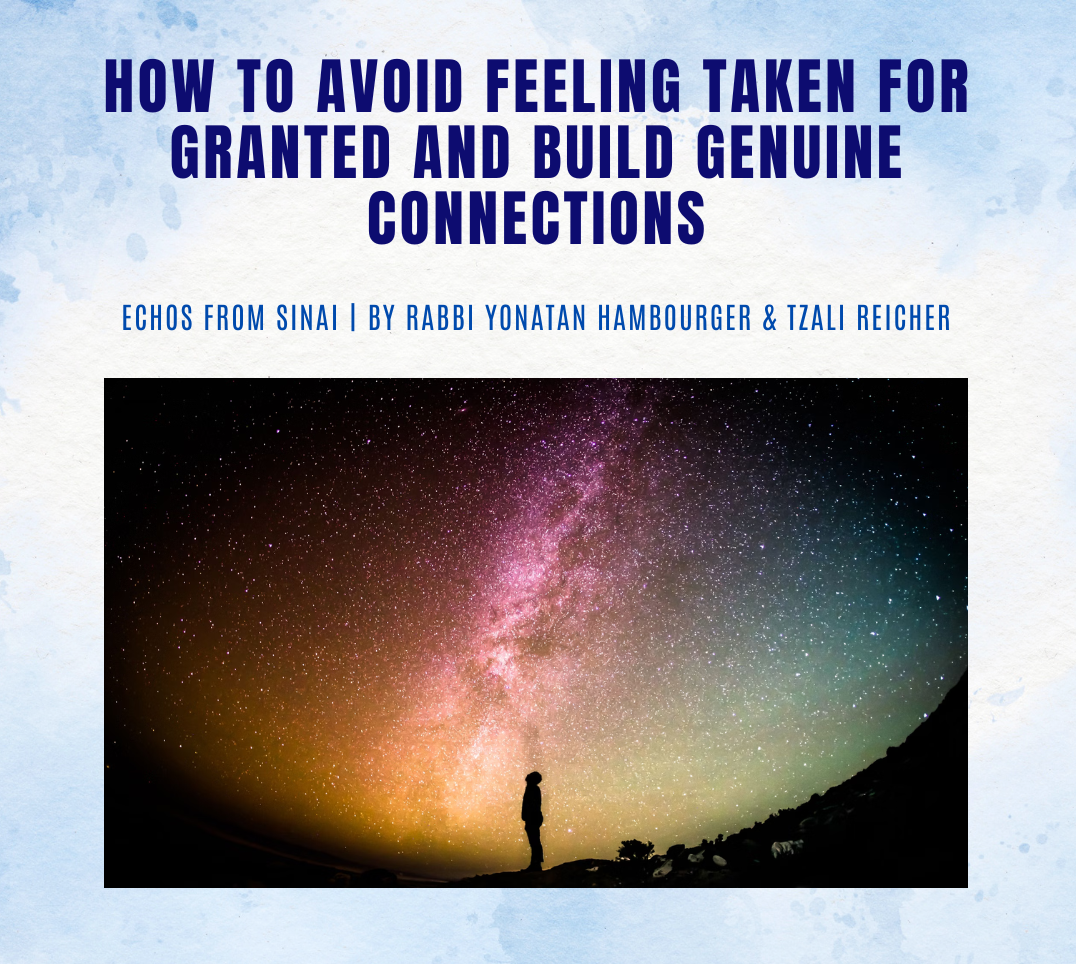
How to Avoid Feeling Taken for Granted and Build Genuine Connections
By Yonatan Hambourger and Tzali Reicher
Have you ever felt like you were giving so much in a relationship, yet receiving little in return?
You do, do, do for the other person, whether it's your partner, friend, or family member, but there’s no acknowledgment, no gratitude, no recognition. It feels like you’re just going through the motions, trying to make things work while the other person seems oblivious to your effort.
If this sounds familiar, you're not alone—many of us experience this sense of imbalance in our relationships at some point or another.
Of course, this is not just a modern-day phenomenon. If we take a step back and consider ancient wisdom, particularly the teachings found in the Torah, we can find insights that are still relevant to how we approach our connections with others. A recurring theme emerges. The message is simple but profound: intentionality in relationships matters. And just as importantly, we need to recognize the difference between meaningful, committed love and a shallow, transactional relationship.
Take, for example, a passage in the book of Leviticus. In Chapter 26, G-d speaks to the Israelites, reminding them that everything in life is a gift from Him. He challenges them not to view the blessings in their lives as mere chance or coincidence but to understand them as intentional gifts. The text says: “If you... approach me with keri, I will respond with a fierce keri.”
Now, keri is a Hebrew term that can be roughly translated to “happenstance” or “coincidence.” It is rarely used in the Torah, and in fact, appears only seven times, all in this section. In essence, G-d is warning us against approaching life with a mindset of randomness, as if our experiences are simply the result of luck or fate. This way of thinking reduces life to a series of isolated, disconnected events, where we see no meaning behind them, and we fail to recognize the deeper connections at play.
When we apply this lesson to relationships, it becomes clear that a relationship rooted in keri lacks depth and consistency. If you are constantly taking your partner, friend, or family member for granted—assuming that everything that happens between you is just a coincidence—you are, in a way, disengaging from the very essence of what it means to build a lasting, fulfilling connection. Relationships based on happenstance are unstable, unpredictable, and shallow. There’s no real commitment, no intention behind the actions. It's all about what happens at the moment without consideration for the long-term bond you're trying to create.
To bring this into a more contemporary context, there’s the old joke told about the fellow who’s late for an important appointment, driving around the block for the umpteenth time looking for a parking space.
In desperation, he cries out to G-d, “If you give me a parking spot right now, I will make a large donation to charity!” Just as the words leave his lips, a spot becomes available, and he says, “Never mind, G-d. I got this one covered!”
The problem with this mindset is that it creates a self-fulfilling prophecy. A person’s lack of recognition of the Divine guiding Hand distances him from a deeper spiritual connection. Life is reduced to a series of random events governed by cause and effect rather than understanding that every moment—every green light, every obstacle, every bump in the road—can be a custom-sent message from God, meant to guide us, teach us, and grow us.
This is where spiritual sensitivity comes into play. Just as your phone must be turned on to receive a text message, your spirit must be tuned in to the messages G-d is sending you. If you’re not open to receiving those messages—if you’re too busy chalking up everything to chance—you miss out on the deeper lessons meant to be learned. And when you miss those messages, your relationship with your Creator, and with others, will remain distant and superficial.
So, how do we cultivate that spiritual sensitivity in our daily lives? It starts by slowing down and paying attention. One practical step is to take a few minutes each day to reflect on everything that has happened to you. Did you face any challenges? Did someone offer you unexpected kindness? Did something fall into place that seemed to happen just at the right time? Instead of brushing these things off as coincidence, try to see them as intentional moments sent your way, part of a greater plan designed to guide you.
In relationships, this kind of mindfulness is crucial. When you begin to view your interactions with others through the lens of intentionality, you stop taking things for granted. You begin to notice the little things—the way your partner listens to you, the effort a friend puts into staying in touch, or the patience your family member shows when you're feeling stressed. These may seem like small gestures, but when you view them as intentional acts of love and care, they take on a whole new meaning. And the more you recognize and express gratitude for these things, the more your relationships will deepen.
The wisdom from the Torah teaches us that nothing is by chance; everything has purpose and intention behind it. And if we embrace that mindset, not only will we deepen our relationship with our Creator, but we will also cultivate stronger, more meaningful connections with those around us. So, take a moment each day to reflect, to be grateful, and to engage intentionally in your relationships. You’ll be surprised at how much richer and more fulfilling life becomes when you approach it with purpose and sensitivity.
We wish you all of G-d’s blessings during this holiday season, next year, and always!
-
Yonatan Hambourger is a Rabbi and writer serving spiritual seekers of all persuasions on behalf of Chabad of Rural Georgia. Tzali Reicher is a Rabbi and writer serving communities throughout the regional South. You can reach them at y@tasteoftorah.org.
December 19, 2024

How To Earn Your Blessings
By Yonatan Hambourger and Tzali Reicher
Why do we bother working if G-d is the source of all blessings? And when we do work and succeed, why do we thank G-d for what we clearly accomplished ourselves? The tension between these two ideas can feel confusing, and it’s something people have been grappling with for centuries.
It’s a question that comes up when people consider that if everything is predetermined and ultimately up to G-d, then we are left to wonder why we should bother with all the hassle and struggle of working.
The Torah offers a clue in Leviticus: "Six days shall work be done, but on the seventh day shall be holy, a day of complete rest to G-d.” That phrase, “shall work be done,” is in the passive voice, and it’s not just a random choice of words. It hints at something deeper: even during the week, when we’re out there working, our effort alone isn’t what gets the job done.
Of course, that doesn’t mean we can just sit back and wait for blessings to fall into our laps. Imagine a farmer who spends all his time praying for rain but never bothers planting seeds. No amount of rain will make crops grow if the fields are empty.
This dynamic—a mix of effort and divine blessing—is baked into everything we do. In both our personal and professional lives and relationships, success and positive results are always a blend of your input and factors beyond your reach.
There’s a story about the Israelites wandering in the desert for 40 years that drives this home. Each day, they were sustained by manna from heaven, a miraculous food that appeared like dew on the ground. But here’s the interesting part: the manna didn’t land neatly inside their tents. Those who had the strongest faith found it close by, requiring minimal effort to gather. Those who struggled with “trust issues” had to search further, putting in significantly more work to collect their daily portion.
Why didn’t G-d just make it easy for everyone and drop the manna right into their bowls? It wasn’t about convenience; it was about teaching a lesson. They had to do something—they had to show up, even if only to stretch out a hand. The effort itself wasn’t what brought the manna, but it was the necessary act to receive the blessing.
And that is how life works. Whether it’s landing a new job, building a business, or even raising a family, success is rarely the result of effort alone. Sure, we hustle, strategize, and give it our all, but there’s always an element of unpredictability—a deal that falls into place, an idea that clicks, or the right opportunity at the right time.
Take starting a small business as an example. You can put together a great business plan, invest your savings, and work endless hours. But no amount of planning can guarantee success. Maybe you meet a mentor who shares a game-changing piece of advice, or a chance encounter leads to your first big client. Those moments feel like something greater than yourself at work.
At the same time, there’s a balance to strike. Sitting around waiting for blessings doesn’t cut it. You have to plant the seeds, so to speak. But just like the Israelites in the desert, the point of our effort isn’t to “make” blessings happen. It’s to create a channel through which blessings can flow. This isn’t about undermining hard work—it’s about reframing it. Our efforts matter, but they’re not the whole story.
So why thank G-d when things go well? Because, at its core, success isn’t just about what we do. It’s about recognizing that we’re part of something bigger—a partnership between our efforts and a force beyond us. And acknowledging that partnership doesn’t take away from what we’ve achieved; it adds meaning to it.
At the end of the day, our work isn’t just about getting results. It’s about showing up, doing what we can, and leaving room for something greater to play its part. Like the Israelites gathering manna, we’re tasked with putting in our share of the effort—not because it’s all up to us, but because it’s how we open the door for blessings to come in.
-
Yonatan Hambourger is a rabbi and writer serving spiritual seekers of all persuasions on behalf of Chabad of Rural Georgia. Tzali Reicher is a rabbi and writer serving communities throughout the regional South. You can reach them at y@tasteoftorah.org.
December 12, 2024

Getting The Most Out of 2024
We’re now deep into December, the last month of the year, and it feels like we're trudging to the finish line of 2024.
It’s hard to believe how fast the year has gone by.
It feels like just yesterday we were making bold resolutions, setting lofty goals, and mapping out how this year would be the one when everything changed. But then life happened. The excitement of January faded into the routines of February, the chaos of spring, the lazy days of summer when everything is pushed off till we’re back in the office, and the whirlwind of fall. Now, here we are in December, looking back at the plans we abandoned somewhere along the way and telling ourselves, “It’s fine, I’ll start fresh in January.”
But will we? January 1 has a seductive promise: a clean slate, a fresh start. Yet, deep down, we know the truth. The calendar changing doesn’t magically transform us into more disciplined, driven, or organized versions of ourselves. Meanwhile, the precious time we have now—this very day, this very hour—slips away unused.
The truth is there’s still time in 2024 to make things happen. These final weeks of the year aren’t just for coasting or wrapping things up; they’re for taking action. Waiting for January to kick things into gear is like spotting the finish line of a race and deciding to slow down. Why limp into the New Year when you can fly into 2025 with momentum already on your side?
The Rebbe, Rabbi Menachem M. Schneerson, of righteous memory, was the most influential rabbi in modern history, and he often emphasized the irreplaceable value of time. During an address he delivered in 1951, he opened with these words: “I don’t want to say that our time is short, rather that our time is precious.” Time isn’t about scarcity or abundance—it’s about how we use it. Every moment we’re given carries potential, a mission waiting to be fulfilled.
This idea isn’t just theoretical; it’s deeply practical. On the Rebbe’s eightieth birthday in 1982, thousands of admirers celebrated his remarkable achievements, marveling at how much he had accomplished in his lifetime. But instead of reflecting on past successes, the Rebbe spoke about the value of every second:
“People worry for their monetary losses but care not for their precious time. Money comes and goes, but time never returns! Every moment that a person is granted carries a unique purpose, a mission from G-d. If time passes without it being utilized, that moment in time is lost forever!” The Rebbe demonstrated that we can do more in less time than we often believe as long as we use the time allotted with purpose and focus.
What if we adopted this mindset for the rest of 2024? What if, instead of seeing these last few weeks as time to wind down, we saw them as time to gear up? Imagine using December not as a month of excuses but as a month of action. Start tackling the goals you set back in January. Revisit the resolutions you’ve ignored. Even if you only make small progress, you’ll be building momentum that will carry you into the New Year.
It’s not about overwhelming yourself with a frantic to-do list. It’s about making the most of what you have. The time is there—you just need to use it. That project you’ve been putting off? Start it now. That phone call you’ve been meaning to make? Make it today. The gym membership collecting dust? Lace up your sneakers and go.
And don’t underestimate the power of even a single action. The Rebbe often emphasized that every moment carries a mission, and even a small, positive step can ripple outward in ways we can’t predict. The time we spend working toward our goals today is an investment—not just in our future, but in the here and now.
As the final days of the year slip away, we have a choice. We can limp toward the finish line, exhausted and unmotivated, waiting for January 1 to give us permission to start over. Or we can use this time to take action, to build momentum, to make these last days count. By the time the clock strikes midnight on December 31, we won’t just be starting 2025—we’ll already be running.
There’s still time in 2024 to make progress, to make changes, to make things happen. Let’s seize this time, cherish it, and use it to its fullest. The New Year is coming—but we don’t need to wait for it. Let’s make these last weeks of 2024 our strongest yet and fly into 2025 ready for whatever comes next.
-
Yonatan Hambourger is a rabbi and writer serving spiritual seekers of all persuasions on behalf of Chabad of Rural Georgia. Tzali Reicher is a rabbi and writer serving communities throughout the regional South. You can reach them at y@tasteoftorah.org.
December 5, 2024

Politics Can't Replace Religion
By Yonatan Hambourger and Tzali Reicher
Well before the recent presidential election, it was clear that many Americans were filling the gap once occupied by faith and spirituality with politics, letting what is happening far away in Washington dictate their moods, personal relationships, and how they see the world.
This is not an issue exclusive to one side of the political aisle.
Some Conservatives have been swept up in a populist wave, replacing some of their core values with an inflexible and unwelcoming maximalist position. Meanwhile, the Left has increasingly placed its faith in government and ideology, treating them as sacred entities capable of delivering salvation. But politics cannot replace religion, and when this misguided faith inevitably falters, the emotional fallout is profound.
Secular humanism has morphed into its own quasi-religion. This worldview reveres the power of human institutions to fix every injustice and create a perfect society. The government is treated as the ultimate arbiter of morality and progress, with its leaders and policies imbued with a sense of infallibility. Yet, these human constructs repeatedly fail to deliver, leading to frustration, outrage, and despair.
Governments fail, leaders disappoint, and ideologies clash. When these human constructs crumble, those who place their hope in them are cast adrift without an anchor.
Contrast this with the monotheistic worldview that has guided countless generations. For example, look at King David’s observation in Psalm 20, “These trust in chariots and these in horses, but we—we mention the name of the Lord our G-d. They kneel and fall, but we rise and gain strength.” Monotheism acknowledges human limitations and places ultimate trust in a Creator who transcends those limitations. It teaches that we are all created in G-d’s image, giving life profound meaning and purpose while also reminding us that life’s uncertainties are part of a divine plan. This belief system equips its adherents to endure setbacks with grace, humility, and hope.
For those who believe the state can and should solve all of life’s problems, failure is catastrophic. When government programs falter, when leaders betray ideals, or when progress seems out of reach, the emotional fallout is devastating. Politics isn’t meant to be our moral guide to understanding the world; it is a tool to affect change and to share our Judeo-Christian values. If the state is your G-d, then its failures are existential crises.
This phenomenon helps explain today’s increasingly volatile reactions to political and social challenges. The outrage, the vitriol, and the refusal to tolerate dissent are not signs of ideological strength but symptoms of a worldview collapsing under its own weight. Secular humanism cannot prepare its adherents for the inevitability of human fallibility. Rather, it creates a fragile moral framework that shatters when the systems it idolizes fail to meet expectations.
Believers in G-d, on the other hand, possess an inner resilience that transcends worldly disappointments. Faith in a loving Creator fosters a perspective that recognizes human limitations while placing trust in something eternal and unshakable. This duality—human dignity coupled with divine sovereignty—provides the strength to weather life’s storms without falling into despair.
Psalm 20 offers a strikingly relevant and timely message for our time. Trusting in “chariots and horses”—in earthly power and human constructs—leads to disappointment. But those who “mention the name of the Lord” rise and gain strength. This isn’t just a theological concept; it’s a practical guide to living with resilience in an unpredictable world.
The emotional crisis that so many of our fellow citizens are facing is a symptom of a deeper problem: the spiritual void created when faith is replaced with ideology. Without G-d, there is no ultimate source of hope or meaning. Every failure feels permanent; every loss is catastrophic, and every setback irredeemable. But with G-d, disappointment is reframed. Challenges become growth opportunities, and hope persists even in the face of hardship.
As our society grapples with polarization and despair, it is time to reconsider the role of faith—not as a divisive force but as a unifying and stabilizing one. The answer to today’s emotional turmoil isn’t more government programs or ideological purges; it’s a return to the belief in something higher, something eternal. Only then can we rise above the chaos, find peace amid life’s uncertainties, and gain the strength to move forward with dignity and purpose.
-
Yonatan Hambourger is a rabbi and writer serving spiritual seekers of all persuasions on behalf of Chabad of Rural Georgia. Tzali Reicher is a rabbi and writer serving communities throughout the regional South. You can reach them at y@tasteoftorah.org
November 28, 2024

What To Be Thankful for This Thanksgiving
By Yonatan Hambourger and Tzali Reicher
For many, 2024 has been a challenging year.
The Middle East is facing the most prolonged war the region has seen in centuries, as the radical regime in Iran continues to deploy its proxy armies against Israel. Still reeling from the horrific events of October 7, 2023, the world’s only Jewish state is fighting brutal wars on seven different fronts, while seeking to recover the 101 innocent hostages still being held by Hamas in Gaza. On the other side of the world, the Russia-Ukraine War has continued in the background and claimed the lives of hundreds of thousands, while China, Iran, and North Korea continue ramping up their aggressive rhetoric that threatens the stability of the world.
Domestically, the cost of living has soared and public sentiment about the economy and the future remains bleak. The drawn-out election season was taxing and divisive, and our faith in the institutions that are meant to lead and guide us has plummeted.
So, as Thanksgiving approaches, after the year we’ve had: what is there for us to be thankful for?
The answer can be found in a talk delivered by the Rebbe, Rabbi Menachem Mendel Schneerson, of righteous memory, about Thanksgiving almost 40 years ago:
In the Rebbe’s telling, the most powerful part of the Thanksgiving story was how the country's original settlers immediately proclaimed a holiday of thanksgiving to G-d upon their arrival, expressing gratitude for a secure land and freedom from religious oppression. The Rebbe, who maintained warm and mutually respectful correspondence with the presidents and leaders of his day, drew a throughline to how the United States remains a beacon of freedom and opportunity, and lauded America as a "Medinah shel Chessed" - a nation of kindness, a sanctuary for the Jewish people, and a pillar of support for Israel.
If those settlers, who endured so much more than we can imagine, could pause to be thankful, how much more should we, with all the resources and abundance we have today, find reasons to express gratitude?
Even in the face of hardship, there is much to appreciate:
Yes, politics is contentious, but our peaceful and respectful transition of power remains a cornerstone of our democracy. Yes, the economy has been difficult, but the forecasts are beginning to brighten, and the incoming administration has placed economic recovery front and center. Globally, while conflicts still dominate headlines, there are glimpses of resolution—steps toward peace in Ukraine, and support for Israel to eliminate the enemies massed on its borders once and for all, ready to begin a new dawn of peace and prosperity.
We are living in extraordinary times, where challenges and triumphs coexist in ways that highlight the resilience and potential of our nation. America is not just a country—it is the center of innovation, the leader of global democracy, and the defender of human rights. Our achievements in technology, medicine, and the arts have set the stage for progress that benefits people across the globe.
Moreover, the freedoms we enjoy are unparalleled in history. From the right to vote and speak freely to the ability to practice religion without fear, these liberties are gifts that form the bedrock of a nation that values justice and equality for all. As the world looks to America for guidance and leadership, we must appreciate the privilege of being part of this extraordinary experiment in democracy.
Even amidst difficulties, America stands as a beacon of hope, generosity, and compassion. It is a nation that welcomes the oppressed, feeds the hungry, and shelters the displaced. These are not just policies—they are a reflection of the kindness and humanity that define the American character. This Thanksgiving, let us take pride in how far we’ve come and embrace the responsibility to continue shaping a brighter future.
On top of being a time to share our gratitude for our personal blessings, Thanksgiving is an opportunity to recognize the divine providence that has placed us in a nation that champions democracy, kindness, and justice. So, this Thanksgiving, we are thankful not only for family, health, and security but also for the privilege of calling America our home—a place where freedom thrives, support for democracy and liberty endures, and kindness defines our national character.
-
Yonatan Hambourger is a rabbi and writer serving spiritual seekers of all persuasions on behalf of Chabad of Rural Georgia. Tzali Reicher is a rabbi and writer serving communities throughout the regional South. You can reach them at y@tasteoftorah.org.
November 21, 2024

Celebrate Elections, Don’t Dread Them!
By Yonatan Hambourger and Tzali Reicher
With the presidential election behind us, Americans have reason to take a moment and celebrate.
The election season—with its passionate debates and competing visions—showcased the strength and resilience of our democratic system, which has stood as a beacon of freedom and stability for generations. Each voice, each vote, has shaped the direction our nation will now take. And, as one party steps back to let another lead, we witness an inspiring reminder of our democracy’s power: the peaceful transition of authority.
This process is greater than any party or individual. It’s a testament to our commitment to participation, respect, and resilience—a national covenant to uphold a system where different perspectives can coexist and contribute to our common good. The Torah speaks to the value of harmony, of embracing diverse voices to build a unified whole, reminding us that true strength lies in our ability to hold differing opinions while remaining committed to a shared purpose.
The Lubavitcher Rebbe, Rabbi Menachem Mendel Schneerson, of righteous memory, encouraged public engagement and saw voting as a profound responsibility, a way to contribute to our communities and express our thoughts on our nation’s course. He viewed every person’s role in governance as an honor, underscoring that, even amid differences, our democracy’s strength lies in unity and stability.
Ours is a grand experiment in self-governance. Since its founding, this system has withstood challenges, adapting and evolving over time. Beyond individual policies or parties, it’s our collective commitment to civic duty that gives this system its lasting power. We are not simply governed; we are participants in shaping the framework that keeps our nation strong.
For those in the Jewish tradition, civic responsibility resonates deeply. Involving oneself in community decisions is both a duty and an honor—a commitment to the tzibbur, the collective. Judaism places such high value on community and people coming together that many prayers can only be said when a minimum of 10 people are gathered, because, as it says in Ethics of Our Fathers, the Divine Presence rests on people who gather to study together or do a communal good. Every vote cast respects the diversity of a nation, reflecting our dedication to each other’s well-being while staying true to shared values. This election reminds us of the power we hold together, with each ballot carrying weight in shaping the world around us.
Election season can be tiring, with all the ads, debates, and constant back-and-forth. But this fatigue is, in a way, a privilege—it shows that we live in a place where we have a real choice, something many around the world don’t have. Our right to vote is more than just an obligation; it’s a privilege, a chance to help shape our country’s path. The cycle of leaders stepping down and others stepping up brings new voices, ideas, and changes, while still respecting the stability tradition provides, and in a few short years, we will have the opportunity again to determine if this leadership is working or if it’s time for something new. This rhythm is what keeps our nation alive and moving forward.
For those whose candidate didn’t win, disappointment is natural, but it, too, is a testimony to the greatness of our system. No matter who leads, the system remains steady, fostering continuity while allowing for change. And in time, even those feeling discouraged may be surprised by positive developments and unexpected progress that the new leadership brings—not just to our country but to the world.
Our democracy is a model that has inspired others globally, a system where governance serves the people and where power is peacefully transferred. This week, as we reflect on the election, we can feel grateful for a system where leadership is chosen, not imposed, where authority is accountable, and where each citizen has a voice in the future.
As the next administration steps in, we look forward with hope, trusting that they will fulfill their duty to the nation until the time for change comes again. In a world too often marked by division, our democracy serves as an example of cooperation and respect. Let us celebrate this election season as a reminder of our privilege, honoring the responsibility that each vote holds, and embracing a system that allows for both spirited debate and unity in our shared future.
-
Yonatan Hambourger is a rabbi and writer serving spiritual seekers of all persuasions on behalf of Chabad of Rural Georgia. Tzali Reicher is a rabbi and writer serving communities throughout the regional South. You can reach them at y@tasteoftorah.org.
November 14, 2024
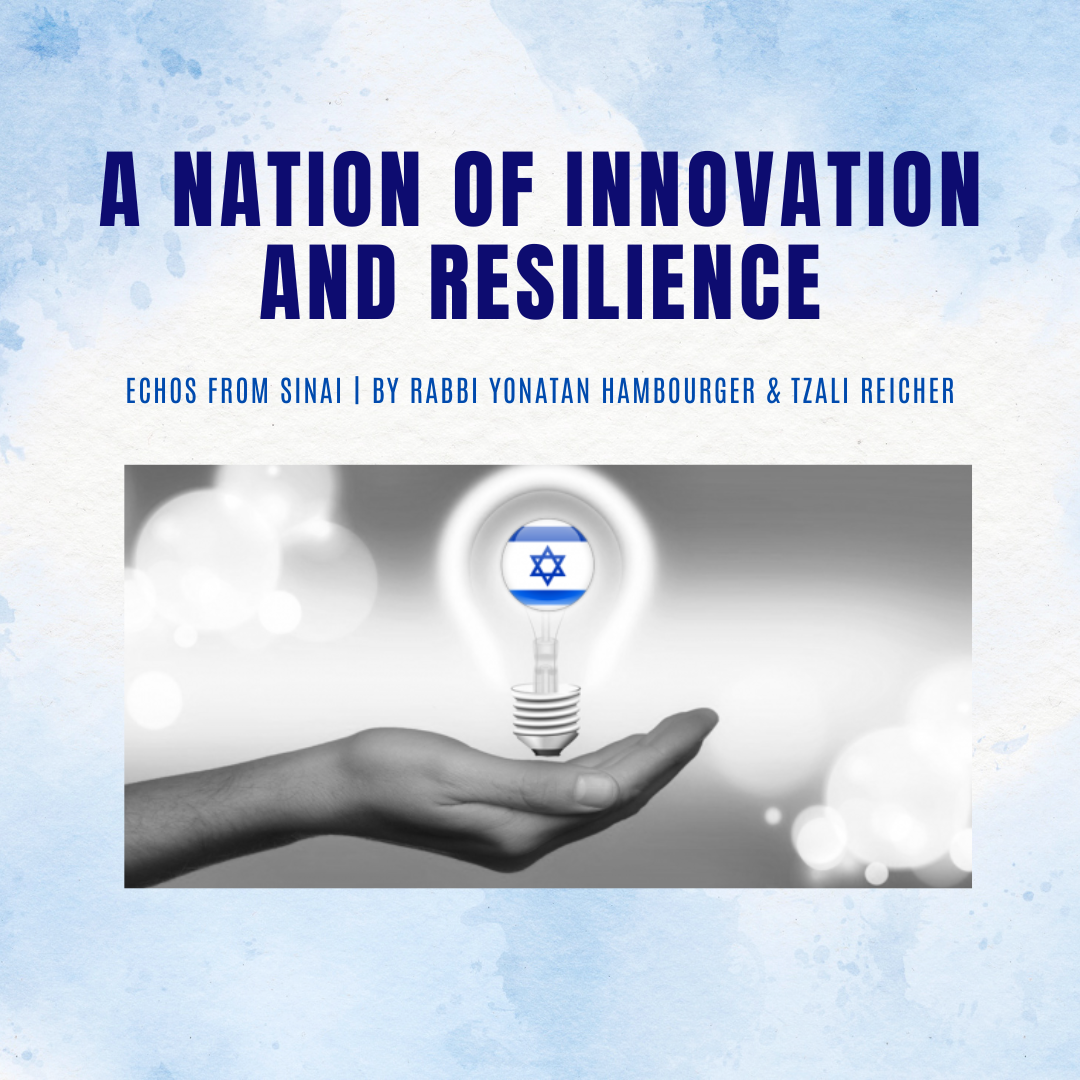
A Nation of Innovation and Resilience
By Yonatan Hambourger and Tzali Reicher
When the world looks at Israel, it often sees a country defined by conflict, resilience, and survival—a nation that has weathered wars, terrorism, and the occasional bout of political instability to defend its existence. This view is only reinforced by Israel’s recent struggles, with the brutal Hamas invasion, massacres, and kidnappings of October 7, 2023, marking a painful chapter in a year spent defending against multiple fronts and rogue states.
Yet Israel is so much more than its conflicts. Beyond the struggle, it is a powerhouse of global innovation—an engine of solutions that improve lives far beyond its borders, even as attempts to delegitimize the country through the BDS movement persist.
BDS, or the Boycott, Divestment, and Sanctions movement, works to undermine Israel by promoting the idea that it should be isolated while imposing economic sanctions. Per Wikipedia, “Boycotts are facilitated by urging the public to avoid purchasing goods made by Israeli companies, divestment by urging banks, pension funds, international companies, etc. to stop doing business in Israel, and sanctions by pressuring governments to end military trade and free-trade agreements with Israel and to suspend Israel's membership in international forums.”
But the irony of these calls for boycotts is that they overlook a profound truth: Israel is a country that not only survives but thrives, pioneering technologies that have become essential to modern life. In Israel, necessity drives invention at a pace unmatched by most developed nations. From agriculture to AI and healthcare, Israel’s advances reach far beyond its borders, benefiting millions in ways that can’t simply be dismissed or ignored.
Take healthcare, where Israeli innovation shines in addressing real-world needs. Nuvo’s Invu, for instance, is a groundbreaking wearable device that allows expectant mothers to monitor their pregnancies from home, reducing hospital visits and offering critical peace of mind. It’s a profound example of how Israel doesn’t just solve local challenges—it creates solutions that resonate globally, improving lives in areas with limited healthcare access. BDS, however, seeks to ignore such contributions, overlooking the impact of these technologies on the very people it claims to support.
Agricultural technology is another area where Israel’s ingenuity benefits people worldwide. In a region with limited arable land and scarce water, Israelis developed drip irrigation—a method now used in drought-prone regions globally to conserve water and increase crop yields. More recently, innovations like BeeHero’s Pollination Insights Platform tackle the global pollinator
crisis, helping ensure food security as bee populations decline. Such advancements address challenges faced not just by Israel but by the world at large, making it clear that efforts to delegitimize these achievements are both misguided and counterproductive. Israel’s achievements in artificial intelligence and cybersecurity, too, are undeniable. AporiaGuardrails, an AI management tool, helps companies monitor and prevent real-time AI risks, showing how Israeli innovation prioritizes safety and responsibility in an era when technology is often deployed without oversight. These contributions are indispensable to Fortune 500 companies and startups alike, yet BDS proponents would have us overlook these impacts, as if isolating Israel could somehow erase its vital role in our interconnected digital lives. But Israel’s impact doesn’t stop with its technology exports. Waze, the navigation app created in Israel, revolutionized how we commute, and Mobileye’s driver-assistance technology has saved countless lives by making roads safer. The influence of Israeli tech is woven into the fabric of everyday life worldwide, underscoring the absurdity of calls to isolate or erase these contributions. Even as BDS tries to diminish Israel’s influence, millions continue to benefit from Israeli solutions daily.
The absurdity of BDS’s agenda becomes even clearer when we consider that Israel, despite facing constant security threats, is a leading global humanitarian responder. Israeli NGOs and aid organizations are often the first on the ground in crises, offering medical aid and resources to disaster-stricken areas worldwide. From earthquake zones to drought-afflicted regions, Israel has consistently provided expertise, equipment, and care to those in need—regardless of political or national affiliations. Ignoring this spirit of compassion does a disservice to the people whose lives have been touched by Israel’s efforts.
Ultimately, BDS fails to recognize that Israel’s story is not one of mere survival but of thriving against all odds. The words of the prophet Isaiah, “Out of Zion shall go forth the law,” reflect Israel’s modern mission to bring knowledge, solutions, and hope to the world. Whether through lifesaving health devices, sustainable agricultural practices, or world-changing technologies, Israel’s contributions improve lives on every continent, regardless of the political narratives surrounding it.
In boycotting Israel, BDS doesn’t just miss the point—it actively advocates against the solutions that enrich lives worldwide. Rejecting Israel’s achievements isn’t a stand against politics; it’s a stand against progress itself. The world needs more of the hope and creativity that Israel provides, not less. In an era defined by shared challenges, Israel’s resilience and innovation are gifts to the global community—proof that even amid struggle, light shines from Zion.
-
Yonatan Hambourger is a rabbi and writer serving spiritual seekers of all persuasions on behalf of Chabad of Rural Georgia. Tzali Reicher is a rabbi and writer serving communities throughout the regional South. You can reach them at y@tasteoftorah.org.
November 7, 2024

Israel's Legitimacy Is Not Up for Debate
By Yonatan Hambourger and Tzali Reicher
Despite suffering the most devastating terror assault on a sovereign nation since September 11, Israel continues to face relentless condemnation from the media, international political bodies, and public opinion over the past twelve months as it undertakes the necessary work of neutralizing the multiple genocidal threats on its borders and recovering its hostages.
Rather than supporting Israel’s efforts to protect its citizens and combat terrorism, international bodies with a history of bias against the world’s only Jewish state—such as the United Nations, UNRWA, and the International Criminal Court—have slandered the nation with absurd accusations. They hold Israel to impossible standards that no other country is expected to meet while issuing resolutions and rulings that shield terrorist groups from accountability. They insist that Israel must conform to their flawed directives, because Israel was, according to them, established through a United Nations resolution and therefore must listen to them forever more. French President Emmanuel Macron recently repeated this pernicious claim, the latest in a long line.
This argument suggests that Israel’s legitimacy is still up for discussion and exposes a dangerous double standard. India, Pakistan, Indonesia, Ukraine, and Lithuania are only some of the countries that, along with Israel, declared independence in the last 100 years and were warmly received by the international community. Yet only Israel’s legitimacy is questioned by its critics, who suggest it should be “dismantled,” “revisited,” or flat-out replaced.
Israel and her friends should not remain silent in the face of this hypocrisy, and it is critical to push back against such distortions.
Firstly, Israel's history with the land did not begin in 1948, or even a few decades prior when the people that led to the modern-day Palestinians began living there.
The legitimacy of Israel is grounded in a history that predates the formation of most modern nations. The modern-day State of Israel’s Declaration of Independence only confirmed these historical facts: the land of Israel has always been the homeland of the Jewish people. Yes, other civilizations have occupied the land at different times, but they came and went. From its earliest days, the land was intended for the Jewish people, as promised in the Bible. G-d’s covenant with Abraham ensured that the Jewish people would inherit this land, as it states, “To your offspring, I will give this land” (Genesis 12:7). This promise was realized when the Jewish forefathers began to live in the land, and despite centuries of exile, they always returned.
The Jewish presence in the land of Israel is not only a matter of faith but also of historical and archaeological record. The first formal Jewish statehood of Israel emerged in the 13th century BCE, flourishing for over a millennium. Although the Jewish people endured exile and hardship following the Roman conquest, the era of the Crusades, and Muslim invasions and rule, a Jewish presence persisted in the land throughout from time immemorial. Even in the diaspora, Jews longed for the day they could return home. When colonialism began to decline in the mid-20th century, the international community supported the revival of the modern Jewish state—recognizing that the Jewish people’s connection to the land was undeniable and unbroken.
To say Israel was "born" in 1948 is to ignore 3,800 years of Jewish history. The establishment of the modern State of Israel was not a gift from the United Nations, nor the result of some arbitrary decision. The 1947 partition plan, offered by a deeply flawed international body, proposed giving Israel a narrow sliver of its ancestral homeland. The remainder was promised to disjointed groups who had never before claimed statehood, and the colonial-era label “Palestine” was imposed on them. Rather than accept the partition, these groups and neighboring Arab nations gambled on annihilating the fledgling Jewish state through war. They failed—not just in 1948, but in every subsequent conflict—and today, they distort the truth by framing Israel’s self-defense efforts as “apartheid,” while offering no constructive solution for peace.
International critics and bodies dismiss Israel’s ancient and Biblical history as irrelevant, while paradoxically claiming that a national identity fabricated in 1964—the Palestinian Liberation Organization, founded by Egyptian terrorist Yasser Arafat—has deep historical roots in the land. This selective application of history reflects the bias inherent in the international community’s treatment of Israel. The same organizations that turn a blind eye to nearly a century of terrorism and failed attempts at war eagerly welcome rogue states into their ranks, empowering them to sit in judgment over Israel.
The United Nations, which perhaps was founded with noble intentions, has devolved into a corrupt “House of Darkness.” The inclusion of countries like North Korea, China, Iran, and Russia in leadership roles within its committees undermines any credibility it might once have had. These regimes, notorious for human rights abuses and repression, lack the moral standing to lecture Israel on how to conduct its wars or manage its security.
The legitimacy of the State of Israel does not rest on the opinions of international bodies, political figures, or biased journalists. It is rooted in history, faith, and the undeniable right of the Jewish people to live in their ancestral homeland. No amount of slander or political maneuvering can change that fact.
Israel will continue to defend itself from existential threats, not because the world grants it permission, but because every nation has the right and duty to protect its citizens. Those who question Israel’s legitimacy or demand that it capitulate to terror are on the wrong side of history.
Israel is not just a modern state; it is a 3,800-year-old promise fulfilled, and that truth will never be erased.
-
Yonatan Hambourger is a rabbi and writer serving spiritual seekers of all persuasions on behalf of Chabad of Rural Georgia. Tzali Reicher is a rabbi and writer serving communities throughout the regional South. You can reach them at y@tasteoftorah.org.
October 31, 2024
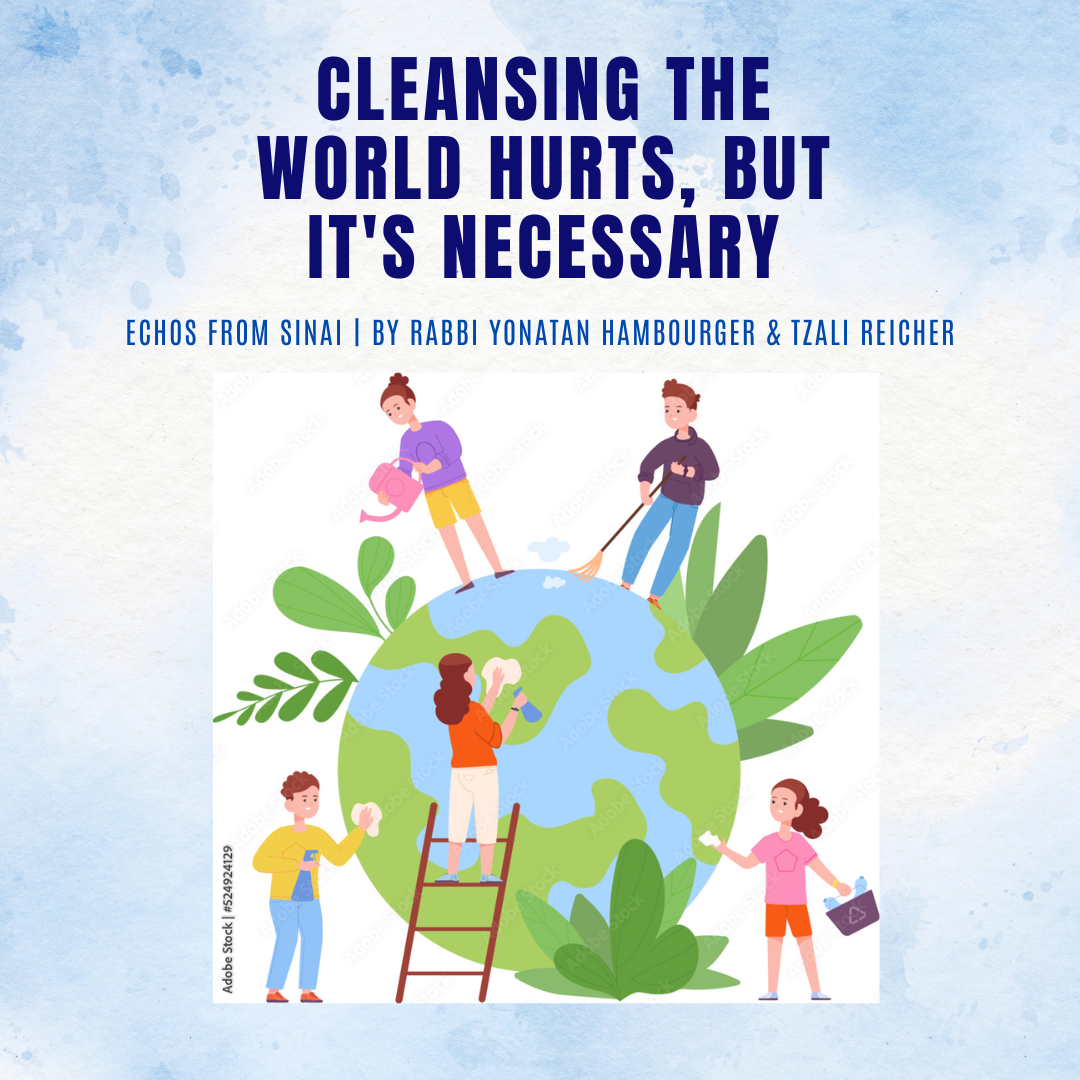
Cleansing the World Hurts, But It's Necessary
By Yonatan Hambourger and Tzali Reicher
It’s been a tumultuous year.
In just twelve months, the Middle East has been shaken to its core following Hamas’s brutal invasion, which resulted in the massacre and kidnapping of over 1,400 innocent people. After that horrific October day, when the world questioned how Israel could possibly recover, the nation has responded with remarkable resilience. United and determined despite immense pressure and calls from Hamas sympathizers to simply endure, Israel has eliminated thousands of terrorists in Gaza and Lebanon. At the same time, the leaders of these death cults have been taken out decisively. Iran, the root of much of the region’s turmoil, has lost its deniability and proxies, resembling a wounded serpent lashing out as it confronts Israel’s strength for the first time—potentially leading to the end of its toxic influence in the world.
Meanwhile, the Russia-Ukraine war drags on, while China escalates its preparations for a potential blockade of Taiwan. Domestically, an ailing economy and discontented public have forced the current U.S. president to withdraw from the presidential race, leaving the vice president to step into the fray just six weeks before the election, upending what appeared to be a straightforward race with a former president seeking a comeback.
Sometimes, it feels safer to stick with the status quo because it’s more comfortable. Yes, Israel was surrounded by enemies for years, enduring terror attacks and rockets, but as long as the violence was contained, it seemed manageable. Russia and China have always harbored expansionist ambitions, but as long as we didn’t confront them directly, their growing power felt less urgent. The ruling class knew the public was dissatisfied with their leadership but attempted to enforce the status quo until it became impossible to ignore.
In all these instances, the world moved along until outside influences forced action. But now, we have an opportunity to cleanse the world of these destructive elements and pave the way for a more prosperous and peaceful future.
With Iran and its weakened proxies pushing Israel’s hand, it’s crucial to allow Israel to continue its mission to dismantle the axis of evil threatening global stability and decisively curb Iran’s capacity to harm the world. The U.S. should facilitate negotiations between Ukraine and Russia to end the bloodshed and confront China about its true intentions, dispelling the illusion of peaceful competition. Domestically, the upcoming election allows the American people to choose their vision for the country and the world. We are living in a whirlwind, but as events unfold, we can recognize the potential for transformative, positive outcomes.
We see the need for a cleansing to upend a negative status quo in the Biblical story of Noah and the Ark, which is read in synagogues around the world this week. Just generations after Adam and Eve, the world had sunk into corruption and evil. There was no morality, no justice, and no one inclined to change the world for the better. G-d tried to lead the people toward making the right decisions that could have saved their world, but the hedonists of the day refused to change their ways.
G-d determined that the only way to heal the world was by thoroughly cleansing it of all evil with a massive flood, instructing Noah—literally the only righteous man of his day—to build an Ark to save what would be used to rebuild humanity. He gave the evildoers one hundred and twenty years of warnings and encouragement to repent before the punishment was meted out. Still, they wouldn’t relent, proving that drastic action was needed to redirect the world’s course.
And so, it came to be the flood came and healed the world. It was violent and traumatic, even for G-d, who vowed never to do such a thing again. But the crucial thing is that it worked.
Events of the past several years have been painful, difficult, and unsettling. But now we pray that it has served as a springboard for positive and lasting change—one that leads us toward a safer, more just world for all.
-
Yonatan Hambourger is a rabbi and writer serving spiritual seekers of all persuasions on behalf of Chabad of Rural Georgia. Tzali Reicher is a rabbi and writer serving communities throughout the regional South. You can reach them at y@tasteoftorah.org.
October 22, 2024
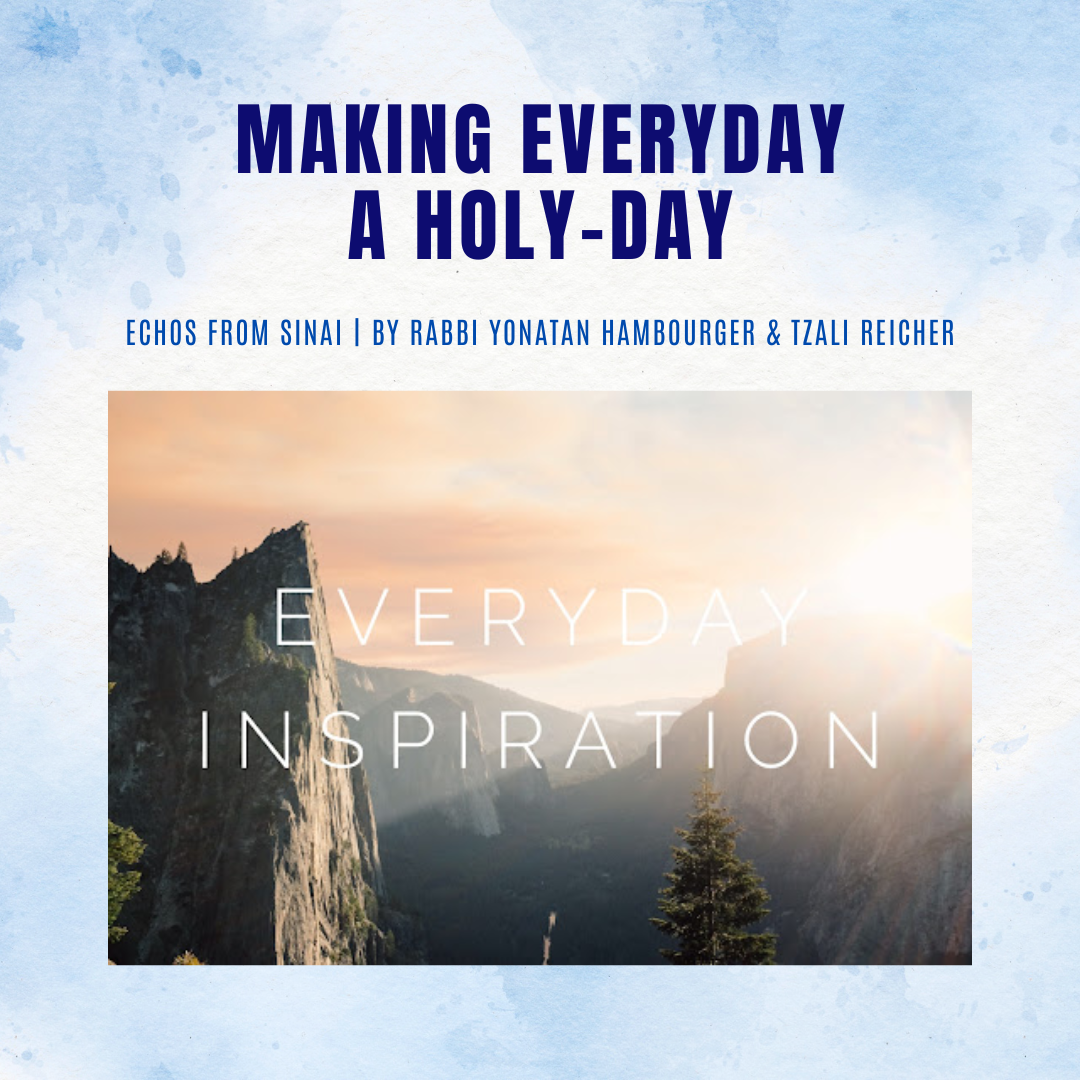
Making Everyday a Holy-day
By Yonatan Hambourger and Tzali Reicher
The Jewish month of Tishrei, which just concluded, is a whirlwind of spiritual and communal celebration. It begins with Rosh Hashanah, the Jewish New Year, marked by reflection and renewal. Then comes Yom Kippur, the Day of Atonement, when we seek forgiveness and strive for a fresh start. After these solemn days, comes Sukkot, a week-long festival of joy celebrated in makeshift huts called sukkahs, with eating, singing, and connecting with family and friends. Finally, the month culminates in the raucous celebration of Simchat Torah, where communities dance and rejoice in their relationship with the Torah.
For an entire month, the Jewish calendar is overflowing with spiritual and festive experiences. Each day has its own rituals, meals, and gatherings, enveloped in a constant atmosphere of meaning and inspiration. But then, suddenly, it all stops. The second month of the Jewish year, Cheshvan arrives—a month with no holidays at all. After the emotional highs of Tishrei, Cheshvan can feel like a sharp drop, a sudden plunge into a boring routine and ordinariness.
Why is there such a stark contrast? How does one navigate this abrupt shift from a festival-packed month to a stretch of mundane, uneventful days?
Rabbi Menachem M. Schneerson, of blessed memory, the most influential Jewish leader of modern history, would often quote the verse, “And Jacob went on his way” (Genesis 32:2), at the end of the holiday season. It’s a simple phrase, but it encapsulates the essence of Cheshvan. After a period of intense spiritual encounters and celebration, we, like Jacob, must return to our regular routines. The real question is: What do we take with us from these festive highs into the quiet valleys of everyday life?
Tishrei is a month filled with powerful experiences that elevate us. It’s easy to feel spiritually connected and motivated when surrounded by family, rituals, and a constant flow of celebrations. But Cheshvan is the opposite. It’s quiet and barren of festive obligations or special observances. It’s a month of “real life,” where we have to channel the spiritual energy, we experienced during Tishrei into the rhythm of ordinary days.
When the angels asked G-d to keep the Torah in the heavens instead of giving it to humanity, He responded that the Torah doesn’t belong in the heavens; it’s the property of every single one of us. We are meant to take the insights, resolutions, and inspiration we gained during the holidays and integrate them into our day-to-day lives. The challenge is to transform the extraordinary into fuel for the ordinary—to sustain the flame even when the environment doesn’t provide an immediate spark.
That’s why Cheshvan is crucial. If Tishrei represents the sprint, Cheshvan is the marathon. Tishrei gives us the initial burst of energy to start the year, but Cheshvan is when we need to run on our own steam. It’s when we take the values we just reaffirmed and weave them into the fabric of our everyday lives. It’s a reminder that real growth happens not during moments of grandeur, but in the quiet, steady grind of consistent effort.
This challenge isn’t unique to the Jewish calendar. It’s a universal truth: when inspiration is high, it’s easy to be the person we want to be. It’s easy to be generous, compassionate, and patient when everything is going well. But when we enter a “dry season,” when the excitement has faded and the environment feels dull and unremarkable, what happens then? How do we keep the flame alive when the external support is gone?
That’s where the quiet month of Cheshvan comes in. It forces us to take everything we experienced and turn it into fuel for the year ahead. It’s a time to show ourselves—and God—that we’ve truly internalized the lessons of Tishrei. The energy and joy of the festivals are meant to ripple through these quieter days, giving us strength and clarity even when life feels mundane.
Cheshvan is not a month of emptiness. It’s a month of opportunity. It’s a time to translate inspiration into action, to ensure that the joy and growth we experienced during Tishrei become the new foundation for the year ahead. The absence of holidays isn’t a void; it’s an invitation. Cheshvan asks us to make every mundane day into its own small celebration. To take the spirit of generosity, patience, and joy we felt during Tishrei, and weave them into our regular schedules.
As we move through this seemingly uneventful month, the challenge is to find holiness not in the peaks, but in the plateaus. To keep the spirit of Tishrei alive, even when the sukkah has been packed away and the holiday lights have gone out. Like Jacob, we must “go on our way,” carrying the light of the holidays into the darkness of the ordinary days, making every step a continuation of the spiritual journey we began. In doing so, we turn every moment—no matter how mundane—into an opportunity for continued personal and communal growth.
-
Yonatan Hambourger is a rabbi and writer serving spiritual seekers of all persuasions on behalf of Chabad of Rural Georgia. Tzali Reicher is a rabbi and writer serving communities throughout the regional South. You can reach them at y@tasteoftorah.org.
October 15, 2024

Sukkot is a Hug from Above
By Yonatan Hambourger and Tzali Reicher
What Christians call the Feast of the Booths, is known to Jews as the festival of Sukkot, which Jewish communities are now celebrating. It is part of the "Season of Joy," which calls upon us to embrace a unique spiritual energy—one that invites Jewish people to step out of their usual boundaries and enter a place where profound joy and faith intermingle.
For one week, they move their meals and daily living into an outdoor, fragile and temporary structure called the sukkah, leaving behind the solidity and permanence of their homes. For seven days, they eat, drink, study and socialize in this hut, under a roof made of branches through which one must be able to see the sky. Why? Because Sukkot is about plugging into a deeper truth that, if truly internalized, can transform how we see the world and ourselves.
The sukkah teaches that joy is not found in physical stability or material wealth. Instead, real joy comes from trust in the One above, who shelters us even when the structures of our life seem frail. Consider the ancient Israelites in the desert, wandering for 40 years without homes, without certainty. They had no visible means of support, yet they thrived for decades under the miraculous Clouds of Glory that surrounded them, a testament to divine protection that did not falter. Sukkahs today symbolize those clouds. When one sits inside, they’re meant to feel not only sheltered but embraced by the very same divine presence that guided their ancestors.
Sukkot teaches each of us to embrace simple faith. We step outside our homes, abandoning the comforts we are so accustomed to, and embrace a simpler existence stripped of the material things that define us for the other 52 weeks of the year. Despite the bare walls and minimal furnishings, there is a joy that fills the sukkah, a sense of satisfaction that defies logic. It’s a joy of realization, that we don’t need all that stuff to make us happy. It’s liberating to realize how little we truly need to feel content. The sukkah helps us refocus on what matters most—family, friends, faith. All those distractions we thought we couldn’t live without suddenly seem trivial.
When we look up through the roof of our sukkah and see the stars, we can feel small, exposed to the elements, and unsure of what the future holds. But as the sukkah envelops us, it reminds us that even in life’s uncertainty, there is security in our connection to something higher, a force that always provides and sustains His children.
And as we sit in the sukkah, we’re not alone. Sukkot comes with an age-old tradition of inviting spiritual guests and departed chassidic masters, known as the ushpizin, into our sukkah. Each night, we symbolically welcome one of seven exalted souls: Abraham, Isaac, Jacob, Joseph, Moses, Aaron, and David. These guests are our forefathers, who paved the way for us with acts of extraordinary faith and kindness. Their presence is not just ceremonial. It’s a reminder that we carry their legacy with us. When we invite them in, we’re connecting ourselves to the greatness we come from, drawing strength and inspiration from their lives. Sukkot becomes a time to reflect on the lineage of spiritual giants whose courage and devotion have shaped our people’s story.
Yet, despite the grandeur of these guests, the sukkah remains modest in height. A sukkah that is too tall, higher than about 30 feet, is disqualified because it becomes a structure of its own, detached from the earthiness and humility that define it. The message is clear: spiritual greatness is not achieved by elevating oneself above others but by staying grounded and humble. True strength comes from bending low to lift others up. The sukkah’s low walls call out, “Make space for others.” When we’re too full of ourselves, there’s no room left for the Divine.
This humility is exemplified in a simple image: a hug. Jewish law states that a sukkah must have at least two complete walls and a small, partial third wall—just enough to symbolize an arm’s embrace. The sages teach that this shape is reminiscent of a person wrapping their arms around another in a loving hug. Sukkot, therefore, is more than just a dwelling. It’s an embrace from above. The sukkah surrounds us, not with grandiosity or power, but with warmth and closeness. It’s God’s way of saying, “I am with you, no matter where you are or what you’ve been through.”
This embrace is unconditional. No matter how flawed we think we are or how distant we feel, Sukkot assures us that we are welcomed as we are. The sukkah doesn’t discriminate. It is open to anyone who seeks to step inside. Its message is one of acceptance and love. Step into the sukkah, and feel yourself enveloped in a divine hug that asks for nothing in return.
Sukkot is more than a ritual. It’s an experience meant to reset our priorities and remind us of the truth that, ultimately, our lives are but temporary dwellings. What remains eternal is the joy, faith, and connection we cultivate within our fragile walls. So, as we sit in our sukkahs this year, let us feel the joy that comes from letting go of our illusions of control, the liberation of needing less, and the comfort of knowing that no matter how stormy life becomes, we are forever sheltered by a love that transcends the physical. Sukkot invites us to leave behind the chaos and bask in the calm, where the walls may be flimsy, but the spirit is unshakeable.
-
Yonatan Hambourger is a rabbi and writer serving spiritual seekers of all persuasions on behalf of Chabad of Rural Georgia. Tzali Reicher is a rabbi and writer serving communities throughout the regional South. You can reach them at y@tasteoftorah.org.
October 10, 2024

Why Israel Must Crush Hezbollah
By Yonatan Hambourger
Contrary to what any pundits or politicians might tell you, Israel did not start this war with Hezbollah, the Iranian-funded terror proxy that controls Lebanon.
On October 8, 2023, while Israel was trying to count the dead, the kidnapped, and the brutalized, and was still battling the Hamas terrorists that invaded the country the day prior, Hezbollah opened a "second front" against Israel to help Hamas and hasn’t stopped firing rockets since. For 10 months, over 60,000 civilians have been forced to flee from their homes in the North and live in hotels in central Israel, displaced and unfortunate casualties, as Israel worked to crush Hamas in Gaza.
But in recent weeks, after months of enduring attacks that other countries would have responded to by invading their neighbors far earlier, Israel has conducted perhaps the most impressive military operation in modern history.
In the middle of a slow Tuesday, just weeks after Israel thwarted a massive and deadly rocket attack minutes before it was set to happen, thousands of beepers began blowing up throughout Lebanon. Incredibly, Israel appears to have learned of Hezbollah’s attempts to use low-tech forms of contact and entered the supply chain that the terror organization used to obtain its illicit communication devices. Then they waited for Hezbollah to distribute the pagers to the terrorists and incapacitated their ability to harm Israel. The next day, they repeated the operation, this time with walkie-talkies. And when the leadership of Hezbollah met days later to discuss their plans to invade Northern Israel, the IDF struck and eliminated essentially all of the terror organization's leaders, evil people who were responsible for the deaths of thousands, including hundreds of Americans. In the days since, Israel has struck thousands of military targets and dealt a significant blow to Hezbollah’s ability to terrorize the world.
But Israel wasn’t finished. On Friday, minutes after Israeli Prime Minister Benjamin Netanyahu finished addressing the United Nations General Assembly–to a hall voluntarily emptied of the world’s worst actors, who had wandered out of the room in a show of support for Hamas and Hezbollah–Israel destroyed the headquarters of Hezbollah, in Beirut. The operation successfully eliminated terror chief Hassan Nasrallah, the mastermind and architect of the murder of thousands of innocent Jews, Christians, and Muslims in countries around the world.
Yet despite Israel’s impressive military feats, the familiar calls for outrage and restraint from politicians and pundits were quick to pipe up. Those who for months cloaked their animosity toward the world’s only Jewish state under the guise of humanitarian calls for restraint and only the direct targeting of enemy combatants had to come up with a new smear. They accused Israel of terrorism, invading a sovereign nation, and ethnically cleansing Lebanon.
But this misguided analysis ignores the obvious facts and only impresses those who are already looking to slam Israel at any available opportunity.
This is not a war between Israel and the Lebanese people. Rather, it is a war between Israel and a heavily armed terrorist group that has hijacked Lebanon and is acting on orders from a different authority: the mullahs sitting pensively in Tehran.
In the pursuit of their master’s goals to destroy Israel and ultimately the United States, Hezbollah has provoked and attacked Israel for months, which stoically did not respond. Israel warned dozens of times for Hezbollah to stop and retreat to the Litani River in accordance with the United Nations resolution agreed to in 2006, which would allow the citizens of Northern Israel to return home.
Instead, Hezbollah decided to destroy Lebanon. They planted weaponry inside population centers, determined to exploit the Lebanese people as human shields, and escalated tensions into a full-blown war with Israel that the people of Lebanon overwhelmingly rejected. Their constant and deadly indiscriminate attacks have killed and injured dozens, most tragically seen by the massacre of 12 Druze children playing soccer in Majdal Shams in July.
Israel’s relative restraint in the face of Hezbollah’s ongoing aggression can largely be attributed to the miraculous protective capabilities of the Iron Dome. This advanced defense system, while reducing the immediate human toll of rocket attacks, has inadvertently created a perception internationally that Israel can absorb such violence indefinitely. The world, witnessing Israel’s ability to intercept most incoming threats, has grown accustomed to this scenario, often ignoring the deeper implications of allowing sustained aggression to persist unchallenged. This dynamic has led to a dangerous normalization of terrorism, where Israel is expected to continually endure hostilities without any response, which has only emboldened its many adversaries.
Prime Minister Benjamin Netanyahu and his government, much maligned on the international stage as dangerous extremists, have displayed a consistent and conciliatory tone in the face of Hezbollah's war of attrition. For a year now, they have repeatedly attempted to tone down the conflict, even as Hezbollah leadership promised to continue to escalate and broaden the conflict.
How long would the United States tolerate sustained and unceasing attacks from across the border in Mexico? How long would South Korea tolerate attacks from its North? There would be an all-out war within hours in those scenarios, yet Netanyahu and his government have demonstrated incredible restraint in the same situation and receive no credit for it. Even as this war began, the IDF has done its utmost to protect innocent Lebanese victims of Hezbollah, far more than any other army in Israel has ever done.
Hezbollah is a terrorist organization that is funded by America’s enemies and is responsible for the deaths of hundreds of Americans. They have destabilized the Middle East, and the world, for four decades. They have genocidal intentions and actively work to kill every last apostate in the world.
Hezbollah is the most sophisticated and deadly terrorist organization in the world and has committed the most deadly attacks against Americans, next to Al Qaeda. Every day that Israel battles and defeats Hezbollah on its own territory is another day that we don’t have to fight them on ours. Israel is doing the world a favor, even if the world is too shortsighted to see it. Those who have an issue with how Israel is conducting this war expose themselves as reflexive anti-Israel radicals whose opinions are to be seen through that lens. As Israel rids the world of people and organizations that have held the world hostage for far too long, the rest of the moral world will stand by our closest ally as they rid the world of a threat to us all to usher in a new dawn and chance for peace.
-
Yonatan Hambourger is a rabbi and writer serving spiritual seekers of all persuasions on behalf of Chabad of Rural Georgia. You can reach him at y@tasteoftorah.org.
October 3, 2024
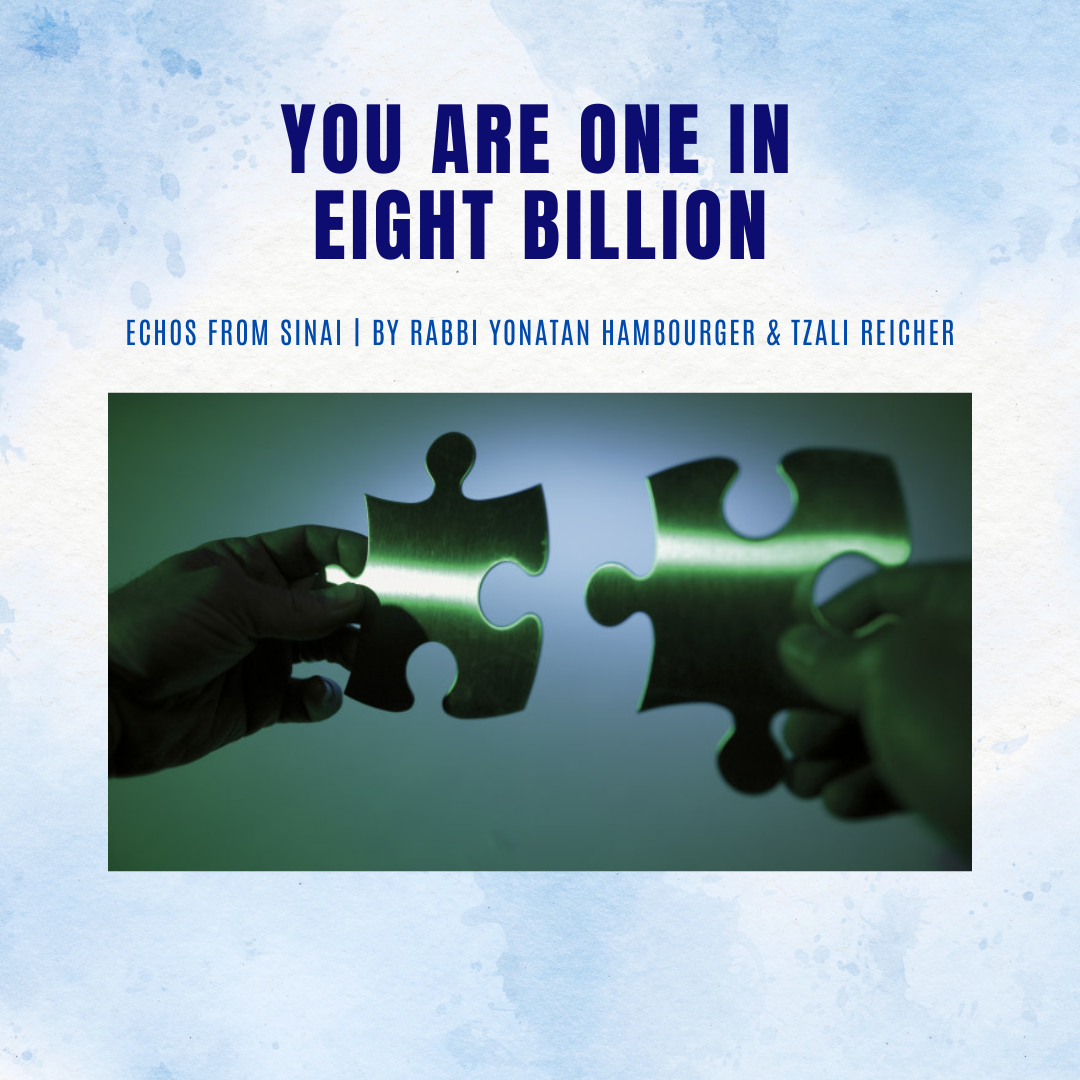
You Are One in Eight Billion
By Yonatan Hambourger and Tzali Reicher
From Wednesday evening until Friday night, Jewish people around the world will gather in synagogues and share festive holiday meals to celebrate the Jewish New Year: Rosh Hashanah.
Unlike New Year’s celebrations marked by wild parties and fireworks, Rosh Hashanah is a day of introspection and reflection. It is a two-day period when we are judged for our actions over the past year, and when God decides what the coming year will bring. It’s a time to reaffirm His kingship over us and pray that we are inscribed for a year filled with joy, sustenance, and happiness—not just for ourselves and our families, but for the entire world. It’s a solemn day, a day loaded with meaning.
As we spend hours in the synagogue, we note in the prayers that Rosh Hashanah is the day that commemorates the creation of the world. The traditional liturgy states, "Today the world was born." Yet, according to Jewish sages, the world was actually created six days earlier. That means Rosh Hashanah is actually the sixth day of creation—the day when humanity was brought into existence. This leads to an intriguing question: Why do we celebrate Rosh Hashanah as the day of humanity’s creation, rather than the creation of the world itself, which doesn’t have a celebration of its own?
On the surface, the day G-d actually created the universe is a much worthier day to celebrate! While humanity waited to be created, G-d was alone in his creation. Everything had been created, but it was still entirely connected to its Creator, without any sense of separation, and without us complicated humans to ruin the spiritual bliss that was.
So why, then, does Rosh Hashanah, which marks the sixth day, the creation of humanity, hold greater significance than the creation of the universe?
The reason lies in the special role of humanity. Unlike every other part of creation, which operates according to divine will without choice or awareness of the creations, humans have the unique ability to choose. We are given free will—the power to consciously recognize and accept God's presence or to reject it. This freedom to choose brings a new dynamic into the world: the possibility of willingly embracing a higher power. Jewish thought often compares this to the difference between tyranny and sovereignty—a tyrant rules by force, while a sovereign's authority is accepted by those who are governed.
This capacity for choice makes humanity's creation a pivotal moment. It marks the beginning of a conscious relationship between the world and its Creator, where humans have the power to either acknowledge or deny the divine. Our ability to think, reflect, and choose to align with a higher purpose is what makes Rosh Hashanah, the day humanity was created, a true beginning. It’s not just about the physical existence of the world but the start of an active, conscious partnership with the divine.
Jewish tradition teaches that God created the world to be a "dwelling place in the lower worlds," a place where even the most ordinary aspects of life could be filled with divine purpose. For this to happen, it’s essential that humans recognize and actively participate in fulfilling this purpose. Before humans existed, the world seemed separate from the divine, but with the creation of humanity, a bridge was formed between the physical and the spiritual. Humanity was not only created to foster a personal connection with the divine but also to help the entire world become aware of this connection. This is why Rosh Hashanah is seen as the birthday of the world—it marks the day when the world began to realize its ultimate purpose.
But this grand vision only comes to life when every one of us plays our part. It’s easy to feel small in a world of eight billion people, to think that our actions are insignificant in the grand scheme of things. Yet, Jewish tradition teaches us that each person is a vital part of this creation. G-d needs every single one of us to help make the world a better place. Each of our choices—no matter how small—has the power to ripple outward, touching lives, inspiring others, and ultimately transforming the world. So, even when we feel like a tiny drop in the ocean, we must remember that we are each uniquely needed, each an irreplaceable partner in the unfolding story of creation. When we all contribute our light, together we can bring about a world that is truly filled with goodness, peace, and purpose.
So, as we celebrate Rosh Hashanah, we are reminded not only of the beginning of the world but of our special role as partners in creation. It’s a call for each of us to bring light and meaning into our lives, to use our unique ability to make the world a better place, and to hope for a future filled with understanding, unity, and peace.
May we all be inscribed for a good and sweet year, for us and all humanity!
Yonatan Hambourger is a rabbi and writer serving spiritual seekers of all persuasions on behalf of Chabad of Rural Georgia. Tzali Reicher is a rabbi and writer serving communities throughout the regional South. You can reach them at y@tasteoftorah.org.
September 26, 2024
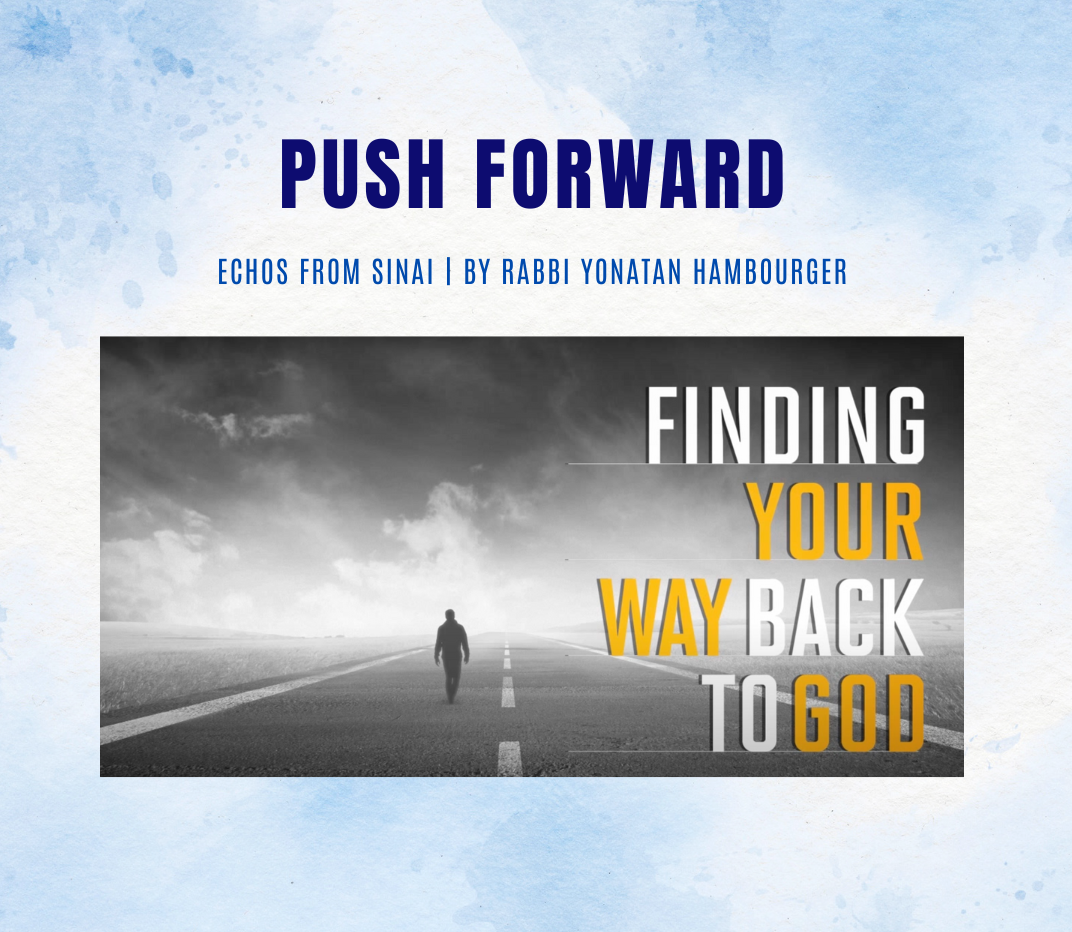
Push Forward
The Jewish New Year (Rosh Hashanah) begins next Wednesday evening, October 2nd. While it is a Jewish holiday, it commemorates the anniversary of the creation of the first man and woman, Adam, and Eve. So, this is a good time to examine one’s thoughts, speech, and actions over the past year to see if any of them fall short of one’s best self, and then to resolve to do better in the coming year. It’s hard to imagine anyone who wouldn’t benefit from such an exercise.
The process of self-examination and the commitment to do better is known in Hebrew as “Teshuvah,” a concept similar to “Repentance”. The word actually means “return,” as in returning to the right path. The prototype for repentance occurs in the aftermath of Cain’s brutal slaying of his brother Abel and can be found in the Book of Genesis (4:3-17).
While not a hero by any stretch of the imagination, Cain did ultimately acknowledge to G-d, “My sin is too great to bear”. Second, Cain was sent by G-d to “dwell in the land of the wanderers”. The sages of the Torah teach that solitude generates a spirit of humility within a person, aiding him in his soul-searching. Third, Cain understood he could never undo his mistake and could not bring his brother back to life, but that didn’t deter him. Rather, he used his sin as an impetus to build an entire city, rather than wallow in depression. He knew he would have to actively repent for the rest of his life, but at least he could repair in some measure the world that he damaged.
Sin breeds depression, and depression breeds sin. Nobody is exempt from this cycle. The question is what to do after the sin.
Initially, Cain played dumb with G-d by asking the infamous question, “Am I my brother’s keeper”? But once he admitted his guilt and set out to repent, he was able to successfully dedicate his life to something greater than himself. So even if one is responsible for terrible mistakes and disastrous consequences, one must strive to make a positive difference in the world. The lesson from Cain is that no matter what happened, or because of what happened, one must push forward.
Repentance in Judaism is focused on restoring one’s connection and relationship with the Almighty. It is not based on the mere desire for self-improvement, but on finding the best way to serve the Creator. Committing oneself to a relationship with G-d will ensure that the resolution to be a servant of G-d will endure.
I would love to hear your thoughts. Please email me at y@tasteoftorah.org.
Wishing you G-d’s abundant blessings,
Rabbi Yonatan Hambourger
September 19, 2024
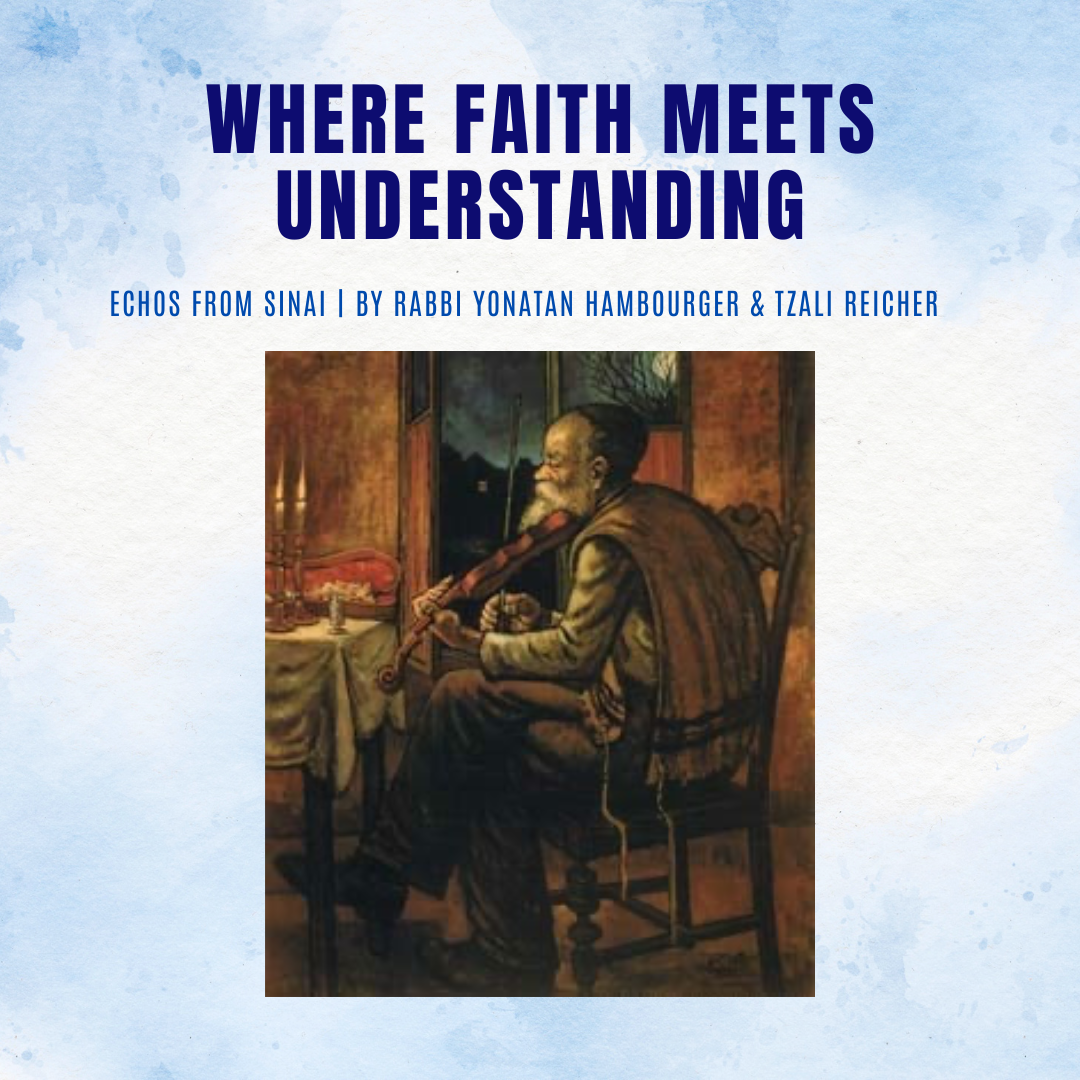
Where Faith Meets Understanding
By Yonatan Hambourger and Tzali Reicher
This coming Saturday night marks a special day of celebration in Jewish communities around the world.
It is the 18th day of the month of Elul on the Hebrew calendar, known as "Chai Elul", a day that commemorates the birthdays of two influential figures in Jewish history: the Baal Shem Tov (Rabbi Yisrael ben Eliezer), the founder of the Chassidic movement, and the Alter Rebbe (Rabbi Shneur Zalman of Liadi), who established the Chabad branch of Chassidism. Often referred to as the “birthday of the two great luminaries” in acknowledgment of their lasting impact, Chai Elul holds deep spiritual significance and brings a unique energy to the month of Elul, which leads up to the Jewish New Year that will begin next Wednesday evening.
The number 18, when spelled in the original Hebrew, can be rearranged to spell the word "Chai," meaning "alive." Chai Elul is seen as a day that breathes life and vitality into the spiritual preparations of Elul, a month dedicated to reflection, self-improvement, and reconnecting with one's inner purpose ahead of the New Year, where we reaffirm our relationship and connection to G-d.
Chai Elul symbolizes two essential aspects of spiritual practice: faith and understanding.
The teachings of the Baal Shem Tov, who lived in the 18th century, brought new vitality to Jewish life by emphasizing a deeper, more personal connection with the divine. In a world where scholarship and hierarchy often determined one's spiritual worth, the Baal Shem Tov flipped the script. He taught that one doesn't need to be a scholar or a religious elite to have a meaningful connection with God; everyone can cultivate a joyful, personal relationship with the divine. For the Baal Shem Tov, faith was not just a belief but a living force that transcends the limits of logic and reason, infusing everyday life with purpose and meaning.
The concept of faith goes beyond mere belief. It involves cultivating an active and engaged relationship with the divine, much like developing a skill through practice. The Baal Shem Tov encouraged people to see faith as a pathway to accessing their inner spiritual potential and seeing G-dliness in every aspect of their lives. In his view, a life guided by faith allows one to tap into a source of endless energy and inspiration, regardless of circumstances.
However, the journey of faith is not without its challenges. While faith connects us to something greater than ourselves, it can sometimes feel distant or abstract, creating a depressing gap between the infinite potential of the soul and our everyday awareness. The Alter Rebbe, another pivotal figure in Jewish thought, addressed this by integrating faith with understanding. His approach, known as Chabad Chassidism, encourages bringing spiritual insights into the intellectual faculties of the mind—wisdom, understanding, and knowledge.
The Alter Rebbe's teachings offer a way to internalize faith, turning it into a conscious, deliberate practice. Instead of relying solely on moments of spiritual inspiration, Chabad philosophy empowers individuals to develop a consistent and thoughtful approach to their spiritual growth. By engaging the intellect, one can transform faith from an abstract concept into a lived reality, creating a more sustained and meaningful connection with the divine.
This approach highlights the unique contributions of both the Baal Shem Tov and the Alter Rebbe: while the Baal Shem Tov taught the importance of serving a higher purpose and truly living with G-d, the Alter Rebbe provided a framework for how to do so. Together, they created a roadmap for personal growth that combines the heart and the mind, emotion and reason.
Chai Elul serves as a reminder of these teachings and the renewed spiritual energy they bring to this time of year. Jewish tradition teaches that a soul's source radiates more intensely on its birthday, amplifying the impact of the Baal Shem Tov and the Alter Rebbe's contributions during this period. As the New Year approaches, this is a time for reflection and preparation for people of all faiths, an opportunity to deepen one's relationship with the divine and take proactive steps toward personal and spiritual growth.
Ultimately, Chai Elul calls for action. It encourages each of us, regardless of our background or beliefs, to find ways to bring light and goodness into the world. As we prepare for the new year, we are reminded that even small acts of kindness, understanding, and compassion can have a profound impact on our lives and the lives of those around us. This day inspires us to renew our efforts, focus on what truly matters, and embrace the opportunities that lie ahead, with the hope for a year filled with peace, health, and happiness for all.
-
Yonatan Hambourger is a rabbi and writer serving spiritual seekers of all persuasions on behalf of Chabad of Rural Georgia. Tzali Reicher is a rabbi and writer serving communities throughout the regional South. You can reach them at y@tasteoftorah.org.
September 12, 2024
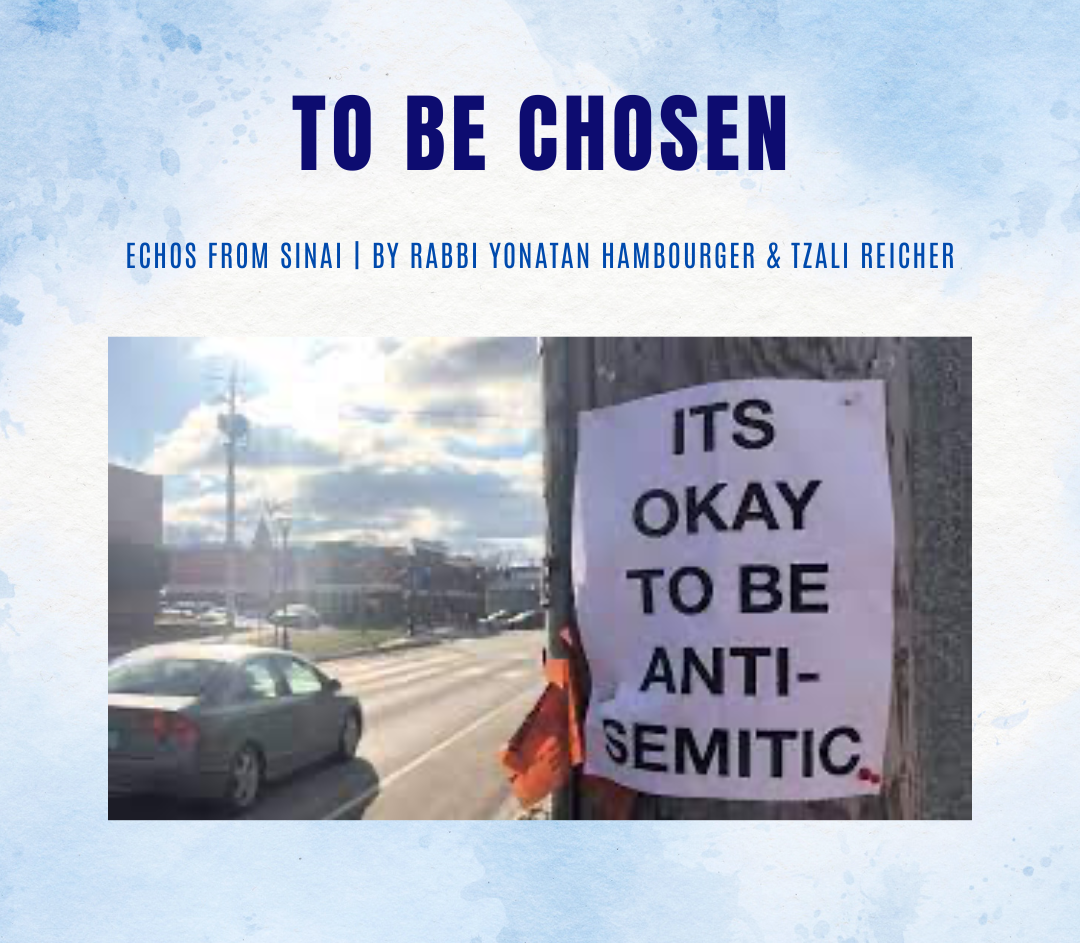
To Be Chosen
By Yonatan Hambourger and Tzali Reicher
Witnessing the resurgence of blatant antisemitism evokes a sense of disillusionment among Jews and compassionate individuals from all backgrounds, highlighting that humanity's oldest form of hatred remains as evident as it has ever been. This resurgence confirms that while the reasons and excuses for antisemitism may change, the fact remains that many would like to be rid of the Jews.
Recently, age-old antisemitic tropes meant to distort the truth and fuel division are making a resurgence. Jews are being accused of “Jewish supremacy” and hatred towards non-Jews. These claims, however, are more than just incorrect; they are a gross misrepresentation of the core values of Judaism. Our purpose in this discussion is to explore what Judaism really has to say about the relationship between Jewish people and the people around them:
To understand the truth, let’s begin with the book of Genesis (1:26) wherein G-d states, “Let us make man in our image, in our likeness.” In the words of Rabbi Menachem Mendel Schneerson, of righteous memory (1902-94), the most influential rabbi in modern history, “The reason G-d created man from a single being is so that all people will know that they descended from the one and same single progenitor, a fully developed human being created in the image of G-d, so that no human being could claim superior ancestral origin. Thus, we can cultivate a real feeling of kinship in all interhuman relationships.”
So how does that square with the idea that G-d refers to Israel as “His people” (Deuteronomy 7:6); His “treasured possession” (Psalm 135:4), and even the “apple of His eye” (Zechariah 2:8)? The Torah tells us that G-d tasked the Jewish people with building a particular type of society with its unique heritage, beliefs, and behaviors. But this is not a contradiction to the concept that all humans are created in the divine image, for every individual and every nation and religion has its divine tasks.
This idea is often misunderstood, and used by detractors of Jewish people to create a false idea that Jewish people believe they are superior to the rest of the world. It doesn’t mean that Jews are inherently superior to others. Rather, it means they were chosen by Gd to fulfill a unique mission — that “Nations shall walk by Israel’s light and kings by the glow of Israel’s radiance" as stated by the Prophet Isaiah (60:3). This mission comes with a high level of responsibility, not privilege. Jews are required to follow 613 commandments (mitzvot) and to hold themselves to a rigorous ethical standard. Being “chosen” is about what Jews are obligated to do, not about claiming superiority over others.
G-d deemed that it was not enough for the Jewish people to observe the unique commandments given to them by G-d. He also instructed them to cultivate the moral standards of their neighbors and fellow citizens. In fact, G-d laid out laws for all of humanity, not just the Jewish people. These laws are known as the Noahide Laws because they are universal laws to be followed by all of Noah’s descendants and by extension, all of humanity. They offer a comprehensive framework for leading a moral and virtuous life. Adhering to these laws significantly enhances the quality of life in our world, making it a more joyful, peaceful, and moral place to live. It is worthwhile to note that these laws are compatible with Christianity and Islam.
These universal Laws encompass essential principles that offer profound wisdom and practical guidance for life. In their simplest form, these laws include (1) reliance on the singular source of life, your loving and attentive Creator; (2) expressing gratitude to the Divine through thought, speech, and prayer; (3) striving to improve the lives of others, recognizing that saving one life equates to saving the entire world; (4) respecting the sanctity of human relationships and cultivating a culture of love and dignity, particularly within family life; (5) embracing a life of generosity and contentment; (6) being accountable for the welfare of all of creation, including animals and the planet; and (7) promoting a system of genuine justice and charity, encouraging others to act with fairness and generosity.
Judaism does not preach that Jews are superior to non-Jews. It teaches that Jews have a special covenant with Gd that brings with it a unique set of responsibilities. Importantly, Judaism has never sought to impose its beliefs on others. Unlike many other religions that have conducted crusades, inquisitions, holy wars, or terror attacks to spread and impose their faith, Judaism respects the paths of others and has never encouraged conversion or forced adherence.
All religions, by their nature, believe their path to be true; otherwise, people wouldn’t choose to follow them. Judaism is no different — Jews believe in their path, just as others believe in theirs. But the reality is that Jewish people have always coexisted peacefully with others, advocating for justice, fairness, and righteousness in all interactions.
The Jewish legacy is one of love, unity, and a relentless pursuit of justice for all. We should be coming together to uphold these values, not allowing falsehoods to tear us apart. In the Jewish worldview, everyone has a place, everyone has value, and everyone is part of a greater plan for peace and goodness. We are each G-d’s children, and we each have an essential role to play in improving the world.
-
Yonatan Hambourger is a rabbi and writer serving spiritual seekers of all persuasions on behalf of Chabad of Rural Georgia. Tzali Reicher is a rabbi and writer serving communities throughout the regional South. You can reach them at y@tasteoftorah.org.
September 5, 2024

The Obstacle to Mideast Peace is Delegitimization
By Yonatan Hambourger and Tzali Reicher
Throughout the West Bank — known in the Bible as Judea and Samaria — one can literally touch Jewish and Christian history, and by extension the entirety of Western civilization.
This is the land where Abraham, Isaac, and Jacob walked and where famous Biblical scenes unfolded, remaining standing to this very day. In Hebron, the patriarchs and matriarchs rest. In Shiloh, the remains of the Tabernacle that preceded the Temples in Jerusalem stood for almost 400 years. Ancient synagogues still exist in Jericho and as-Samu, while the remains of Roman roads can still be walked in Jerusalem, close to the ancient City of David. The Western Wall has endured for millennia as the only remnant of the glorious Temples, while the Temple Mount itself — the holiest site in the Jewish faith — is barren of its Jewish roots. Dotting the landscape of the West Bank are countless pieces of evidence of the Jewish people’s intrinsic connection to the area, with Jewish ritual baths and sites still intact for all to explore.
The Jewish history of the region and its relationship to the rest of civilization can also be seen in the birth of Jesus in Bethlehem and his upbringing in Nazareth. These are stories well-known to the Christian world, proving that the Jewish historical and spiritual connection to this land is deep and indisputable.
As tensions escalate once again on the West Bank, Palestinian leaders frequently justify terror attacks and uprisings by claiming they oppose Israeli efforts to “Judaize” Jerusalem and ancient holy sites. This argument is not just about land; it is an attempt to strip not just the West Bank of its history, but the rest of Israel, too. The West Bank is just the first stop.
In their efforts to rewrite history and overthrow the Jewish claim to the land, Palestinian leaders have also targeted historical and archaeological sites that clearly demonstrate the Jewish connection to this land. The destruction and desecration of sites such as Joseph's Tomb and the ongoing denials of Jewish ties to the Temple Mount are just two examples of how the Palestinian Authority has attempted to erase Jewish history from the region. These efforts are part of a broader narrative that aims to delegitimize the Jewish state by denying its ancient roots and undermining its historic right to exist.
This is not new. Palestinian leadership has long rejected peace proposals that would recognize the Jewish state. One of the most notable examples is Yasser Arafat’s refusal to accept a generous offer at the Camp David Summit. Despite being offered nearly all of the West Bank, Gaza, and much of Jerusalem, Arafat rejected the proposal and instead chose a path of violence, igniting the Second Intifada. This refusal to recognize a Jewish state, even within the borders of the 1967 Green Line, has remained a consistent stance for Palestinian leaders, to this very day.
Until today, the Palestinian leadership has consistently continued this policy of rejection. The Palestinian Authority has maintained the “pay-to-slay” policy, which rewards terrorists and their families for murdering Israelis, a practice that incentivizes violence and hatred rather than coexistence. Meanwhile, the Palestinian Authority has not held an election in 18 years, perpetuating an autocratic rule that mirrors Hamas. The Palestinian Authority's Charter still mirrors much of Hamas's charter, both of which call for the elimination of Israel and reject any Jewish sovereignty in the region. This brings us to the so-called "Green Line" — a boundary line that, as Israeli diplomat Abba Eban once famously described, constitutes “Auschwitz borders.” These borders, drawn after the 1949 armistice agreements, leave Israel in a precarious and indefensible position, vulnerable to attack from all sides. Any proposal to return to these borders ignores the security needs of a tiny Jewish state surrounded by 22 Arab countries, the majority of which are hostile toward Israel. Israel’s population of 8.5 million people is situated on 8,300 square miles, compared to the Arab League with a population of 40 million people occupying over 5 million square miles.
The underlying truth is stark: no political entity charged with leading and negotiating for the Palestinian people has been willing to fully accept the presence of a non-Muslim, Jewish state. From the 1948 invasion by five Arab armies to today's continuous hostility, there has been a persistent refusal to acknowledge Jewish sovereignty. This reality persists despite numerous opportunities for peace and coexistence, from the Oslo Accords to the Abraham Accords, where several Arab nations normalized relations with Israel, yet the Palestinian leadership remained entrenched in its rejectionist stance.
This is not a conflict over land or settlements; it is a conflict over the existence of a Jewish state in a predominantly Muslim region, despite their historical right to be there. Until there is a fundamental shift in this perception, peace will remain elusive. The international community must recognize that the Jewish connection to the land is not a modern invention but a historical and spiritual reality that cannot be denied or erased.
The path to peace lies not in appeasement or in pretending that this deep-rooted conflict can be resolved through superficial concessions. It lies in acknowledging the historical truths, recognizing Israel’s right to exist, and fostering a culture of genuine coexistence that respects the narratives and rights of all people in the region. Only then can we hope to transform the dreams of peace into reality for all who call this ancient and contested land their home.
-
Yonatan Hambourger is a Rabbi and writer serving spiritual seekers of all persuasions on behalf of Chabad of Rural Georgia. Tzali Reicher is a Rabbi and writer serving communities throughout the regional South. You can reach them at y@tasteoftorah.org.
August 29, 2024

How Christians Fare Under Muslim Sovereignty
By Yonatan Hambourger and Tzali Reicher
Over the past 10 months, there have been many victims of the war Hamas launched on Israel on October 7, 2023.
First and foremost are the 1,200 people who were brutally murdered and the over 200 who were taken hostage during Hamas’s invasion and the mass atrocities they committed. The innocent people of Gaza have also suffered immensely, living under the oppressive rule of the terror organization they voted into power nearly 20 years ago. These civilians are now forced to endure the consequences of the decisions made by their leaders residing in Qatar and Iran, whose actions have led to continued bloodshed and suffering. The displaced communities of Israel’s North, forced to flee their homes for almost a full year due to Hezbollah’s provocations and non-stop rocket attacks, and the ravaged communities of the South are also still suffering.
But another group of overlooked victims in his ongoing conflict are the Christian communities in the Palestinian territories and, more broadly, throughout the Middle East. The plight of Christians in these regions is often overshadowed by the broader narrative of the conflict, yet it is a story that needs to be told.
Bethlehem, the birthplace of Christianity and once a city with a strong Christian presence for almost two millennia, has seen its Christian population dwindle significantly since the Palestinian Authority took control in 1995 following the Oslo Accords. Christians, who once formed the majority in Bethlehem, are now a small and shrinking minority. Economic hardship, political instability, and rising antagonism have driven many Christians to leave, seeking safety and stability elsewhere, especially in Israel.
This is not an isolated case but part of a broader pattern across the Middle East and other Muslim-majority areas, where Christian communities have faced relentless persecution and displacement. Lebanon, once a beacon of liberalism with a majority Christian population, has seen its Christian communities decimated by civil war and sectarian violence, forcing many to flee the country. According to C.U.F.I., “Christians living in Lebanon consider themselves second-class citizens and live in fear of persecution.” Iraq’s ancient Christian population, targeted by ISIS in the 2010s, has been nearly wiped out, with towns like Qaraqosh and Bartella emptied of their inhabitants. Syria’s civil war has devastated cities like Aleppo, where Christians have been caught in the deadly crossfire. Afghanistan’s few remaining Christians are forced to practice their faith in secret under the oppressive rule of the Taliban, while in Somalia, Al-Shabaab’s terror campaign has made the country one of the most dangerous places for Christians, where even the suspicion of apostasy can lead to death.
The situation for Christians in Gaza and the West Bank is particularly dire. In Gaza, Christians are brutally repressed, living under the thumb of Hamas, which imposes strict Islamic rule and leaves no room for religious minorities. In the West Bank, Christians are treated as second-class citizens under the Palestinian Authority, facing discrimination and marginalization in a society where their rights are mostly ignored.
In stark contrast to these harsh realities, “Israel is the safest place for Christians in the Middle East…the only state in the Middle East where Christians and their holy sites are protected. Since the Arab Spring, there has overall been an exodus of Christians from the Middle East due to violence, oppression, and threats of extermination…However, the number of Christians in Israel has grown over the past few decades. Israel continues to be a safe haven for minorities in the Middle East that wish to live their lives without oppression,” states C.U.F.I.
This stark contrast between Israel and its neighbors highlights the broader principle that when minorities are treated with dignity and respect, societies can thrive. Israel’s treatment of its Arab citizens, including Christians, stands in sharp contrast to the repression and violence faced by Christians in many parts of the Middle East.
Why is Israel so hospitable to all people, regardless of their race or religion?
It’s because the Torah’s teachings on kindness and justice are simple and clear and provide a powerful moral framework that contrasts sharply with the persecution faced by Christians in many Muslim-majority countries. The Torah commands Jews to care for the stranger and the vulnerable, a principle that has guided Jewish law and tradition for millennia. Leviticus 19:34 instructs, “The stranger who resides with you shall be to you as one of your citizens; you shall love him as yourself, for you were strangers in the land of Egypt.” This message of empathy and justice is a central theme in Jewish thought and provides a moral guide for how we should treat others.
Working to ease the plight of Christians in Muslim-majority countries is not just about recording their mistreatments; it is a moral responsibility for us to acknowledge and fix. We must advocate for the protection of these vulnerable communities and demand that the international community holds accountable those responsible for their suffering, instead of building imaginary oppressors and false divides. As we witness these injustices, we must remember that compassion and justice are not just ideals to strive for but commands that must be followed. In the face of persecution, let us commit to these timeless principles, ensuring that every human being, regardless of their faith, is treated with the dignity and respect they deserve.
-
Yonatan Hambourger is a Rabbi and writer serving spiritual seekers of all persuasions on behalf of Chabad of Rural Georgia. Tzali Reicher is a Rabbi and writer serving communities throughout the regional South. You can reach them at y@tasteoftorah.org.
August 22, 2024

From the Shores of Tripoli to Gaza
By Yonatan Hambourger and Tzali Reicher
The contemptible practice of holding innocent people captive is nothing new. We see an ancient example in the book of Genesis where a group of neighboring kings take Abraham’s nephew named Lot, hostage. Rather than negotiate, Abraham defeated the captors in short order, and rescued his nephew.
More recently, in 1803, Pirates along the Barbary Coast imprisoned the crew members of the USS Philadelphia. These pirates based in the city of Tripoli in Libya, didn’t negotiate in good faith, causing the U.S. to attack and free its citizens. To this day, the U.S. Marine Corp Hymn includes the words, “from the halls of Montezuma to the shores of Tripoli.”
While not a new tactic, Islamic terrorists, and their sponsors, have turned the practice into a despicable “art form.” They have managed to secure enormous benefits from Israel through hostage-taking, including the release of thousands of terrorist murderers serving life-sentences in exchange for body-parts of dead Jews because they know that the Jewish people put great value even on their people’s corpses. Not to be outdone, the Islamic State of Iran recently negotiated a Six Billion Dollar payout by the Biden administration for the release of five Americans imprisoned in Iran.
In Jewish law, the commandment of pidyon shvuyim—the redemption of unjustly held captives—holds a position of utmost importance, often taking precedence over other commandments. Jewish communities are required to free those who have been kidnapped or wrongfully imprisoned, whether through raising funds for their release or negotiating prisoner swaps. This commandment is held in such high esteem because Judaism places the sanctity and holiness of life above all other considerations.
This subject has taken on even greater significance in the past 10 months, following the horrific events of October 7, 2023. On that tragic day, Hamas unleashed a brutal assault on Israel, and saw bands of terrorists, rape, and massacre, over 1,200 people, and then take over 200 innocent civilians captive, including Americans, 120 of whom are still being held hostage in Gaza, both dead and alive.
Hamas’s actions were driven by the calculation that Israel would agree to a cease-fire and be compelled to empty its prisons of convicted Palestinian terrorists in exchange for the lives of its citizens. This strategy echoed the 2011 exchange between Israel and Hamas, where over 1,000 Palestinian prisoners—many convicted of serious and violent crimes—were released in return for one 19-year-old Israeli conscript named Gilad Shalit, kidnapped, and held hostage in Gaza for five years.
One of the most notorious prisoners released in that exchange was Hamas’ leader Yahya Sinwar, who orchestrated the October 7 massacre. While he was in Israeli custody, Sinwar received a heart transplant and a full set of dental implants, compliments of the State of Israel. Sinwar estimated that by raising the stakes—this time with over 200 hostages—he could pressure the Israeli government, through the emotional appeals of the victims' families, to yield to Hamas’s demands once again. He aimed to secure the release of more terrorists, thereby enabling Hamas to continue its violent campaign against Israel and pursue its goal of the nation's destruction.
However, other principles in Judaism must also be considered, most notably pikuach nefesh—the imperative to preserve life. Pikuach nefesh refers to taking proactive measures to protect life when danger is imminent. While Jewish Law prioritizes the preservation of life, it also demands that actions taken in the name of protecting life do not result in greater harm in the future.
The Jewish book of Talmud discusses the concept of not paying excessive ransom for captives, to avoid encouraging future kidnappings and partly to protect the broader community from increased danger. This principle is directly relevant to the Sinwar deal of 2011, where the disproportionate exchange encouraged more hostage-taking, as terrorist organizations saw that such tactics could yield significant concessions. Many of those freed in 2011 returned to terrorism, including Sinwar himself.
Another critical aspect of the present ceasefire negotiation is the strategic importance of the Philadelphi Corridor, a narrow strip of land along the Egypt-Gaza border. It serves as a conduit for weapons smuggling into Gaza, fueling the ongoing conflict with Hamas. Retaining control of this corridor is essential not just for Israel’s security but also for the broader goal of preventing violence and preserving life in the region. In this context, the failure to maintain control of the Philadelphi Corridor can be seen as a violation of the principle of pikuach nefesh (preserving life), as it directly endangers lives by enabling the flow of weapons to terrorist groups.
While the desire to save lives is noble and essential, it must be tempered by a realistic assessment of the potential for future harm. Only by adhering to the full scope of pikuach nefesh, (taking proactive measures to protect life when danger is imminent)—both in its imperative to save life and its caution against causing future harm—can the U.S. and Israel hope to navigate the difficult moral landscape of international diplomacy in a way that truly honors the sanctity of life and realizes the hope for a safe and secure peaceful future for us all.
-
Yonatan Hambourger is a Rabbi and writer serving spiritual seekers of all persuasions on behalf of Chabad of Rural Georgia. Tzali Reicher is a Rabbi and writer serving communities throughout the regional South. You can reach them at y@tasteoftorah.org.
August 15, 2024
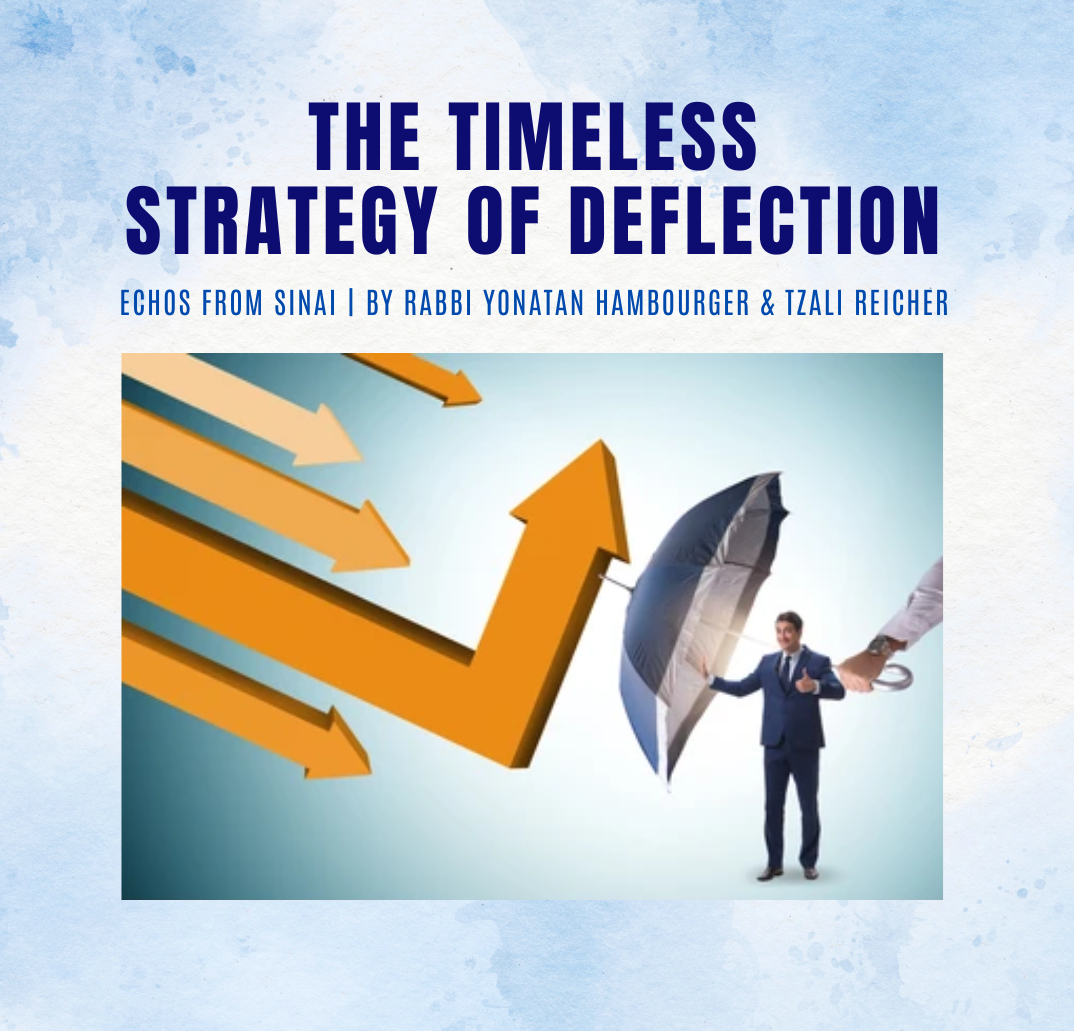
The Timeless Strategy of Deflection
By Yonatan Hambourger and Tzali Reicher
In today’s political climate, we’ve become used to seeing public figures dodging difficult questions or shifting their positions on key issues. It’s something that some politicians looking to be placed in leadership positions do to navigate complex situations without committing to a definitive stance, trying to be all things to all people. This tactic is especially used when positions on record won’t play well for the voting demographic being solicited.
Interestingly, this tactic isn’t new and can be understood through various examples in the Torah, where leaders and individuals also failed the challenge of responding to difficult questions and situations.
One of the earliest instances in the Torah where someone avoids a direct answer occurs in the story of Cain and Abel. After Cain kills his brother Abel, G-d asks him, “Where is Abel your brother?” (Genesis 4:9). Instead of answering directly, Cain replies, “I do not know; am I my brother’s keeper?” Cain’s response is a classic example of deflection. Rather than admitting his wrongdoing or confronting the reality and gravity of the situation, Cain attempts to evade responsibility by questioning the premise of the question itself. This subtle shift of focus allows Cain to avoid direct accountability, even though G-d immediately calls him out.
This kind of deflection can be seen in modern politics as well. For instance, when politicians are confronted with uncomfortable questions about their past actions or statements, they often attempt to deflect by questioning the relevance of the question, by redirecting the conversation to a different topic, or by avoiding the questioners entirely. This strategy allows them to avoid directly addressing the issue at hand, much like how Cain attempted to avoid answering G-d’s question.
Another example from the Torah is found in the story of the Golden Calf (Exodus 32). When Moses descends from Mount Sinai and sees the Israelites worshiping the Golden Calf, he confronts Aaron, demanding an explanation. Aaron’s response is less than straightforward. He tells Moses, “You know the people, that they are set on evil… I threw it [gold] into the fire, and out came this calf” (Exodus 32:22-24). Aaron’s explanation is an attempt to distance himself from responsibility by attributing the creation of the calf to the people and to the fire, as if the idol simply emerged on its own. Aaron avoids directly addressing his role in the situation, instead choosing to shift the blame and downplay his involvement.
This story reflects a common tactic in politics, where leaders may distance themselves from controversial decisions or actions by attributing them to other members of their team, or to external forces, rather than taking full responsibility. By doing so, they seek to preserve their credibility while avoiding the potential fallout from admitting fault or making a firm commitment.
And finally, in the story of King Saul, we find another example of a leader avoiding direct confrontation with a difficult situation. When the prophet Samuel confronts Saul after the battle with the Amalekites, Saul initially insists that he has followed G-d’s command. However, when pressed, he admits that he spared the best of the sheep and cattle to offer as sacrifices, despite being instructed to destroy everything (1 Samuel 15:13-15). Saul tries to justify his actions by claiming a noble intention, yet this response is an attempt to sidestep the fact that he disobeyed a direct command from G-d. Samuel, however, does not accept this justification, and Saul eventually loses his kingship as a result.
This illustrates how leaders might attempt to justify their actions by presenting them in a favorable light, even when those actions contradict their stated principles or commitments. In politics, we often see leaders shifting their positions or offering justifications that align with the current mood or expectations of their audience, even if it means deviating from their original stance, one that they stood by before succumbing to outside pressures.
In each of these Torah examples, we see individuals confronted with difficult questions or situations, and their responses often involve some form of avoidance, deflection, or shifting of responsibility, and in today’s political arena, similar tactics are frequently employed. Some politicians look to avoid direct answers, shift blame, or change their positions depending on the audience or the circumstances. These strategies, though occasionally effective in the short term, undermine their supposed commitment to integrity and accountability. The Torah, through its timeless stories and wisdom, subtly warns us of the dangers of such behavior.
As engaged citizens, it is incumbent on us to hold our leaders to account. The leadership lessons from the Torah remind us that true leadership requires honesty, responsibility, and a willingness to confront difficult truths, even when it is uncomfortable or risky. When leaders fail to meet these standards, it falls to the public to demand transparency and integrity from those we entrust with power.
Traditionally, the press served this role by providing “the free exchange of information that is accurate, fair, and thorough,” as stated in the preamble of the Society of Professional Journalists. The preamble goes on to say that “professional journalists believe that public enlightenment is the forerunner of justice and the foundation of democracy.” Today however, many journalists have become the cheer leaders for political candidates that espouse their own personal ideology.
Just as G-d called out Cain, Moses confronted Aaron, and Samuel rebuked Saul, it is our duty to question and challenge our leaders. This is not just about holding them accountable, but also about ensuring that our leaders embody the values we wish to see in our society—values of truth, responsibility, and integrity. Only by doing so can we hope to foster a political environment where leaders are guided by principles rather than expedience, and where the public’s trust is genuinely earned.
-
We would love to hear your comments. Please reach out to y@tasteoftorah.org.
-
Yonatan Hambourger is a Rabbi and writer serving spiritual seekers of all persuasions on behalf of Chabad of Rural Georgia. Tzali Reicher is a writer and rabbi serving communities throughout the regional South.
August 8, 2024

Eliminating Arch-Terrorists Promotes Peace
By Yonatan Hambourger and Tzali Reicher
A week and a half ago, twin explosions in capital cities in the Middle East shook the buildings in which they occurred hours apart, but the reverberations were felt thousands of miles beyond.
On July 31, Fuad Shukr- the military leader of the Lebanese-based Hezbollah terror militia- was eliminated by a precise terror attack conducted by Israel. The death of Shukr, a leading and lifelong terrorist who was responsible for the deaths of thousands of Americans and Israelis over his evil career, shocked the leadership of Hezbollah and their patrons in Iran, but more bad news was still to come. Just hours later, in a brilliant operation that is still being dissected, Ismail Haniyeh- the leader of Hamas and a chief cheerleader of the brutal events of October 7th, 2023- was killed in a house maintained by the Iranian regime, right in the heart of Tehran.
These incredible events were punctuated by these men’s heinous track-records, and their miscalculated belief that they would be able to evade the long arm of justice for their trail of blood-drenched crimes.
With a $5 million bounty on his head, Shukr was wanted by the United States for decades. In 1983, he helped plan and execute the devastating Beirut barracks bombings that claimed the lives of 241 American servicemen. He also planned operations that killed dozens of Israelis, including the Hezbollah cross-border raid in 2000 in which Hezbollah abducted and killed three Israeli soldiers. For decades, Shukr led Hezbollah's military operations and development into the largest terror army in the world, with the help and financial backing of Iran. Yet he remained a ghost. He thought he would be able to evade the consequences of his actions by avoiding technology and living underground, but Israel proved its capability to exact a measure of justice for his victims when the time was right.
Haniyeh’s death made waves for different reasons. He was in the leadership of Hamas for over two decades by the time he authorized the massacres, rapes, and kidnapping of October 7th last year. Haniyeh calculated that living in Qatar, getting fat off the aid money sent by well-intentioned countries for the Palestinian people, and posing as a diplomat and peace negotiator, he would achieve an “extreme terrorist makeover” and pass himself off to the world as a statesman.
But they both severely miscalculated Israel’s tolerance for terror attacks on their civilians. Shukr and Haniyeh both felt emboldened to keep attacking Israel, confident that the world’s pressure campaign on Israel would keep their responses limited and restrained.
But finally, Israel had enough.
On July 27, Hezbollah fired a rocket that killed 12 innocent children playing soccer in the Israeli town of Majdal Shams. The attack shocked Israel out of its overly cautious approach to the war. Ignoring ridiculous calls to not respond and to “de-escalate” (as if the murder of children wasn’t escalatory), Israel took necessary and decisive action and removed Shukr from the volatile Middle Eastern chessboard.
Haniyeh, responsible for the deaths of thousands, was traveling to his paymasters in Iran when Israel seized the opportunity to eliminate the leader of a death cult intent on its destruction. This strike also sent a clear message to Iran, the root of the region's turmoil: In the words of the Israeli Prime Minister Menachem Begin to then-Senator Joe Biden, "We are not Jews with trembling knees."
For too long, Israel has let the world dictate how it should fight its wars to a standard to which no other country has ever been expected to adhere. From Washington and Europe to newsrooms across the world, Israel is lectured to and criticized as to how they fight savage enemies that are poised on every border who wish to annihilate them.
But this futile diplomatic approach is responsible for making the region even more dangerous by convincing Iran and its proxies that they can wage indiscriminate war against Israel, and that all will be good with them.
Hamas continues to hold over one hundred Israeli and American hostages and refuses to surrender. Hezbollah rains hundreds of rockets on Israeli cities and towns. Israel has had enough of following the world’s narrative that every Israeli action is escalatory while every terror attack is justified retaliation.
Israel has embraced the age-old wisdom that President Ronald Reagan described as peace through strength: Peace comes when the enemy realizes they can never defeat you and surrender is the only way.
The world is a better place now that Haniyeh and Shukr are gone. Their removal ensures that the possibility of peace and prosperity grows a little more.
-
Yonatan Hambourger is a Rabbi and writer serving spiritual seekers of all persuasions on behalf of Chabad of Rural Georgia. Tzali Reicher is a Rabbi and writer serving communities throughout the regional South. You can reach them at y@tasteoftorah.org.
August 1, 2024
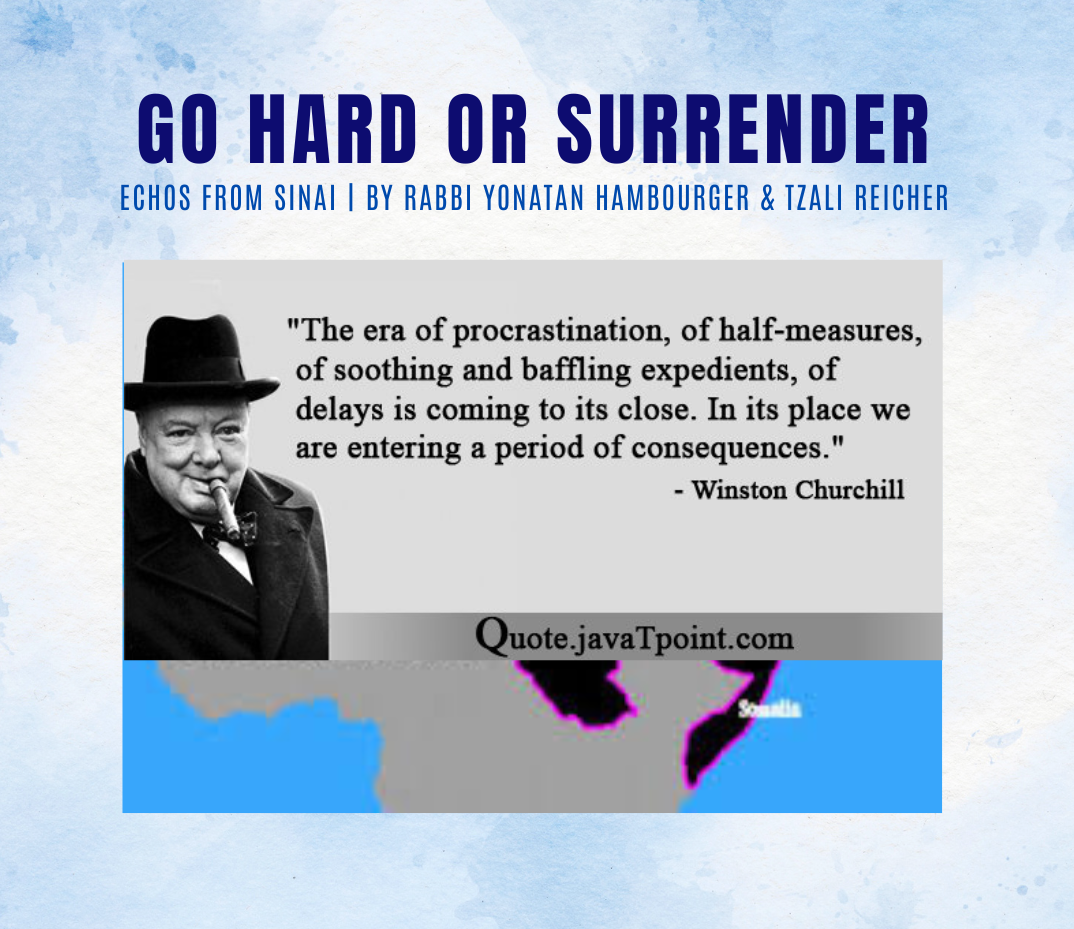
Go Hard or Surrender
By Yonatan Hambourger and Tzali Reicher
Two recent speeches by high-profile politicians about the ongoing Israel-Hamas War capture their opposite approaches and goals, and two high profile assassinations in the past 48 hours show exactly how Israel intends to keep fighting it.
On July 24, Prime Minister of Israel Benjamin Netanyahu addressed the American people and their representatives in government from the hallowed plenum in Congress, laying out in stark terms Israel’s aims for this war. He described in harrowing detail the events of October 7, 2023, when thousands of Hamas terrorists invaded Israel and kidnapped, raped, tortured, and murdered over 1,200 Israelis, breaching the ceasefire agreement with Israel already in effect and launching the current war. Netanyahu explained how all violence and terrorism in the Middle East is orchestrated by the terrorist state of Iran, which funds its proxies to keep Israel and her Western allies, particularly the United States, in a constant state of fear and unsettlement. As American terror sympathizers chanted anti-American slogans and burned Old Glory, Netanyahu thanked the American people, and asked the world for its continued support as Israel follows through and defeats this existential threat once and for all.
After her meeting with Netanyahu, presumptive Democratic nominee Vice President Kamala Harris delivered a speech in front of the White House that laid out her position vis a vis Israel’s war on Hamas. After a cursory nod to Israel’s right to defend itself (apparently a controversial thing to say these days), Harris launched an extraordinary attack on our leading ally, in a desperate bid to gain the support of the left-wing of the Democratic party.
She blamed Israel for the "human suffering in Gaza'' while repeating misleading and debunked claims from the United Nations about the deaths of children and widespread "food insecurity." Conspicuously absent from Harris's critique was any mention of Hamas's role in perpetuating Palestinian suffering, choosing to solely focus on Israel alone as the exclusive cause of pain and suffering during this conflict. She omitted any reference to Hamas's notorious strategy of embedding operatives within civilian areas while using innocent people as human shields to provoke and exploit Israeli defensive actions. Furthermore, Harris suggested that Israel was responsible for the impasse in ceasefire and hostage negotiations, neglecting to acknowledge that their counterpart in these discussions is a terrorist organization with a well-documented history of prioritizing survival over peace, even when they are the instigators of the violence.
While Netanyahu explained why a threat from an Iranian terror proxy like Hamas needs to be comprehensively crushed and defeated, Harris’s bothsidesism and calls for de-escalation from both the righteous and reprehensible side of the conflict only serves the interests of Hamas. The folly of Harris’s approach became clear just two days later.
On Saturday, a missile fired by Hezbollah, the Iranian-funded terror organization that essentially runs Lebanon, hit the Israeli-Druze town of Majdal Shams and killed 12 children, and severely injured 15 more, while playing soccer.
Since October 7th, empowered by Hamas’s actions and egged on by their Iranian masters, Hezbollah has peppered Israel with rocket attacks from across the border into Israel’s north, causing approximately 60,000 Israeli citizens to flee their homes, going on a year. Israel has been reluctant to respond in a decisive way, until now.
Why? Because the United States is strongly discouraging Israel, instead calling for diplomacy between all parties to hash all the issues out.
But what they don’t seem to understand is that diplomacy by itself is not a solution, but a tool to reach outcomes. If the outcome of “diplomacy” with terror organizations is their continued existence, leaving hostages still in captivity, and leaving Israelis unable to return home, that is not a win for any rational person.
With a misguided foreign policy that seeks an exclusively diplomatic approach with people who have no interest in peace, the current administration (who has indeed shown support for Israel) is coddling and emboldening Iran and its terror proxies in an ill-conceived strategy that hurts U.S. interests in the region, and globally.
With Iran confident that the United States would restrain Israel, their proxies continue attacking Israel and compromising its entire infrastructure and way of life. For an administration that desperately wants the war to end, even if only for political reasons, their slow-walking and overly cautious approach has harmed the war effort and only prolonged the international crisis.
Yet, in the past 48 hours Israel finally unshackled itself and began taking aim at the heads of the snakes that have tormented it for decades, sending a message that the gloves were off.
On Tuesday, Israel launched a targeted airstrike into the heart of Beirut and eliminated Fuad Shukr, Hezbollah’s most senior military commander. Shukr, a founding leader of the terror militia and a close associate of “Secretary-General” Hasan Nasrallah, was responsible for countless terror operations and civilian deaths. The United States had a $5 million bounty on his head, holding him responsible for the 1983 Beirut barracks bombings, when 241 American servicemen were killed.
Arguably the more shocking news broke on Tuesday evening, when Iranian state media announced that Hamas boss Ismail Haniyeh had been assassinated in Tehran. Israel has neither confirmed nor denied responsibility. Despite the wishcasting of pro-terror apologists in the media who have labeled Haniyeh a statesman and peace negotiator, Haniyeh was a terror monster who presided over the destruction of Gaza from his luxurious digs in Qatar. Directly responsible for signing off on terror attacks that took thousands of lives, Haniyeh thought he would be spared if he fashioned himself as some sort of untouchable moderate statesman and framed as such by a complicit press, regardless of his less than savory activities.
For months, it looked like he was right. Until he went too far.
Meanwhile in Gaza, thanks to a comprehensive strategy to stop the flow of weapons from Sinai, the probable assassination of Hamas Military Wing Leader, Mohammed Deif, as well as dismantling the Hamas terrorist infrastructure in Rafa and elsewhere, Hamas has responded with…zero rockets because Israel has removed Hamas’s ability to harm it. This wasn’t achieved by a shaky diplomatic “solution”, where Hamas could bide their time to commit another October 7, but by Israel’s comprehensive war effort to snuff out any chance they have of doing it again. Now, Israel is removing the obstacles to peace from the battlefield and hoping to close this chapter of history and begin writing a new one.
The pain and suffering of the last many months could have been avoided if Israel had been supported from the beginning to rid the world of genocidal terror organizations that seek to wipe it (aka Small Satan) and the United States (aka Big Satan) off the map. Israel is fighting and winning the battle against their enemies, and the enemies of America. All they ask for is our support from thousands of miles away. Thousands of Palestinians and Israelis could still be alive if all the pressure placed on Israel was correctly directed at Hamas and their leaders to surrender, return the hostages, demilitarize Gaza, and rebuild a peaceful society that would coexist and even flourish next to Israel. 12 innocent Israeli-Druze children might still be alive if months ago Israel was empowered to rout Iran’s proxy terror group, Hezbollah. The fact that Israel is being criticized for eliminating mass murderers, shows a deep moral rot in society.
When our leaders are wavering in their confidence in the morality of our positions, all elements of deterrence are lost. Empty calls for appeasement resonate with no one. Not with our enemies that sense weakness, and not with the allies that need our support. It’s time the United States backed Israel to end Iran’s war on the West, so we can turn the page on this awful chapter and rebuild together, in peace and security.
-
Yonatan Hambourger and Tzali Reicher are writers and rabbis serving communities throughout the regional South. Reach them at y@tasteoftorah.org.
July 25, 2024
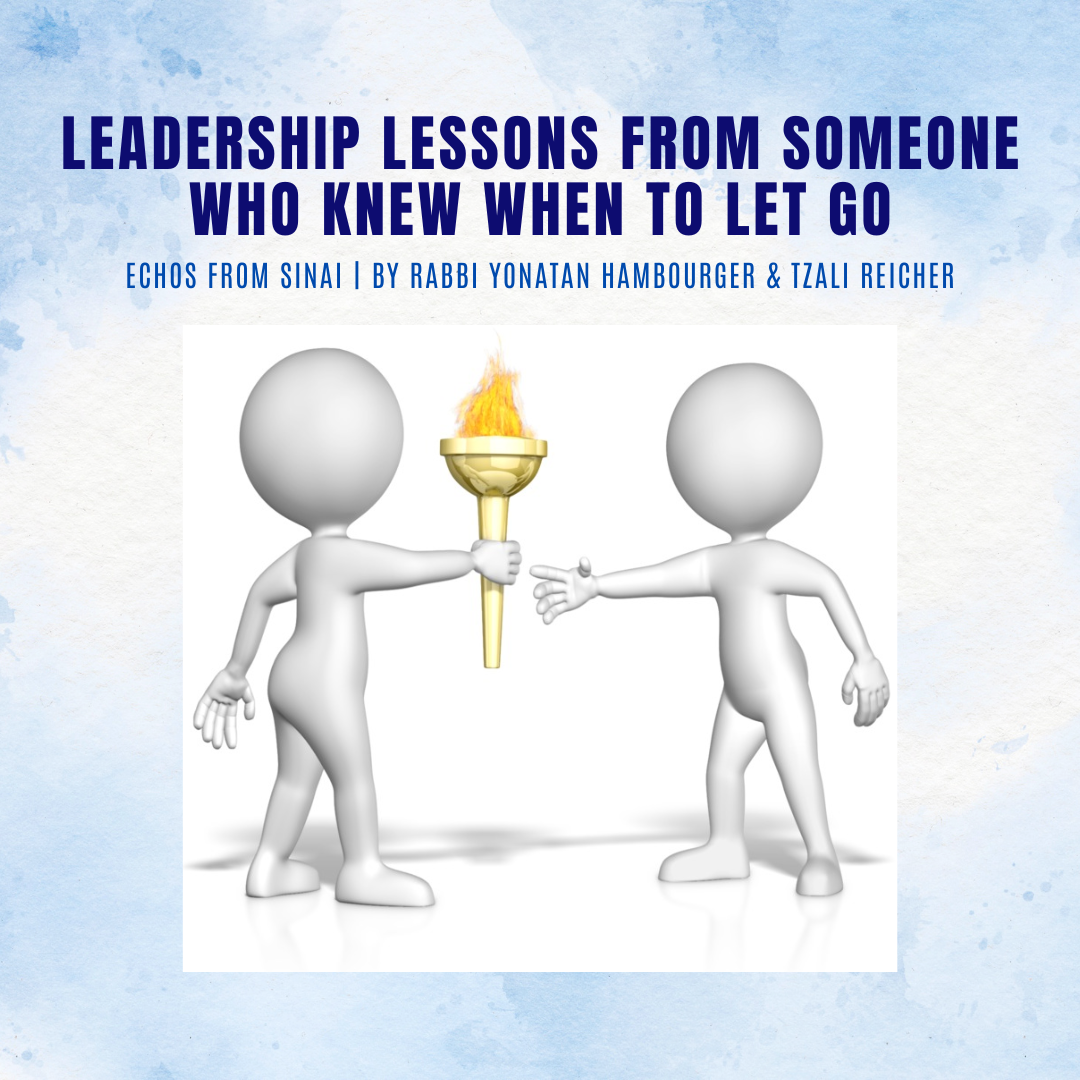
Leadership Lessons from Someone Who Knew When to Let Go
By Yonatan Hambourger and Tzali Reicher
Leaders in all walks of life would do well to learn from how Moses transferred leadership of the Jewish people to Joshua, 3,300 years ago.
After 40 years of leading a nation, Moses knew he wouldn’t be able to guide the Jewish people back into the Land of Israel, since he had been told by G-d that he wouldn’t enter the Promised Land. In the book of Numbers, Chapter 27, Moses asked G-d to anoint a new leader so the people wouldn't be like a flock without a shepherd. G-d instructed Moses to appoint Joshua, his devoted student. Moses then presented Joshua to the people and publicly showed him honor, ensuring that everyone recognized Joshua as the legitimate new leader. Then, Joshua would consult the High Priest’s breastplate known as the “Heavenly Code”, demonstrating in front of all the people that G-d approved of his new status. Thus, it was clear for all to see that Joshua was the right person for the job, and that G-d would be with him. This ensured a smooth and easy succession process that the people could be confident in.
There are some clear and applicable lessons we can apply in today’s day and age.
A true sign of leadership and strength of character is the willingness to pass on the torch by empowering others, assuming they are actually up to the job.
In our society, too often we see those entrusted with leadership hold on to their positions for far too long, long after they have lost the ability to exercise wise counsel and sound judgment. This is true in politics, in business, in academia, in sports, and even in the clergy. While typically leaders exhibit a profound sense of service and humility, some become seduced by their power and they covet honor and prestige, not knowing how to exit gracefully, until they are unceremoniously pushed out. By contrast, Moses, sensing that his time was near, and without anyone calling for his ouster, took the initiative and approached G-d to begin the succession conversation. He made the move of his own accord, well before he had to, and sought higher counsel on who his replacement should be, proving that he truly was all about serving the people, never seeking status or renown. This is true leadership.
But what lessons in leadership in this portion of Torah are there for the rest of us who are not corporate titans or world leaders? For that, we must look to the opening of the Book of Numbers, chapter 25 when Phinehas saw one of the twelve tribal leaders publicly sinning. Without thinking twice, Phinehas charged through this leader’s loyalists and exacted the punishment G-d had prescribed for people who commit such a sin. For doing this, Phinehas was honored with an exalted leadership position within the priesthood.
Phinehas wasn’t particularly noticed before he acted on behalf of G-d. Yet, when he saw a supposed “leader” doing something wrong, while those who should’ve known better were unwilling or unable to stop it, with self-sacrifice and courage he did the right thing. Not because he had to, not because it was expected of him, and not because he sought honor and recognition for it. Rather, Phinehas stood up because it was what the situation demanded.
Here and now in the United States, we have the ability to express our G-d given First Amendment rights to always stand up for what’s right, no matter what those in power say. And our incredible political system ensures we have the choice every two, four, and six years to elect wise leaders, who are humble enough to know when to stand up and lead, and when it’s time to stand down.
It is our responsibility to use our power to appoint and empower leaders that heed our age-old Biblical leadership principles.
-
Yonatan Hambourger and Tzali Reicher are writers and rabbis serving communities throughout the regional South.
July 18, 2024

Truly Indivisible
By Yonatan Hambourger and Tzali Reicher
Last week, Jewish communities read a dramatic Torah portion from the Book of Numbers in synagogues around the world.
We read how Balak, the king of Moab, became alarmed by the growing presence and success of the Israelites as they journeyed back home towards the Land of Israel. Erroneously fearing they would overrun his kingdom, Balak sent messengers to Balaam of Aram, a renowned evil prophet, and requested Balaam come to Moab to curse the Israelites. Initially, Balaam sought Gd's guidance and was told not to go or curse the Israelites, for they are blessed, and so he refused.
Undeterred, Balak sent a more distinguished delegation with promises of greater rewards. Balaam again consulted with Gd and was granted permission to go but was warned he would only be able to say exactly what Gd put in his mouth.
On his donkey ride there, the animal saw an angel of Gd blocking the path. Three times the donkey veered off the road or stopped, and three times Balaam struck it in anger. Finally, Gd opened the donkey's mouth, and it proceeded to question Balaam. Then Gd opened Balaam’s eyes to see the angel, who warned him again to speak only what Gd commands.
In Moab, Balak took Balaam to various high places overlooking the Israelite camp, hoping to aid in the cursing of the Children of Israel. However, each time Balaam attempted to curse the Israelites, Gd inspired him to bless them instead. Three times Balaam blessed the Israelites, extolling their virtues and foretelling their future greatness. Frustrated, Balak chastised Balaam for blessing his enemies. Balaam replied he can only speak the words Gd puts in his mouth. Before leaving, Balaam prophesied the future downfall of Moab and other nations opposed to Israel.
It is a story of how G-d provides for the people who cleave to Him, and how He can literally turn curses into blessings. But the Rebbe, Rabbi Menachem M. Schneerson, of righteous memory, the most influential rabbi in modern history, noted a deeper message.
There are two leading figures in the Torah that are mentioned as coming from the territory of Aram, present-day northwest Iraq. The first is the Patriarch Abraham, while the other is our antagonist Balaam. And without suggesting any comparison in holiness or morality between them, the Rebbe noted some parallels between the pair.
In Genesis, when G-d tested Abraham by seeing how he would respond to being asked to sacrifice his only son Isaac, we are told that Abraham ``rose early” and “saddled his donkey” himself, showing his eagerness and passion to obey G-d’s will, even though he didn’t understand it. By contrast, in our story of Balaam, we are again told that he “saddled his donkey”. But here, we learn, it wasn’t because he was inspired by positive feelings to go on his mission. Rather, it was because he was overwhelmed by hate, to the point he had no regard for his own dignity in his rush to express that hatred.
Two people, from the same place, doing the same action, for very different reasons.
We also learn in Genesis how Abraham begged G-d to rescue the condemned cities of Sodom and Gomorrah. Despite knowing of their evil and depravity, Abraham saw the good in other people and believed we are all capable of good and redemption. On the other hand, Balaam fought with G-d to allow him to curse and see the bad in other people.
The lessons we can learn from these two men in our current political climate are obvious.
We are all from the same “territory”, the United States of America, which was founded on the belief that we are all free to practice our own faith and express our beliefs in peace and unity. But in recent times, that promise has been eroded by bitter partisanship and political divisiveness.
Both political parties indulge in overblown rhetoric and the manipulative misstatement of facts. Just such hyperbolic speech, echoed in the media, led to a crazy person getting very close to inciting a civil war just last week. Mercifully and miraculously, this radicalized man failed in his mission.
If the former president is humble enough to recognize the Divine hand, we all saw last Saturday, then we can as well.
If the assailant represents the hateful Balaam of our society, then we must step-up and be Abraham. We must not continue to fall prey to the way politicians and the media manipulate us to hate each other. It’s imperative that we recognize each other's goodness, with a sincere desire for a peaceful and prosperous future for one another. We must recognize we live in this great land together and must remain indivisible. When each and every one embraces his and her inner Abraham, a kinder, saner, and more United States of America is guaranteed.
-
Yonatan Hambourger is a Rabbi and writer serving spiritual seekers of all persuasions on behalf of Chabad of Rural Georgia. Tzali Reicher is a Rabbi and writer serving communities throughout the regional South.
July 11, 2024
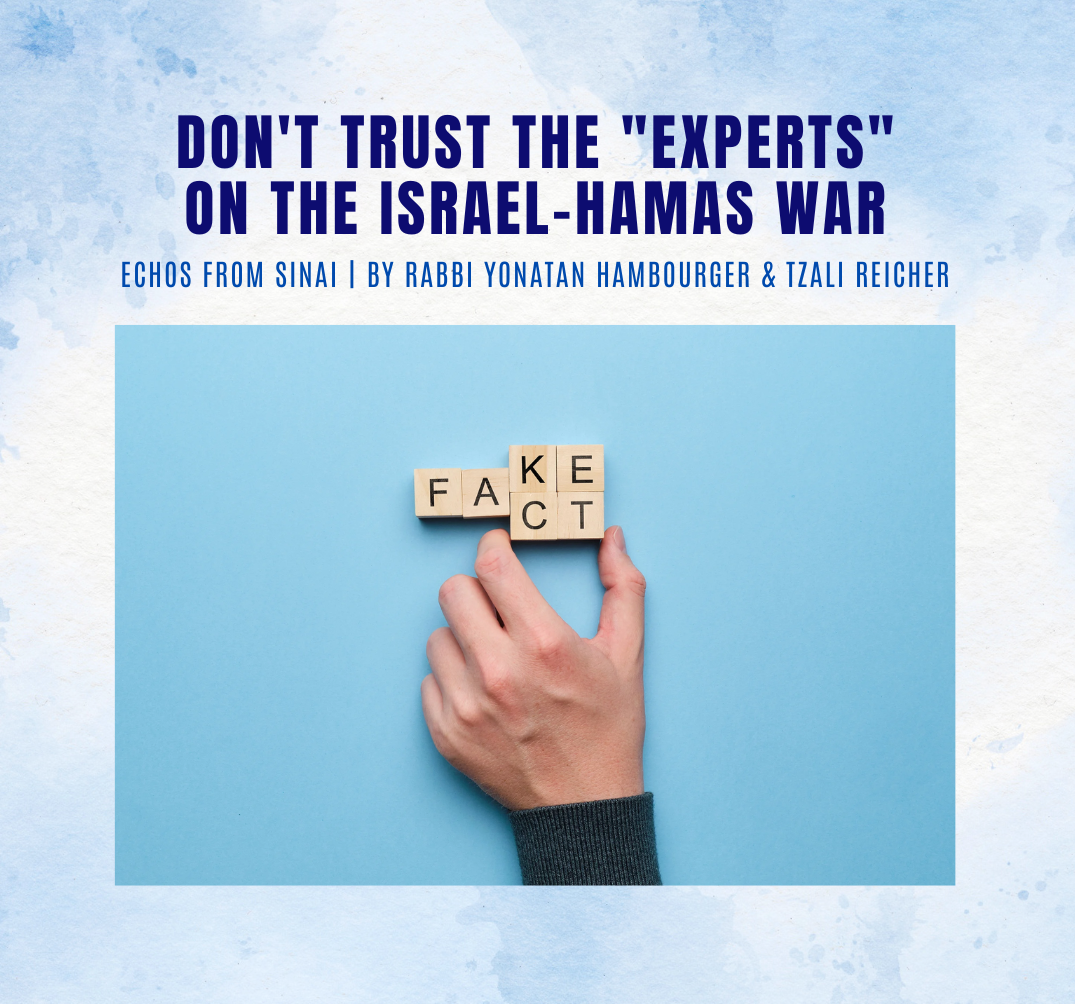
Don't Trust The "Experts" On The Israel-Hamas War
By Yonatan Hambourger
The flagrant misrepresentation of facts as well as outright lies against Israel, spread by many in the media, as well as in “prestigious” academic journals are so pervasive that they are seldomly called-out. My purpose herein is to highlight two such lies currently making the rounds:
There was a confrontation this week in the State Department briefing room that highlighted the contentious differences in how Israel and Palestine are addressed.
Sam Husseini, a progressive activist who often masquerades as a reporter to intimidate public officials on his personal agenda items, brought up The Lancet’s controversial report estimating that the casualties in the Israel-Hamas War could be as high as 186,000 during a briefing with State Department spokesperson Matthew Miller. When Miller declined to comment on the specific number, stating that all lives lost were tragic, Husseini provocatively and offensively accused Miller of smirking while discussing Palestinian victims. The accusation took Miller by surprise, prompting him to quickly recognize the nature of the interaction and move on to the next topic of conversation.
Sure, the whole episode was a ridiculous pre-planned attention seeking ploy by Husseni to further stir resentment against the Biden Administration for not being overtly pro-Hamas, but it afforded the world the opportunity to see how supposedly objective institutions and fact checkers have been hijacked and misused as weapons by propagandists and pro-terror apologists against Israel.
To begin with the newest blood libel against Israel:
If one was to believe the Hamas-run Gaza Ministry of Health’s numbers, by June 19, 2024, 37,396 deaths resulted from the Israel-Hamas war that began in October 2023.
Before we continue, it is important to note that Hamas doesn’t differentiate between terror operatives and civilians, counting them all as casualties in the same category to inflate the number for propaganda purposes. Additionally, multiple examinations of the statistics shared by Hamas and taken for granted as fact around the world have revealed them to be scientifically impossible, with an unnaturally consistent increase that suggests fabrication and manipulation. Their claim that 70% of casualties are women and children is inconsistent with previous conflicts and statistical expectations, and contrary to documented evidence. In June, The Associated Press released a report undercutting its own parroting of Hamas’s claim that more than two-thirds of the Palestinian casualties in Gaza have been women and children, saying far less civilians than Hamas claimed are likely to have been killed.
Knowing all this, The Lancet published a report in July based on the July 19 casualty figures published by Hamas mouthpieces, saying that on top of the 37,396 deaths they accepted as fact, the total death toll could plausibly reach up to 186,000 (and growing day by day) due to the bodies missing under the rubble and deaths caused indirectly by war (starvation, interruption in accessibility to healthcare providers, etc.).
This is not science. It is propaganda created specifically to be laundered by once-credible organizations, spread by complicit media outlets, and shared further to poison the discourse around Israel.
The Lancet didn’t have the ability to independently verify the death count, instead choosing to take a literal terror organization’s word for it. They then constructed a fantastical and totally hypothetical report based on complete guesswork that landed them with the perfectly right exaggerated number to have another tool with which to besmirch Israel.
The Lancet is not the only organization to expose themselves as either outrightly antisemitic, credulous, and gullible, or willfully complicit in seeking to harm the world’s only Jewish state over the past 9 months.
For months, the World Food Programme (WFP) of the United Nation-which has a long history of antisemitism and antagonism towards Israel-claimed Gaza was being starved by Israel and was in a full-blown famine. UN Secretary General Antonio Guterres led the international outrage and incitement against Israel, while EU Foreign Policy Chief and noted antisemite Josep Borrell said, “Israel is provoking famine”. The New York Times, The Washington Post, and many “venerable” media outlets across the world dutifully repeated the claim.
Obviously, they were lying.
In its report published on June 4, the UN's Integrated Food Security Phase Classification (ICP) concluded that famine was no longer "plausible" and had no "supporting evidence." The UN admitted that there had been only 32 deaths in Gaza from malnutrition, 28 of which were among children under five years old. Most certainly tragic, but hardly the famine that was being claimed. Despite this, neither the UN, the ICJ, NGOs, nor media outlets that spread these claims have admitted any error. The report concluded that the food supply to Gaza had actually increased in recent months, with Israel continuing its unprecedented practice of facilitating aid to an enemy population, despite knowing that Hamas would hijack most of it.
These are only two examples of the bias and lies Israel faces in its daily battles against “humanitarian” and “objective” organizations that only seek to further fan the flames of hate against Israel in support of an internationally recognized terror organization.
Israel has been accused of deliberately targeting civilians in Rafah, Gaza (they didn’t, Israel hit their target but Hamas had stored explosives in a civilians area that led to the deaths of their own supporters), targeting aid workers (their trucks had been purposely placed in the cross hairs by Hamas in a successful bid to set them as bait and cause an international furor), and killing 500 people in a hospital in a strike at the beginning of the conflict (Hamas misfired a rocket aimed for Israel and hit the back of the hospital, killing around and at most 50 of the own citizenry).
If the last decade didn’t cause you to already mistrust the supposed experts, their own efforts to tarnish and destroy their own credibility during this war ought to do it. The more we push back, speak up, and expose their bias and complicity, the sooner the world can move forward and build new institutions free from hatred, antisemitism, and division that promote peace, connection, and truth among all people.
-
I would love to hear your comments. You can reach me at y@tasteoftorah.org.
Yonatan Hambourger is a rabbi and writer serving communities throughout the regional South.
July 4, 2024

As War Against Israel Expands, We Must Stand Strong
By Yonatan Hambourger and Tzali Reicher
After nine months of exhaustive coverage of Israel’s existential battle against Hamas, it’s understandable to wish for an end to it all. This distant conflict has exposed uncomfortably deep divisions within our country and society, and some may be tempted to call for a ceasefire that results in a stalemate, ending the war without a clear victor. An approach like that would see Israel recovering its hostages and withdrawing from Gaza, while Hamas would be allowed to continue existing and begin rebuilding Gaza in its own image once again.
We cannot let this mentality of compromise prevail, especially as Israel, our strongest ally, faces an even more significant battle in the coming months. The need for a decisive resolution to this conflict is crucial not only for Israel, but for the stability and security of the entire region, and by extension, the world.
Last October 7th, Hamas invaded Israel and committed atrocities, including massacres, rapes, tortures, and kidnappings of innocent civilians in a barbaric medieval attack we thought the world would never see again. Incredibly, one of the most sophisticated and technologically advanced nations in the world was surprised and overrun by a rag-tag militia of marauding terrorists, who have shown how intransigence and guerilla warfare can drag out a war for months.
But this war is only a preview of what is set to unfold in the coming months, when Israel will finally be forced to confront a much larger, stronger, and better equipped enemy on their northern border with Lebanon: Hezbollah. Since October 7th, 2023, there have been multiple daily attacks by Hezbollah against Israel, including the firing of more than 5,000 rockets at Israel’s north. This has forced up to 90,000 Israelis to be evacuated from their homes, living in temporary lodging for the last nine months. The frequency and intensity of attacks by Hezbollah has been escalating in recent weeks. Israel is obligated to its citizens to change the security situation in the north to allow the residents to return safely and with a sense of security.
Like Hamas, Hezbollah is a terror organization funded by Iran that wishes to wipe Israel off the map, and like Hamas they have managed to hijack the government of the region in which they operate to effectively run the military and state policy. But unlike Hamas, Hezbollah is a far more sophisticated threat that must be confronted immediately without delay, because Hezbollah’s reach and capabilities pose a far greater threat to Israel and to her allies, including the United States.
On top of provoking Israel for years with constant rockets, kidnappings and terror attacks, Hezbollah has been a thorn in the side of the free world for decades. In 1983, Hezbollah was responsible for the bombing of the U.S. Marine barracks in Beirut, killing 240 American servicemen. This marked one of the deadliest attacks on American forces in the region, and as recently as 2020, Hezbollah’s Secretary-General Hassan Nasrallah stated that America’s rightful place is that of “the primary enemy, the Greatest Satan”. In 1994, Hezbollah carried out a devastating attack on the Jewish Community Center in Buenos Aires, killing 85 people and injuring hundreds. Hezbollah has also been linked to bombings in Madrid and London, showcasing their global reach and relentless pursuit of terror.
In Lebanon which serves as Hezbollah’s homebase, Christians face an existential crisis, as their country increasingly has come under the thumb of Hezbollah terrorists who answer to Iran, prompting a mass exodus of Christians. In addition to multiple terror attacks perpetrated by Hezbollah against Lebanese Christians, they also face a rapidly declining proportion in relation to Muslims in the country. Over recent years, a Christian majority of 53% of the overall population of Lebanon has dwindled to just 39%.
Hezbollah also has a history of subjugating, murdering, and brutally treating Palestinians in Lebanese refugee camps, undermining their claimed solidarity with the Palestinian cause. Hezbollah’s involvement in international drug trafficking, particularly heroin, funds its operations and spreads its malevolent influence.
Unlike Hamas, which claims to be primarily concerned with Palestinian statehood, Hezbollah is a Shia Muslim organization ideologically aligned with Iran. This alignment makes Hezbollah not only a regional threat but a significant player in Iran’s broader geopolitical strategies. Iran uses Hezbollah as a proxy to exert its influence across the Middle East, destabilizing countries and perpetuating conflicts that serve its interests. Hezbollah’s conflict with Israel and the West is not rooted in territorial disputes but in a broader ideological and religious enmity. This is not a fight over borders or sovereignty; it is a fight against a radical ideology that seeks to undermine the very existence of Israel and the western values it proudly holds.
Israel’s fight against Hamas and Hezbollah is not just a local or regional issue; it is a battle with global implications. The rise of radical Islamist groups threatens the stability of the Middle East and, by extension, global security. Israel’s resilience in the face of these threats serve as a bulwark against the spread of radicalism. The country’s efforts to defend itself are not merely acts of self-preservation but a crucial component of the broader fight against terrorism and extremism. A weakened Israel would embolden these groups and their backers, leading to more instability and violence as they seek to spread the hateful ideology around the world.
The international community must recognize this and support Israel unequivocally.
The U.S. has a moral imperative to stand by Israel, not just because of our shared democratic values but because of the strategic importance of a stable and secure Middle East. Israel’s success in its struggle against Hamas and Hezbollah is directly linked to the security interests of the United States. A strong and secure Israel is a critical counterbalance to Iranian influence and the spread of radicalism in the region.
Calls for a ceasefire and a return to the status quo would only serve to embolden those who seek to destroy Israel. We stand firm in our support for Israel, let them cleanse the world of these evil actors, and work towards a resolution that ensures its security and the enduring stability of the region.
-
We would love to hear from you. Please share your comments and questions with us at y@tasteoftorah.org.
Yonatan Hambourger and Tzali Reicher are writers and rabbis serving communities throughout the regional South.
June 27, 2024

Happy Birthday, America!
By Yonatan Hambourger and Tzali Reicher
On a warm summer day in Philadelphia in July 1776, a new nation was born. She was born consisting of 13 self-interested colonies and has grown nicely to now be made up of 50 united states. She is now known as the United States of America and is thriving at 248 years old.
Imagine being in the Pennsylvania State House on that history changing Tuesday, July 4th, 1776, with the members of the Continental Congress. Thomas Jefferson, John Adams, Benjamin Franklin, and our other Founding Fathers couldn’t have imagined what the United States would become. What was born of a dream of individual liberty has indeed accomplished so much in just 248 years.
We have so much to be proud of.
It’s a shame so many people today feel the opposite.
Over the past decade, we’ve seen plunging pride, plunging faith, and plunging belief in our country and its ideals, particularly and most concerningly amongst young people. Our elite college campuses have been corrupted by ideologies that lead students to declare allegiance to foreign terrorist organizations. People have become enmeshed in the most irrelevant and most divisive elements of the American experience, getting lost in tribal politics and online discourse, instead of embracing what makes our nation great.
Gone are the days when Washington D.C. was far away and our communities felt like extended family. Today, developments in D.C. deeply impact us, yet we often remain strangers with our own neighbors.
The community spirit and sense of “E Pluribus Unum” (out of many, one) that our founders had, inspired, and drove the United States for well over two centuries. That spirit emboldened us to declare independence, overcome bitter internal strife and end slavery, bounce back from the great depression, go to war and free the world (twice!), courageously usher in an age of civil rights for all, recover from an attack on our shores that sought to punish us for our way of life, and led the global fight against a global pandemic.
Yet in the present moment we are fractured and divided. But July 4th is here to remind us of the vision our founding fathers had for this country, and how we’ve far exceeded their wildest expectations. We must overcome our self-imposed differences and come together once again based on what unites us, not on what divides us.
As we mark another year of independence, it is crucial to remember and rekindle the values that forged this great nation: liberty, justice for all, an array of personal freedoms, and the relentless pursuit of happiness. These are not just ideals of the past but are the bedrock upon which our future must be built. These values have guided us through wars and peace, prosperity, and adversity.
Let us continue to hold high the torch of freedom and dispel the current darkness; and let us stand firm in our resolve to advance the cause of liberty and justice for all. On this day, as we celebrate our collective achievements, we renew our pledge to uphold the timeless values that define America. May our nation, under G-d, have a renewal of spirit and continue to flourish for generations to come.
Happy birthday, America. Keep being you.
-
Please reach out to us with your comments and questions at y@tasteoftorah.org. We’d love to hear from you!
Yonatan Hambourger and Tzali Reicher are rabbis and writers serving communities throughout the regional South.
June 20, 2024
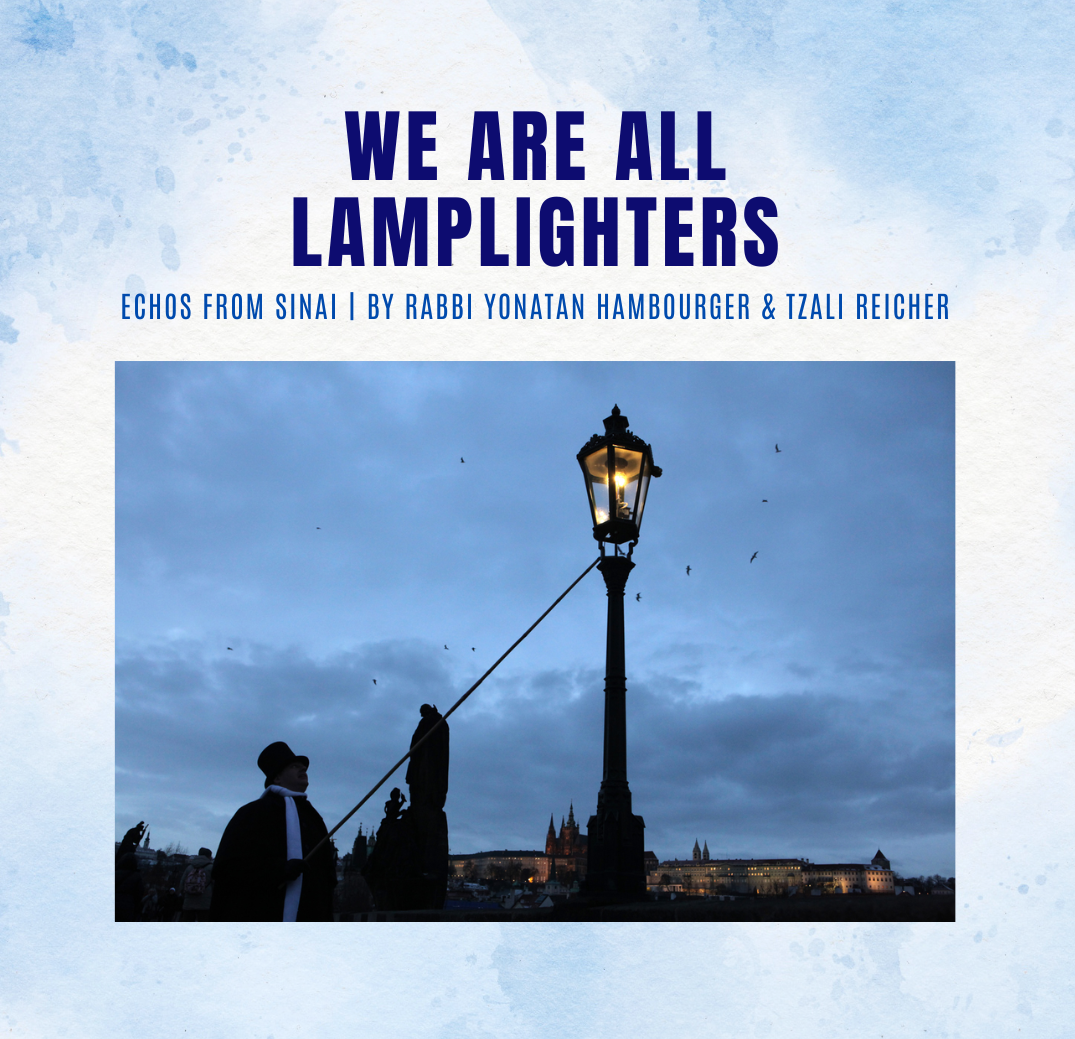
We Are All Lamplighters
By Yonatan Hambourger and Tzali Reicher
In days gone by, long before electricity, towns and villages throughout Eastern Europe would light up at night by hiring the services of a lamplighter. Every night, the lamplighter would traverse the town, street by street and manually light each lamp. By performing this simple but essential service, this humble role ensured the town could remain functioning after nightfall.
The Torah teaches us to find the spiritual meaning in the mundane, and Rabbi Sholom Ber Schneerson of Chabad-Lubavitch took immense inspiration from the lamplighter. He said that our job is “to be a lamplighter. The lamplighter walks the streets carrying a flame at the end of a pole. He knows that the flame is not his. And he goes from lamp to lamp to set them alight.”
In classic Jewish thought, G-d is described as an infinite source of light, whose brightness and intensity our human brains cannot comprehend. But within every person, G-d places a tiny spark of that G-dly flame to be our life source. It is our obligation to fan the flame of the soul within ourselves to deepen our connection and sensitivity to spirituality, and through the analogy of the lamplighter, the Rebbe was saying that we must all harness the Divine Light that lives in each of us and share it with others. We all have a shared responsibility for each other, to lift up one another and grow together.
It’s a lesson we find in last week’s Torah portion, where Aaron the High Priest is instructed to go into the Tabernacle and light the seven flames of the iconic, seven-branched candelabra (menorah).
Rabbi Menachem Mendel Schneerson, the most influential rabbi in modern history, explained the verse to mean that Aaron was given the responsibility of bringing Divine light into this physical world. He kindled the menorah, the light of which represents the essence of every one of us. The Torah points out that even a non-priest is technically allowed to light the menorah, which teaches us that everyone has the ability, and therefore the obligation, to light up the soul within our friends.
The act of lighting a lamp may seem small and insignificant, but it has the power to transform darkness into light. This principle applies to our daily lives as well. Small acts of kindness, a smile, a helping hand, or even a word of encouragement can illuminate someone's day and bring warmth to their hearts. Just like the lamplighter who lit each lamp with care, we too can make a significant impact on the lives of others through our actions, no matter how small they may seem. Every positive action contributes to a brighter and more compassionate world.
In times of darkness and uncertainty, the role of the lamplighter becomes even more critical. It is during these moments that we need to step up and be a source of hope and positivity for those around us. The lamplighter's unwavering dedication to lighting every lamp, regardless of the circumstances, teaches us the importance of perseverance and resilience. We must strive to be beacons of light in our communities, spreading hope and positivity, and inspiring others to do the same. By doing so, we can collectively overcome challenges and create a brighter future for all.
Some people may think that they are far from living a spiritually infused lifestyle, and therefore don’t have the initial flame with which to inspire and light others. But the verse telling us that even a non-priest can light the menorah is there to specifically remind us that it doesn’t matter how far from priesthood one is, they always have that spark within themselves to share with others. Sure, they would do well to nurture it and grow more in tune with G-dliness, but we all have that spark to affect change within others.
The metaphor of the lamplighter transcends time and place, reminding us that each of us holds the power to ignite light in the world. Whether through our actions, words, or simply by being present for one another, we have the ability to dispel darkness and bring about positive change. Let us all embrace the role of the lamplighter, carrying our flames high and illuminating the path for others. In doing so, we not only fulfill a spiritual calling but also build a more compassionate and united world.
As always, we welcome your comments and questions. You can reach us at y@tasteoftorah.org.
Yonatan Hambourger and Tzali Reicher are Rabbis and writers serving communities throughout the rural South.
June 13, 2024

Progressivism Is (Oxy)Moronic
By Yonatan Hambourger
Israel should be the darling of the progressive Left:
The story of the modern State of Israel is a triumph of a battered and decimated people triumphing over their fascist and world colonizing enemies, and returning to their ancient homeland, from where they were driven out millennia before. It’s a story of a people maintaining their homogamy and culture, despite centuries of oppression and persecution, and their miraculous rebirth in our more tolerant age.
But, as we’ve seen over the last 8 months, the progressive Left hasn’t exactly embraced Israel as they’ve been fighting a battle for their survival against the same enemy that aligned itself with the fascist Nazis just decades ago. In fact, they’ve protested for the rights of a genocidal terror organization that was elected by the government of people that doesn’t want to live side by side with the world’s only Jewish state that sits on the Jewish people’s historical homeland.
Why is this the case? Why hasn’t the progressive movement embraced Israel, which checks all the boxes as a cause they should support?
Is it antisemitism? Sure. Israel is uniquely hated in the world and treated with a double standard that no other nation is similarly condemned and harangued. Governments, ‘humanitarian’ bodies and everyday people are irked by the existence of the state for Jewish people to be safe in after millennia of reliance on authorities that proved time and time again they would sell out their Jewish communities in a heartbeat.
But more than antisemitism, ‘progressives’ hate Israel because it proves the truth about their ideology: that it is all false and flimsily built on a house of cards.
Progressives believe all minorities that have been historically oppressed are disadvantaged for the rest of time and have no agency to grow and climb out of their tough circumstances to find a way to thrive and build a successful life for themselves. Instead, these predominantly white saviors claim the system needs to be remade and rebuilt, and no compensation will ever be enough for injustices caused against people who passed long ago by people who died long ago.
Israel proves that this Divestment, Equity & Inclusion (DEI) philosophy is built on a lie. A broken and battered minority can in fact stage a remarkable comeback from horrific oppression and rise to become a world leader in innovation and technology in just a few short decades. Once condescending programs that make people reliant on handouts that lock them into a cycle of poverty are thrown-out, wonderful things happen to people that work to grow out of their challenging surroundings.
Another core tenant of progressive belief is anti-settler colonization, and they posit that Israel is a colonizing state on Palestinian territory. This claim is countered by history and the facts on the ground. Literally.
Israel has a documented 3,800 history with the Land of Israel, long before the founding of Islam, proven by historical records and archaeological discoveries. From the time the Roman Empire colonized the then-independent Israel in 70 C.E. and renamed it ‘Syria Palaestina’ to erase the historical and national ties of the Jewish people to the region, the Jewish people always knew they would come back home. Invaders and colonizers of all faiths and religions fought for control of the Jewish people’s land over the next centuries, always embracing the first colonizers name for it, Palestine. In 1948, Israel accepted the United Nations partition plan for the land and declared independence, while the disjointed Arab clans that lived there refused to accept Jewish neighbors.
The myth of a Palestinian national identity was only adopted in the 1960’s, and it has turned into a cause celebre of young Western progressives, who don’t know there has never been a state of Palestine or Palestinians as a national identity is a modern invention.
A people returning to their ancient homeland cannot be called settler colonizers. One would think that those who are declaring “land acknowledgments” on behalf of indigenous peoples in the U.S. and elsewhere, would view the Jews as the original indigenous people of all time, miraculously returning to their historic homeland. But they can’t because progressivism is hypocritical and oxymoronic.
In short, ‘progressivism’ is the Orwellian name of a movement that aims to keep people trapped in their historical circumstances of grievance as though that should dictate how people must be condemned to live today. Trapped as well, to think that their perceived underdogs automatically hold the moral and righteous high ground, no matter how baseless their claims may be.
Israel disproves their entire philosophy. Israel is a modern-day miracle of world leading success and tolerance. Yet much of the West, from naive college students to naive leaders, give credence and attention to this utter lunacy.
There was once a time where the nutso fringes were politely ignored while the rest of us pushed on with making the world a better place. It’s time we did that again.
Yonatan Hambourger is a Rabbi serving communities throughout the regional South.
June 6, 2024

G-d Is Not Just in The Sky
By Yonatan Hambourger and Tzali Reicher
Picture the scene:
Less than 50 days after being freed from centuries of slavery in Egypt, the Jewish people were gathered around the foot of Mt. Sinai, waiting to accept the word of G-d and become His people. They had arrived at the location six days earlier and had spent the last three days immersed in holiness, preparing for this moment. Now it was dawn, and the sky roared with the sound of lightning and thunder. Heavy clouds hung low over the mountain, and smoke filled the air. Their ears rang from the sound of the Shofar horn blowing, and everyone gathered there felt the enormity of the moment. Soon, they would become the first nation in recorded history to accept a monotheistic G-d upon themselves, and He would accept them back.
The dramatic scenes on Earth were a reflection of the tense and stormy debate taking place Above. The Talmud tells us that when Moses ascended Mt. Sinai, the angels pushed back on G-d’s decision to share the holy Torah with mere mortals and begged Him to leave the Torah with them to “honor and cherish”. G-d allowed Moses to answer back on behalf of the entire human race, and the great advocate of his people took the angels to task.
Moses went through the Ten Commandments and demonstrated how they only applied to humans. The angels were never slaves in Egypt and could therefore never remember how G-d redeemed them. Angels don’t have parents to honor, nor struggle and prevail against an evil inclination t bent on satisfying his base desires.
Yes, Moses agreed, humans are weak and perhaps undeserving of the holiness of the Torah, but the Torah was not created to be treated as a museum artifact, studied but never practiced. Instead, G-d intends Torah to be a blueprint with His express will for us to uplift ourselves and the world around us.
Clearly, G-d agreed with Moses because this week, we mark the holiday of Shavuot, 3,336 years since the Torah was shared with the Jewish people and, by extension, the world.
Rabbi Schneur Zalman of Liadi, author of the seminal mystical work The Tanya, taught that G-d created the physical world for us to make a dwelling place for Him in the midst of our lowly world. Our mission is to uplift our surroundings and infuse everything in this physical world with spirituality and holiness, ensuring we are doing our part to make it a fitting home for G-d.
The Torah's teachings transcend time and space, offering wisdom, guidance, and a path to fulfillment for all who embrace its principles. It is a testament to the enduring relationship between G-d and humanity, one that calls upon us to bring holiness into our everyday lives, not just to keep it in the sky, but to bring it down to Earth, where it can transform us and the world around us.
In a famous Talmudic debate between the sages, Rabbi Eliezer was frustrated that his colleagues didn’t agree with his interpretation and ruling on a matter of practical Jewish law. Seeking affirmation, he said that if he was right, a series of supernatural signs should prove it. And indeed, miraculous things occurred: a tree uprooted itself and flew hundreds of cubits, a stream began flowing in the wrong direction, the walls of the study hall caved in, and a heavenly voice thundered from the skies that Rabbi Eliezer’s opinion was correct.
Despite all that, the sages still ruled by consensus against him, saying that G-d took the Torah out of the domain of the heavens at Sinai, and now it was up to humans on earth to interpret it, live with it, and be guided by it.
The giving of the Torah at Mt. Sinai was not just a historical event; it was a defining moment that continues to shape the moral and spiritual fabric of our world. As we commemorate this monumental occasion, we are reminded that G-d is not confined to the heavens but is present in our actions, our decisions, and our pursuit of fulfillment and happiness. The Torah's teachings remain as relevant today as they were millennia ago, calling upon us to live with purpose, compassion, and righteousness.
This universal message of the Torah transcends religious boundaries and resonates with people of all faiths and backgrounds. The teachings of the Torah encourage us to see the divine spark within every human being and to strive for a world where peace, kindness, and understanding prevail. The call to uplift ourselves and our surroundings is not limited to any one group but extends to all of humanity, inviting each of us to contribute to the betterment of our world.
Yonatan Hambourger and Tzali Reicher are rabbis and writers serving communities across the regional South.
May 30, 2024

We Make Our Own Luck (...Mostly)
By Yonatan Hambourger and Tzali Reicher
There is the classic joke rabbis just love to tell from the pulpit:
Jim is running late for an interview at his dream job, and swings into the parking lot only to find there are no spots available.
He drives around and around, and in desperation calls out to G-d: “If you give me a parking spot right now, I will make a large donation to charity!” No sooner have the words left his lips when someone hurries out of the building and speeds away in their car. Breathing a sigh of relief, Jim says: “Never mind G-d, I found a spot!”
Sure, it's funny, but there is a deeper message in this joke.
Have you ever felt taken for granted in a relationship? That people only know you when they need you, and ignore you the moment after their use for you is over? And those same people you’d drop everything for, you can’t count on to do the same?
Well, you’re in good company. In this week’s Torah portion-Bechukotai in Leviticus-G-d himself cautions us to not look upon our good fortune as something random, or attributable exclusively to our own efforts.
A theme we’ve discussed time and time again in this column is the virtue of doing your very best to improve your own circumstances, and then believing in G-d that He will do what is best for you. In classic Chassidic terminology, we are told to make a Keli (vessel or container) for G-d’s blessings, and after we do our part, watch the blessings overwhelm us.
But the danger is when we forget the source of our good fortune.
Too often, success can get to our heads. We grow egos, we believe our own hype, and start believing that our achievements are solely the result of our own efforts. We don’t properly appreciate or credit G-d for delivering our good fortune, and send a message that we don’t need Him: we’re all good on our own.
This kind of mindset becomes a self-fulfilling prophecy, wherein G-d abides by our desire for distance (G-d forbid) and fulfills our wish to be governed by the laws of cause and effect, rather than by His personal providence. And then when we (realize we) need G-d’s help once again, the cycle we despise when people do it to us, repeats: You need me, I help you, you move on without thanks or appreciation, and then you’ll call the next time you need me.
So how can we show G-d thanks for all the blessings in our life?
We must see every green light, as well as every bump in the road, as a custom-sent message from G-d. But just as your phone must be turned on to receive a text message, your spiritual sensitivity must be turned on to receive G-d’s messages.
Take a few minutes right now and review everything that occurred to you today and contemplate the messages that G-d has sent you. Think of the everyday miracles we take for granted-our families, homes, and our health-and how fortunate you are for your own good fortune. Make efforts every day to deepen your relationship with your Creator and express your gratitude proactively.
This is strengthened through learning Torah (the Bible) and fulfilling His precepts. Rather than attributing things to ‘coincidence’ (which is just an eleven-letter name for G-d), recognize we experience divine providence in all aspects of our life.
The Baal Shem Tov, founder of the Chassidic movement, was an early advocate of this approach. He taught the concept of hashgacha pratis (Divine Providence), which teaches that G-d is intimately involved in every detail of our lives, from the grandest events to the smallest occurrences. Nothing happens by chance; every moment is part of G-d's purposeful plan. This perspective encourages us to recognize and reflect on G-d's presence in our daily experiences, deepening our connection through Torah study, good deeds, and gratitude. By viewing life through the lens of hashgacha pratis, we see every experience as an opportunity for spiritual growth, fostering humility and trust in G-d's benevolent guidance. The Baal Shem Tov also used to encourage people to respond “Thank G-d” when he asked how they were, as another way to actively express our appreciation for G-d many times throughout the course of our day.
With this mindset, paired with a hearty work ethic and trust in G-d. we will never go wrong.
Yonatan Hambourger and Tzali Reicher are rabbis serving communities throughout the regional South.
May 23, 2024

Letting Go and Embracing Faith
By Yonatan Hambourger and Tzali Reicher
The book of Leviticus in the Pentateuch can be a dense read for the uninitiated.
Having told the story of the creation of the world, the birth of the Jewish people and their miraculous escape from slavery in Egypt, the Torah now spends chapter after chapter laying out G-d’s expectations and commandments. Through Moses, we learn about what the daily services should look like, the laws of marriage, kosher, and charity. We go into the minutiae of the sale and ownership of lands, how disputes are to be mediated and the prohibition against fraud and cheating.
But amongst all these laws, there’s one in last week’s Torah portion that catches the eye for its seemingly extreme nature.
Every seven years, from the time they arrived back in Israel, the Jewish people were told to mark the Shemittah (Sabbatical year), a designated Year of Rest. For 12 months, they were forbidden to work on or benefit from the land. They were told to lay down their tools, reconnect with spirituality and everything growing on their property was free to all who wanted to take from any of the produce.
But why did G-d command such a difficult and seemingly irresponsible mitzvah (commandment)? Surely, He understands that in this world He created, there is a need for people to earn a livelihood and earn money in order to survive!
The answer is that of course G-d understands the nature of the world He designed, and therefore made it clear the Jewish people must prepare before the seventh year begins. G-d promised that the sixth year of the cycle would be bountiful and plentiful, to allow people to stock up and preserve supplies for the year ahead, in fact promising that the crop of the year before Shemittah (Sabbatical year) would be so strong, it would last and feed them for three years; year six, year seven, and year one of the new seven-year cycle.
For those who followed these directions and observed Shemittah, they were richly rewarded. Not only in the material sense, with comfort and food security during a year off from actively working, but more so spiritually. They had a year to truly reconnect with their families, friends, and communities, in a truly meaningful way. No longer was their work in the fields dominating their time, attention and conversations; instead, it was replaced by talk of families, studies and spiritual advancement, knowing that they had put their faith in G-d and He would provide, because they’d done their part first.
The lessons we can draw from Shemittah today are obvious.
Too often, we use our mundane jobs and careers as a way to connect with people.
How often have you been asked “what do you do” when meeting someone new? How often do you find yourself describing your job as your primary pursuit?
Living in a way where elusive financial freedom is the number one goal is meaningless and shallow, particularly when coupled with our off-time hours primarily occupied by scrolling a never-ending screen. Most Americans today feel lonely and isolated, and it's not hard to see why.
To counter that, G-d commanded the Jewish people to observe Shemittah, a mitzvah practiced to this day in Israel. You have a job and have set yourself up nicely, now put your faith in G-d to provide for you.
Reconnect with what is truly important and recharge, because from there, all blessings and inner peace flows.
We love to hear from you! Feel free to send questions and feedback to y@tasteoftorah.org!
Yonatan Hambourger and Tzali Reicher are rabbis serving rural communities throughout the regional South.
May 16, 2024
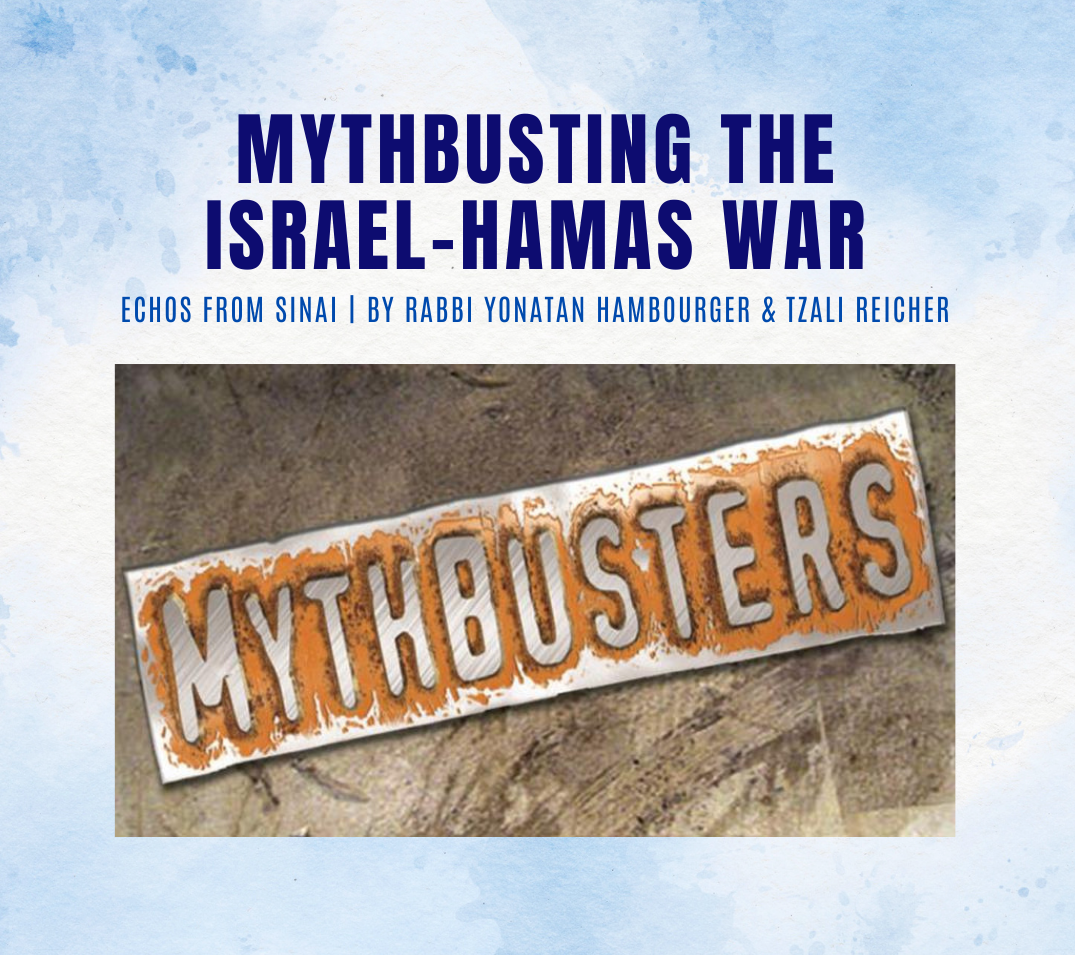
Mythbusting the Israel-Hamas War: Part 2
By Yonatan Hambourger and Tzali Reicher
After the popularity of our column “Mythbusting the Israel/Hamas War” several weeks back, where we discussed the prevailing narratives surrounding the history and fighting in the current conflict, we thought we’d come back with a Part 2. In this installment, we'll continue to address misinformation and reveal the realities on the ground, aiming to clarify and inform those uncertain about the intricacies of this war and the players involved in it. If you would like a reprint of Mythbusting Part 1, please email us at y@tasteoftorah.org.
Myth #6: Israel oppresses Christians and Muslims, while those same groups thrive in Arab states.
As part of a desperate attempt to find allies in the aftermath of October 7th and the carnage they wrecked on Gaza, many pro-Hamas advocates online began claiming Israel oppresses and harms their Christian and Muslim populations. These laughable talking points have been further trafficked into the mainstream by right wing commentators on X, including Tucker Carlson and Candace Owens, as they embrace desperately anti-Jewish and anti-Israel positions.
In truth, all faiths thrive in Israel, which is a model example of a diverse and pluralistic society for all religions. As of 2019, Israel’s population of roughly 8.4 million people was 75% Jewish, 18% Muslim, 2% Christian, and 1.6% Druze, while the remaining four percent include people who identify as Jewish, Samaritans, Karaites, Ahmadi Muslims, Baha’is and various small (in Israel) Christian churches and communities. All holy sites are open to all faiths, including The Church of the Holy Sepulcher, Jesus’s tomb, the mosques on the Temple Mount and the Dome of the Rock. Millions of people, adherents of every faith under the sun, flock to Israel to visit the Holy Land, and find it to be a free, welcoming, and warm country.
By contrast, in the Palestinian territories, all Jewish people have been expelled at the threat of death. Even in the city of Hebron, which the Patriarch Abraham purchased 3,800 years ago as a burial ground for himself and his wife Sarah, Jews have access to only 3% of the city. In Jerusalem, Jews are not allowed to pray at their holiest site on the Temple Mount and have extremely limited rights to sites such as Joseph’s Tomb and the Mount of Olives, where Jews must travel with armed protection.
Christians have faced significant challenges under Palestinian control. Prior to 1992, when Bethlehem was under Israeli control, Christians constituted 86% of the population, a figure that dramatically dropped to just 12% by 2016, following the city's transfer to Palestinian governance under the Oslo Accords. According to a 2020 survey by the Palestinian Center for Policy and Survey Research (PCPSR) and the Philos Project, Christians now represent less than 1% of Palestine's population. Christians often feel marginalized, treated as second-class citizens, and find themselves caught in the ongoing conflict. Over 40% of Palestinian Christians report feeling unwelcome by Muslims, 44% face employment discrimination due to their faith, and nearly 30% have been pejoratively called "non-believers" or "crusaders" by Muslims. Moreover, violent attacks against Christians are not uncommon, as exemplified by Father Justinus, a monk who has survived 32 life-threatening assaults at his monastery near Nablus. The facts contrast sharply with the rosy tales of Christian-Jihadist cooperation told by people with malicious agendas who live far away.
Myth #7: Israel is committing genocide, and indiscriminately bombs Gaza.
In an age where words have become slogans, and are therefore rendered meaningless, the histrionic claim that Israel is committing genocide takes the cake.
Fighting a war against a terror organization that embeds itself in a urban environment is not a genocide.
Israel’s incredible ratio of hitting its military targets while minimizing civilian casualties is historically unprecedented, while the steps the Israel Defense Forces take to warn its enemy before launching an attack has never been seen in the history of warfare. Forbes Magazine reported that as of December 2023, the Israeli army had made over 50,000 phone calls , left approximately 12 million voice messages and sent 14 million text messages all to Palestinians in Gaza, warning them of impending military action in their area. These actions diminish Israel’s chances of success and eliminate the element of surprise necessary in war, yet still Israel persists in their efforts to show care for an enemy population. Additionally, Israel facilitates the delivery of hundreds of trucks carrying aid into Gaza every day, despite knowing Hamas hijacks the vast majority of it and withholds it from the Palestinian people, killing those that object.
Despite the hysterical cries of college subversives and online loudmouths, these are not the actions of a genocidal and reckless invader, rather they are the painstaking efforts of a democratic and G-d fearing nation to eliminate a terrorist organization that abuses its own people and condemns them to misery and suffering.
Myth #8: Israel’s claim to the “most moral army in the world” is false.
Antisemites and antizionists (but I repeat myself) like to say that Israeli soldiers are trigger-happy war criminals who abuse innocent Palestinians, and use a few isolated incidents, out of context examples, and lies to paint a sorry picture of the army of the world’s only Jewish state.
On top of the last entry’s evidence that laughs off those claims and proves its commitment to fighting morally and justifiably, the IDF’s Code of Ethics lays out fidelity to those principles. Soldiers are called to protect dignity and human life, work with patriotism, professionalism, and discipline, and strive to be the best examples and representatives of Israel they can be. In a clause named “Purity of Arms”, the army dictates that a “soldier will use his weapons and force only for the mission, only to the extent necessary, and will maintain human dignity even in combat. The soldier will not use his weapons and power to harm non-combatants and prisoners and will do everything in his power to prevent harm to their lives, bodies, honor, and property”.
Israel’s history of embracing these core principles, exemplified by their efforts to minimize unnecessary deaths in battle, warning the enemy of upcoming action, and protecting all civilians under its purview regardless of race or faith, proves that the IDF is the most moral army in the world.
What questions or commonly held “truths” about this war would you like to see us address? Feel free to send questions and feedback to y@tasteoftorah.org!
Yonatan Hambourger and Tzali Reicher are rabbis serving rural communities throughout the regional South.
May 9, 2024

Passion Without Purpose Is Pointless
By Yonatan Hambourger and Tzali Reicher
The whole world has spent the last month up in arms over the dangerous and surreal scenes occurring on American college campuses.
Keffiyeh-wearing mobs have torn down American flags and built sophisticated tent encampments on the hallowed grounds of our most distinguished institutions in seemingly “grassroots” campaigns, yet in actuality perpetrated by well-organized, sinister forces. Jewish students have been harassed and threatened in their own schools and blocked from accessing their own classrooms and public spaces. Explicitly pro-terror rallies, along with chants and signs reverberate around our most prestigious colleges, and are echoed by the mindless drones that attend them.
Almost as shocking as those perpetuating these hateful events are how those in positions of power are handling them. Instead of standing up for the rights of their student body-regardless of faith or political persuasion- who just want to attend classes and use the library to study for finals, university faculty, as well as a vocal minority in Congress have entertained and facilitated the demands of these deranged protestors and rioters. Those schools which actually possess the moral clarity to object to the blatant unlawfulness and Jew hatred, find no support or protection.
Those who should know better claim that the pro-Hamas protestors have their hearts in the right place, and their passion for political activism should be embraced and encouraged.
This whole premise is flawed.
Just because someone is passionate about a cause doesn’t make it just or right, and those advocating false and dangerous ideologies should be disabused of their ignorance instead of being treated with kid gloves.
Adrift and lost in the age of record levels of purposelessness and disconnection, the youth of today are desperate for a cause and mission. Embracing the radical DEI and oppression culture running rampant on college campuses, these lost young-adults have decided that Palestinian terror organizations are the victims of European Colonialism and white supremacy and have launched unhinged and violent campaigns on their behalf.
They are wrong, and those tacitly endorsing their efforts by not decisively shutting them down, are wrong as well.
With all this as a backdrop, the recent weekly Torah portion read by Jewish people, tells a story with interesting parallels to the events unfolding now.
During the time the Jews wandered in the desert on their way back to their G-d given homeland of Israel, the two eldest sons of Aaron, the High Priest, and nephews of Moses, enjoyed a privileged closeness to the divine. Yet, one day the pair were overcome with the desire to connect even more intimately. In a state of spiritual ecstasy and religious passion, the brothers marched into the Tabernacle with an unsanctioned offering on the altar. Rather than consuming it, the flames leapt off the offering and fatally consumed the brothers, as punishment for their sin.
When asked how G-d could punish the sons of Aaron for something they did in a genuine attempt to get closer to Him, the commentators answer that while the passion they felt was admirable, it was misplaced and wrongheaded. And for that, they were penalized.
Granted these sons of Aaron were pious and righteous with the best of intentions, while the frenzied mobs on campus fit none of these descriptors, but the lesson from this Biblical story is still apt. Passion is pointless unless it is directed to something positive and productive. The riotous mobs on campus, and their handlers are playing with fire, and it would serve them well to cease their destructive activities and to get on the right side of history.
As always, we welcome your comments at y@tasteoftorah.org.
Yonatan Hambourger is rabbi with Chabad of Rural Georgia. Tzali Reicher is a rabbi and writer currently living in Florida.
May 2, 2024

The “House of Lies” That Runs The World
By Yonatan Hambourger and Tzali Reicher
It was October 1984, and thousands of Jews were packed into the iconic synagogue at 770 Eastern Parkway in Brooklyn, New York. They were waiting for the Rebbe, Rabbi Menachem M. Schneerson, of righteous memory, the most influential rabbi in modern history, to begin the Simchas Torah holiday service and festivities. The restless masses waited as their usually punctual revered leader spoke to a distinguished guest for just under an hour, Israel’s incoming Ambassador to the United Nations. The Rebbe told the ambassador that the United Nations was “a house of deep darkness and lies”, but that the ambassador’s mission was to “light one candle of truth, which will dispel the darkness.”
That new ambassador was Benjamin Netanyahu, and the Rebbe’s message about the United Nations remains as relevant as it was 40 years ago.
Since accepting the rebirth of the Jewish state in 1948, the United Nations has had a deeply troubling relationship with Israel and the Jewish community.
Condemning Israel appears to be the primary function of the United Nations comprised of 193 member states. From 2006 to 2016, the UN Human Rights Council (HRC) adopted 135 country-specific resolutions, with a striking 50% targeting Israel. Similarly, the UN General Assembly showed a significant inclination towards resolutions against Israel. Between 2012 and 2015, the UNGA passed 97 resolutions criticizing countries; 86% of these were directed at Israel. This pattern persisted in subsequent years, with Israel being the principal focus of condemnatory resolutions annually.
The United Nations Educational, Scientific and Cultural Organization (UNESCO) also demonstrates a unique approach towards Israel. Annually, UNESCO adopts around ten resolutions, all of which single out Israel for criticism, marking a 100% focus on Israel exclusively. UNESCO also devotes its time to denying Israel’s history and Jewish connection to the land, labeling ancient Biblical sites such as Jericho and Hebron as “Palestinian”, a term that wasn’t used until Rome invaded Israel 1,000 years later.
Perhaps most famously was the infamous 1975 UN Resolution 3379, that stated Zionism, the desire for Jewish people to have a homeland of their own, “is a form of racism and racial discrimination", a ludicrous resolution that was later repealed. There is an obvious double standard applied only to Israel by referring to the West Bank and Gaza as “Occupied Palestinian Territories” but not until after Israel won it back in a defensive war in 1967, from its previous occupiers Jordan and Egypt.
Ironically, Israel, whose Arab citizens enjoy freedom and civil rights unheard of elsewhere, is criticized and condemned every day by dictators and renowned human rights abusers including the Presidents of Iran, Libya, Zimbabwe, Syria, and Cuba. Meanwhile, North Korea, Sudan, Russia, and Cuba are just some of the authoritarian and draconian regimes that have sat on the United Nation Human Rights Council that calls out Israel every chance it gets.
The United Nations is a place where truth goes to die, and where evil wins the day.
This was starkly seen after October 7th, when Hamas invaded Israel and murdered, raped, tortured, and kidnapped 1,300 innocent men, women, and children. Remarkably, the United Nations- lead by its Secretary General Antonio Guterres- claimed “October 7 didn’t happen in a vacuum.” He continued to paint both Israel and Hamas with the same brush, saying both sides needed to “stop the cycle of violence” and that Israel needed to immediately and unilaterally abide by a ceasefire, without its hostages being returned or Hamas demilitarizing. Israel has been the subject of multiple condemnations, resolutions, and debates, while the U.N. tries to force them to accept Hamas’s terms for the end of the war.
All this is going on despite it being proven that United Nations workers participated in the horrific events of that awful day. Somehow, the victim is being painted as the aggressor, while the supposed do-gooders turned out to be killers and rapists.
The United Nations has no credibility regarding Israel, or any other country for that matter. It has been hijacked by the worst nations on Earth to manipulate the discourse in their favor, while vetoing any resolutions that condemn their atrocities. Democracies, such as the United States, United Kingdom, and Australia, still believe in the United Nations mission and hold to its resolutions, while Russia, China and Iran use the forum to push their own evil agenda and ignore all criticism of their own behavior.
The United Nation is a place where democracies are harangued and lectured to by dictators and thugs who hate all our values and everything we stand for. The “house of darkness and lies” will continue its slow and humiliating descent into irrelevance, while the U.S. and her friends and allies including Israel will serve as the moral beacon for the rest of the world.
As always, we’d love to hear your thoughts on this subject, or any other. You can reach us at y@tasteoftorah.org.
Yonatan Hambourger is a rabbi with Chabad of Rural Georgia. Tzali Reicher is a rabbi and writer currently living in Florida.
April 25, 2024

Jump Right In
By Yonatan Hambourger and Tzali Reicher
The crashing waves of the Red Sea scared the Jewish people. Freshly liberated after centuries of slavery, they couldn’t wrap their minds around what Moses was asking them to do as their Egyptian slave masters closed in on them from behind: to simply walk into the raging waters and let G-d do the rest. Sure, Moses had delivered on his promises to free them and performed miraculous miracles up to this point, but how could they risk their lives now, just like that?
The Jewish people passionately debated their options, until one leader took matters into his own hands. Nachshon, the bold leader of the tribe of Judah, confidently entered the choppy seas. The nation watched as the water reached his knees, naval and neck, with no apparent miracles occurring. And suddenly, as Nahshon’s head almost disappeared under the waves, the sea roared to life. Along with every body of water in the world, the Red Sea parted in two where Nachshon stood, miraculously drying the seabed for the Jewish people to march into freedom, escape Egypt forever and march to Mount Sinai, and eventually return to their homeland, Israel.
Passover famously begins with the Seder, this year on Monday night, April 22nd and Tuesday night, April 23rd, where Jewish families the world over gather together for a 12 part meal and remembrance of their ancestors' exodus and deliverance from Egypt, which was a formative element in the founding story of the Jewish people.
Not as well-known as the beginning of the holiday are the last two days of Passover (Monday, April 29th, and Tuesday, April 30th), where we mark the conclusion of the weeklong festival, and commemorate the splitting of the Red Sea, when G-d performed unprecedented miracles that transcended the laws of nature. The celebration includes actively remembering what G-d did for the ancient Israelites by staying up the whole night to learn Torah, and having meals celebrating the Israelites deliverance then, as well as the Messianic deliverance all of humanity will experience, speedily in our days.
But there are many miracles G-d performed in the Bible which don’t include celebrations millennia later. Why is the miracle of the Red Sea still applicable in our times, that it warrants such commemoration?
There’s an enduring message about faith that resonates even after many centuries from the miraculous events of the splitting of the Red Sea.
Despite witnessing G-d’s miracles clearly for all to see, still the Jewish people weren’t sure whether they should listen to His directives and walk into the sea. G-d had stood by them and proven Himself, and still they waffled. Yet one brave man took it upon himself to set the tone for the entire nation and triggered the chain of events that ushered in the miracle of the splitting of the sea, their enemies vanquished, and the road to redemption and to Mount Sinai open up.
These days, it’s easy to miss the miracles we experience every day. With wars raging around the world and domestic concerns at home, we can miss the everyday things we take for granted and never feel grateful for. While we see miracles happening around us, the incredible failure of Iran’s attack on Israel and U.S. regional interests, being a notably recent one, miracles can seem few and far between, leaving room for doubt and despair to creep in and fill that void, leaving us to question G-d’s plan for us and doubt whether we should follow His directives at all.
At these times, it’s important to remember that G-d is always with us and has always been there. Every gift we have, be it our family, our job, or even the gift of being born a free American, is a miracle that we have been blessed with. When we experience moments of doubt, like Nachshon who jumped into the Red Sea, we need to push away the fear, and trust what we know is right, trusting G-d to be there for us like He always has been.
As always, we’d love to hear your thoughts on this subject, or any other. You can reach us at y@tasteoftorah.org.
Yonatan Hambourger is a rabbi with Chabad of Rural Georgia. Tzali Reicher is a rabbi and writer based in Florida.
April 18, 2024
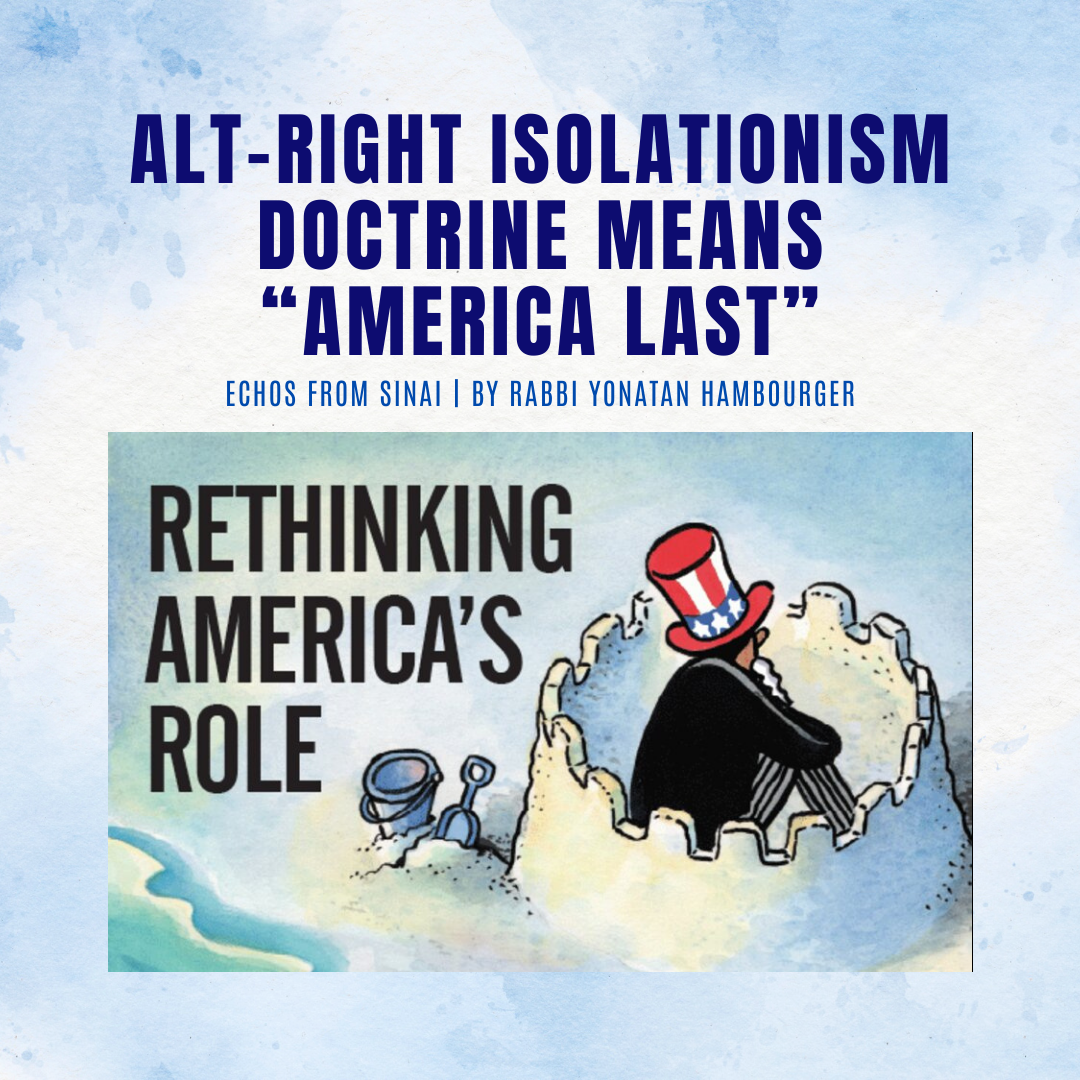
Alt-Right Isolationism Doctrine Means “America Last”
By Yonatan Hambourger and Tzali Reicher
Most Americans, regardless of party affiliation, agree that the United States should not be exporting its products for free while American taxpayers pay heavy tariffs on products coming from those same countries. Further, most Americans agree that we should not be funding everyone else’s militaries and alliances if those very countries will not invest in their own annual budget for their own protection.
This understanding reflects how the vast majority of Americans feel and how successive administrations have run U.S. foreign policy, albeit with differences in emphasis and rhetoric.
Until October 7.
Only days after Hamas perpetuated its massacres, rapes, and kidnappings of 1,300 innocent Israeli civilians--and long before Israel launched its response-- a handful of commentators began questioning the United States’ support for its only democratic ally in the region, framing their position with an isolationist fervor. Their argument can be framed as an “either/or” proposition such as, “the same money given to Israel on account of the Jewish lobby, could be used to solve the fentanyl crisis. That’s killing tens of thousands of our children.”
It’s dishonest, and plainly wrong.
Even if we were to believe that those that hold this position aren’t antisemitic or specifically anti-Israel, applying this understanding would mean that the United States should retreat from the world stage, clearly an America-Last policy. This would hasten the end of the world as we know it; the world we’ve been at the forefront of for almost a century.
If we were to abandon our alliances and agreements, the world would quickly descend into anarchy and chaos. In Asia, China would make its long-anticipated move to invade Taiwan after years of fearing American pushback, blocking American access to semiconductors and chips, essentially locking the United States out of competing for the future. With no threat of American and NATO interference, Russia would continue its march across Europe in Putin’s bid to rebuild a Russian empire, threatening every country on the continent. And in the Middle East, with “Big Satan” out of the picture, Iran would push its proxies to join with Israel’s enemies in the region in yet another bid to wipe the only Jewish state off the map. With America in isolation and left with no influence on the world stage, there will be more world wars, higher costs, and a completely destabilized world that would inevitably force the United States into conflict with a tremendous loss of life, an obvious and completely avoidable result.
Instead, American policy should continue to harness our leverage and influence to achieve better results for the stability of the world, which benefits every single American. By having allies with commonly shared values in every corner of the world, we are able to influence those areas, no matter how far away they are. By supporting Taiwan, we are ensuring China can’t dominate the world and dictate our markets and futures. In backing Ukraine, the United States is doing its part to ensure the world order and peaceful consensus that came out of WWII, without losing a single American life. And by standing with Israel, we have the opportunity to support a fight against evil that wishes to destroy the United States and Israel equally.
For this reason, due to Israel’s role in combating terrorism which obviously serves the United States’ interest, there is a school of thought that suggests money allocated to Israel should be included in the military budget, not the foreign aid handouts that the United States distributes to countries that we get nothing in return from. President Ronald Reagan’s Secretary of State Alexander Haig phrased it best when he said, “Israel is the largest American aircraft carrier in the world that cannot be sunk, does not carry even one American soldier, and is located in a critical region for American national security.” Israel fights in the trenches against our common enemies so that we don’t have to send our soldiers to war; all they need is our support.
But mostly the United States must stand with Israel in this battle because it’s the right thing to do, and doing the right thing is the American way. We don’t step back and pretend to absolve ourselves of problems around the world by putting on blinders. We stand with and support our allies and defend our vision of the world that we shaped, for the good of all humanity. This is the real meaning of America’s righteousness, no matter the lies and deceipt that con-men, con-women, and opportunists peddle online for clicks, while peddling their ill-conceived and destructive agenda.
Yonatan Hambourger is a rabbi with Chabad of Rural Georgia. Tzali Reicher is a rabbi and writer based in Florida,
April 11, 2024
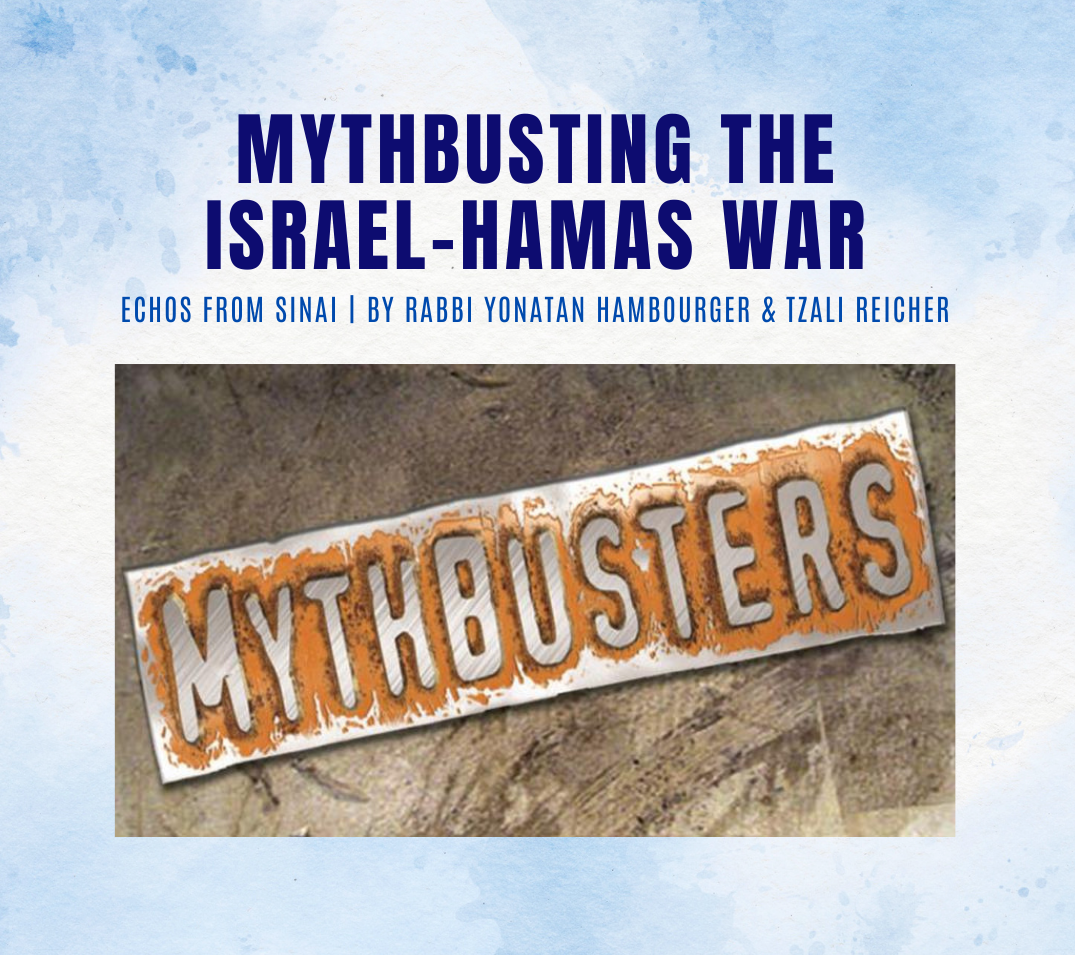
Mythbusting the Israel-Hamas War
By Yonatan Hambourger and Tzali Reicher
Myth 1: Israel exists on the land of the State of Palestine.
There has never been an independent state of Palestine that the Jewish people usurped.
Israel, the scientifically and biblically undisputed ancestral homeland of the Jewish people until their violent exile 2,000 years ago, was occupied by the Ottomans and British for 500 years before the re-establishment of the State of Israel in 1948. During this time the land was continually inhabited by indigenous Jews who weren’t exiled, and various disjointed clans of Arabs hailing originally from Egypt and Transjordan, who never claimed any state-like ownership or historical relationship to the land.
Once Israel agreed to the United Nations partition plan of 1947 and accepted a sliver of their ancient land for a state, five neighboring Arab countries launched a war one day after Israel’s rebirth in May of 1948. Miraculously, Israel won the battle, but lost East Jerusalem, the West Bank and Gaza to the marauding invaders for the ensuing 19 years.
For those nearly two decades under Jordanian and Egyptian control, there were no calls for an independent state of Palestine in the region, yet as soon as Israel regained access to the historically Jewish areas during the Six-Day War of 1967, the cause of Palestinian nationalism was reborn, with the genocidal rallying cry “from the (Jordan) river to the (Mediterranean) sea, Palestine will be free;” in other words, no Israel anywhere.
Despite all the disinformation spread in the five decades since, there has never been a State of Palestine with any government or history on the land of Israel. Instead, the history of Palestine is a legacy of the ancient and brutal colonization Roman perpetuated on Israel millennia ago, that has been misappropriated by many who wish to do the same today.
Myth 2: Israel is an apartheid state.
Israel is a democratic country with Palestinian and Israeli-Arab members of parliament, Arab justices on the Supreme Court, a judicial system that charges those convicted of crimes regardless of faith or station, and the high quality of life and income for all Arabs (especially when compared to neighboring countries). Israel cannot be called an apartheid state. Those who do because of the measures Israel is forced to employ to protect its civilians from terrorist activity are peddling misinformation, and a disservice to those that truly suffered under real apartheid regimes.
Myth 3: Israel occupies Gaza.
There is no territorial dispute between Gaza and Israel and the borders are recognized by the U.N. Israel unilaterally and completely withdrew not only its military presence from Gaza in 2005, but the thousands of Jewish people that lived there as well, to give the Palestinians the opportunity to self-govern and grow a society for themselves. But the citizens of Gaza promptly elected Hamas which proceeded to embed tens of thousands of missile launching pads and military installations within highly concentrated urban areas and cynically used its own citizens as human shields for thousands of rockets and terror attacks into Israel for the next 18 years.
October 7 proved why Israel needs to maintain air and maritime control of Gaza, to ensure even more weapons and tools to attack Israel aren’t smuggled into the trigger-happy arms of Hamas. But even as Israel faces calls that this is still an occupation (it's not), no one bothers to call out or expect any assistance from Egypt, who maintains a much more hardline stance against the Palestinian people along their own shared border.
Myth 4: Gaza is the most densely populated area on Earth, and an open-air concentration camp.
Encouraged by extremist leaders and facilitated by massive United Nations funding, millions of Palestinians have been incentivized to adopt refugee status, and live in overcrowded but permanent cities, mischaracterized as “refugee camps.”
Many generations live with each other, partly because of the density, but also for cultural reasons, while the wide boulevards, plentiful groceries, high-end luxury stores, and beautiful beach resorts that filled Gaza pre-war disprove the notion that Gaza was ever anything remotely comparable to a concentration camp.
Additionally, Palestinians have an average life expectancy of 75 years, tenth out of 22 Arab countries, with the third lowest infant mortality rate in the Arab world, highlighting its high level of health care. Palestine was named the third happiest Arab country and the 30th happiest in the world in a recent survey and is one of the largest recipients of international aid in the world. All this data significantly undermines the shallow and uninformed talking points many employ when discussing this conflict.
Myth 5: Israel is withholding aid, starving Gaza, and indiscriminately bombing civilians.
Never has any country in history, when defending its land after an invasion and massacre, provided its enemy's population with food and resources. Never before has a country routinely worked and engaged with a hostile enemy, warning them where they were going to attack and when, to ensure minimal civilian harm.
Hundreds of trucks flood into Gaza every day, supplying food and aid to a population that participated in Hamas’s brutal assault in Israel, all facilitated by the very same country they attacked. While claiming for months that famine is looming, the price of food in Gaza has dropped faster than a rock, as supply far outpaces demand. Israel has lost over 500 soldiers in this war, as they proceed house by house in Gaza to eliminate Hamas terrorists, rather than indiscriminately harnessing its world leading air force to strike Hamas without any danger to Israeli lives.
Feel free to share any misconceptions you’ve heard about Israel, Palestine, and the ongoing war, and we’ll look to address those in upcoming weeks! You can reach us at y@tasteoftorah.org. We love your feedback!
Yonatan Hambourger is a rabbi with Chabad of Georgia. Tzali Reicher is a rabbi and writer currently based in Florida.
April 4, 2024
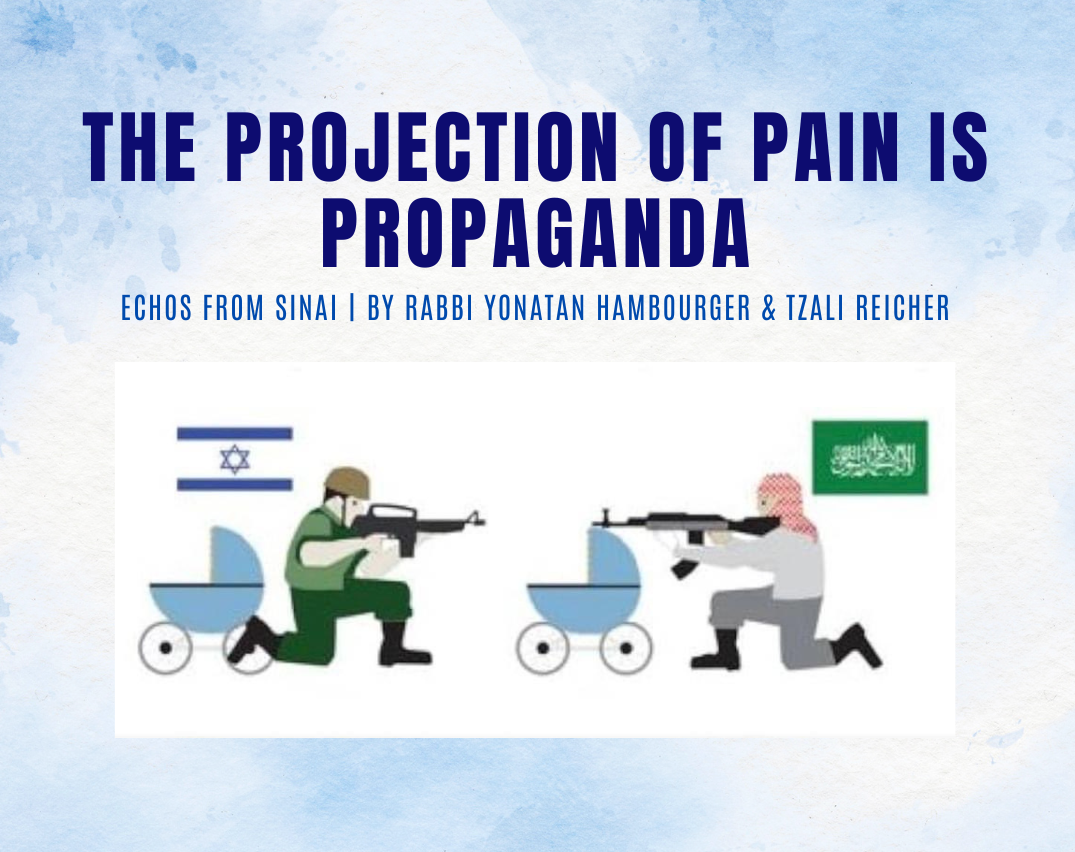
The Projection of Pain is Propaganda
By Yonatan Hambourger and Tzali Reicher
As Israel’s effort to uproot the Hamas terror organization, an Iranian proxy, from Gaza continues into its sixth month, the battle for public and world opinion rages online and in the media, with both sides vying for the moral high ground and international support.
For the most part, Hamas’s plan to paint Israel as an indiscriminate aggressor seems to be working, most recently aided by the tragic incident during which a number of international humanitarian aid workers were killed. Despite Hamas’s repeated rejection of negotiated ceasefires and mutually agreeable solutions that Israel agrees to, still Israel is facing condemnation and calls to bend over backwards to accommodate the whims of an irrational terrorist death cult that still holds hundreds of innocent hostages.
Despite facing a mountain of pressure, Israel remains undeterred. While the current administration of the United States waffles in its public support of our most dependable ally in the region because of domestic political concerns, there is broad consensus in Israel of what needs to happen next. An operation in Rafah-Hamas’s last stronghold-will take place, in order to get rid of the genocidal threat on the borders in a way that no diplomatic solution can accomplish, and seek to rescue the hostages, including several American citizens. Israel will inevitably face backlash from countries inexplicably sympathetic to Hamas terrorists, yet it is a burden Israel will work through because sometimes, the right thing to do remains the right thing to do, despite what all the people who have morally twisted their thinking to the opposite position yell and scream.
However, there is one charge that cuts Israel, and by extension world Jewry, more than any other: the claim that Israel is committing genocide and ‘a Holocaust’ on Palestinians.
Living in the modern world that we live in, when we can viscerally experience war on our phones from the comfort of our own homes thousands of miles away, reasonable people witnessing what is happening in Gaza because of Hamas’s homicidal use of human shields and civilian infrastructure are deeply affected by the graphic images they see on their screens and baselessly, carelessly and, most importantly, harmfully, express their outrage by throwing around terms and historical comparisons that do not make sense and are belied by the evidence.
The genocide and Holocaust comparisons have been made by many public figures and online commentators, including the generally interesting Joe Rogan, who called Israel’s war in Gaza a small scale Holocaust on a recent podcast episode, and more pernicious actors like the antisemitic UN Special Rapporteur (Appointee) on Occupied Palestinian Territories Francesca Albanese, who issued a report titled “Anatomy of a Genocide,” concluding that there are “reasonable grounds to believe” that the threshold indicating the commission of the crime of genocide has been met.
There has been one Holocaust in history and is the one that Germany perpetrated on the Jewish people just 79 years ago. There have been many genocides and massacres in history, most notably and recently in Rwanda, Sudan, and the Uyghurs in China. When compared to actual historical equivalents, Israel’s current operation against Hamas is self-evidently not a genocidal campaign, but a tragic necessary and defensive war, that many do not understand because of the peaceful and prosperous society we’ve been blessed to live for the past seven decades, guaranteed by the valiant and brave efforts of the Allies who fought to defend those right in World War II.
Those offended at the images of the war or those who are already predisposed to think about Israel negatively ignore all the evidence of Israel’s historically unprecedented work to minimize civilian casualties (recognizing tragic and deeply regrettable accidents have happened in the fog of war) and target only the terrorist actors destabilizing the region.
Those who perpetrate genocides systematically work to wipe out civilian populations, like the Khmer Rouge regime led by Pol Pot committed against the Cambodian people. They disappear millions of innocent men, women, and children, like Stalin’s Russia and Xi’s treatment of the Uyghurs. They seek to starve their victims of food and resources and break them down through terror with indiscriminate attacks. Quite clearly, Israel has done none of that: Israel’s incredible civilian to terrorist target ratio-despite the dense environment they have been forced to operate in-has set a new standard for urban warfare, that no other country has come close to living up to. Israel’s legal system ensures those convicted of terror related offenses are imprisoned, and even get to benefit from all prison services (including Yahya Sinwar, who was educated and had lifesaving medical treatment in an Israeli jail), while the majority of Palestinians and Israeli Arabs live in peace. And for a country supposedly seeking out to erase a people, Israel has been surprisingly diligent in its efforts to inform the population where it is attacking and when, even sharing escape routes and aid, to avoid unnecessarily harming civilians, for the first time in the history of modern warfare.
Instead, those smearing Israel with these horrific charges are misinformed and falling for propaganda, or purposefully spreading misinformation. When asked for proof for her contention that Israel is committing genocide on the Palestinian people, Albanese arrogantly and sarcastically retorted that no evil government ever writes down their strategy to explain why there is no proof how Israel’s war meets her absurd contention, ignoring actual genocidal regimes that did have a paper record laying out their horrific intent (see the Wannsee Conference).
Hijacking the Jewish people’s tragic history and experiences and misappropriating it for those who dream of perpetrating yet another genocide against the Jews is deeply hurtful and offensive. It is a way for those that seek to tar Israel to redirect blame from the perpetrators of the October 7 massacres, rapes, and kidnappings, onto a people they hate for one simple reason: the fact they are Jews. It is a deliberate and calculated attempt to dehumanize and delegitimize the Jewish experience, turning victims into aggressors through a dangerous and manipulative narrative, and too many are falling for it and spreading it further. By doing so, these individuals not only insult the memory of the actual victims of genocide by tying them in with bloodthirsty terrorists but cheapen and strip a powerful word and historical events of meaning and significance.
In this battle of good versus evil, all the information and supporting evidence of the party in the right and the party in the wrong is available for all to see. It’s incumbent on us to inform ourselves of the facts before commenting about a conflict thousands of miles away, that is felt deeply by those here at home.
Yonatan Hambourger is a rabbi with Chabad of Rural Georgia. Tzali Reicher is a rabbi and writer currently living in Florida.
March 28, 2024
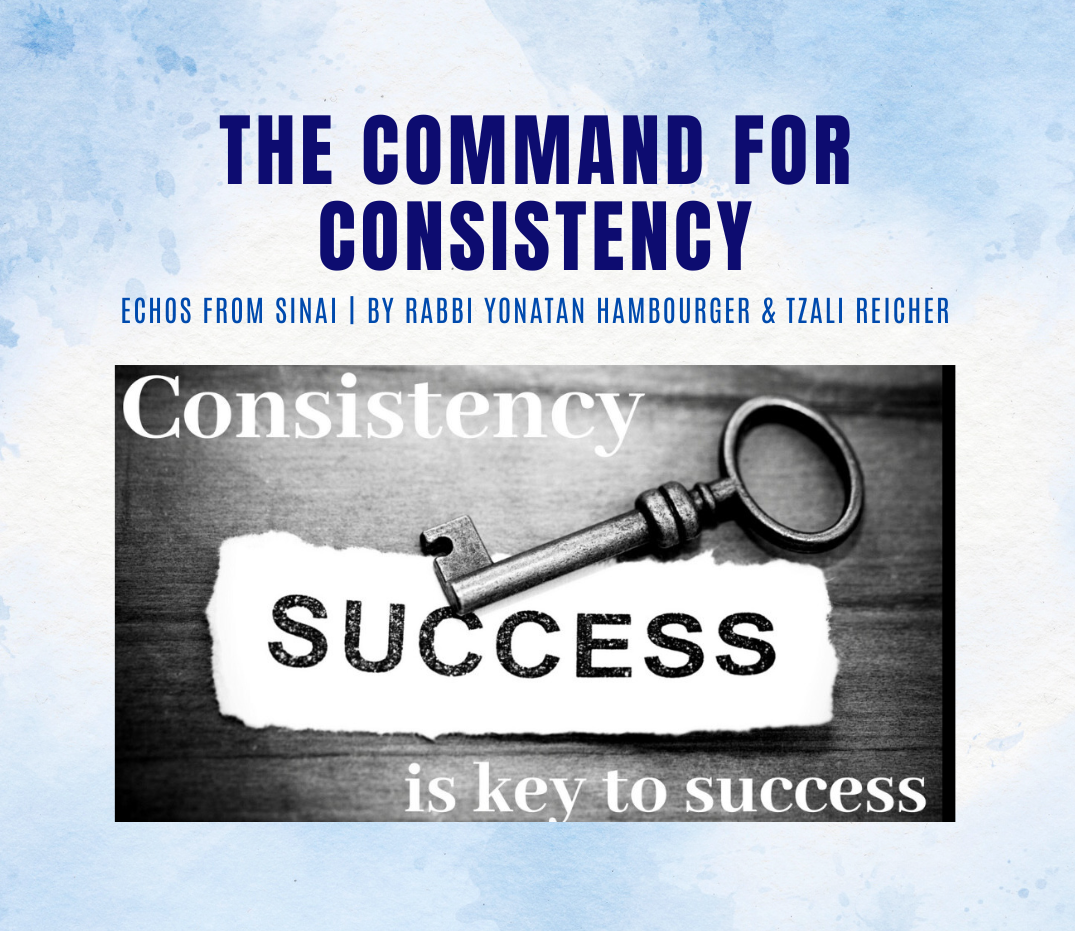
The Command for Consistency
By Yonatan Hambourger and Tzali Reicher
There is a common misconception about the Old Testament that is worth debunking.
Conventional wisdom and people with only a surface knowledge of scripture tend to fall on shallow adjectives when attempting to describe G-d as portrayed in the Hebrew scriptures, describing the Lord as dark, vengeful, and vindictive, and constantly clashing with the Jewish people. But aside from being objectively incorrect, this synopsis doesn’t capture the undying love, connection and warmth G-d is explicitly said to have for His people.
That is why it is so jarring to read the opening verses of this week’s Torah portion (Leviticus 6.2), where G-d tells Moses to “command” the priests to offer the twice-daily sacrifices in the Tabernacle. When introducing a mitzvah (commandment), typically the verse uses the words “speak”, “say”, or “tell’ the Jewish people about what G-d wishes for them to do, using considerably softer language than the infrequently invoked “command”. Rashi, the most prominent commentator of the Torah, goes on to explain that the word “command” is used here because this mitzvah must be performed daily, and therefore needed extra emphasis from G-d to encourage the people to perform it regularly and to signal its importance.
When there is a unique and exciting opportunity to do a good thing, it’s easy to summon the energy to perform it with little instruction. It’s easy to go to our places of worship once a year on special occasions, donate our time or money irregularly, and visit our elderly relatives briefly when we just happen to be in town. Doing the right thing is harder when it’s expected to be done regularly. Indeed, it is difficult to commit to attending daily or weekly opportunities to connect to G-d together in community, setting auto-payments to charities and devoting weekly times to volunteer and spend time with people who could really use the company.
That is why G-d places the emphasis of a divine ‘command’ on a regular practice, instead of on the unique services of different holidays or the like: We must be careful to not let our regular acts of service become rote and robotic, Instead, we should enliven these actions, imbuing them with the vibrancy and enthusiasm we typically sum up for special occasions, because G-d seeks to foster a relationship with us through consistent expressions of engagement. This is reinforced by the seemingly regular mitzvah G-d is commanding the Jewish people to perform here: Placing a sacrifice on the fire that should burn constantly. Fire signals passion and excitement, which is how we need to approach even every day, mundane events, and good deeds.
In understanding the depth of the "command" for consistency in our daily observances and actions, it becomes evident that this principle extends far beyond religious rites to encompass the very essence of our daily lives. The practice of turning the mundane into moments of significance teaches us the power of transformation - the ability to elevate our routine tasks, interactions, and commitments to a level where they become sources of joy, growth, and profound connection. This lesson from the Torah portion is not just about religious observance but about how we approach every aspect of our existence, turning the ordinary into extraordinary through consistent effort and dedication.
This is true of relationships between people, and in the realm of working to build good habits. If a couple only discusses their relationship or show each other appreciation or affection on birthdays and anniversaries, they will drift apart. If someone working towards succeeding in their chosen profession only puts in the hours sparingly, failure is inevitable. Only by putting all of ourselves in everything we do, truly applying ourselves to make every day fresh and exciting, will we be able to thrive in whatever we drive ourselves to achieve.
G-d is teaching us an important lesson when He commanded the priests to perform a seemingly easy and frequent act of service with excitement. Consistently doing good deeds and everyday acts of kindness with passion becomes a powerful tool for personal and communal transformation, guiding us towards a deeper, more meaningful engagement with our faith, our relationships, and the world at large. It is in the faithful execution of our positive daily duties and responsibilities that we find the true expression of our highest and best selves and the fullest realization of our potential to succeed and make a difference.
Yonatan Hambourger is a rabbi with Chabad of Rural Georgia. Tzali Reicher is a rabbi and writer based in Florida.
March 21, 2024
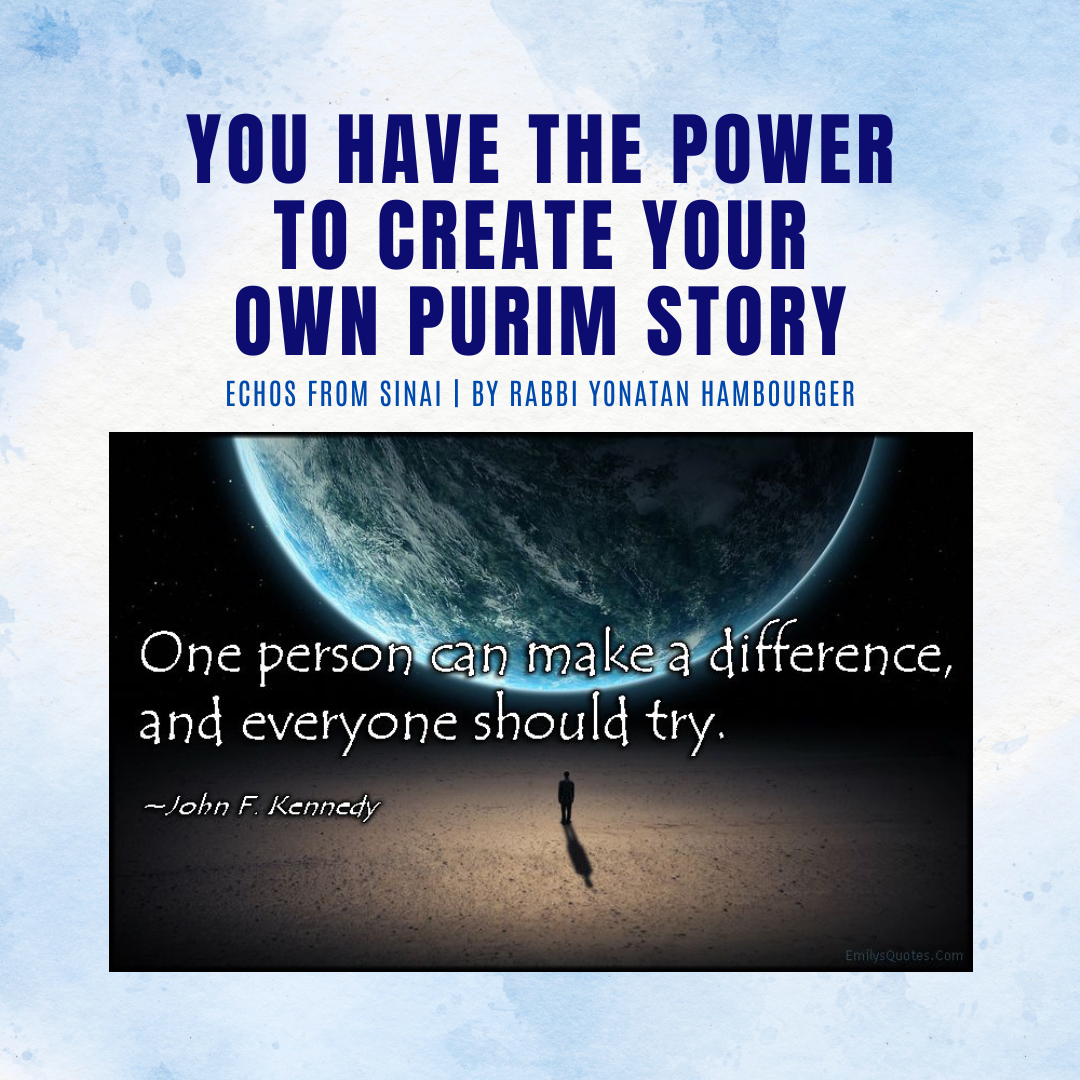
You Have the Power to Create Your Own Purim Story
By Yonatan Hambourger and Tzali Reicher
Purim, the Jewish holiday celebrated this year from Saturday evening till sundown Sunday, is unique in its emphasis on joy.
Indeed, while the Torah instructs us to be joyful during several festivals, none have the same level of emphasis as those commandments (mitzvahs) and rituals expressly instituted for this purpose as does Purim. There is the command to read the story of the original Purim, when Mordechai and Queen Esther saved the Jewish people from total extermination at the hands of the evil vice chancellor Haman and the bumbling King Ahasuerus, to demonstrate how G-d delivered the Jewish people from their enemies then and now. There is the custom to have a joyous meal with wine, revelry and dress up in costumes, and a focus on sharing gifts and charity with friends and those less fortunate to ensure they too can celebrate the festival with the same joy.
At face value, the reason for such celebrations is obvious. Just under seven decades after destruction of the First Temple and forced exile from their homeland of Israel, the Jewish people once again faced destruction by a people driven by an irrational hatred towards them and were miraculously saved in an incredible series of events.
Of course, that is worth celebrating, and there are many lessons from this story that can be applied nowadays. There is the fact that Jews are being persecuted and scapegoated around the world amidst a historic rise in antisemitism, yet like Mordechai and the Jewish people of his day, we remain proud and unbowed. Like Haman’s opportunistic followers in Ancient Persia, just several months ago (and many times in preceding decades and centuries) a people rose up seeking to destroy and kill as many Jews as they possibly could, yet Israel is fighting back and slowly rebuilding, their spirit intact and alive.
But perhaps an understated lesson of Purim is one that is universal in its application, and a reason we can all celebrate and use as fuel to inspire us all. The Book of Esther, wherein the story of Purim is told, is exceptionally detailed and narrative oriented, far more than any other book in the Old Testament. When reading it, one finds themselves in the corridors of power and great dining halls in the court of the king. The reader feels Mordechai’s anguish and witnesses his attempts to save the Jewish people. We are inside Haman’s family home as he schemes and plots, and we are a fly on the wall when he finally gets his comeuppance as Queen Esther reveals her Jewish identity to the king and tells him ofHaman’s machinations.
Throughout it all, we see the courage of the individual standing up and jostling to affect change, both for better and for worse.
The king starts off as an antagonist of the Jewish people, throwing a party to celebrate the destruction of the Holy Temple and the Jewish kingdom in Israel, and ends up as an ally who ultimately helps the Jewish people return to Israel facilitating the rebirth of the Jewish Kingdom, and the rebuilding of the Second Holy Temple in Jerusalem. Haman, the brilliant and twisted advisor to the king, is single handedly able to subvert policy to legally purge the Jewish people from the king’s global empire, only to be foiled by the relentless efforts of Mordechai and Queen Esther, who has tremendous courage and self-sacrifice to enter the lions’ den and reveal her true identity, at the risk of infuriating the king and endangering her life.
None of these people let themselves be dictated by the status quo; they all embraced their individual agency and power to change what others would have assumed was a foregone conclusion and beyond their capability to change or affect. Haman used that power for evil, while Mordechai and Queen Esther embraced it for good, and are celebrated for that till this day.
Today, at a time when more and more people feel powerless and caught up in the rat race with nopower and agency, Purim reminds us that we each have the ability to take control and break the myth of status-quo. Our identities are not as political pawns for politicians or as worker bees for faceless corporations, rather we are valuable members of our communities and families who have so much to contribute to enhance society. There is no time like the present to stop scrolling on social media about what everyone else is doing and self-actualize the change you want for yourself. Whether that’s by beginning a family, turning that side gig into a business, or volunteering your time to help your community- grab the G-d given opportunities and talents you have been blessed with and manifest them into reality.
It’s been a proven formula for success, from the times of the Purim story to the founding of our great nation, and up to this very day: individuals make a difference and have the power to change history. You are that individual, and that is worth celebrating.
Yonatan Hambourger is a rabbi with Chabad of Rural Georgia. Tzali Reicher is a rabbi andwriter currently living in Florida.
March 14, 2023

What A Palestinian State Will Look Like
By Yonatan Hambourger
As the war between Israel and Hamas continues into its sixth month and many around the world are looking to find a way to put it to an end, the chatter around recognizing a Palestinian state as an exit ramp is getting louder and louder. News outlets in the United States and the United Kingdom, traditionally seen as Israel's staunchest allies, have discussed supposed plans in their respective State Departments to push forward with timelines and announcements for establishing a state for the Palestinian people, much to Israel’s chagrin and consternation.
The case of those that call for a Palestinian state is obvious: Give the people a state to call their own, along with the dignity to control their own security and civil administration, and peace will be upon the land. It is Israel’s reasons for opposing this that are completely unrepresented (or when addressed, misrepresented) by government and media types.
For starters, the founding story of a country significantly shapes its culture and identity for generations. In the United States, the timeless story of the courageous Founding Fathers rebelling against a distant imperial monarchy to establish a democracy for the people by the people resonates deeply and is often celebrated. Similarly, Israel's origin story is the story of a decimated Jewish people rising from the devastating genocide of six million of their people and returning to their ancient homeland after 2,000 years of continuous colonial rule. In both cases, there are heroic and admirable arcs and protagonists that are worthy of being celebrated as the patriarchs of our nations.
For a Palestinian state, rewarding its history of fanaticism and terrorism would be shameful, and the lessons and incentives it teaches are perverse. If the world were to recognize a state now, it would be as a direct result and reward of the brutal assault Hamas unleashed on Israel on October 7th, where they raped, kidnapped, looted, and murdered their way into a war they couldn’t win, and then rewarding their terrorism with an outcome beyond their expectations. October 7th, the worst single day in Jewish history since the Holocaust, would be celebrated as Independence Day, and its terrorist perpetrators would be forever honored as the nascent state’s Founding Fathers. Civilized societies can’t allow a state to be born through terrorism and expect to be rewarded with a friendly and peaceful country in return, with a healthy culture and admirable heroes.
Then there are Israel's security concerns to consider. There is no evidence to suggest a recognized Palestinian state wouldn’t turn into what Gaza became after Israel withdrew its entire civilian population and armed forces in 2005: a vassal state for enemy regimes and launching pad for thousands of rocket and terrorist attacks that have killed thousands of Israeli civilians over the decades. The only reason more civilians haven’t been harmed, that would have forced Israel into this war much earlier, is because of the miracle of Israel’s Iron Dome system.
The balance of world security would also be affected by recognizing a Palestinian state. There seems to be an assumption that a new Palestinian state would be allied with the United States and our interests, united in the common causes of freedom and democracy, but there’s no reason to believe that is true. Sure, the Palestinians talk to us because the United States is the most powerful country in the world and gives Palestinians plenty of money for their indulgence, but their culture is much more in line with that of Russia, China and Iran. What’s not to say that as soon as they’re handed a state, they won’t sign security agreements with these belligerent and aggressive countries, who will threaten World War III when Israel is inevitably forced to respond to terrorism?
And finally, there is the question of who will run this state. The United States accepts Israel’s demands that Hamas must be dismantled, but our government’s favored party to lead the new country is the Palestinian Authority, who is already making noises about simply folding Hamas into their organization and claiming it has been eradicated. PA President Mahmoud Abbas, now a frail 90-year-old authoritarian in the 21st year of what was supposed to be a 4-year term, is already just a dictatorial figurehead, and it's reasonable to expect a Palestinian state would adopt the model of its patron states, where the real power is in the hands of a mysterious council who rule by fiat. There are no Arab democracies in the world; there is no reason to think Palestine would be the first, just because we want it to be so. Despite utopian hopes and pronouncements, a Palestinian state would not be a thriving liberal democracy with a religious bent in a vein similar to Israel. It would continue to be Judenrein while subjugating and intimidating its Christian minority, and a repressive authoritarian theocracy that aggressively punishes those that don't follow their twisted version of Islam.
In reality, it’s much more likely that the situation on the ground would remain exactly the same: the ‘government’ will continue to be led by extremists and fanatics who remain in power despite overt corruption and stealing foreign aid money, while Israel is expected to continue providing essential services for the population or risk international condemnation. The United Nations would continue operating in the area with a massive budget donated by kind countries, as the leaders continue getting fat from their people’s pain.
Knowing all this, we can confidently say now is not the time for a Palestinian state. There are many things that need to happen prior, and it shouldn’t be considered until Israel’s mission of dismantling Hamas, deradicalizing the population, and removing corrupt and extreme figures of influence from operating in the region (including UNRWA and our supposed allies in the apparently-moderate-yet-still-Holocaust-denying Palestinian Authority) is complete.
Our leaders must not chase short-term political gamesmanship in an election year to ram through ill-advised policies that will affect a region thousands of miles away for generations to come. Summarily recognizing a State of Palestine- before ensuring it would be a viable and valuable addition to the international community-is not a quick or peaceful solution to a deeper and more ancient conflict of religion that existed for millennia before Israel’s founding in 1948.
Because for them, having a State of Palestine is not enough. It will never be enough. Until the world recognizes the problem was never that there wasn’t a state for Palestinians, but that there exists a state for the Jewish people at all, this is how it will always be, until this seed of hatred and extremism is forever eliminated. G-d should bless our leaders with the gift of foresight, the courage to support our ally’s fighting terrorism and hatred, and the wisdom to navigate decisions that may affect the world for centuries to come.
Yonatan Hambourger is a rabbi with Chabad of Rural Georgia.
March 7, 2024

It Takes a Village to Make A Country
By Yonatan Hambourger and Tzali Reicher
Once a year, sometime in the mid-winter months, Jewish people have a unique ritual we perform during Sabbath services: We take out a second Torah scroll, in addition to the one already used for the regular weekly reading, and read out loud a five verse excerpt from the book of Exodus (30:11-16) which discusses the contribution each Jewish person had to make to the Tabernacle as it was being assembled as a temporary divine dwelling for the 40 years the Jews were to remain in the desert. The Torah states that every person must give half a shekel to the collection, regardless of their station and net worth.
This ceremony was performed this past Shabbat, and immediately I was struck by a question: Why are we reading this additional portion with such aplomb? Afterall, a second Torah scroll is only used during services a select few times a year- why is reading about an ancient fundraising effort worthy of this unique honor?
The significance of this event and why it is still commemorated today can be found in the very text: “...a half shekel shall be the offering of Gd. The rich shall not give more, and the poor shall not give less than, half a shekel.”
In the eyes of G-d, we are all equal. There is no difference between the wealthy business tycoon whose influence spreads far and wide, and the humble day-laborer who works hard to scrape by and provide for his family. The Rebbe, Rabbi Menachem M. Schneerson, of righteous memory, the most influential rabbi in modern history, taught that while people differ in their intellect, character, abilities and sensitivities, all are equal in the very basis of their bond with Gd and in the relationship they share with all of us.
So, while every person has unique means and talents that they can (and should) harness to connect even more to G-d, when building the Tabernacle itself-a home for G-d and the place through which He would connect with the Jewish people--its foundation had to come from everyone equally, exactly how G-d created us.
This message is reinforced by the very specific amount of money everyone was asked to donate: half a shekel. This was to show that it takes a half to make a whole, and the half that the pauper donated made the same whole shekel when combined with the half of a rich person, as it would have been if the wealthier man had donated it himself.
This powerful lesson resonates today and applies to much more than just the building of an ancient structure.
Too often, we find ourselves untethered from our communities and peers by virtue of our unique circumstances and stand alone because we feel others can’t relate to our personal situations. The elite can’t relate to the working class, the partying bachelor can’t connect with the mother of four toddlers, and the atheist may not be able to stand the spiritually-in-touch person. Feeling alienated, people tend to withdraw more into their own bubble, and lose touch with the people living around them.
This phenomenon of division and separation has only deepened as the political and cultural divide has grown into a partisan chasm, and many have more militant positions on different topics we didn’t think about or concern ourselves with just a decade ago. The religious conservative feels he has nothing in common with the secular liberal (and vice versa), and this cultural malaise and rot we’re seeing rise from our young people up to older generations only festers as both sides become more and more intransigent and stuck in their inflexible positions.
In this moment, it’s important to remind ourselves about what is important and what binds us together:
We are privileged to be living in the United States of America, a miraculous republic that has blossomed and thrived to become the most impressive country in human history in just 250 years, together. All of us, regardless of political persuasion or personal status, contribute and make up the foundation of this country, what makes America the America that millions around the world look up to in awe and envy.
It behooves us to remember we’re equal in the eyes of G-d, and both sides of the red and blue debate represent only half of this great nation. Our founding fathers knew this and thus gave us the motto, “E Pluribus Unum” on July 4th, 1776! For only together do we achieve, “out of many, one”, and get the United States of America.
Rabbi Yonatan Hambourger is a rabbi with Chabad of Rural Georgia. Tzali Reicher is a rabbi and writer currently living in Florida.
February 29, 2024
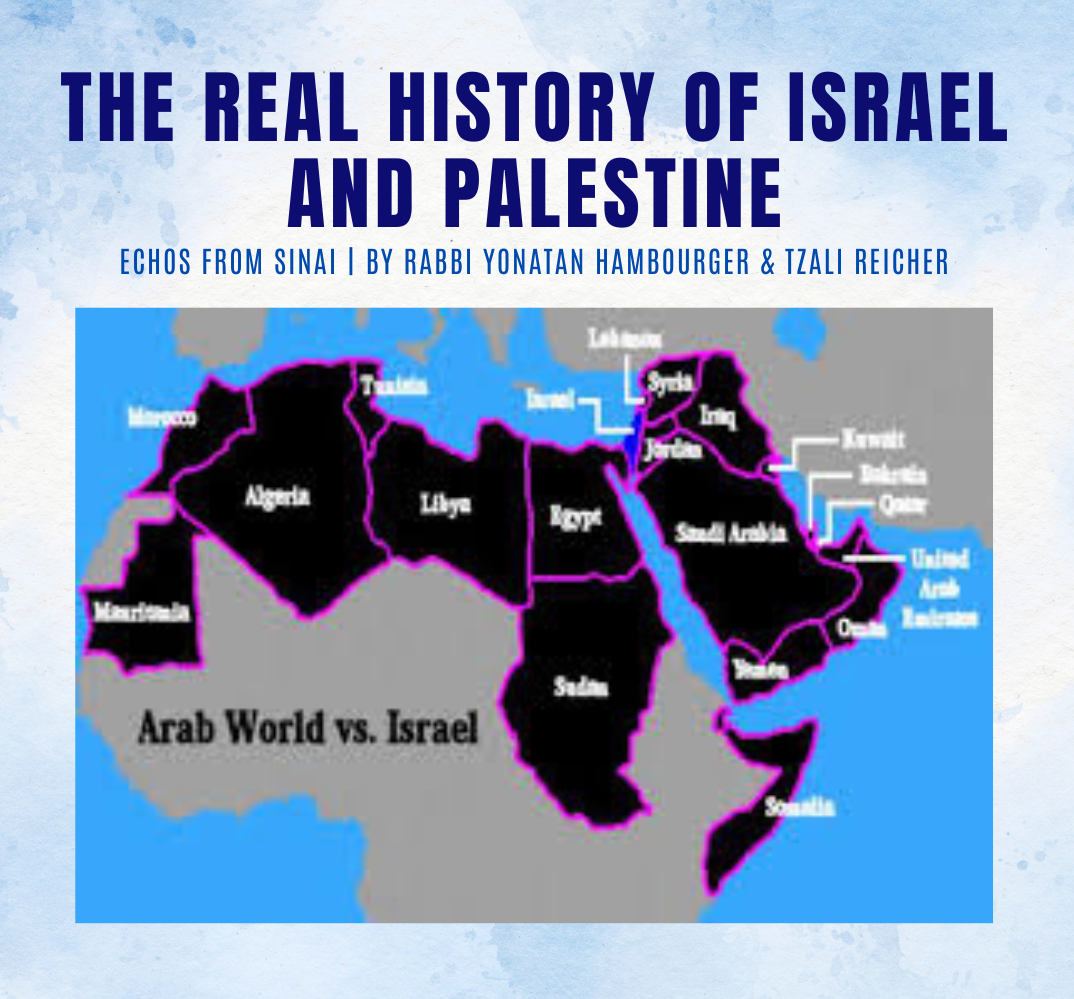
The Real History of Israel and Palestine
By Yonatan Hambourger and Tzali Reicher
When people speak about the Israel-Palestinian conflict, the conversation tends to fall into familiar tropes: Israel was a freebie given to the Jews as an apology for the Holocaust, the Jewish people’s only claim to Israel is in a supposedly mythical Bible, Palestine was a state before they were colonized by the British who shipped usurping Jews in, and there was no tension between Jews and Arabs before the Balfour Declaration in 1917 or the establishment of the State of Israel in 1948.
All of this is incorrect, and something that requires more education and widespread knowledge to correct the record and counter the prevailing narratives dominating the discourse today.
The Jewish people are indigenous to the land of Israel. There has been a continuous Jewish presence in the Holy Land from time immemorial. The Jewish people’s first association is mentioned in the Bible when God commands Abraham to go to Cannan for the first time, and Abraham proceeds to buy land from the ancient (now non-existent) people of his time. He expands his brood that will grow to be the Jewish people in places and cities that still exist today, and prove the Jewish connection to the land since their inception as a nation in 1855 B.C.E., around 2,500 years before the founding of Islam.
Throughout the Bible, as verified by the archaeological sites uncovered in Israel, the Jewish people lived there and survived various exiles and displacements to return with Joshua around 1400 B.C.E. For the next millennium, the Jews were primarily based in Israel, and served G-d first with the Tabernacle in the still existent town of Shiloh and then in the two Temples in Jerusalem on the now Temple Mount. They had many rulers and leaders in this period, including David, Solomon, Saul and Samuel, and relics of that time have been dug up to enlighten us about that era over recent decades. Jesus himself was born towards the end of this time period, about 600 years before Islam was founded.
After the destruction of the Temples in the Babylonian and then Roman times of global dominance, Jewish independent sovereignty was lost from 70 Common Era (C.E.) till 1948: just 75 years ago. Despite their right to self-determination taken from them, Jews maintained a consistent presence in their homeland despite the ensuing parade of invaders of the next centuries, beginning with the Romans. The Romans imposed a colonial state (approx. 70 CE- 324 CE) on the Jewish people and renamed the area Syria-Palaestina, and eventually many Jews were killed, sold into slavery and exiled.
While the Jewish people were forcibly dispersed across the world, many of them stayed in their land until the height of the Byzantine period (324–638), when a majority were massacred or forced to flee. However, a tenacious group hid and continued the active Jewish people's presence in Israel.
The Prophet Muhammed was born in 570 CE and established Islam, through which various factions and adherents invaded Israel annd remained until 1099 CE. Then came the Crusaders who invaded and overthrew the Muslims until they themselves were unseated in 1291 by Saladin, till the Ottomans conquered the land from 1517-1917.
In 1917, the British Mandate of Palestine occupied Israel following the defeat of the Ottoman Empire in WWI, and issued the Balfour Declaration supporting a Jewish homeland in the region, righting a historic wrong. That dream was fulfilled when the modern State of Israel was re-established in Israel in 1948- a true modern day miracle.
The history of the supposed state of Palestine is considerably shorter. In 1967, after Israel regained control over Jerusalem and the West Bank from Jordan in a defensive war where they beat back five invading armies, the flag and rhetoric of the just three year old Palestinian Liberation Organization-then a recognized terror organization- was adopted, calling for the destruction of Israel and creation of a state bearing the name which Roman and subsequent colonizers had bestowed on it-Palestine- because they had no history of their own there.
Recognizing the reality of the situation and the need to share a small country with a people who had settled there, Israel has advanced peace talks at many times throughout its history to enable the two-state solution, yet have always been rebuffed by Palestinian leaders who refuse to accept a Jewish state, and will try again and again to wish it away through violence and terrorism. Notably Israel unilaterally withdrew from Gaza in 2005 which it had captured from Egypt in 1967. In exchange for its magnanimity, all it got in return was tens of thousands of missiles leading to October 7th.
Israel was not a random country handed to the Jewish people in sympathy after the Holocaust. There was never an independent nation or state of Palestine in history with its own unique identity, currency or leaders that the Jewish people usurped, until one was invented to counter Israel’s establishment and historical claims to the land. The laughable claims that Jews were safe in Muslim lands until the founding of Israel is contradicted by years of Arab massacres on Jewish people for centuries beforehand. Israel doesn't exist because of the Balfour Declaration and isn’t a British colony or a nation of European settlers because the Jewish people are indigenous to the land and have returned home to stay.
History, archeology and most importantly truth testify to Israel’s indisputable right to their own homeland, the only Jewish state in a world with 22 Arab countries and 49 Islamic majority countries, a tiny strip of less than 11 thousand kilometers while the Arab countries comprise 13 million kilometers.
It’s time for the world to get educated and stand on the right side of history against the tidal wave of misinformation and antisemitism that we are witnessing today. The Jewish people have a land of their own, and it's here to stay.
Yonatan Hambourger is a rabbi with Chabad of Rural Georgia. Tzali Reicher is a rabbi and writer currently living in Florida.
February 22, 2024

The Presidents and Me
By Yonatan Hambourger and Tzali Reicher
As an American rabbi, the relationship between our leaders and the Jewish community have always held a personal fascination for me, and the recent observance of Presidents’ Day provided a valuable opportunity for contemplation and indulgence to this area of interest. It was particularly interesting to look into the history and lessons that we can glean with 250 years of history behind us.
From the inception of the United States with George Washington, the early presidents were generally devout and religious, maintaining a mutual respect for the Jewish community. John Adams eloquently wrote to Thomas Jefferson, "I will insist that the Hebrews have done more to civilize man than any other nation." Subsequent presidents such as John Q. Adams, Abraham Lincoln, Teddy Roosevelt, Woodrow Wilson, and Warren G. Harding expressed their aspirations for the Jewish people to reestablish a formal state in their homeland of Israel.
Notably, Millard Fillmore and Martin Van Buren denounced anti-Semitic attacks and discrimination, while Rutherford B. Hayes displayed a unique gesture of solidarity for his day by attending a Passover seder with Jewish soldiers under his command. A seder is now celebrated annually in the White House. The only Jewish expulsion in American history occurred in 1862, orchestrated by then-Union General Ulysses S. Grant in parts of Tennessee, Mississippi, and Kentucky. Grant, however, sought to make amends for this regrettable incident during his presidency.
In more contemporary history, the president's relationships with the Jewish community have been more complicated.
Franklin D. Roosevelt’s legacy is hotly debated for his actions during the Holocaust. However, it is a fact that he played a pivotal role in leading the war effort against Nazism, regardless of his underlying motivations. Harry Truman, in a contrasting vein, recognized Israel's independence within 11 minutes of its declaration, yet his public remarks about Jewish people were occasionally derisive.
Despite the Kennedy family's historical association with Nazis, they proudly identified as Zionists, while Richard Nixon, despite personal animosity towards Jews, strategically supported Israel during the Yom Kippur War. Jimmy Carter's actions before and after his presidency offended many in the Jewish community; a situation partially remedied by Ronald Reagan's warm embrace of overt religiosity and Israel.
Subsequent administrations showed varying degrees of warmth towards America's primary ally in the region. Despite his much speculated ambivalence towards the Jewish state, George H.W. Bush facilitated the airlift of 14,325 Ethiopian Jews living in peril, to Israel in a 36-hour period. While Barack Obama maintained relatively cooler ties, Bill Clinton, George W. Bush, Donald Trump, and Joe Biden consistently fostered positive relationships with Israel and extended gestures to the Jewish community during their respective presidencies.
There are a few things we can see from the dynamics between America’s leaders and a small, albeit proud, faith group well represented in the United States.
The first is that even before the establishment of the modern State of Israel in 1948, the historical significance and importance of the Land of Israel to the Jewish faith was always understood and respected by the U.S. The Muslim faith has Mecca along with 49 Muslim countries and 22 Arab countries, while the Jewish people have but a sliver of land in the Middle East, smaller than New Jersey. While there has been a continual presence of Jews in Israel from time immemorial, they did not have self-rule for almost 2,000 years until their dream was realized, thanks in large part to U.S. support. What’s clear is how presidents practically dealt with Israel dictated their relationships with American Jewry for better and for worse. Yes, American Jews are proudly American, but there is always Israel in their hearts, because there are three basic pillars of Judaism from which all else springs: The G-d of Israel, the Torah of Israel, and the Land of Israel.
Another standout lesson is how lucky we all are that our leaders have remained true to the founding principles of this great country. Founded with a call for religious freedom and liberty to all, the United States has been a light onto the world, inspiring generations who have been attracted to promises and privileges afforded to those fortunate enough to live here. After centuries of persecution, the Jewish community in the United States is the largest outside of Israel, and a proud and important fabric in this amazing tapestry that connects all Americans, regardless of race, religion, or creed. It’s an honor American Jews do not take for granted.
Yonatan Hambourger is a rabbi with Chabad of Rural Georgia. Tzali Reicher is a rabbi and writer currently living in New York.
February 15, 2024

The War Needs a Real Resolution
By Yonatan Hambourger and Tzali Reicher
Last Sunday, over 120 million people tuned in to watch a captivating drama play out in a Las Vegas stadium. Two teams, coming off a grueling six-month season to make this final stage, duked it out in Super Bowl LVIII for the right to be called victors, in a heart stopping contest that wasn’t decided until the very last play. Ultimately, the team that embraced lessons from their past seasons, both winning and losing, and played till the final whistle, won.
At the exact same time, on a real battlefield in Gaza, a fraction of CBS’s audience watched something even more consequential unfold. In a daring and brave operation, a team of Israel Defense Force special forces went into Rafah, the last remaining Hamas stronghold in Gaza, and rescued two Jewish hostages abducted on October 7th, right under the noses of the terrorists guarding them in captivity.
Rafah may sound familiar to some readers following the ongoing Israel-Hamas war. It’s the city where thousands of Hamas militants are suspected of being embedded in the civilian population that fled there after Israel began operating in Gaza following the Hamas massacre in October. In what can only be described as a capitulation to terrorism, several leading political figures have announced that Israel must not enter Rafah, amongst them Alexandria Ocasio-Cortez saying going into Rafah is not war, but “an outright attack on the innocent”. Even President Joe Biden, who until recently was supportive of Israel protecting itself from the genocidal terror organization on its borders, has come out much more forcefully against Israel’s announced moves into the city.
Even if Israel hadn’t demonstrated the need for an incursion into Rafah hours after Biden’s statement through the successful rescue of innocent Israeli hostages, there is no historical precedent for what many are asking Israel to do: stop a war they are clearly winning and have the moral high ground in, and just give it up for nothing in return.
Finishing the enemy that began a fight is crucial to ensuring they never do it again, and this is a principle that has proven true throughout our entire human history. Consider the absurdity it would have been if the Allies, having successfully repelled the Nazi invasion in World War II, halted just outside Berlin to negotiate a mutually agreeable end to the disaster Germany had unleashed on the world. Israel ensuring total demilitarization and deradicalization of Gaza, the surrender of Hamas leaders and, the return of the innocent hostages, is the only way to guarantee the atrocities of October 7th never happen again, and the region can move toward a productive and prosperous future. Exactly like Europe did following WWII.
War is tragic and war is brutal, and it always has been so. Were Hamas to surrender and give up the hostages, there would be no more loss of civilian life except at the hands of Hamas’ perpetual brutality against its own people. Israel cannot be expected to let Hamas get away and leave the war unfinished, rewarding them for employing tactics including the horrific use of human shields and embedding terrorists in hospitals, schools, mosques, and civilian centers. Not only is there nothing resembling “genocide” or “ethnic cleansing”, even John Kirby, of the National Security Council in the White House said that he doubts anyone would do as good a job as Israel at protecting civilian lives, including the U.S.
Additionally, it's not as if Israel is the only party affected by a potential surrender. The United States’ deterrent capabilities used to protect our interests in the middle east have been degraded as terrorist-aligned forces backed by Iran, have attacked U.S. armed forces hundreds of times including the recent tragic deaths at the hands of Iranian proxies of Sgt. Kennedy Sanders, Staff Sgt. William Jerome Rivers, and Sgt. Breonna Alexsondria Moffett, from our home state of Georgia. Caving into unreasonable demands for a unilateral surrender to organizations committed to the destruction of Israel and the U.S., simply because we’re tired of war is an untenable position that will only encourage our enemies to attack us again and again until we’re completely at their mercy. To regain our international credibility and authority, a muscular and peace-through-strength approach is needed, with a conclusive end to the war on Israel’s and the United States’ own righteous terms.
As the war between Israel and Hamas continues, the lessons from history echo loudly. It's a lesson as old as Biblical times, when King Saul didn’t heed God’s warning to finish the war against Amalek and instead let the wicked enemy live, allowing them to return with a vengeance seeking to harm the Jewish people, time and time again, for generations. Wars are not won through half-measures or hasty retreats, and they are not won by calculating domestic political considerations and pandering to a loud, minority base. Conflicts are won, and ended, by confronting and neutralizing threats decisively, and playing till the final whistle.
Yonatan Hambourger is a rabbi with Chabad of Rural Georgia. Tzali Reicher is a rabbi and writer currently living in New York.
February 8, 2024
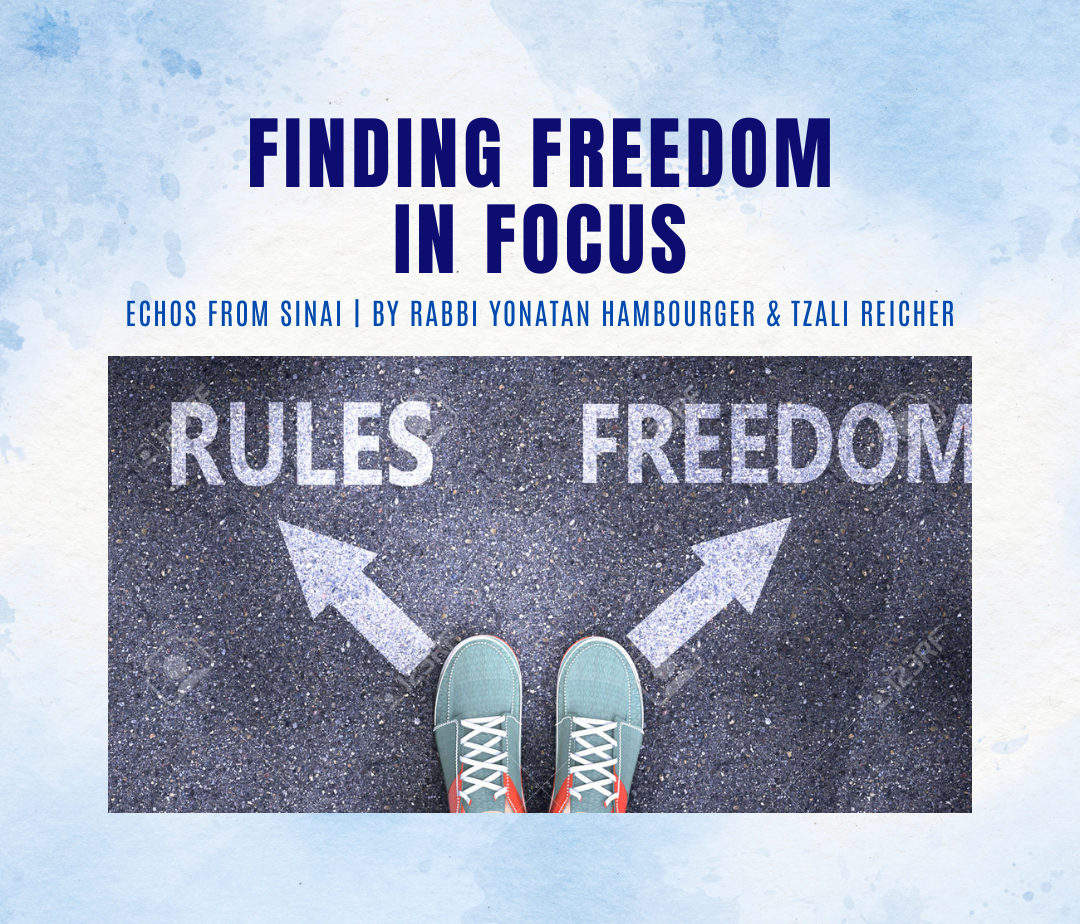
Finding Freedom In Focus
By Yonatan Hambourger and Tzali Reicher
For as long as history has been recorded, there has been a paradox that has confounded societies. It’s the delicate dance between the desire for unfettered freedom, and the innate yearning for structure and discipline-that feeling of knowing we’re tethered to something that has a proven history of giving us the grounding and fulfillment we crave.
In the modern world, the call for freedom resounds through the ages. The Woodstock generation broke from their conservative parents and championed free love and alternative spirituality. The Apple generation called for its users to break free of conformity in their “Orwellian” 1984 Super Bowl commercial, while more and more permissive agendas are mainstreamed to the youth of today, to let them figure it all out for themselves. We champion autonomy and the ability to cast off the perceived shackles of tradition and rules, and the allure of unrestrained choice seems intoxicating, promising a life untethered and unburdened.
However, beneath this surface desire lies a more profound truth—that human beings, in their quest for meaning, find solace, purpose, and fulfillment within the confines of structure and discipline. This is proven by the historical outcomes of mass movements for unrestrained freedom: The ‘Summer of 69’ era crashed under the weight of psychedelics and decadence. Apple has become the cultural enslaver it claimed to be fighting, most recently with its launch of a face computer that will inevitably hasten the disconnection and alienation many of us are already experiencing. And we see that today’s youth are more discontent, unhappy, and depressed than previous generations, in a total repudiation of the experimental open and digital society that they have been the guinea pigs for.
There’s a reason Jordan Peterson’s "12 Rules for Life" became an international bestseller. It served as a roadmap for a disaffected generation craving a guidebook on how to reach a stable footing in a volatile world that they had not been equipped to face. These rules and guidelines paradoxically lead to a sense of purpose and order.
This past week, Jewish communities around the world studied the Torah portion of Mishpatim (Laws) in the book of Exodus, which include some of the denser chapters in the entire Pentateuch. Verse after verse is filled with law and law, telling the recently confirmed Children of Israel (as of the events of Mt. Sinai in the previous chapter) the rules by which they must live for all time. While the earlier parts of the Torah told the pulsating stories of creation, the patriarchs, and the escape from slavery in Egypt, there is no dramatic respite in Mishpatim: we just have a lengthy list of commandments and prohibitions, governing the Jewish people on the issues of commerce, dietary restrictions, capital punishment, how to observe the festivals, and more. In all, there are 53 commandments in this Torah portion alone.
These detailed laws were given to the Jewish people immediately following the ‘main presentation’ at Mount Sinai, when G-d descended in fire on the mountain while smoke billowed like from a furnace as He gave over His wisdom. After the heady and euphoric events that brought the Jewish people together on the once humble mountain, in Mishpatim, G-d presented a roadmap for how they were to live in a society seeking order, justice and fulfillment.
This smoke and fire, tangible manifestations of the divine presence, are symbolic of passion. There is a connection between the fire and smoke that appeared at Mount Sinai and the laws that were taught there: that when performing even the most routine and mundane acts, they must be infused with passion. Discipline should not be mechanical; it should be a vehicle for channeling one's inner fire towards a purposeful life. When we lose sight of why we follow traditional and disciplined pathways to success, that is when self-defeating untrained ‘freedom’ festers and leads to disinterest and dissatisfaction. In the pursuit of rules and discipline, there is an unseen fire—one that burns within the heart of every individual seeking a meaningful existence.
Apathy and disengagement stand as formidable adversaries to achievement and success. In a world that often glorifies apathetic and cool detachment, in favor of a hedonistic living for the now, the wisdom of the Torah’s lessons beckons us to resist the temptation of indifference. True fulfillment is not found in the absence of rules but in the active engagement with them—with a passion that transforms routine into purpose and discipline into a pathway to greatness.
Yonatan Hambourger is a rabbi with Chabad of Rural Georgia. Tzali Reicher is a rabbi and writer currently living in New York.
February 1, 2024

Yisro and the American Dream
By Yonatan Hambourger and Tzali Reicher
Yisro (or Jethro) “had it made” in his ancient home of Midyan, thought to be somewhere in the north-west of the now-Saudi Arabia. He was the leader of his pagan faith, a wealthy man, and a family man with seven daughters and a couple of grandchildren, and proudly had Moses-who had just led the enslaved Children of Israel out of Egypt and split the Red Sea-as a son in law.
On the heels of the miraculous events, we’ve discussed in the earlier chapter of Exodus, Yisro traveled into the desert to reunite with Moses and to witness the miracles for himself. Moses accorded him much respect, followed his suggestions about decentralizing the leadership structure, and spoke of the miracles they’d experienced up till now. Thoroughly convinced of the truth of the one eternal G-d, Yisro decided to cast away all of his life’s beliefs and throw his lot in with the Jewish people, standing humbly with them to receive the Torah at the foot of Mount Sinai.
His turnabout is remarkable, but that isn’t what is most striking about this story.
Yisro was not a young man, and his legacy had already been cemented. He was revered in his native land and was at the pinnacle of his religion. Happily surrounded by his large family, he could have lived out his days content in his service and life achievements.
But he couldn’t do that. Once Yisro saw what he perceived to be ‘the light,’ he couldn’t ignore it. As Rabbi Menachem M. Schneerson, of righteous memory, the most influential rabbi in modern history wrote in Hayom Yom: “In spiritual matters one should always look at he who is higher than oneself, and plead with G‑d to grant him the intelligence to learn from the other, and the ability and strength to rise higher”. And Yisro wanted to rise higher. And so, Yisro made the brave and bold choice to start again in his spiritual journey, giving up his life of comfort and security to create a meaningful relationship with G-d.
The common interpretation of the American Dream often reduces it to the pursuit of material wealth or financial success. However, this simplistic view does not capture the essence of the enduring creed that our nation has embraced since its inception. If it were solely about opulence, then affluent individuals such as sheiks in Dubai and oligarchs in the former Soviet blocs could be considered as living the American Dream, reveling in their luxurious mansions, cars, and artwork.
Instead, the American Dream embodies the liberty to pursue success, opportunity, and fulfillment. Here in America, we are privileged with the right to chart our own course in achieving these goals. Rather than being bound to a rigid system or ideology, we possess the freedom to explore and discover the truths that align with our values—a legacy we aspire to pass on to future generations. The story of Yisro’s spiritual journey resonates deeply with this theme.
Yisro’s story is that he had it all and gave it up for a chance at spiritual fulfillment, along with true meaning and purpose. He chose to forge a new path, one aligned with his newfound understanding and conviction, and challenged the conventional notion of fulfillment and success tied solely to material wealth. He is a shining example of the enlightenment one can reach with the profound freedom to pursue a higher purpose, even a freedom from the trappings of fortune and fame.
The American Dream is not a static destination but a dynamic, evolving pursuit of a meaningful and purposeful life. Yisro's choice to abandon the familiar, echoes the spirit of those who have come to America seeking a new beginning, free from the constraints of the past, whether that be you or your ancestors.
Yisro's narrative serves as a poignant reminder that the American Dream is not confined to a specific demographic or defined by accumulated possessions. It is a universal call to explore, question, and, if necessary, redefine one's legacy in pursuit of a more profound understanding of life's purpose. Yisro teaches us that true success lies in the courage to choose spiritual fulfillment over the comfort of comfort and conformity.
Yonatan Hambourger is a rabbi with Chabad of Rural Georgia. Tzali Reicher is a rabbi and writer currently living in New York.
January 25, 2024
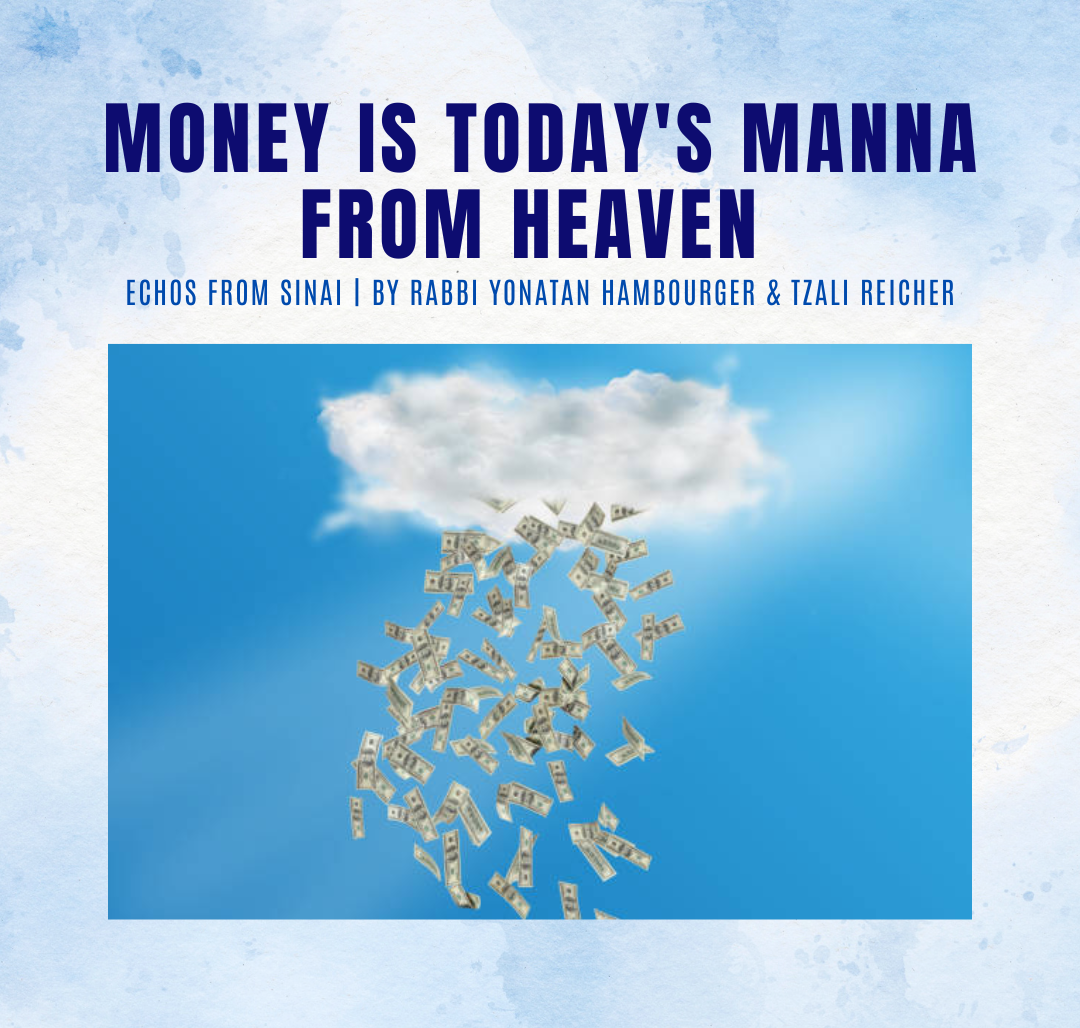
Money Is Today's Manna from Heaven
By Yonatan Hambourger and Tzali Reicher
The Children of Israel had been through a lot since G-d led them out of Egypt in ‘shock and awe’ fashion, as Jewish communities will read this week in the portion of the Torah that describes the exodus. After two centuries of slavery, Moses was leading the Israelites back to their indigenous homeland of Israel. On the way, they crossed the Red Sea in miraculous fashion and were now beginning their 40 year trek through the desert when a most practical question arose: what would they eat in the barren and desolate wasteland on their long way home?
The answer: the mysterious- and miraculous- manna from Heaven.
Moses explained to his people that every morning, this thin bread would fall from the skies above in specific portion sizes, and it would sustain them for the whole day, and that any leftovers would spoil. It would taste like anything they could conjure in their mind- all they had to do was think it, and so it would taste.
The renowned mystic and sage of 19th century Russia, Rabbi Schneur Zalman of Liadi, the founder of the Chabad-Lubavitch Hasidic movement, was wont of saying that “we must live with the times”, explaining that we must not only read the Torah portion of the week as an intellectual exercise, but seek to apply its lessons to our current day and personal realities.
So, what can we learn from the Biblical story of holy bread falling from the skies?
It’s more relatable than you might think.
Our Country is a remarkable miracle. Born with the revolutionary spirit of our Founding Fathers, for 250 years our nation has stood as a beacon of hope, freedom, and possibility, leading it to become the most prosperous and admired nation in the history of the world.
There are those who see their own prosperity as the gift from G-d that it is. These people humbly recognize the fortunate position they’re in from G-d having blessed their own hard work; and they pay this gift forward. They give charity, support their community institutions, and share with others less privileged, and never take their blessings for granted. Sure, they enjoy themselves and even live large, but they still value the important things and have their priorities in order.
But sometimes G-d blesses those people who don’t appreciate their prosperity for the gift that it is. The Bible speaks of this arrogance in Isiah 10, describing people who don’t credit G-d and say, “With the strength of my hand I accomplished it, and with my wisdom, for I am clever”. This sort of “successful” person only facilitates the culture of materialism, consumerism and “keeping up with the Joneses' ' that has challenged recent generations, particularly the youth.
The lesson from this week's Torah portion is that we must ensure that our relationship with money and material success is healthy and generous, and that we see it for the blessing it is.
It is no different than manna from Heaven, a blessing that will sustain us and turn into whatever we desire it to be, whether we use it to support our family, celebrate a happy occasion, or even go away on a special vacation to rejuvenate our mind and soul. But like manna which became spoiled when people hoarded it out of lack of trust in G-d’s providence, money also becomes spoiled when it is abused, while corrupting those whom G-d entrusted this blessing with.
Believers know that G-d has determined their path and will help them in their efforts. In return He wants to see you do your part and open a channel by which to receive His blessing. For most people, that means working hard and applying yourself to earn this blessing, while being
generous, charitable and humble to show yourself to be a worthy recipient.
And if there is anything I know about the people of this great State, it’s that this lesson is something you already live with.
Yonatan Hambourger is a rabbi with Chabad of Rural Georgia. Tzali Reicher is a rabbi and writer currently based in New York.
January 18, 2024
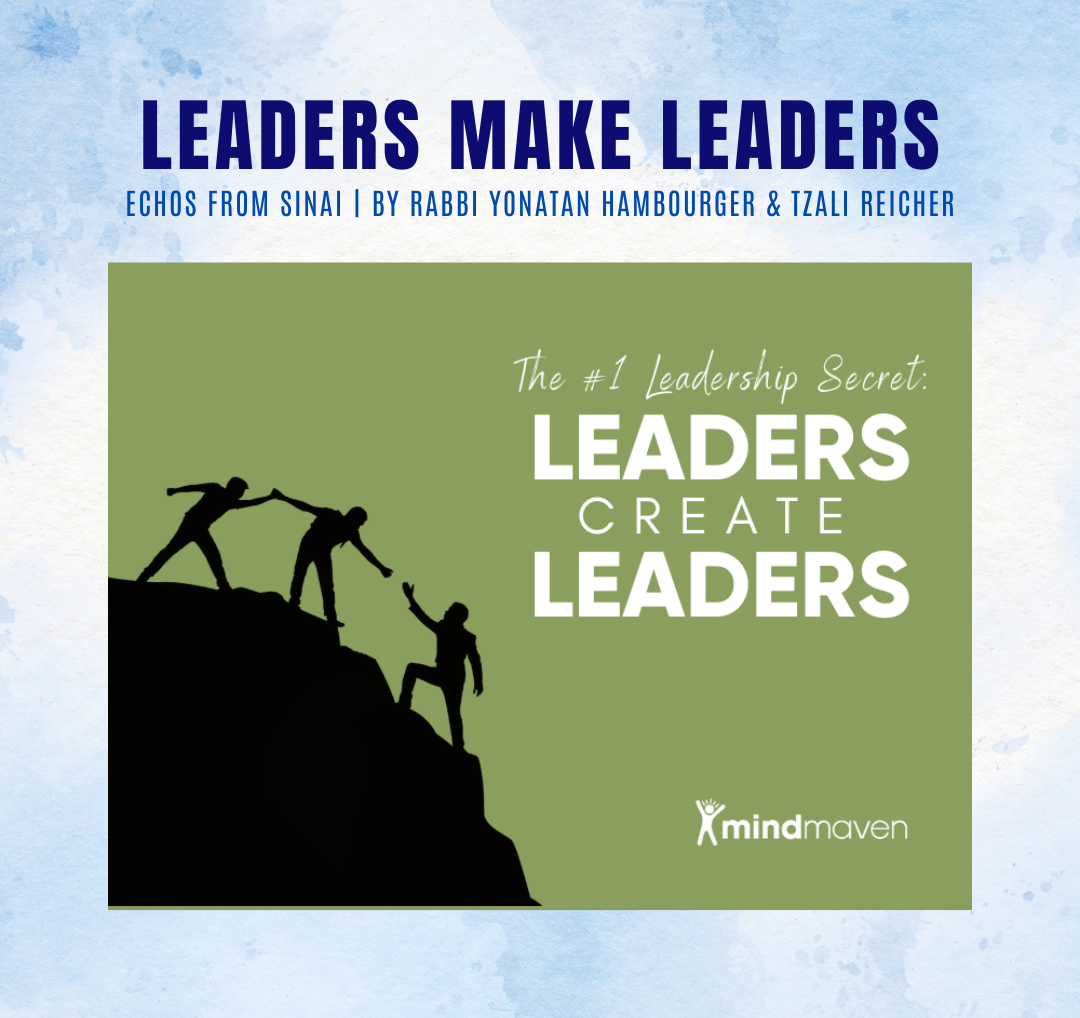
Leaders Make Leaders
In an era marked by soaring levels of anxiety and plummeting self-esteem, closely linked to the surge of social media and the voyeuristic observation of others' performative lives aimed at garnering ‘likes’, many Americans find themselves disempowered, inferior, and adrift.
This sentiment was entirely foreign to the Rebbe, Rabbi Menachem M. Schneerson, of righteous memory, the most influential leader in modern Jewish history.
This past weekend marked a special day for world Jewry. Communities around the world marked the anniversary of the day the Rebbe accepted the leadership of the Chabad-Lubavitch movement in 1951 and became the architect of the post-Holocaust Jewish renaissance.
His remarkable accomplishments endure as a testament to his legacy, even 29 years after his passing. He orchestrated the dispatch of over 4,000 rabbinic couples to lead communities in 80 countries worldwide, a feat that remains unparalleled. Additionally, his influence extends to scholarship, with a prodigious library boasting hundreds of published books covering a wide array of topics—from Judaism to international affairs. These publications were curated from the extensive material derived from the literal tens of thousands of hours the Rebbe spent addressing the public.
Throughout his lifetime, a diverse array of statesmen and artists, including Ronald Reagan, Robert F. Kennedy, Yitzchak Rabin, Menachem Begin, Elie Wiesel, and Bob Dylan, sought his counsel, underscoring the breadth of his impact. The reverberations of his achievements continue to be widely celebrated. Every year on the Rebbe's birthday, every U.S. president, starting with President Jimmy Carter, has designated Education Day U.S.A. to honor his unwavering commitment to education, and in 1994, Congress bestowed upon the Rebbe the prestigious Congressional Gold Medal- the only rabbi to ever receive this honor.
As time progresses following the Rebbe's passing, his significance and appreciation have grown. Each year witnesses the release of numerous books about him and his wisdom, and an increasing number of rabbis-many even born after his passing- operate in his name, venturing to remote areas to connect with Jewish individuals and communities wherever they may be. His resting place is revered as a site of profound spiritual sanctity. Hundreds of thousands of individuals, both Jews and non-Jews, visit this sacred location every year, seeking blessings, spiritual guidance, and inspiration, including leaders such as New York Mayor Eric Adams, President of Argentina Javier Milei and personalities including supermodel Naomi Campbell, basketball great Lamar Odom, and popstar Paula Abdul.
The question is obvious. How did a Russian-born immigrant rabbi, who spent his last 40 years essentially in a three block radius in Brooklyn, inspire such devotion and following that has only grown and spread around the world since he passed?
The answer might be found in this thought the late great Chief Rabbi Jonathan Sacks of the United King used to say: “I had been told that the Rebbe was a man with thousands of followers. After I met him, I understood that the opposite was the case. A good leader creates followers. A great leader creates leaders. More than the Rebbe was a leader, he created leadership in others.”
From the moment he accepted the leadership in the small Brooklyn synagogue from which he would go on to change the face of world Jewry over the next four decades, the Rebbe addressed his personal philosophy about the need for leaders to empower and lift up others in his opening address, which he labeled his mission statement.
The Rebbe challenged the common expectation that followers could passively delegate all responsibilities to their appointed leaders, emphasizing that nominal connections to individuals of higher status or spiritual standing didn't exempt them from personal effort. The Rebbe's leadership style involved guiding and assisting his followers, but he insisted they must invest their own effort to attain spiritual and material heights.
In numerous meetings and letters, the Rebbe uplifted and motivated those who believed they had reached their limits, whether proud achievers or those lost and despondent. His consistent message was clear: there is always more one can do, and no one has yet come close to tapping into their ultimate potential that G-d has blessed us with.
This message holds particular significance in our present age, dominated by our enslavement to devices that have eroded our G-d-given attention spans and work ethics. Whether feeling unaccomplished, lazy, or overly content with past achievements, the Rebbe's empowering message of continuous growth and possibilities resonates: we must be leaders who foster more leaders, thereby cultivating further success. There is always room for improvement, and we can always do more to make the world a better place for all.
Yonatan Hambourger is an Atlanta-based rabbi with Chabad of Rural Georgia, while Tzali Reicher is a rabbi and writer currently residing in New York.
January 11, 2024

The Importance of Defining Antisemitism
In December, the entire world witnessed the disastrous hearing on Capitol Hill investigating the massive surge of antisemitism and pro-Hamas extremism on elite campuses, where three leading ‘academics’ debased and twisted themselves into knots to say calls for the genocide of Jews and the Jewish state wouldn’t be punished under their school guidelines unless it was accompanied by action (which would be the genocide of Jews…?). The trio were roundly condemned. One was first to step down immediately after the hearing, another resigned from her post after her callous performance led to an investigation into her crooked history of plagiarism, while another remains in her role.
This story is perhaps the most recent example of what Jews have known for a long time: Jews are not allowed to define antisemitism and Jew-hatred. Rather, Jews are told what counts as hate and what is allowed to remain in the public discourse, while every other group rightly gets to determine what is offensive and hurtful to them, all by themselves. These academics only got called out because their performance was so shambolic and brazen that it couldn’t be ignored, despite the fact that the sentiments are expressed and believed by a terrifyingly growing number of people around the world.
It’s part of what has been defined as “wokeism” and the ‘pyramid of oppression’. Leaders in politics and entertainment work overtime to ensure they ‘correctly’ serve and respect the many diverse communities under their purview in the way they appreciate being treated, but because Jews are seen as having been able to overcome their historic oppression, status as a tiny nation in the world, and have been able to create and lead many valuable public facing institutions- Jews don’t count.
Since October 7’s Hamas massacre on Israel, this difference in treatment has never been starker.
Somehow, despite seeing 1,200 of its citizens brutally murdered, tortured, beheaded, burnt alive, kidnapped, and raped by roving bands of pillaging terrorists and civilians committing acts of medieval barbarism, it is Israel who is demonized for its response.
World leaders have called for restraint and for Israel to scale back its response to Hamas, saying it cannot be dismantled because it’s not a group but an idea, and would only radicalize future generations. No one would reasonably argue today that the Allies were wrong to sack Europe in their successful campaign to crush the Nazis despite the death and destruction inflicted on civilians. No one would reasonably argue today that the U.S. Military was wrong to invade territory occupied by ISIS and Al-Qaeda in order to degrade and eradicate these menaces who threatened the free world. One cannot allow themselves to be held hostage and forced to negotiate with and accept terrorists who intentionally lodge themselves within civilian areas, hoping to exploit the blood of innocents in the world press. The innocents’ blood is in fact on the terrorists’ hands. Rather, democratic countries are compelled to fight to uproot terrorists who threaten ones’ citizens and sovereignty.
Less restrained commentators hysterically claim Israel is perpetuating a genocide on Gaza, despite Israel’s ratio of innocent victims to terrorists-despite the tragic loss of every human life-is better than any war in history. They offensively paint Israel as Nazis, the purveyors of the largest genocide of Jews in history, seeking to connect Jews with their own oppressors in a despicable attempt to convince the world of their false claims.
And this is why I support the efforts of the Faith and Freedom Coalition to pass the International Holocaust Remembrance Alliance (IHRA) definition of antisemitism into Georgia law.
This is the IHRA working definition: “Antisemitism is a certain perception of Jews, which may be expressed as hatred toward Jews. Rhetorical and physical manifestations of antisemitism are directed toward Jewish or non-Jewish individuals and/or their property, toward Jewish community institutions and religious facilities.”
The IHRA provides examples of antisemitic behavior, such as unfairly singling out Israel, the Jewish state, for criticism while neglecting similar global issues. It mentions the denial or diminishment of the Holocaust, including its scope, mechanisms, and the Nazi's intentions, and highlights inappropriate comparisons of modern Israeli policies to those of the Nazis. It also discusses the unjust collective blaming of all Jews for the actions of Israel, and unfounded allegations against Jews or Israel regarding the Holocaust, pointing out the problematic accusation that Jewish citizens prioritize Israel or Jewish global interests over their own nation's interests. Furthermore, it addresses the denial of Jewish self-determination by labeling Israel's existence as racist.
Predictably, antisemites and Jihadist extremists don’t like this definition, saying it exists to muzzle critics of Israel, despite the fact it explicitly says, “criticism of Israel similar to that leveled against any other country cannot be regarded as antisemitic.” They’ve even sought to create and disseminate their own tortured descriptions of antisemitism that allow for the continued demonization of Jews, but mercifully they haven’t got traction in their cynical efforts to mainstream Jew hatred.
It’s time the world recognized the Jews right to define what counts as hatred and antisemitism for themselves, particularly as all the antisemitic tropes defined as explicit Jew-hatred are seen more and more online and in the real world.
The Georgia legislature should take up and pass House Bill 30, and show the broader community that here, we don’t tolerate hatred, intolerance, and demonization.
Please urge your elected officials to pass House Bill 30 by calling or emailing today. You will find your State Senator here: https://www.legis.ga.gov/members/senate. Together we will make a difference!
Yonatan Hambourger is an Atlanta-based rabbi with Chabad of Rural Georgia, while Tzali Reicher is a rabbi and writer currently residing in New York.
January 4, 2024
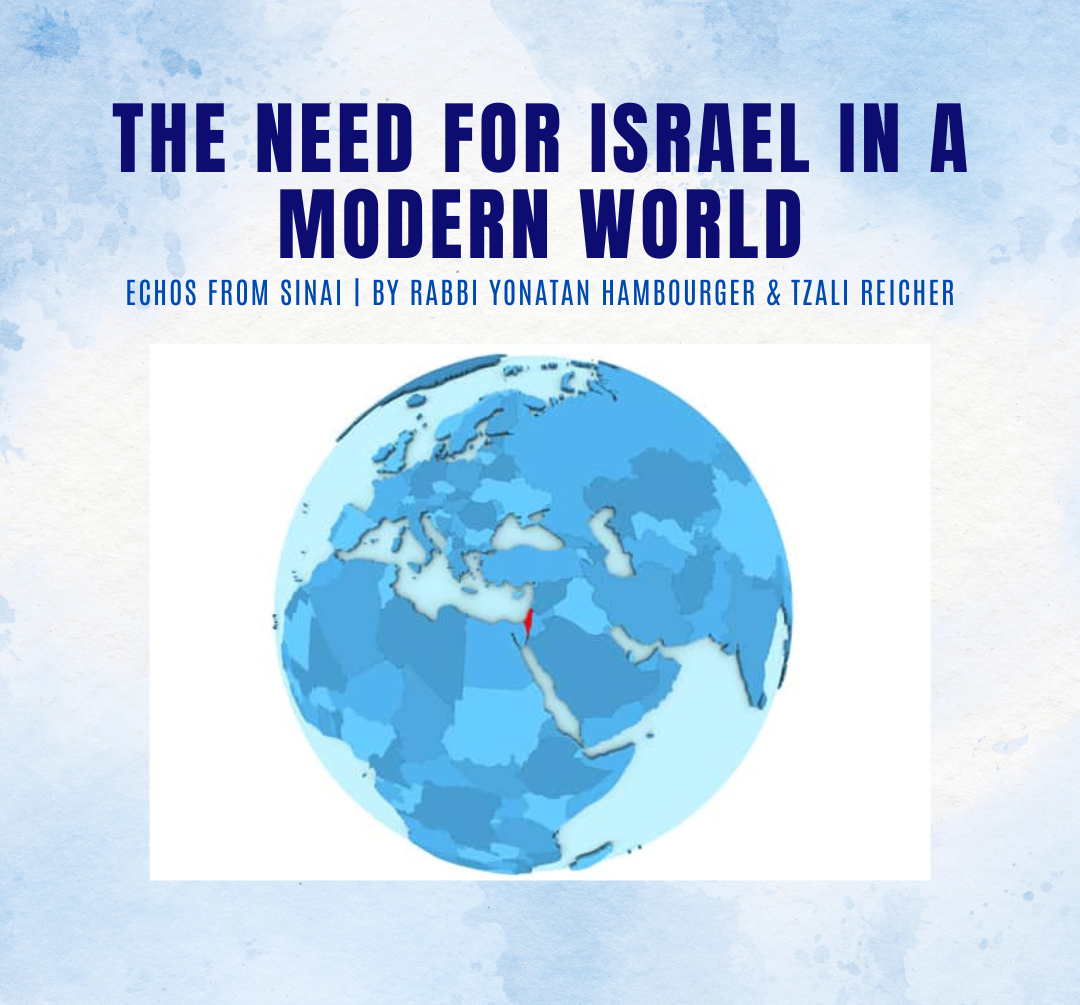
The Need for Israel in a Modern World
In recent weeks, Jewish communities worldwide have been captivated by the timeless tale of Jacob and Joseph as narrated in the latter portion of the Book of Genesis, as they are studied in the weekly Torah portions each week.
The classic story goes that after being sent to Egypt by his envious brothers that were jealous of his close bond with their father Jacob, Joseph underwent a remarkable transformation. The experience he gained from a life of adversity coupled with divine providence enabled Joseph to become a trusted advisor and administrator in his adopted homeland, ascending to the position of viceroy thanks to Pharaoh's recognition of his wisdom. Joseph's sage counsel was instrumental in safeguarding Egypt from the devastating seven-year famine that would have otherwise ravaged the nation. This dire period ultimately led Joseph's brothers to leave their land of Israel for Egypt to seek his assistance, resulting in a sincere apology and mending of relations, followed by a heartfelt reunion with his father, who never gave up hope of reuniting with his son throughout the 17 years he was missing.
Moreover, this period of hardship and resilience culminated in the establishment of a vibrant Jewish community in Egypt. This community not only thrived but also garnered the respect and appreciation of their Egyptian neighbors, who acknowledged the Jews vital role in helping establish Egypt as a prosperous nation and the recognized superpower of the day. This legacy endured for centuries, marking a chapter of peace and prosperity for the extended family of Jacob and Joseph in a foreign land.
But in this week's Torah portion, the first of the book of Exodus, the Jews experience a radical change in fortunes. There arises a new king “who did not know Joseph”, which the sages interpret to mean he did not acknowledge the contribution Joseph and the Jews made to Egypt and sought to enslave and enact policies targeting the Jewish community of his time.
Such has been the story of the Jewish people throughout history.
Time and again throughout history, the Jewish community is welcomed for their wisdom and contributions, and celebrated for a number of years, before ‘a new king arises’ and the classic tropes begin playing on the minds of those who have always sought to harm the Jewish people. The Jewish people’s contributions are then twisted against them and framed as a malicious attempt to control the rest of the population. Public resentment is stirred and before long, the Jewish community is attacked and expelled, and forced to start this cycle all over again.
Until the establishment of the modern state of Israel in 1948, Jews were thrown out of ancient Egypt, medieval Babylonia, and modern Europe. Between the year 250 and the year 1948—a period of 1700 years—Jews in Europe experienced an average of one expulsion every 21 years.
Fresh off the largest annihilation of Jewish people in history, thanks in large part to the leadership of the U.S.A., the world-in a rare moment of compassion for the Jewish people-recognized the need for the Jewish people to have a state of their own in their ancestral homeland, smack in the middle of 22 mostly hostile Arab countries. For the first time in 2,000 years, the Jewish people lived autonomously in their homeland and had a state that would serve as the home of a displaced people and could be responsible for ensuring the protection of their own coreligionists. Never again would the Jews be subject to the whims of a volatile leader and citizenry.
Faced with so many existential wars and attacks since its re-establishment in 1948, what is Israel’s secret? How have they managed to repeatedly defeat their enemies and fend off the world’s continuous demonization and obsession with its legitimacy, while simultaneously absorbing hundreds of thousands of penniless Jewish refugees threatened with mass slaughter by the Arab countries where they were living for two thousand years?
Well, it’s a mixture of faith and fortitude, and a recognition of that fact that then-Israeli Prime Minister Golda Meir told now-President Joe Biden in 1973: “We have nowhere else to go.” Those who say there is no need for Israel as a Jewish country in a modern world in favor of a pluralistic and naive “one state solution” ignore the realities of escalating antisemitism in Europe and around the world, and the role Israel plays in ensuring the safety of the global Jewish population.
Antisemitism has been on the rise in Europe and beyond. Jewish communities, particularly in France, have witnessed a mass exodus due to the alarming surge in antisemitism. In England, the occurrence of over 50 daily antisemitic incidents, including large rallies promoting hatred and division, has been deeply unsettling. Australia, too, has seen troubling events that underscore the ongoing threats faced by Jewish populations, with riots featuring chants of “gas the Jews'' capturing worldwide headlines.
The United States is a truly friendly and welcoming country thanks to the ethos of our founding fathers, the divinely inspired U.S. Constitution, and the demonstrative support from the ‘faith-based’ community, and so many others. Jews have flourished in this great country and have made enormous contributions as well. We pray that all of us who love our great country will stand united against the onslaught of those that want to end the American way of life that we all cherish, and that the Jewish people will remain secure as well. Jews in many other places around the world are safer for Israel’s existence and the knowledge there will always be a home for them when the tides turn, as history tells us they always do.
Yonatan Hambourger is an Atlanta-based rabbi working with Chabad of Rural Georgia to teach the richness of Judaism, while Tzali Reicher is a rabbi and writer currently residing in New York.
December 28, 2023
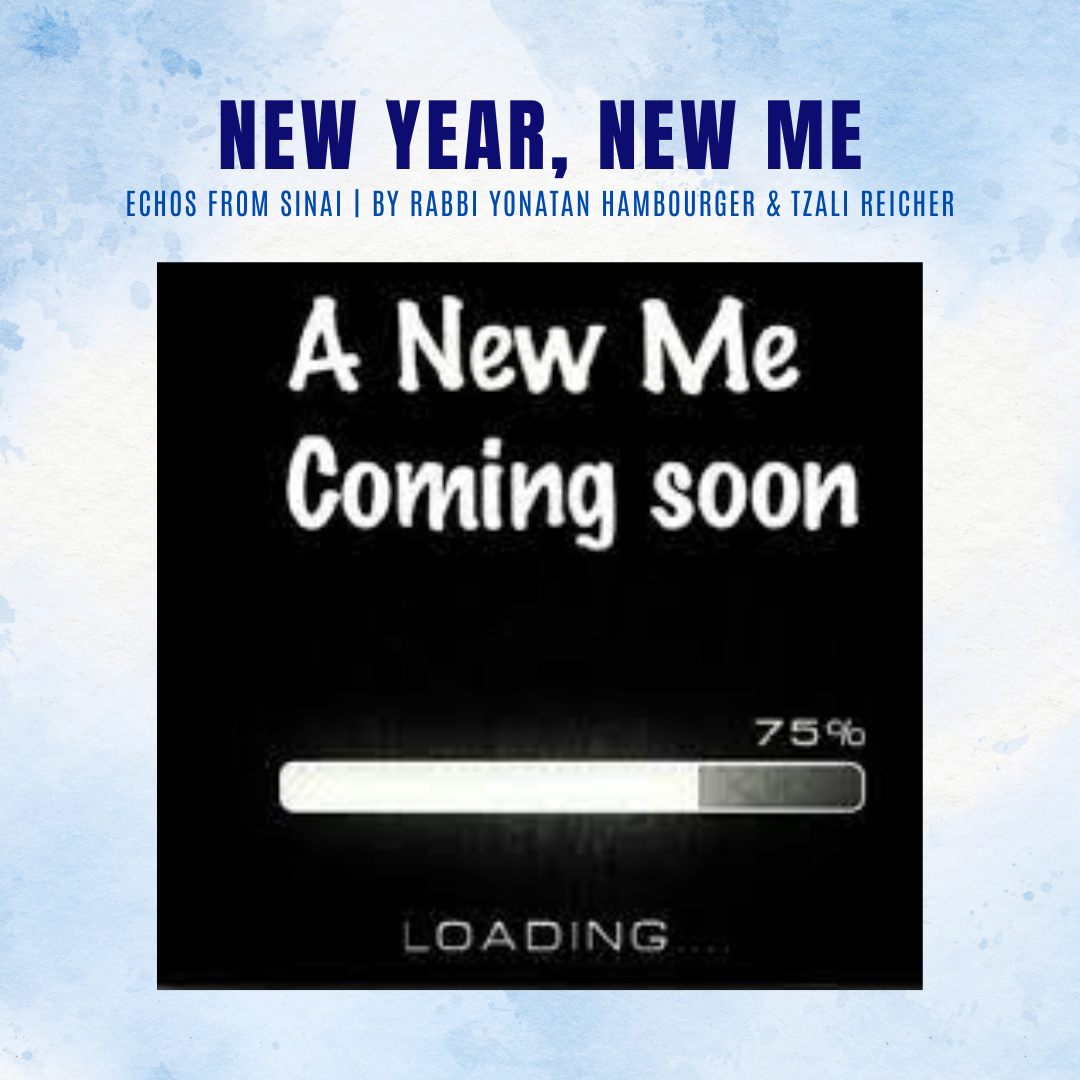
New Year, New Me
The way the Jewish community celebrates Rosh Hashanah-- the Jewish New Year-- often raises eyebrows, and not just because it usually occurs in September.
In a distant cry from the way the majority of the world celebrates the secular New year, with raves and parties to cast the annus horribilis that was the year before aside for the innocent optimism that this upcoming year will be better, Jews spend the New Year - also known as the High Holidays and the Days of Awe- in their local synagogue. On the first day of the Jewish calendar, we affirm G-d’s kingship over us, apologize for the mistakes we made against man and G-d the year before, and ask to be signed and sealed for a good and sweet year ahead.
Why do Jews celebrate their New Year like that? Is there something in the Torah against partying?
Of course not. There are plenty of Jewish holidays marked with joyous celebrations, and we are commanded about our festivals to “rejoice in them”. But when we appreciate the magnitude of the opportunity the New Year presents us with, we can quickly appreciate that it isn’t an occasion we can let slip by with just merrymaking.
The end of one year and the turning of the calendar into the next offers the chance at a clean slate presented only once a year. We can cast aside the burdens of the past, shed the layers of our shortcomings, and embark on a journey towards self-improvement and spiritual growth that only the promise of a New Year can offer. It's a profound moment of reflection and introspection, a time to take stock of our actions, intentions, and the impact we've had on the world around us.
It’s also a time of profound honesty, as G-d accounts for the past year and determines how our next year should look. In that vein, we ask G-d for forgiveness and compassion, and ask the same of our friends and colleagues who we may have wronged or offended to let go of past grievances and move into the new year with peace and tranquility. We set realistic goals, about the growth we’d like to see in our personal, professional, and spiritual pursuits.
All these are lessons that can be applied to the New Year 2024.
Amidst all the revelry and celebrations that have rightfully been earned after a tough year, I urge our readers to create their own Rosh Hashanah Moment and reflect on the events of the past year to influence the direction the next year will take you on.
Think about your 2023. What positive events happened and what less-than-positive things happened, what were the things you did well and what could be done better, and who do you need to make things right with. What are your hopes, goals and aims for the upcoming year, and what can you do now to be the change you’d like to make happen.
It’s taking meaningful and proactively positive steps like these that can transform what is otherwise simply a public holiday into the first day of the best year of your life.
So as January 1st looms, I wish all our readers a sweet and joyful 2024, a year in which all your hopes and dreams are achieved, and you know only blessings. As a nation, we should only experience peace, joy, and sustenance. Our leaders should be blessed with the courage and wisdom to lead us to peaceful outcomes in all our domestic and international challenges and may the United States of America continue to affirm its position as the moral center of the world.
December 21, 2023

Joy Breaks Barriers This Troubled Holiday Season
As the holiday season approaches, many of us eagerly anticipate the warm embrace of joy and happiness that typically accompanies this time of year. We eagerly await the festive decorations, the cozy gatherings with loved ones, and the giving of thoughtful gifts. Perhaps it’s a quirk of the calendar that somehow many faiths have celebrations in the winter months, be it Hanukkah, Christmas, or Kwanzaa- but it is truly wondrous that there is a joyous holiday for anyone to participate in this festive season.
Holiday cheer is the typical sentiment that defines the month of December, but for countless people, finding joy and happiness this year feels heavier and more challenging than ever. The global events of the last few months, coupled with the many domestic challenges many of us-or people we know- have been facing, have left us grappling with uncertainty and isolation, and confusion about how to celebrate the holidays in good conscience.
And yet we must. We must find that mental bandwidth to celebrate our traditional holidays guilt-free, because only with joy and purpose can we overcome any challenge or adversity.
Let’s explore the importance of joy in Judaism, where the need to be happy is emphasized in many scriptures and teachings: Deuteronomy 28 warns the Jews of dire consequences if they do not serve G-d with happiness and gladness of heart. In Kings II, Chapter 3, we learn that even the prophet Elisha recognized the importance of joy in achieving prophecy. After King Yehoram of Israel aroused Elisha's wrath, a minstrel had to play before him to lift his spirits before he could attain prophecy once again. This story illustrates that a prophet could only connect with the divine when in a state of happiness. The Talmud further emphasizes the significance of joy by stating that the Divine Presence only rests on one who is joyous.
And finally in the daily morning prayer, we are commanded to "serve God with joy," as mentioned in Psalm 100. This commandment reminds us that joy is an integral part of our service to G-d. It is not enough to merely go through the motions; our hearts must be filled with joy and faith as we carry out our divine duties.
But why does God care about our mood? Why is it essential to serve Him with joy?
The answer is simple: Rabbi Schneur Zalman of Liadi in his seminal work The Tanya explains that serving G-d without joy indicates a lack of faith. If someone is upset about their situation, and falls into a melancholic funk (excluding mental health conditions), they are in effect questioning the plan that G-d has for them.
In the midst of those ‘curve balls’ which life throws at us, mustering the faith that it is G-d who has custom-made our challenges out of His love for us, invariably leads to joy, which is the secret to overcoming any challenge. The Jewish motto of “joy breaks all boundaries'' endures, while negativity and pessimism lead to apathy, paralysis, and the abdication of personal responsibility.
This holiday season-precisely when the world feels dark and confusing- is a time for reflection, gratitude, and joy.
It’s a time to thank G-d for and rejoice in the blessings that we have been granted- our families, our homes, our communities and other blessings we typically take for granted- and make an effort to share those blessings with others less fortunate than ourselves. Practicing this gratitude and taking stock of all the good things in our lives, while engaging in acts of service and community, will foster a sense of contentment and joy while making our challenges seem trivial and easily fixable in relation to all the positive things going on. Embracing traditional celebrations with family and friends can serve as an anchor in these troubled days.
Joy is not a mere fleeting emotion but a profound state of being that sustains us through adversity. It serves as a beacon of hope in the darkest of times, reminding us that even in the midst of turmoil we can find light and purpose. By embracing joy and gratitude, we can overcome the long winter darkness, together.
Yonatan Hambourger is an Atlanta-based rabbi with Chabad of Rural Georgia teaching the richness of Judaism, while Tzali Reicher is a rabbi and writer currently residing in New York.
December 14, 2023

As the flooding intensified around Mr. Smith’s house following a torrential storm, his neighbors --surprised he hadn’t left already after multiple warnings--encouraged him to join them as they escaped the devastated area. He politely declines, saying he had faith in G-d to spare him. With the waters rising, emergency services bravely rowed through the streets but Mr. Smith still did not call out for help despite seeing them: he was waiting for his G-d to come through. Passing away hours later, Mr. Smith ascends for his final judgment at which point, disenchanted, he confronts the Lord, asking Him how he could possibly justify the faith Mr. Smith had in Him his whole life. The Lord responded, “I was there all along: I was the warnings, I was the friendly neighbors, I was the emergency services. I was there to help, but first you must help yourself”.
This apocryphal tale is perhaps the perfect example of the Jewish concept of Bitachon (faith) and Hishtadlus (effort; doing your part in what has to be done).
In Judaism, while we do ask for blind trust in G-d, we do not ask for blind faith. G-d doesn’t ask us to throw away the keys and wait for Him, omnipotent as the Lord is, to deliver salvation. Rather G-d asks us to follow His guidance and instructions and proactively do the right thing, and have the faith that He has our best interests in mind and will ensure the best result will eventuate.
Maybe the earliest historic example of faith meeting effort was over 2,000 years ago, when the Jewish people were terrified. Fresh out of centuries of slavery in Egypt and headed back to their homeland Israel, the nation now gathered around Moses amidst swirling rumors the Egyptians were headed straight to their location by the Red Sea, to take them back into captivity.
Reactions to the concerning news were mixed. Some advocated for outright war, others for prayer. A faction suggested simply accepting their fate and walking back into the arms of their enemies, while several others said the Jews should commit suicide by jumping in the sea rather than go back into slavery. Moses calmed his flock, and inspired them to have no fear: the same G-d that had engineered the miracles that got them to this point would deliver them again. At that point, a brave Jewish leader, heeding G-d’s instructions to begin walking towards Israel, marched into the water, at which point the sea split and allowed the Jews safe passage while the Egyptians perished.
The lesson is clear: G-d had told them to head into the sea, and once the Jews heeded His instructions and fulfilled their part of the bargain, amazing things happened for them.
This teaching especially resonates today, in an age where children are often coddled and people are told they don’t have agency over their choices as a result of circumstances out (or even in) their control. They must be taught, and then reinforced, that we make our own luck: if they put in the work and do what has to be done, good things will happen for them.
It's true for personal and other issues. If a person needs a job, they can’t sit on the couch and expect things to change. Rather if they pursue opportunities, send out resumes and sit for interviews, they’ll find themselves employed soon enough. When businesses need clients, the more they pitch and reach out the more success they have. Essentially, the more effort one puts into solving a problem or situation, the higher the probability of a good outcome.
As a new year rapidly approaches, let’s make 2024 a year of personal and proactive growth, taking the initiative and overcoming potential challenges instead of letting them fester. On a more global level, our leaders should have the clarity and courage to make the decisions that ensure a peaceful and conflict-free year for us all.
The more one tries to overcome a challenge, the more obstacles and complications they will encounter, but we must realize this too is part of the journey of life in order to defeat it. Rabbi Shmuel Schneerson had a motto: “The world says that if you cannot crawl under an obstacle, try to leap over it. However, I say, leap over it in the first place!” Lechatchila Ariber: take the initiative, power through your challenges, and great things will happen.
Yonatan Hambourger is an Atlanta-based rabbi with Chabad of Rural Georgia teaching the richness of Judaism, while Tzali Reicher is a rabbi and writer currently residing in New York.
December 7, 2023
Hamas Is a Threat to The U.S.A.
By Yonatan Hambourger and Tzali Reicher
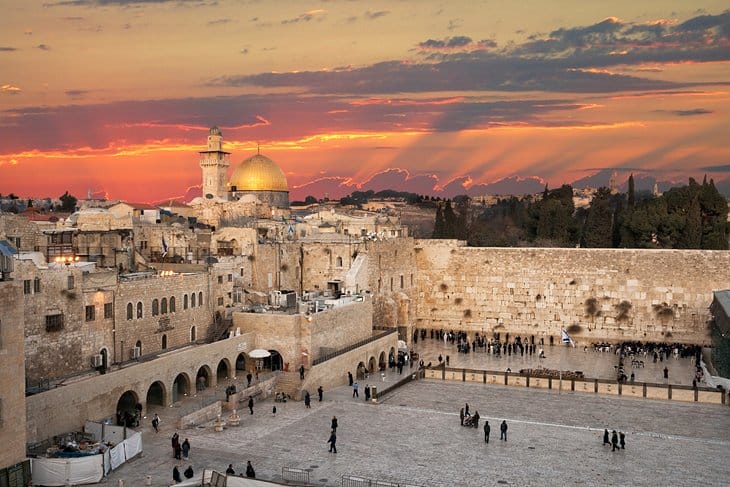
It is no secret that the Jewish people often have a diversity of perspectives on everything. But when it comes to matters of Jewish law, there are many times where consensus emerges between scholars, even across millennia. In the discussions of the permissibility of violating the sacred laws of Sabbath in times of dire need, we find two prominent figures in the realm of Jewish thought, Maimonides and Rabbi Schneur Zalman of Liadi, separated by centuries and distinct backgrounds, in agreement on an extremely timely case:
Maimonides, a medieval scholar, philosopher, and physician who served as the doctor to the Caliph in Egypt, and Rabbi Schneur Zalman of Liadi, the founder of the Chabad-Lubavitch movement founded in Russia that continues to thrive today, both render the same legal decision based on this scenario: when the safety of the Jewish community is at stake and enemies have besieged their cities--particularly border towns--, there is not only a right but a sacred obligation to defend themselves and their fellow countrymen, even if it means violating the sanctity of the Sabbath.
October 7th, 2023 was a Sabbath. Knowing this, Hamas unleashed a brutal wave of terror and violence on Israel, starting with the border towns and moving as far as they could go before Israel was able to mobilize a response to repel this genocidal threat. For more than 60 days since then, Israel has been busy working to free the innocent hostages Hamas has taken, while also operating to eliminate Hamas and its capability to wage terror against Israel and the innocent residents of Gaza.
But around the world, the response to Hamas’s atrocities have been astonishing. While the bodies of Jewish victims were still warm and the remains of others were in the process of being identified by DNA because they were so mutilated, antisemites and critics of Israel were quick to celebrate the massacre as expressions of ‘resistance’ and ‘decolonization’. Others-including in Congress-called for “calm” and a “ceasefire”, seeking to neuter Israel’s ability to retrieve its citizens and defend its sovereignty before it even began.
Yet despite the terrifying and ominous sight of thousands of terror sympathizers marching in cities around the world, chanting genocidal rhetoric and advocating for the erasure of Israel, the United States-both the administration and the citizens of this great nation that empower them-have been overwhelmingly clear eyed about the strategic need and moral obligation to allow Israel to complete its goal of completely wiping out Hamas.
That’s because in a world of alliances and proxy battles, Israel is Western Civilization’s figurative “border town”, where dangerous ideas by extremists are tested before being exported to other Western bastions of freedom around the world. By way of example, Israeli airlines were a frequent target of terror-related hijackings before 9/11, while bus and train bombings were a common tactic of Islamic terrorist suicide bombers in Israel before the 2004 train bombings in Madrid, and the bombing of London’s subway in 2005.
As major world powers jostle and fight for influence in control of areas of the globe far beyond their own borders, Israel is a bulwark of American values and interests in a region dominated by Iran, China, and Russia.
While naive and young Americans call for Israel to be hamstrung and restrained, older and wiser people-as proven by the data- understand the need for the United States to empower a forceful response to Hamas’s aggression.
If Israel allows Hamas to remain intact after the atrocities they perpetrated, the veil of deterrence that keeps the region calm would be completely off, and the implications of that are terrifying:
Hamas’s fellow Iranian proxy, the far more sophisticated Hezbollah terror organization effectively controlling Lebanon, would be empowered to join the war more than the tepid show of support they are offering now. Israel would then be forced to use its air force to handle that exponentially more dangerous threat, drawing Iran into the conflict. The United States would then be obligated to tangibly join the war with manpower and supplies, which would then invite China and Russia into what is now World War III, G-d forbid.
Even if it doesn’t escalate that far, blocking Israel-the United States’ staunchest ally in the Middle East-from doing what it needs to ensure Hamas’ elimination, would send a dangerous message to the United States’ adversaries abroad. It essentially tells dictators like Vladimir Putin, Xi Jinping, and the Mullahs in Iran that America will not stop them from occupying vital allies like Ukraine and Taiwan, and aside from offering tough rhetoric and some arms, they would get away with it.
The world is at a dangerous crossroad, and the United States must empower and support Israel- our ally on the frontlines of our common fight against extremism and terrorism-to ensure the United States’ secure place at the head of the world order and the continuation of our open, free, and secure Western civilization.
Yonatan Hambourger is an Atlanta-based rabbi with Chabad of Rural Georgia teaching the richness of Judaism, while Tzali Reicher is a rabbi and writer currently residing in New York.
November 30, 2023
Thank You, America
By Yonatan Hambourger and Tzali Reicher

On the most spiritually significant day on the Hasidic calendar in the winter of 1986, the Rebbe, Rabbi Menachem Mendel Schneerson, of righteous memory-the most influential rabbi in modern history-surprised the thousands gathered in his New York synagogue by beginning to speak about… Thanksgiving.
Normally known for his commentary on Torah insights or the Jewish perspective on current events, the Rebbe, who spearheaded the global renaissance of world Jewry after the Holocaust, instead praised the uniqueness of the United States. He highlighted how the country's original settlers immediately proclaimed a holiday of thanksgiving to God upon their arrival, expressing gratitude for a secure land and freedom from religious oppression. The Rebbe, who maintained mutually warm and respectful correspondence with the presidents and leaders of his day, also frequently lauded America as a "Medinah shel Chesed" - a nation of kindness, a sanctuary for the Jewish people, and a pillar of support for Israel.
In the centuries since Thanksgiving was first celebrated, it has evolved to a yearly tradition to express our appreciation to God for all the blessings in our lives. There’s a lot to be thankful for: family, health, security, among others, but what is sometimes understated is the privilege of being a citizen of the United States of America.
Living in this country offers countless reasons to be thankful, and this blessing continues to enrich our lives in numerous ways. Through what can only be described as divine providence, we found ourselves born in a land—or made our way to a land—that champions freedom and democracy, something that people born in oppressed nations can only yearn for. Contrary to certain ‘coastal narratives,’ the United States remains a bastion of safety and security, and our right to self-defense and the practice of our faiths without hesitation or fear is written in and protected by our unparalleled Constitution.
But as a rabbi and Jewish citizen of our great nation there is another reason why I’m grateful to and for America: its unwavering support of Israel and America's Jewish citizenry. As the aftermath of the awful Hamas massacre of innocent Israeli civilians on October 7th continues to roil Israel and the Jewish community around the world, America and its citizens have been an overwhelming beacon of support for our most vital ally in the Middle East, and those who it represents.
One of the most tangible forms of support is the robust military aid provided by the United States to Israel, recognizing Israel’s integrity as an ally and its position as the ‘tip of the spear’ against international terrorism. The United States has supplied Israel with weapons, and intelligence, ensuring that it can defend itself against potential aggressors. Diplomatically, the United States has been a staunch advocate for Israel on the world stage, using its influence to protect Israel from biased resolutions and condemnations in morally bankrupt international forums.
While it's true that the President and the U.S. Congress has been exceptional in showing support for Israel amidst pushback from a fringe-but-loud minority, it’s important to note that a country is only as good as its citizens, and our country’s citizens have been so kind and supportive.
The messages and support I’ve personally experienced and been seeing across our great state and nation reaffirms my belief in the morality and righteousness of the everyday kindhearted American. Despite what the media will tell you that America is in decline, the American people are overwhelmingly on the side of stamping out global terrorism in tandem with its allies, projecting U.S. power on the world stage to thwart the global ambitions of our adversaries, reestablishing the vision of our founding fathers to check the spread of neo-fascism and nihilism currently in vogue, and doing what it takes to ensure a safe and prosperous future for all Americans.
In the context of Thanksgiving, the Rebbe's perspective on gratitude takes on a special significance. America, with its support for Israel, embodies the spirit of "Medinah shel Chesed" (a nation of kindness). The United States has consistently shown kindness and support for Israel and the Jewish people, and that has never been taken for granted.
So, during this holiday season, I want to extend my heartfelt thanks to America for its unwavering core principles and support of Israel. The United States of America, by virtue of its people, is a beacon of hope and example for the rest of the world. Thank you, America, for being a true friend to the Jewish people, and long may the great experiment that is the United States of America continue.
Yonatan Hambourger is an Atlanta-based rabbi with Chabad of Rural Georgia teaching the richness of Judaism, while Tzali Reicher is a rabbi and writer currently residing in New York.
November 22, 2023
Israeli Arabs Live Better Than Their Neighbors
By Yonatan Hambourger and Tzali Reicher
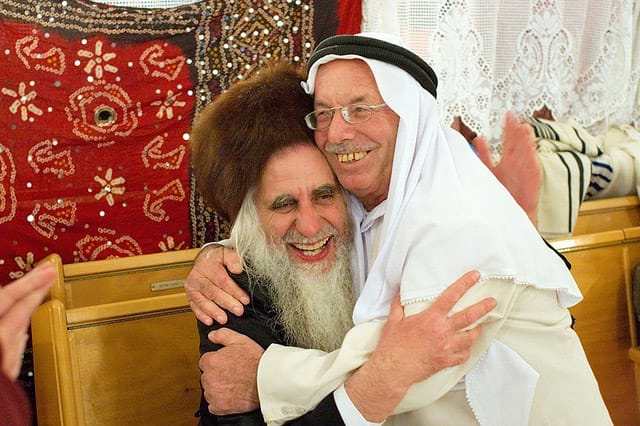
Jews understand what it's like to be mistreated in the countries they live in.
Charting their way through history, no other people has been displaced or expelled as much as the Jewish people. Time and time again, whenever it seemed that Jews had established a stable home where they could integrate and thrive, those foundations were ripped away from them, often through a combination of antisemitic policies and brutal violence.
The feeling of displacement has been baked into the Jewish peoples’ DNA since Biblical times, and is still felt deeply today. As G-d was teaching the Jews how to govern Israel, with the memory of centuries of enslavement in Egypt fresh in the Jewish people’s mind, the Torah commanded them to “not ill-treat a stranger [Gentile] or oppress him, for you were strangers in Egypt”, and understood what it was like to feel unwanted in a foreign land. The Torah commanded the Jews to go to great lengths to make non-Jews feel welcome: not only must they be accommodated—they must be loved and treated as the native-born [Jew]! (Leviticus 19:33–34.)
This philosophy underpins the modern State of Israel’s policy to its Arab citizens, despite what the world and social media tells you about the “discrimination” and “apartheid” Israeli Arabs experience.
As interviews with news outlets sympathetic to the Palestinian cause report on the Israel-Hamas war, Gazans are beginning to speak openly about the barbarity Hamas has unleashed against them in order to retain their iron grip in Gaza. While in Israel, a recent ICI poll found that 70% of Israeli Arabs said they felt solidarity with Israel against Hamas.
This raises a critical question: Why are Arabs in both Gaza and Israel acknowledging the role Hamas played in the destruction of Gaza, while some academics and college students in the Western world rally to support an organization responsible for harming its own citizens and those of its neighbor?
The answer lies in a simple but often overlooked fact: Arabs living in Israel enjoy a higher quality of life, and more civil liberties compared to their counterparts in the region. This reality has been a consistent thread since the State's founding when Israel's first Prime Minister, David Ben-Gurion, urged Arabs to remain in the newly established state, despite the mass expulsion of Jews from Arab states in the aftermath of 1948.
By every available metric, Arabs in Israel lead better lives than those in any of the 22 Arab states in the vicinity. Since 1948, the local Arab population in Israel has grown from 150,000 to a thriving community of 2.1 million citizens in this proud Jewish and democratic state. These Arab citizens have equal rights under the law, are represented by their own political parties serving their interests in government, and even have a Muslim Supreme Court Justice. Moreover, thousands of Arab civil servants contribute to the functioning of the state, and a law mandates that every state-run company must have at least one Arab member on its board of directors. Arabic is an official language of the State of Israel, with signs posted in Hebrew, Arabic, and English.
When you consider the higher levels of education and financial well-being of Arabs in Israel compared to surrounding states, it becomes evident why many choose to express happiness with their lives in Israel. When asked whether they would move to a new Palestinian state, they overwhelmingly respond with a resounding "no." They recognize that the current Palestinian leadership in Gaza, and the West Bank are often corrupt and retain power by terrorizing its own people. Many Gazan and West Bank Arabs are fed up and look with envy upon their brethren who live a better life in Israel, who they erroneously thought were the enemy.
What is life like for Palestinians living in other Arab countries? They mostly face second-class treatment, often confined to decrepit refugee camps without citizenship. A significant number live in Syria and Lebanon as refugees deprived of professional opportunities and government aid. In Jordan, many reside in refugee camps without citizenship, resulting in limited civil rights, poor living conditions, and restricted economic prospects.
Through all these challenges, Israel remains a beacon of stability and prosperity in a volatile region. Many Arabs have expressed a preference for living in Israel because they appreciate the Jewish and Western values it embodies. This preference reflects the positive quality of life experienced by all citizens of Israel, Jewish, Muslim, Christian, and Druze.
Yonatan Hambourger is an Atlanta-based rabbi with Chabad of Rural Georgia teaching the richness of Judaism, while Tzali Reicher is a rabbi and writer currently residing in New York.
November 16, 2023
The Stakes

Anyone who knows their ‘Bible’ and the history of the Jewish people is familiar with an ancient tribe living near the land of Canaan, known as the Amalekites, who earned the title of the number one arch enemy of the Jewish people. They were the first and throughout history, the most consistent nation to attack the Children of Israel. In the Torah, G-d commands the Jewish people to never forget the evil Amalek sought to unleash on them (Deuteronomy 25:17–19) and to completely eradicate them for they would never cease from their attempts to wipe out the Jews.
Please note that while it remains a commandment to never forget the evil of the Amalekites, they assimilated long ago, and G-d’s commandment to eradicate them no longer applies since they no longer exist as a distinct people.
While reeling from fresh reports and images of the atrocious mayhem perpetrated by Hamas against innocent Israeli civilians and foreign nationals, the Prime Minister of Israel, Benjamin Netanyahu invoked the Amalekites vis a vis Hamas. This was not a rallying cry to eradicate innocent Palestinians, rather that the evil known as Hamas must be eliminated.
The relevance of the Amalekite/Hamas analogy is best summed up in a portion of the Torah known as the Midrash which compares the Amalekites to a boiling tub of water which is too hot to enter. One evil person jumped in, and although he was burned, he cooled it for the others.
So too, after G-d performed epic miracles for the Children of Israel, culminating in the splitting of the Reed Sea, no other nation wanted to start up with them for they seemed invincible. But then came the Amalekites to challenge the Jews. Although they were badly beaten, they cooled off the awe of the other nations of the world for them.
What’s fascinating is that the Amalekites had no beef with the Jews, and they also knew they would be badly beaten, yet that didn’t stop them. And herein lie the parallels with Hamas.
Gaza is a territory governed exclusively by Hamas. It is not under Israeli occupation, and it receives billions of dollars a year from various Western and Arab governments. The fact that it doesn’t use the foreign aid to improve the lives of its citizens and rather uses it to stuff their Swiss bank accounts and build elaborate underground cities loaded to the teeth with sophisticated armaments, is on Hamas, not on Israel. Hamas’ real beef is that it will not tolerate any Jews anywhere in the middle east.
It's also interesting to note that Hamas knew well of the overwhelming military might that would be unleashed on it as a result of its terror attack and nevertheless willingly jumped into the boiling hot bath, anyway, just to demystify the invincibility of Israel and the United States.
On October 7th, having been caught by surprise by the unprecedented atrocities unleashed by Hamas, it looked like Israel had lost its ability to maintain deterrence, which is vital in a hostile region of the world where they are surrounded by enemy states. Similarly, when the U.S. evacuated Afghanistan is was also viewed as a loss of U.S. prestige and power which are vital at a time when China, Russia, and Iran are asserting their expansionist intentions.
Is it really a wonder that immediately following Hamas’ aggression, Hezbollah, and the Yemenite Houthis began firing missiles at Israel, while other Iranian proxies started firing missiles at U.S. forces in Iraq, with many injuries and some fatalities?
To recover the edge, Israel must be allowed to fully carry out its mission of eradicating Hamas with full force, without any concern about optics or moral equivocation. By the United States continuing to stand with and to encourage Israel, our U.S. national interests are best served.
This sends a strong and clear signal to our emboldened adversaries in China, Russia, and Iran.
The United States must demonstrate that it will not sit idly by, and that it stands shoulder to shoulder with its allies. We will not let terror and evil fester and spread; we will uproot it completely.
Hamas proved it cannot be allowed to exist by moral and righteous people after what it did on October 7th and armed with the painful memory of horrors committed by past Amalekites and with proud American support, Israel will make sure it won’t.
By Rabbi Yonatan Hambourger and Tzali Reicher
November 9, 2023
When Statistics Confront Morality
By Rabbi Yonatan Hambourger and Tzali Reicher

The images coming out of Gaza have been jarring.
We’re seeing families bereaved, houses destroyed and cities that will never look the same way again, and an unprecedented evacuation of hundreds of thousands of people from a warzone.
Tragically, these events are not unique in a time of war. But what is interesting here is the role of the supposed aggressors and victims in this conflict, and what they’re each doing to make an already difficult situation better or worse.
From the moment Israel was heinously attacked on October 7th--a Jewish holiday--and experienced the largest single day loss of Jewish life since the Holocaust, Hamas--the nominal government of Gaza --knew what response they were bringing upon themselves and their communities.
One of the many secrets to Israel’s continued existence in an unfriendly neighborhood is its perceived military might. That is the only reason the surrounding enemy states have not launched a joint campaign to wipe Israel off the map; because they’ve tried and lost at least three times in 75 years and have made the wise decision to stay away from direct conflict with Israel.
However, Hamas is a terror organization, not a rational government who cares for its citizens. And so, when they were planning the October 7th Massacre, they accounted for what Israel’s response might be and took steps to insulate themselves--the terrorists and leaders living large in Qatar-- at the expense of their supposed constituency.
Hamas employed its modus operandi of hiding and entrenching themselves in urban areas surrounded by civilians, and took hostages to use as a negotiating chip, which they thought would force Israel to back off from an all-out war amid internal and international pressure.
But for Israel to ensure its safety and long-term viability as the only country for Jewish people and liberal democracy in the region of 22 illiberal Arab states, there was only one acceptable response to the barbaric atrocities the horrified world witnessed thanks to Hamas’ livestream butchery: the complete eradication of Hamas’s existence and Gaza’s ability to serve as a launch for terror operations in Israel.
For two weeks, amid impatient waiting, Israel didn’t respond with the all-out invasion of Gaza that the world was expecting. They targeted terror bases by air, while sending texts, flyers, and calls to the residents of northern Gaza. begging them to leave what would soon become an active warzone. The leadership of Hamas brutally forced their own people to stay in harm’s way acting as human shields, because they need pictures of the dead to create the precise tragic images and stats we’re seeing now to wield as tools to force Israel off its mission of eliminating the terrorist threat.
No other country in history has done what Israel does to ensure their enemy’s civilian populations’ safety: two weeks of warnings from multiple platforms, setting up and guarding humanitarian corridors while under heavy fire from Hamas itself, and publicizing the location of specific engagement plans at the risk of their own soldiers.
And yet many across the world and in our media are falling for Hamas’s ruse of ensuring a high death count, in order to hold Israel to an impossibly high standard as it takes on a barbaric enemy with one hand tied behind their back.
Taking the numbers of Hamas’s propagandist Ministry of Health with a grain of salt (as President Joe Biden did, because they have been proven to make up numbers and include terrorists to death counts), it is clear many thousands have died during this war.
But lopsided death counts in war don’t negate morality or the righteousness of the cause of defeating evil when it stares us in the face.
During WWII, there were about 4,200,000 German deaths and about 1,972,000 Japanese deaths, of which many victims were certainly innocent. Imagine if the world called for the war to end on Hitler’s terms, just because 298,000 Americans died, much less than their enemy. Would the world be a better place? Only people who are calling for the eradication of Israel from the (Jordan) river to the (Mediterranean) sea would think so, and no sane people would agree. Lopsided statistics don’t negate morality or the importance for good to defeat evil.
War is tough and brutal and tragic. But Hamas cannot be rewarded for its practice of taking hostages and human shields and be spared from the consequences of its heinous actions just because the world is squeamish and seeing the battle in real time on TikTok and Instagram.
Absolute evil must be destroyed absolutely, and Israel must be encouraged to finish the job with recognition from the United States of the morality of their cause.
I would love to hear your thoughts on this week’s column. Please email me at yonatan@chabadruralgeorgia.com.
Wishing you G-d’s abundant blessings,
Rabbi Yonatan Hambourger
October 25, 2023
G-d on Trial

When he was fifteen years old and a prisoner in Auschwitz, Eli Wiesel watched as three Jewish scholars put G-d on trial for cruelty and betrayal of the Jewish people. They could find no excuse for G-d, no extenuating circumstances, so they found Him guilty. After the verdict, Wiesel said there was silence, and then they all sat down to evening prayers. The boy himself would survive the Holocaust and go on to win the Nobel Prize in Literature and become known as the conscience of the post-holocaust world.
In this story lies the key to navigating the pain of seeming injustices and unfairness in our own lives, in the lives of those we care for, and in the world at large--those times that beg the question, “Why do bad things happen to good people?”
Moses asks this question to G-d, straight up in the book of Exodus (5:22-23), "Why have You done evil to this people? Why have you sent me? For since I came to Pharaoh to speak in Your name, he has done worse to this nation; and you have not saved Your people!" G-d proceeds to assure Moses that it will all turn out well for the Children of Israel, but He doesn’t answer the “why” question.
Whereas some Biblical Commentators suggest that questioning G-d was a failing on Moses’ part, others, including the Lubavitcher Rebbe say Moses’ questioning was an act of faith of the highest order. The Rebbe said that crying out, “Why have You done evil?” can only come from the mouth of a true believer. A non-believer can only shrug his shoulders at the universe.
The lesson for us is that there are times we should confront G-d and ask why there is evil and suffering in the world. But we must understand that the question is more valuable than the answer. For if G-d were to make you understand why innocent people suffer, you might come to terms with it and then be unphased by other people’s pain? After all, it would now make sense.
So, the real answer is to keep asking the question—why bad things happen to good people—but with no expectation of an explanation., Instead redirect your passion to the plight of afflicted people.
Rabbi Israel Baal Shem Tov, founder of the Chassidic movement of Judaism, said there are times when trusting in G-d is forbidden. He explained that while trust is a great virtue in one's own life, relying on it in matters concerning other people's lives is a sin. If you hear about someone in need and just say "G-d will provide," you’re neglecting your responsibility towards your fellow human beings.
But how should we cope if, G-d forbid, the suffering is up close and personal? The Bible dedicates 41 chapters to the archetypal righteous man of suffering, Job, presenting various intriguing explanations only to debunk them all. The ultimate conclusion is that finite humans cannot comprehend the ways of God.
Perhaps we can find solace in a parable related by the late Rabbi Dr. Abraham Twerski about a mother who takes her toddler to the doctor. The doctor prepares to give the child an injection. The kid doesn’t make it easy for the doctor, squirming and trying to get away until the mom has to hold the child down while the doctor administers the injection. All throughout, the kid is screaming and shouting. Not a minute later the child buries his face in mom's arms, desperately seeking solace in her embrace. But why? Wasn’t mom an accomplice when she held him down while the doctor attacked him? Why does this child suddenly find comfort in her arms?
Inherent in every child is the certainty that his or her mother holds the deepest love for them, desiring only their best. Even after brief periods of uncertainty, the profound loving connection between mother and child is promptly restored.
Our Heavenly Father's relationship with us mirrors this dynamic. At times, we might experience fear or frustration and ask why He permits dreadful misfortunes. Nonetheless, we remain aware that His love for us is genuine and unwavering. After all, we’re His children. Like the solace a child finds in his or her mother's embrace, we too find consolation in acknowledging and believing that G-d loves us unconditionally.
I would love to hear your thoughts on this week’s column. Please email me at yonatan@chabadruralgeorgia.com.
Wishing you G-d’s abundant blessings,
Rabbi Yonatan Hambourger
October 19, 2023
This is a War on G-d

As the revelations out of Israel regarding the atrocious butchering of more than 1,300 innocent Jews grow increasingly disturbing, one may rightly ask: Why is this happening to a nation the Bible calls a “light unto the nations?” Over the years, people have offered many complicated answers to this problem, but the truth is simple. Some “human beings” want to snuff out the light so that they can be free to perpetrate evil in the darkness.
Hitler summed up pretty well the fundamental motivation behind antisemitism. He said, “Conscience is a Jewish invention” and that he was “freeing man from the restraints of an intelligence that has taken charge. . .” The Islamic terrorists who murdered whole families last week, who kidnapped, mutilated, and tortured Israelis, were rebelling against these same moral restraints.
Even more so, they were rebelling against the Word of G-d. It’s no coincidence that last week Jews across the world were reading the opening lines of Genesis as part of a scheduled week-by-week reading of the Bible: “In the beginning G-d created the heavens and the earth.”
Rashi, the greatest commentator on the Torah asks, why does the Bible begin this way? He was puzzled because he knew G-d intended Scripture to offer moral guidelines, not a history lesson. Why then start with the story of Creation? His answer was that “if the nations of the world should say to Israel, 'You are robbers, for you conquered by force the lands of the seven nations,' they will reply, 'The entire earth belongs to the Holy One, blessed be He; He created it . . . and gave it to whomever He deemed proper."
In other words, G-d begins the Bible the way He does because He wanted to make clear from the start that He created the world, and it was His to distribute as He liked, and He gave what became the Holy Land to the Jews, the people He chose to be a light unto the nations.
In the twentieth century, first the British in the 1917 Balfour Declaration and then the United Nations in 1947 authorized a Jewish nation in Israel, but it was not in 1948 that Israel was truly founded. It was closer to 1,948 years after the Creation, when Abraham was born, that the Jews got their real charter.
When Abraham arrived in the land of Canaan, the Lord appeared to him and said, “I will assign this land to your offspring.” Ultimately, this is the Jew’s true claim to the Land of Israel, one that is accepted by anyone who accepts the Bible, including billions of Christians, Muslims, and adherents of other religions.
But, again, it’s not about territory. Throughout history, people from the ancient Egyptians to the Amalekites, the Romans, the Crusaders, and the Nazis have attempted to destroy the Jewish people wherever they lived. Even now, Hamas and Hezbollah in Lebanon and the Mullahs in Iran are calling for attacks on Jews not just in Israel, but throughout the world. But every time, the Jewish people have endured and emerged victorious.
What has kept the Jews going? The answer is found in the Haggadah, the Passover prayerbook that contains the lines, "It is this (faith in G-d) that has stood by our ancestors and us. More than one enemy has risen up against us to destroy us. Rather, in every generation they rise against us to annihilate us. The Holy One, blessed be He, however, saves us from their hand."
Hamas doesn’t just want to rid the Middle East of Jews, it doesn’t just want to rid the world of the light of Judaism, but of the light of G-d, Himself. And if you read the accounts of the atrocities they committed, you will see what the result of a world without that light would be.
And don’t be fooled. It’s not just the Jews such people want to eradicate. They want to destroy anyone who stands in the way of their animalistic desires. For them, “in the beginning” means start with the Jews, but it doesn’t end there. Like Hitler’s war, Hamas’s war is not a war against the Jews per se but against Jewish and Christian values, the values upon which Western Culture was built. You can see that in their butchery of the 250 peace-loving young people attending a music festival celebratingidealistic, humanist values, in the Negev desert near Gaza.
How, then, can we, as G-d fearing and loving individuals respond? How can we combat the hate directed against the moral foundation of Western Culture?
Judaism maintains that the purpose of creation is to create a dwelling place for G-d in this physical world. The land of Israel, the place that G-d chose as the Holy Land, is the focal point of that dwelling place. It is the place from which light will grow—or darkness spread. So, we must support the defense of Israel.
But we should also cultivate spiritual light wherever we are by recommitting to G-d’s blueprint, the Bible, by practicing the moral system it lays out for us. Live your life to the fullest, not by indulging the animal within, but by liberating your holiness within. Be kind. Be thoughtful. Create a dwelling place for G-d in your heart and in your home and share the light with others.
Co-authored by Rabbi Yonatan Hambourger and Dr. Thomas P. Balazs
I would love to hear your thoughts on this week’s column. Please email me at yonatan@chabadruralgeorgia.com.
Wishing you G-d’s abundant blessings,
Rabbi Yonatan Hambourger
October 12, 2023
In G-d We Trust

Bill couldn’t sleep. A loan he borrowed from his neighbor was due the next day, and he couldn’t pay it back. His wife also couldn’t sleep—because of all Bill’s tossing and turning. Eventually, she opened the bedroom window and yelled to the neighbor, “Remember the thousand dollars my husband owes you? Well, you’re not getting it tomorrow! Good night!” Smiling, she turned to her husband and said, “Let him worry about it, and let’s get some sleep!”
How can we be sure everything will turn out OK? How can we trust we’ll get what we need when it’s ultimately G-d who decides our fate? And how can we know that He won’t hold our past transgressions against us? After all, G-d knows how many there are.
Traditional religious wisdom advocates serenity. We should remember there’s a Big Boss who has a plan, and whether or not we find G-d's plan agreeable, we should understand that He wants only the best for us. This kind of faith helps us stay composed during trying times. The Torah suggests, however, that we can have a much deeper connection—genuine trust in G-d.
Trust, as opposed to faith, doesn’t just mean we believe everything is “for the best” in some theoretical sense. It means being certain that things will turn out well in a way we can understand and appreciate.
The great Torah Sages tell us, “Think positively, and it will be good.” This doesn't mean we should relax because things will be good. It means if we relax, things will be good! This isn\t just wordplay. They’re telling us we have the power to improve our lives. The key is to have unwavering faith that G-d can and will assist us.
G-d plans His actions according to our mindset. As noted in Psalm 32:10, "For the one who trusts in G-d, kindness shall surround him, and as the prophet Jeremiah says, “Blessed is the man who trusts in the Lord, and the Lord will be his security” (17:7). When you develop deep- rooted trust in G-d, you earn His compassion, making you fit to receive blessings even if you're imperfect. You might be unworthy, but your trust can stir G-d to alter the outcome.
You always possess the capacity to trust G-d. In order to make it concrete, you need to develop your spiritual muscles. Many people strengthen their trust by reading chapter 16 of the Book of Exodus every day. That passage describes how G-d provided daily sustenance to the Children of Israel in the form of manna from Heaven. It’s also helpful to recite from the Book of Psalms every day. The litmus test to determine your progress is the degree to which you experience anxiety when faced with personal challenges.
But even people with complete trust in G-d can be afflicted with pain, suffering, and worse. How can we reconcile this with the premise that trust in G-d will lead to a positive outcome?
Maintaining unwavering trust and embracing challenges with love has been the key to the Jewish people's survival for millennia, against all odds. We do our utmost to move forward confidently and accept unforeseen outcomes with love. And if need be, we confront G-d and ask why he caused such a tragedy. We know we do not know enough to comprehend the answer, but we must believe and care enough to ask the question.
Trust in G-d is not a last resort when all options have been exhausted. It is an internal process that enables us to understand that anything is truly possible for G-d. Trust begins with faith that G-d orchestrates everything, big and small, in the world. But once we take this leap of faith, we can develop something even deeper, a trust that connects us with G-d's power.
Trusting G-d means knowing he is on your side to guide you through challenges so that things will work out better than you could ever imagine.
Experiencing happiness, tranquility, and self-assurance is not merely more pleasurable and efficient than feeling disheartened and anxious. It sustains a positive outlook and faith in G-d that will ultimately enhance your life in concrete ways.
Your responsibility is to remain composed and free from worry, allowing G-d to choose the path to support and care for you.
I would love to hear your thoughts on this week’s column. Please email me at yonatan@chabadruralgeorgia.com.
Wishing you G-d’s abundant blessings,
Rabbi Yonatan Hambourger
October 5, 2023
…and the Pursuit of Happiness

A research project called the 'Nun Study' was conducted from 1930 until the 1990s. Almost 200 women, who were joining a convent, wrote about their lives and thoughts about the future. After seventy years, researchers looked at their entries to find clues to a longer life. They checked factors like intelligence, place of origin, and faith. Only one thing affected how long they lived – their positive attitude. Over 90% of happy nuns lived until 85, but only around a third of unhappy nuns did.
The conclusion emphasizes that striving for happiness can do more than just improve your mood. It holds the power to genuinely extend your life.
To paraphrase Rabbi Shne’ur Zalman of Liadi, one of the greatest Rabbis in history, The battle against negative thoughts is like a wrestling match, where each person tries to knock the other down. If you are lazy and tired, you’ll l lose even if you are strong. The same goes for fighting sadness; you can't win if you're lazy and sad You need to be energetic and happy to overcome those negative feelings.
If you want to be successful at self-mastery in any area of life, being happy gives you a decisive edge. A renowned statement which echoes throughout the Torah is, “joy breaks through barriers.” When a person is happy, his joy fills him with energy and enables him to break through anything that stands in his way. When people are happy, they can overcome weaknesses that would otherwise overwhelm them. Being joyful helps people get past these issues.
How exactly does joy break through barriers?
The Zohar, an important Jewish mystical text, states that what we do affects Heaven. If you are happy, blessings flow from above; if you are sad, blessings can be constrained. That's why Psalm 100:2 tells us to serve G-d with joy, as your happiness can reciprocally trigger Heavenly joy. In short, your attitude can influence G-d's kindness. When you are happy, G-d is happy, and this leads to more blessings than when you are sad.
How can you become a happier person?
Conventional wisdom says that happiness results from having things like good health, intelligence, beauty, good education, a good childhood, and a lot of money. Some people, we are told, receive these blessings and some do not due to random luck.
Judaism completely disagrees. While it acknowledges that certain situations can make life easier, it also emphasizes that some people live in perfect conditions but lack happiness. The famous psychiatrist and author of Man’s Search for Meaning Viktor Frankl reported of a young woman in a concentration camp who told him she “knew that she would die in the next few days. But. . .was cheerful in spite of this knowledge. ‘I am grateful that fate has hit me so hard,’ she told [him]. ‘In my former life I was spoiled and did not take spiritual accomplishments seriously.’”
In the final analysis, said Frankl, “Everything can be taken from a man but one thing: the last of the human freedoms—to choose one’s attitude in any given set of circumstances, to choose one’s own way…when we are no longer able to change a situation, we are challenged to change ourselves.”
Yes, "The pursuit of happiness" may be challenging and elusive. However, the Torah's expectation that we should "serve G-d with joy" is not an unrealistic demand; it's an empowering truth about human nature. Take children as an example – they are free to be happy because they are not yet self-aware. As they mature and become more self-conscious, they also become more self-absorbed. Everyone has hardships, deficiencies, and frustrations, providing ample reasons to be sad or upset. However, a child isn't bothered by what they lack; thus, they experience a sense of wholeness. The child's lack of self-consciousness allows them to enjoy life and be happy.
The more one focuses on personal happiness, the more elusive it becomes. As soon as one forgets about what he is missing and refocuses on what he is needed for—the good he can do for others rather than the good he can get for himself—joy returns, and happiness prevails!
I would love to hear your thoughts on this week’s column. Please email me at yonatan@chabadruralgeorgia.com.
Wishing you G-d’s abundant blessings,
Rabbi Yonatan Hambourger
September 27, 2023
Our Responsibility
Fifteen-year-old Davey came home from school and found his mother in bed. He asked if she was sick. "As a matter of fact, I don’t feel too well,” she said.
Well,” Davey replied, “don’t worry a bit about dinner, Mom. I’ll be happy to carry you down to the stove.”
Responsibility for others is a core principle in any moral society. Two prominent figures in human history, Noah, and Abraham, each faced a test in this department. The way in which these two virtuous men reacted offers valuable lessons to those who fear that society is in a state of moral decline and feel powerless to stem the tide. By way of example, A Gallup Poll conducted last year cites that 78% of respondents say that morals are getting worse in the U.S. Further, respondents cite that “lack of consideration for others” is the top problem by over a 2:1 margin.
The Torah (Bible) tells us that ten generations after Adam, G-d said to Noah, “I’ve decided to put an end to humanity, for the earth is filled with robbery because of them, and I am destroying them from the earth. Make for yourself an ark…”
Noah did everything just as G-d commanded him” (Genesis 6:13-14, 22). With not a body of water in sight, Noah spent the next 120 years building a 440-foot-long “super ark.” Why did G-d give him a task that took so long? One of His purposes was to elicit curiosity from passersby. When they would ask Noah about his ark, he would warn them that G-d planned to destroy the world, but there was still time to repent. Notably, no one took him up on his offer.
Although Noah diligently followed G-d’s directions to the letter, he focused on the safety of himself and his loved ones. If the rest of humanity was beyond redemption, he thought he needn’t take any responsibility for them. But G-d actually wanted Noah to intercede on their behalf, which could explain why the prophet Isaiah alludes to the deluge as "the waters of Noah." Noah’s lack of interest in his fellow men resulted in him sharing some responsibility for their demise.
Fast forward ten generations to the time of Abraham. G-d told him, “The outcry from Sodom and Gomorrah is so great and their sin so grievous that I will go down and see if what they have done is as bad as the outcry that has reached me. If it is, I will destroy them…” (Genesis 18:20-21). Unlike Noah, Abraham who felt a deep personal responsibility for others, says to G-d, “Will you even destroy the righteous with the wicked? What if there are fifty righteous people in the city; will you destroy it and not spare the place for the sake of the fifty righteous people who are in it?” He then goes on to negotiate with the Almighty getting G-d to agree that if even ten righteous people could be found, he would spare the entire population. We might see Abraham here as pleading for the lives of the righteous, but in fact, he was also hoping to save the wicked along with them.
Sodom and Gomorrah's inhabitants were notoriously cruel. Hostility toward visitors, sexual assault, murder, theft, adultery, idolatry, power abuses were considered normal behavior. Nonetheless, Abraham harbored a deep sense of personal responsibility for these individuals, and his persistent attempts, though unsuccessful, were ultimately rewarded by G-d. As stated in Genesis 18:18-19, “all nations on earth will be blessed through him” for following the path of G-d and doing charity and justice.”
While both Noah and Abraham stand as acclaimed figures in world history, Abraham’s approach was favored by G-d. Considering this contrast, what, then, might be an effective approach today to help the growing number of people who suffer from loneliness, family issues, psychological struggles, addiction, and so forth. Who couldn’t benefit from your compassion, support, and moral clarity at a time in history where morality is becoming untethered from the one G-d, and is fast becoming relative concept based on convenience or social agreement?
Carrying on Abraham’s legacy is possible for everyone by serving as an ambassador of light. Seize the opportunity to suspend judgements and connect with each person you encounter based on the fact that they are also created in G-d’s image and thus deserve your causeless love and kindness. So, if Davey’s mother ever takes ill again, hopefully Davey reads this column and will serve his mom breakfast in bed!
I would love to hear your thoughts on this week’s column. Please email me at yonatan@chabadruralgeorgia.com.
Wishing you G-d’s abundant blessings,
Rabbi Yonatan Hambourger
September 20, 2023
Go to Yourself!
Abraham, the first patriarch of the Torah (Bible) and founder of ethical monotheism, was the progenitor of the Jewish people and is revered by Jews, Christians, and Muslims alike. Interestingly, Abraham’s father was not only an idolater but was actually in the idol-making business and trained his son in the worship of the many gods they sold. But at a young age, Abraham grew skeptical of all the deities and deduced that there must be a singular force that runs through and transcends all existence., at great risk of life and limb, he fought t against the paganism of his time, standing up against his upbringing and education.
A pivotal event occurred when Abraham was 75, which not only redefined his own journey but continues to shape our lives today. G-d called upon Abraham to "Go forth to yourself, from your land, from your birthplace, and from your father's house to a land that I will show you” (Genesis 12:1). The Sages of the Talmud explained that "your land" refers to one's natural desires, "your birthplace" to the influence of the surrounding culture, and "your father's home" to the mindset and behaviors shaped within one's family.
To make Avraham into a great nation (Israel) and bless him (12:2), G-d wanted Avraham to “go forth to yourself.” The phrase "go forth to yourself" implies that even if someone has reached their highest potential through self-work, only G-d can connect them with their essence – a place beyond education, culture, and family.
By conventional standards, anyone who has developed their potential and acquired vast knowledge through discipline and hard work is considered to have attained the ultimate level in human achievement. However, even at this elevated level, one remains limited – influenced by their education, upbringing, family environment, ego, and prejudices.
There exists a higher realm beyond these limitations – a spark of Divinity at the core of the human soul, breathed into man when he was created in G-d's image. G-d's message beckons not only to leave behind one's nature, habits, and rational self but also to transcend these boundaries. Through His guidance given to Abraham, G-d invites each individual to experience that which supersedes all limits and definitions: Himself.
To begin this journey toward Divine connection, one must first "go to yourself." Moving away from the finite self allows for the discovery of the "you" that only G-d can reveal – the "you" that is one with Him.
I would love to hear your thoughts on this week’s column. Please email me at yonatan@chabadruralgeorgia.com.
Wishing you G-d’s abundant blessings,
Rabbi Yonatan Hambourger
September 13, 2023
Rebuilding Humanity
Who doesn’t know the story of Noah, the famous ark builder? We read in the book of Genesis (6:9-11:32) how humanity had sunk into an abyss of moral depravity.
The one notable exception was Noah (“perfect in his generations” 6:9) who was tasked by G-d to build an ark to save his family as well as every species of animal from the coming deluge.
What you may not know is that even after G-d decided to flood the Earth, he gave everyone ample opportunity to change their ways and live. The sages tell us that even after the downpour started people could have transformed the destructive storms into rains of blessing, but they remained hard-hearted.
When they left the ark, Noah and his family were charged with re-building humanity based on G-d’s original plan for Adam and Eve. They were provided with a set of ethical laws for all human society, for all time. These laws established universal codes of decency including the acceptance of and accountability to a single Creator who cares about what human beings are doing; the establishment of the family framework; the enforcement of law and order; and prohibitions against murder, theft, and cruelty. These G-d given laws are compatible with every belief system and religion and provide a blueprint for how all of humanity can dwell together as brothers.
The Sages of the Torah point out that there are destructive rains in every generation representing various anti-spiritual influences. These rains may appear harmless, even beneficial, at first but ultimately can destroy the very fabric of society. This is why each person, each family, each community must make sure that their ark is watertight, by embracing G-d’s wisdom as established in these laws.
But it’s not enough to keep darkness out. Each one must encourage the light within to shine outward and transform the surrounding darkness into G-dly light. All that’s missing is to embrace the common ground found in G-d’s message of humanity’s purpose.
I would love to hear your thoughts on this week’s column. Please email me at yonatan@chabadruralgeogia.com.
Wishing you G-d’s abundant blessings,
Rabbi Yonatan Hambourger
September 6, 2023
Push Forward
The Jewish New Year (Rosh Hashanah) begins next month on the evening of Friday, September 15th. While it is a Jewish holiday, it actually commemorates the anniversary of the creation of the first man and woman, Adam, and Eve. So, this is a good time to examine one’s thoughts, speech, and actions over the past year to see if any of them fall short of one’s best self, and then to resolve to do better in the coming year. It’s hard to imagine anyone who wouldn’t benefit from such an exercise.
The process of self-examination and the commitment to do better is known in Hebrew as “Teshuvah,” a concept similar to “Repentance”. The word actually means “return,” as in returning to the right path. The prototype for repentance occurs in the aftermath of Cain’s brutal slaying of his brother Abel and can be found in the Book of Genesis (4:3-17).
While not a hero by any stretch of the imagination, Cain did ultimately acknowledge to G-d, “My sin is too great to bear”. Second, Cain was sent by G-d to “dwell in the land of the wanderers”. The sages of the Torah teach that solitude generates a spirit of humility within a person, aiding him in his soul-searching. Third, Cain understood he could never undo his mistake and could not bring his brother back to life, but that didn’t deter him. Rather, he used his sin as an impetus to build an entire city, rather than wallow in depression. He knew he would have to actively repent for the rest of his life, but at least he could repair in some measure the world that he damaged.
Sin breeds depression, and depression breeds sin. Nobody is exempt from this cycle. The question is what to do after the sin.
Initially, Cain played dumb with G-d by asking the infamous question, “Am I my brother’s keeper”? But once he admitted his guilt and set out to repent, he was able to successfully dedicate his life to something greater than himself. So even if one is responsible for terrible mistakes and disastrous consequences, one must strive to make a positive difference in the world. The lesson from Cain is that no matter what happened, or because of what happened, one must push forward.
Repentance in Judaism is focused on restoring one’s connection and relationship with the Almighty. It is not based on the mere desire for self-improvement, but on finding the best way to serve the Creator. Committing oneself to a relationship with G-d will ensure that the resolution to be a servant of G-d will endure.
I would love to hear your thoughts on this week’s column. Please email me at yonatan@chabadruralgeogia.com.
Wishing you G-d’s abundant blessings,
Rabbi Yonatan Hambourger
August 30, 2023
Adam's Legacy
In perhaps the best-known story from the book of Genesis (2:25-3:24) G-d banishes Adam and Eve from the Garden of Eden for eating from “the Tree of Knowledge of Good and Evil” against His direct command. Prior to that G-d had provided Adam & Eve with everything they needed and desired, with no effort required on their part. His only condition was simply to not eat the fruit from one particular tree.
What is less well known is that the “sin” occurred at 3 o’clock in the afternoon on Friday, and Adam knew that if he held out another three hours until the Sabbath, he would have been allowed to eat from the Tree of Knowledge. And as for Adam himself, he was the perfect human specimen; his soul was blown into his nostrils by none other than the Divine Creator. So here was human perfection with a very minimal instruction from G-d to carry out, for a mere three hours. Come on! Couldn’t he control his desires? Something bigger is going on here.
Adam made a fully informed decision to trade paradise for toil, struggle, and certain death, not just for himself and his family, but also for all of humanity. There must be more here than meets the eye!
Let’s go back to the beginning, so to speak.
G-d created a perfect world, inhabited by perfect people, surrounded by pure goodness. Man was also given a choice to make. Did Adam want a perfect life given to him and all of his descendants, or did he want to choose a life earned by the “sweat of his brow” while challenged relentlessly by darkness, lust, and envy?
Maybe Adam knew what he was doing, and he chose wisely.
People endowed with immortality without any challenges could never realize their full potential. Instead, thanks to Adam, humanity was gifted with a mission to bring heaven down to earth by taking responsibility each for his own corner of the world and transforming G-d’s creation back into a garden. Yes, there are thorns and thistles, struggle, and pain, along the way but also the satisfaction of one’s own efforts on his way to accomplishing ultimate good. Only with the coming of the Messianic era (speedily in our days) when the world reverts back to the perfection of the Garden of Eden, will we fully appreciate the fruits of our labor. Most definitely a more challenging path, but also incomparably more rewarding.
Wishing you G-d’s abundant blessings,
Rabbi Yonatan Hambourger
August 23, 2023
Subdue the Earth!
“Pray for the welfare of the government,” a great Jewish sage once said, “for were it not for the fear it inspires, every man would swallow his neighbor alive.” An established justice system is the bedrock of any civilized society. Without it, the world would be chaotic and dangerous.
This week’s Torah (Bible) portion, (Deuteronomy, Chapter 16:18-20:9), includes the commandment, “You shall appoint judges and officials…in all the settlements that the Lord your G-d is giving you, and they shall govern the people with due justice.”
Thus, for example, in a case concerning theft, the court accepts the testimony of the accused if he confesses. In fact, the Talmud (the primary source of Jewish law) says, “admission by a litigant is equivalent to a hundred witnesses.”
Yet, in a case of capital punishment, a confession cannot be accepted by the court. In fact, two witnesses are required to testify against the accused. So, in the case of one’s possessions, a confession is accepted. But in the case of one’s life, a confession is not accepted. Why is there a distinction?
Unlike material possessions, human bodies are Divine property, on loan to man. The book of Genesis (1:27) states, “And G-d Created man in His image, in the image of G-d.”
“In His image” means people have the intelligence, self-awareness, and the capacity to choose to pursue good or its opposite. Genesis (1:28) goes on to say that G-d gifted these qualities to mankind to “subdue the earth.” According to the Grand Rabbi of Lubavitch that means people should respect the holiness of their bodies and bring holiness to all their material possessions as well, in fact to the whole world. Then everyone will perceive that all existence, in all its details, expresses the glory of G-d.
The teaching that humans are created in the Divine Image is a call to action to subdue the world, rather than be subdued by it, not to accept personal challenges as fate, but rather to meet those circumstances and overcome them. Bear in mind, of course, that while humans are created in His image, only G-d is all-powerful. You may encounter circumstances you cannot control; but you can still exercise freedom to choose your perspective and how you react to challenges. That’s what it means to be created in God’s image.
Wishing you G-d’s abundant blessings,
Rabbi Yonatan Hambourger
August 16, 2023
ACHIEVING PERSONAL LIBERATION
From the time of Moses, Jewish people around the world have been reading a portion from the Torah (Bible) each week, in sync. We complete the cycle each year and immediately return to the beginning. This week’s portion is from the book of Deuteronomy 11:26-16:17.
There, in Moses’ farewell address to the ancient Israelites, he reminds them that “since you were commanded to go out of the land of Egypt in haste, there was no opportunity for your dough to rise.” When the moment of liberation struck, the Children of Israel didn’t lose a moment, “not even the wink of an eye!” Why did they have to move so quickly?
The Egyptians had just barely survived G-d’s wrath in the form of ten devastating plagues, culminating in the death of all their firstborn. They were happy to see the Children of Israel go. The danger was not that the Egyptians might change their minds. Rather, the it was that some of the ancient Israelites might change their minds, having become accustomed to the Egyptian way of life.
In fact, the sages of the Talmud say that had they missed that auspicious moment, the opportunity for liberation would have been forever lost.
So too, we must guard against complacency. Exodus from Egypt was not a one-time historical event. Rather, the root of the word “Egypt” in Hebrew shares the root of the word for “bondage.” In our everyday lives, we must each contend with our own “inner Egypt,” which is one reason why the Jewish people reference the Exodus in their daily prayers.
Our task is to break free from anything that causes us to be subservient to the ‘animal’ within or our materialistic environment without. We should seize the opportunity to achieve personal liberation and to help others do the same. This means freeing ourselves from undesirable and self-limiting thoughts, feelings, and actions. For one person that could mean making peace with an estranged loved one. For another, it could mean resisting an unhealthy urge. For someone else it could mean celebrating instead of feeling jealous of another’s good fortune.
Let’s not be satisfied with the status quo nor give into the pressure to conform to the prevalent culture around us. At the same time, let us be sensitive to those around us who are enveloped by a state of darkness. One cannot hit darkness with a stick. It’s much more effective to simply turn on the light. Remember and remind that the darkest moment of night is just before the dawn!
Wishing you G-d’s abundant blessings,
Rabbi Yonatan Hambourger
